 The Identidad Issue featuring the Top 10 Líderes of 2020 with Steven Canals, Gloria Calderón Kellett, Ramon Escobar, Paola Ramos, Tanya Saracho, and more
Actor, comedian, and writer John Leguizamo celebrates the multiplicity of the Latino experience and its historical impact on America P90
The Identidad Issue featuring the Top 10 Líderes of 2020 with Steven Canals, Gloria Calderón Kellett, Ramon Escobar, Paola Ramos, Tanya Saracho, and more
Actor, comedian, and writer John Leguizamo celebrates the multiplicity of the Latino experience and its historical impact on America P90
Delivering Exceptional

EXECUTIVE SEARCH



LEADERSHIP ASSESSMENT & DEVELOPMENT BOARD ADVISORY SERVICES


Ellig Group is a global leader in recruiting and onboarding outstanding diverse executives with the backgrounds and expertise to meet the evolving needs of our clients. With roots dating to our legacy company’s founding in 1977, we rebranded as Ellig Group in 2017. Built on our Executive Search cornerstone, we have broadened our platform to better serve our clients by providing Leadership Assessment & Development and Board Advisory Services.


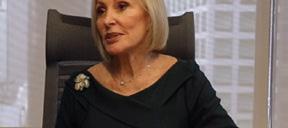


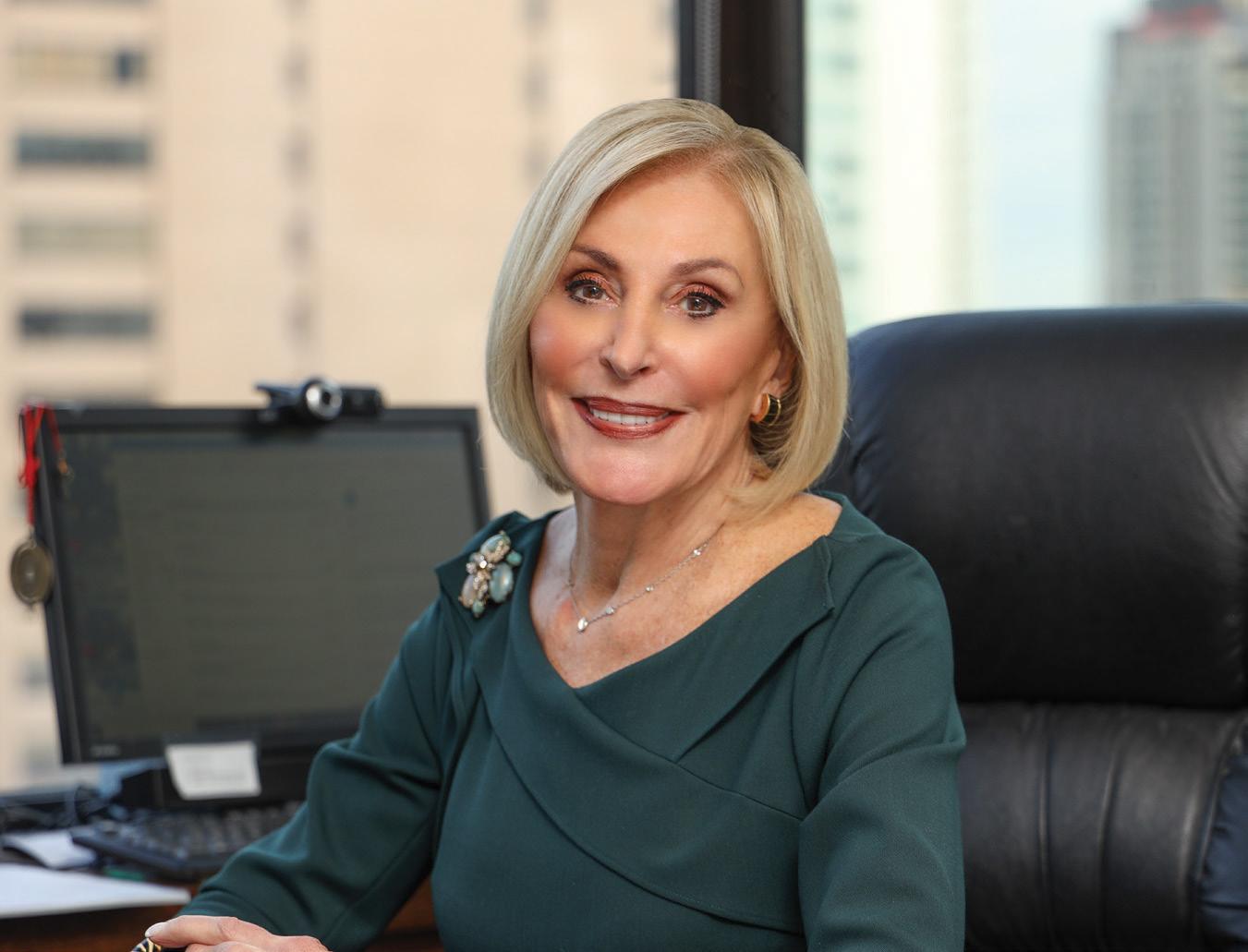

1 2 6 E A S T 5 6 T H S T R E E T , S U I TE 2110 N E W Y O RK, N Y 1 0 0 2 2 | 2 1 2 6 8 8 8 6 7 1 | E L L I G G R O U P. C O M
TOP 10 LÍDERES
PAGE 88
COVER: CASS DAVIS
Conversations at the Top: John Leguizamo
In an interview with Ruben Navarrette, the actor, comedian, and writer discusses the forgotten historical contributions and overlooked modern-day influence of Latinos in America
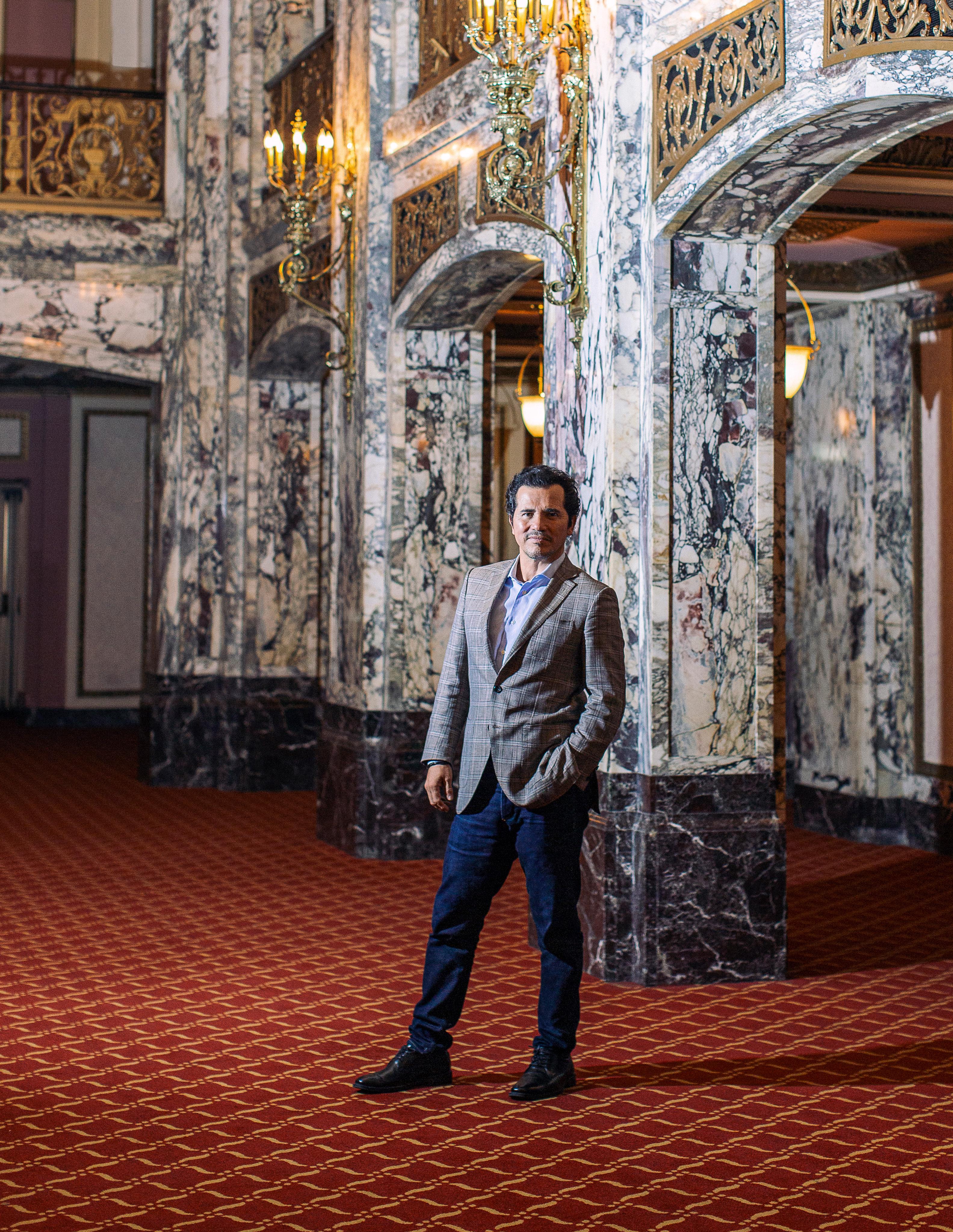
CASS DAVIS
90
OBEDIENCE AND INTERVENTION
At Buckner International, Dr. Albert Reyes’s faith informs his mission as he and the nonprofit push to strengthen the family bond
WORKING TWICE AS HARD
Jose Medina was raised to believe in the rewards of hard work. As president of RT ProExec, he sets out to guarantee that the growing company reaps the rewards of success.
MARKETING MAVEN
Under the leadership of Chief Marketing Officer Mariela Ure, Universal Studios Hollywood plans to roll out a series of unique events in the near future
SINK OR SWIM MOMENT
Andres Idarraga has gone from prison, to the Ivy League, to the forefront of the business world. As CEO of Creci, he works with businesses that aim to empower and support.
THE VOICE YOU CAN TRUST
At iHeartMedia, Chief People Officer Lorna Hagen maintains a commitment to employees that mirrors the media company’s commitment to its listeners
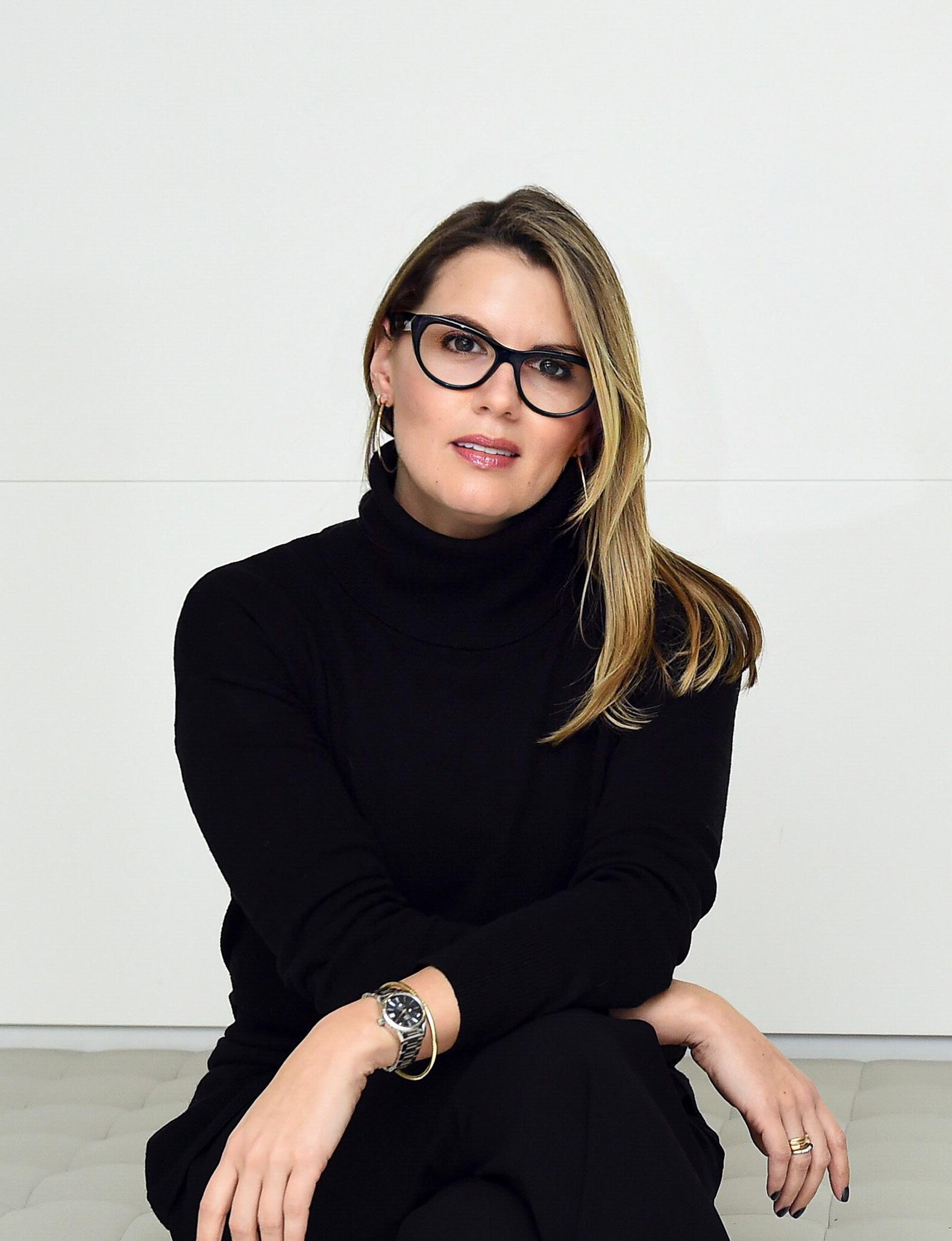
DREAM BIG AND FEEL AT HOME
An executive director of business development, Hector Coronel is part of a family-owned business in Panda Restaurant Group that practices what it preaches
A CULTURE OF INCLUSIVITY
At Cargill, Pilar Cruz believes that diversity is more than just important to the fabric of a company—it can prove as crucial as strategy to its overall prosperity

Contents Odds & Ends 6 A LETTER FROM THE PUBLISHER 8 IDENTITY KNOWS NO BOUNDS 10 GUEST EDITOR'S LETTER 12 PEW RESEARCH ESSAY 184 INDUSTRY INDEX 186 THE LAST WORD 132 168 5 Hispanic Executive COURTESY OF IHEARTMEDIA (HAGEN), GILLIAN FRY (CRUZ) 16 48 58 80 132 153 168
A Letter from the Publisher
Pedro A. Guerrero
CEO of Guerrero Media
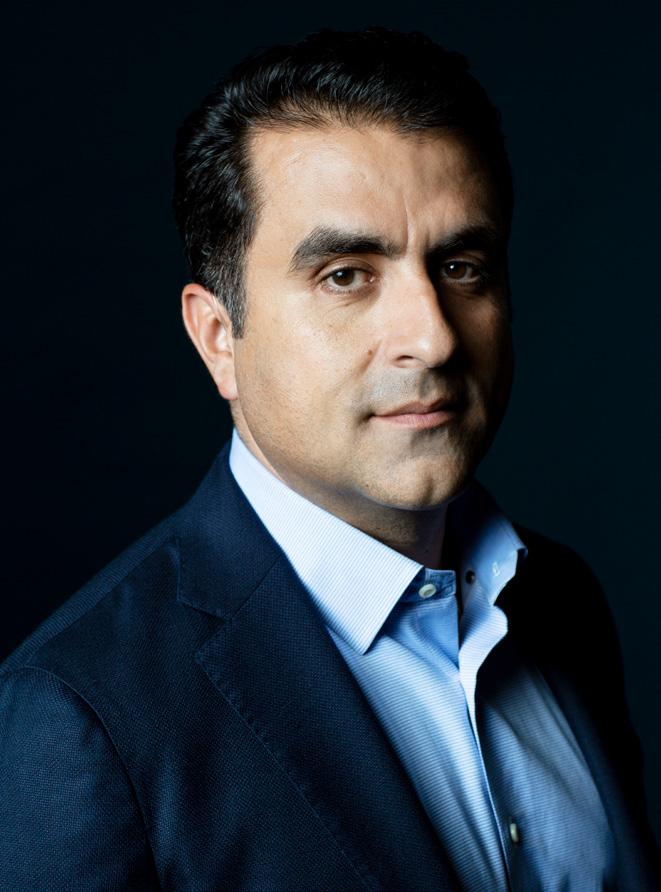 Publisher of Hispanic Executive
Publisher of Hispanic Executive
A LIFETIME AGO I WAS A YOUNG, ASPIRING artist enamored with the creative process. I had an insatiable urge to accept the challenge of any blank canvas ready to stare me down—daring me to make a mark, daring me to begin the messiness that is creation. I fell in love with that process because every now and then, if I was lucky, those brush strokes, lines, corrections, and revisions would somehow harmonize as one, and a work of art would reveal itself.
Over the course of life, many of us have experienced the magic that happens when serendipity finds us—be it through a “small world” coincidence, the rediscovery of an idea that was long forgotten, or a chance meeting that leads to an unforeseen, exciting solution.
Producing a magazine like Hispanic Executive is a creative process in and of itself, one that requires a company of hands to build. It’s creation also involves collaboration with, and an awareness of, those outside of the production process. In our instance, that means the executives whose stories we share and our audience of readers.
Rarely, however, do we allow ourselves the latitude to view our own process as one
that can summon a moment of magic akin to the development of a work of art.
I have been anticipating this inaugural Identidad Issue with excitement because as we started to conceive it, we began to hear a signal cutting through the noise that we were onto something. But it wasn’t until the pieces started falling into place that we knew the issue we were working on was something special.
As we debated who the cover star would be, it was by chance that John Leguizamo was in Chicago for his production of Latin History for Morons and open to a photoshoot at the historic Cadillac Palace Theatre. And it was pure coincidence that during the same week I spoke with a Latina CMO of a blue-chip Fortune 500 company (who asked me what words we use to describe Latinidad ) I was gifted a copy of Making Hispanics, written by our guest editor Dr. G. Cristina Mora (p.10). It quickly became clear that in this issue we needed to tackle the matter of Latino identity by showcasing the complexity and history of how we name ourselves.
In many ways, how each of us identifies is at the core of who we are collectively, precisely because it’s completely personal,
GILLIAN FRY
6 A Letter from the Publisher
familial, political, and historical. The answers are forever colorful and ever-changing. It is so wrought with context that thirteen years ago it quickly became the first big decision we had to make. What do we name this magazine?
In launching Hispanic Executive, the goal was to raise the caliber of how Latino success stories are told by presenting their narratives in a sophisticated way. We wanted to speak directly to Latinos in the private sector and use a term that, at the time, was readily accessible and understood by all.
To be honest, I was not particularly comfortable with including Hispanic in the name of the magazine as it was somewhat foreign to me. Over the course of my life I’ve gone from Mexicano to Chicano to Latino Never had I identified with Hispanic. But a decision was made because we needed a common place to begin, and as Dr. Mora states in her guest editor’s letter, “You cannot have something called Hispanic Executive, in which we can come together to debate the boundaries of the group or the values that bring us together, without having some sort of starting point for what Hispanic means.”
One man who is well educated on the complexity of identity is this issue’s cover celebrity, the great John Leguizamo (p.90).
In Latin History for Morons, Leguizamo digs into the sad truth that Latin Americans have too often been deprived of a beginning. Though they fought for the country en masse during the American Revolution, the Civil War, and both world wars, their contributions are regularly glossed over, regularly diminished to footnotes. For Leguizamo, the representation of Latin Americans over the course of the country’s history deserves a rewrite—or, rather, a beginning.
Considering that the American identity itself is bright with Latino elements woven into its fabric over the course of centuries,
Leguizamo is perplexed by the void of unique Latin American richness in daily America. Still, as I paged through the impressive individuals that follow Leguizamo’s feature in our Top 10 Líderes section (p.88), so many of them innovative thinkers and leaders in media, I began to see the fruits of our culture’s labor to be both better heard and better seen.
With One Day at a Time, co-showrunner Gloria Calderón Kellett (p.101) did more than just reboot a Norman Lear sitcom with a Cuban American family—she redefined what a traditional sitcom will look like into the future. Ramon Escobar (p.104), CNN’s vice president of talent and recruitment, has literally spent decades finding and developing diverse on-air talent—from Lester Holt to Ana Cabrera to Enrique Acevedo. And at HOLA! USA, Publisher Sylvia Banderas Coffinet (p.118) believes that “content should reflect the reality of the audience that it serves.” She goes on to put it more poignantly: “The truth is that multicultural is the new mainstream and that multicultural done well is mainstream done right.”
These special leaders have made their voices louder because they’ve embraced their identities, and their stories are examples of valiant efforts by Latinos to shape America’s identidad
I believe the breadth of this issue underscores the war Latinos are often required to fight around who they are—not just on a personal level but on a macro one as well.
So, while the stars may have aligned for this issue, there is still work to be done. There are many more identidades to recognize, many more stories of success to share. Hopefully, what we are witnessing is an alignment on a much grander scale, one where we can take a step back together and say, “Wow, we have arrived.”
“I believe the breadth of this issue underscores the war Latinos are often required to fight around who they are—not just on a personal level but on a macro one as well.”
7 Hispanic Executive
Identity knows no bounds
With each issue, Hispanic Executive aims to recognize the countless ways in which its featured executives choose to identify themselves. So often the magazine accomplishes that goal by recounting both the personal and professional journeys of those executives, as well as their deep commitments to diversity. This Identidad Issue is a means of celebrating those rich identities even further.
In Hispanic Executive’s efforts to further the identity discussion outside of these printed pages, it recently collaborated with AT&T’s Yovany Jerez, national president of AT&T’s Latino ERG HACEMOS. Jerez led an effort to create and conduct a survey of the ten thousand-plus members of HACEMOS, as well as nearly two thousand members of the Hispanic Corporate Council of
Atlanta (HCCA), a group of fortythree ERG groups in greater Atlanta. In the survey, he learned, “Regardless of gender, age, education, Spanish or English proficiency, Hispanic and Latino/a are unequivocally still the preferred terms.” Ultimately, 61 percent of respondents prefer to identify by those terms.
AMERICAN LATINO MULTICULTURAL
While you’ll certainly find those identifiers scattered throughout this issue, you’ll also find Tejano, Cuban American, Ibero-Latino, Nuyorican, Multicultural American, and Human, among several others. So many of the identities mentioned by the executives have their own stories, their own histories—and Hispanic Executive is honored to share them with you.
To read more about the AT&T survey findings, visit hispanicexecutive.com.
HISPANIC TEJANO MEXICAN XICANO
8 Identidad
Hispanic
LATINA
DREAMER CHICANOS
MI
Look for this marker to read their answers.
AMERICAN LATIN CUBAN SOUTH
HISPANIC TEJANO
XICANO
LATINO MULTICULTURAL
9
COLOMBIAN Executive
The issue's featured executives were asked, “Several terms are used to describe people who are of Hispanic/ Latino origin or descent; examples include Latinx , Latine , Chicano, Mexican , Afro-Latino, South American , etc. Which term(s) do you use to describe yourself?”
GUEST EDITOR
KEEP THE CONVERSATION MOVING FORWARD
TOLD
SARA DEETER, KATHY KANTORSKI, AND JUANITA VIVAS
That is really the basis of the group dynamism for Latinos. We’re different and we have different ideas, yet there are some key similarities that unite us as strands across our group. And to be taken seriously within the Latino community, we have to be able to fold those two contrasting narratives about diversity and similarity together.
LATINOS—CULTURAL
LEADERS, CORPORATE LEADERS, AND POLITICAL
AT NO TIME HAS ANYONE EVER SAID THAT THE LATINO POPULATION IS a homogeneous population. Even if the government and outside groups sometimes like to think otherwise, Latinos themselves, from politicians to corporate leaders to community advocates, have always said that Latinos are a diverse group with diverse backgrounds, diverse languages, skin colors, and experiences in the United States. You can’t see us as one monolithic group.
But at the same time, we also have this common experience of being underrepresented, underheard, underacknowledged, and underappreciated. And that is a really strong tie, that we are often the only ones in the room: despite the fact that you might have ancestry in the Caribbean and have a different skin color than I do, or despite the fact that I’m first-generation and you’re fourth-generation, there is this common sense of always fighting to be heard or to have adequate representation.
leaders—have all been really vigilant about protecting and nurturing diversity. The danger of homogenizing or overgeneralizing tends to come from outside, when the government wants to see us all as one homogeneous group and then suggests that everybody has the same experience, that everybody is an English learner, or that everybody has an undocumented family member. That is the nature of race politics and categorization politics: the trend is to get at the average experience.
The paradox of our time is that now—when the Latino community is perhaps the richest it’s ever been, the largest it’s ever been, and one of the strongest contributors to the economy it’s ever been—is also a time in which the demonization of the community is at its most explicit.
Not that the community hasn’t been demonized before—the United States has never embraced and enveloped the Latino heritage as part of an American heritage. But now it’s being done with a bullhorn. Every thirty seconds, another Latino turns eighteen, but they are coming of age at a moment in which arguments that criminalize Latinos are at the absolute forefront of the conversation.
10 Identidad
AS
TO
Dr. G. Cristina Mora on the complexities of Latino identity
and the imperative we all have to keep engaging in authentic and dynamic conversations about the Latino community:
Racialized politics don’t necessarily follow fast or hard data, but we shouldn’t deny the fact that a large swath of Latinos see themselves as not white, not black, not Asian, and see themselves as a racialized category at the same time. That’s not to say that there aren’t debates—fierce debates—within the Latino group about who we are as a whole. Right now, we’re having much more of a conversation about gender politics and nonbinary genders, a conversation about the term Latinx
BUT WE’RE HAVING THAT CONVERSATION, WHICH JUST WASN’T around twenty years ago. We’re having a conversation that acknowledges the diversity of skin colors that we just weren’t having in the 1970s. The beauty is that we are having these conversations, and that those conversations are not static.
Having a common understanding of labels allows us to start those conversations about who we are as a community. You cannot have something called Hispanic Executive, in which we can come together to debate the boundaries of the group or the values that bring us together, without having some sort of starting point for what Hispanic means.
In the US, the Latino population goes almost unanimously back and forth between Hispanic and Latino. And the biggest positive of these terms is that they convey a sense of numbers and a sense of existence in different ways.
When you consider Hispanic as unifying the Cubans in Miami with the Puerto Ricans in New York and the Mexicans in Los Angeles, not only are you bringing together larger numbers but you’re also saying, “Look at us. We’re not just a regionalized issue for the governors of the US Southwest. We’re not just an issue for the mayor of New York. We exist everywhere; we are a national issue. We are thoroughly American, and we merit both national and federal attention."
But no one forces someone to say that they are Hispanic: it is a chosen identity. Self-identification is an important aspect of the Latino community, and the ambiguity of terms like Latino and Hispanic has allowed for an expansive and continuous form of self-identification. A child of a fourth-generation Argentinian American can identify in the same category as a person that just crossed the border from Guatemala, for example. And that is powerful, seeing our different stories through a common thread as well as seeing differences in culture, differences in experience.
ALL OF THESE CONVERSATIONS ABOUT DIFFERENCE AND DIFFERENT experiences will probably never be settled, and that is fine. All groups go through this, and the best groups know how to moderate an authentic conversation. They know that simply continuing that conversation is the key, rather than asking when these questions will be resolved.
GUEST EDITOR
DR. G. CRISTINA MORA
Author, Making Hispanics: How Activists, Bureaucrats, and Media Constructed a New American Associate Professor of Sociology and Director of the Institute of Governmental Studies University of California, Berkeley
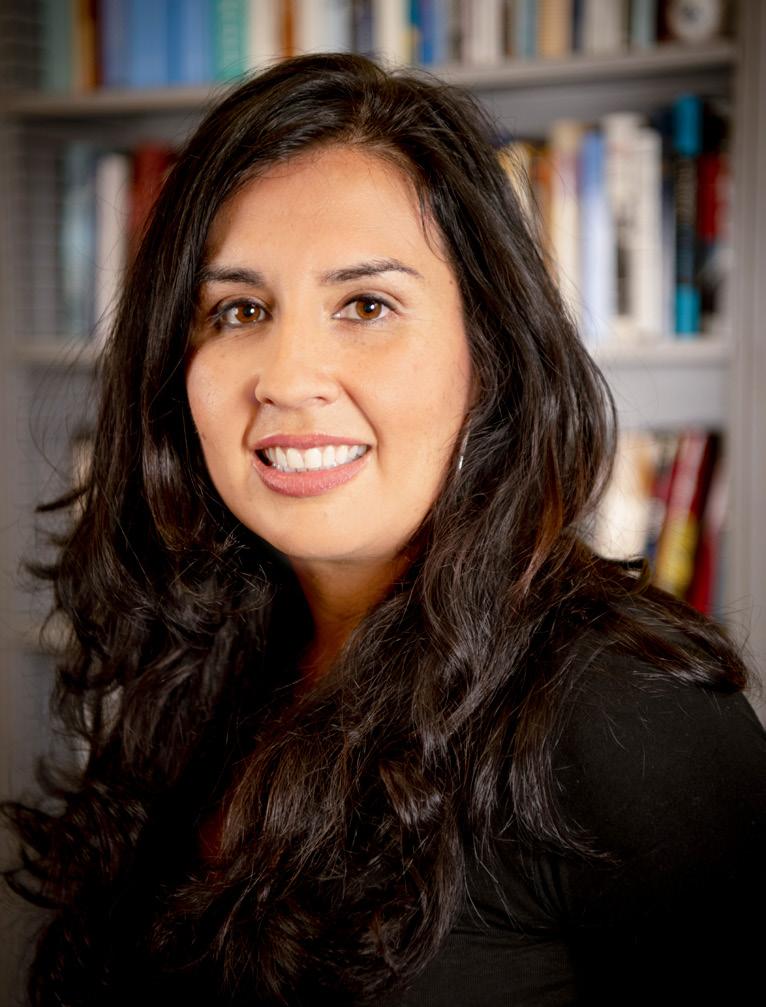
UC BERKELEY MEDIA SERVICES
“TO BE TAKEN SERIOUSLY WITHIN THE LATINO COMMUNITY, WE HAVE TO BE ABLE TO FOLD THOSE TWO CONTRASTING NARRATIVES ABOUT DIVERSITY AND SIMILARITY TOGETHER.”
FOR U.S. LATINOS, IDENTITY IS MORE COMPLEX AND VARIED THAN A SINGLE, ALL-ENCOMPASSING PAN-ETHNIC TERM SUGGESTS
BY MARK HUGO LOPEZ
THE WAYS IN WHICH THE NATION’S SIXTY million Latinos (or Hispanics or Latinx) describe their identity varies widely across individuals, geographies, immigrant generations, ancestry, and much more. Yet the population is often referred to by a single, pan-ethnic term that implies it is a monolithic group. That masks much of the diversity that characterizes US Latinos.
What is a pan-ethnic term? Hispanic, Latino, and Latinx are currently the ones more commonly used by people living in the US who self-identify as part of this group. Each is intended to capture, under one umbrella, a diverse population. And each emerged at different times and with different purposes, reflecting then popular views of identity to describe Americans who trace their roots to Latin America or Spain.
For example, Hispanic emerged as the most used term in the 1970s as civil rights leaders and government officials sought to count the population. Latino/Latina/Latina/o/Latin@ emerged in the 1990s as an alternative to Hispanic, notably as a term that did not come from the US government (even if Latino became an officially
recognized term in the late 1990s). Both terms remain in wide use by researchers, journalists, government officials, and the public itself. More recently, a new pan-ethnic term has emerged: Latinx. It is a gender-neutral term and reflects the broader movement of inclusivity that has emerged in recent years in the US.
Despite ongoing debates about which term is better or even the right one to use, more than fifteen years of Pew Research Center Latino surveys show somewhat mixed preferences among the public when it comes to using or not using these pan-ethnic terms. For example, while most have used Hispanic or Latino at one point or another to describe themselves, half in 2018 told us they have no preference for either term. If one is preferred, it is Hispanic over Latino by a two-to-one margin, a pattern that has persisted for more than fifteen years of surveys of the US Hispanic adult population.
Instead, it is family country of origin that matters more than pan-ethnic terms. In 2015, we found that more than half said they most often described themselves by terms like Mexican or Cubana or Puerto Rican or Salvadoreño —i.e., the countries where their ancestors are from. This is more likely to be true among
12 Identidad
Key observations pulled from Pew Research Center
Latino surveys
70%
In 2011, of those US Latinos surveyed said they have many cultures; only one-quarter said they share a common culture
immigrant Hispanics (which makes sense given that is where they are from), but also is true among many US-born Hispanics.
Even so, later US-born generations of Hispanics are more likely than immigrant Hispanics to say they most often call themselves American, highlighting changes underway within the Hispanic population as the US-born drive the group’s population growth and make up a growing share of all Hispanics (just one-third are immigrants today).
up recently, is significantly below highs seen in the late 1990s and early 2000s. As a result, the foreign-born share among Hispanics is falling. At the same time, the group’s population growth rate is slowing as fertility rates fall.
In 2014, of Latino adults surveyed indicated they are of indigenous roots
> 1/2
In 2015, of those surveyed described themselves by terms tied to the countries their ancestors are from
1/4 3/4
In 2015, of those surveyed said you don’t have to speak Spanish to be considered Latino; eight in ten don’t believe you have to have a Spanish surname to be considered Latino
There are many other dimensions to Latino identity. For example, in 2014, one-quarter of Latino adults told us they are Afro-Latino, with those of Dominican and Puerto Rican background making up a large part of the group. And one-quarter of Latino adults are of indigenous roots such as Native American, Mayan, Aymara, Quechua, or Taino. And at least 28 percent say they are mestizo, mestiza, mulatto, or mulatta.
Latinos look at their identity in other ways too. For example, what does it take to be considered Latino by others? In 2015, we asked whether one needs to speak Spanish to be considered Latino—three-quarters say no. What about having a Spanish surname? Eight in ten say no. Even among immigrants, majorities agree that one doesn’t need to speak Spanish or have a Spanish surname to be considered Latino in the US.

Looked at another way, do US Latinos see a common culture among themselves or a diverse one? In 2011, 70 percent said US Latinos have many different cultures while just a quarter said they share a common culture.
For some, identity is much more than just about their Hispanic background and that’s important to remember. Some may see themselves as Californians first or as part of Gen Z or as a Catholic first and foremost.
Looking ahead, big demographic trends are reshaping the nation’s Hispanic population. Immigration from Latin America, while
And finally, intermarriage rates remain higher for Hispanics than either whites or blacks (Asians intermarry at a higher rate, though)—since at least 1980, one-quarter of Hispanic newlyweds marry a non-Hispanic. In the US today, the single most common intermarried couples are ones where a Hispanic spouse is married to a white spouse accounting for 43 percent of the total.
All these changes may have implications for how the group sees its identity in the future, or if they even identify as Latino. And just as terms have evolved over the decades, it remains to be seen what terms future Latinos will use to describe themselves and their identity.
13 Hispanic Executive
MARK HUGO LOPEZ
KAVEH SARDARI
Director of Global Migration & Demography Research Pew Research Center
Masthead
Featured Contributors
Ruben Navarrette is a contributing writer to Hispanic Executive, a syndicated columnist with the Washington Post Writers Group, author of A Darker Shade of Crimson: Odyssey of a Harvard Chicano, and host of the podcast Navarrette Nation. Read his interview series, Conversations at the Top, on p.90.
Dr. G. Cristina Mora is an associate professor of sociology and the director of the Institute of Governmental Studies at UC Berkeley. She is the author of Making Hispanics: How Activists, Bureaucrats, and Media Constructed a New American (U Chicago Press, 2014). Her current research focuses on racial politics and immigration in the United States. Read her guest editor's letter on p.10.
Mark Hugo Lopez is director of global migration and demography research at Pew Research Center. He leads planning of the Center’s research agenda on the US Latino population, Latino identity, US immigration trends, international demographic trends, and international migration. He was previously the Center’s director of Hispanic research, and prior to that served as the associate director. Lopez received his doctorate in economics from Princeton University. Read his essay on p.12.
Creative
Director, Editorial
Kevin Warwick
Senior Editor
Frannie Sprouls
Editors
Melaina K. de la Cruz
Sara Deeter
KC Esper
Hana Yoo
Staff Writer
Billy Yost
Contributing Editor
Julia Thiel
Contributing Writers
Cora Berg
Kathy Kantorski
Kathryn Kruse
Keith Loria
Roman Navarrette
Courtney Ryan
Paul Snyder
Andrew Tamarkin
Juanita Vivas
Zayvelle Williamson
Clint Worthington
A.J. Zak
Corporate
CEO & Publisher
Pedro A. Guerrero
Chief of Staff
Jaclyn Gaughan
VP, Sales

Kyle Evangelista
VP, Hispanic Division
Vianni Lubus
VP, Finance
David Martinez
Director, Client Services
Cheyenne Eiswald
Senior Client Services Manager
Rebekah Pappas
Client Services Manager
Brooke Rigert
Director, Talent Acquisition
Elyse Schultz
Talent Acquisition Manager
Haylee Himel
Director, Strategic Partnerships
Krista Horbenko
Director, Business Development
Jenny Vetokhin
Senior Events Manager
Jill Ortiz
Hispanic Executive® is a registered trademark of Guerrero, LLC

©2020 Guerrero, LLC. guerreromedia.com
825 W. Chicago Ave. Chicago, IL 60642
Stephanie Zeilenga
Designer
Elena Bragg
Photo Editors & Staff Photographers
Cass Davis
Senior Director, Sales


Ben Julia
Sales Training Manager
Alexa Johnson
Content & Advertising Managers
James Ainscough, Allyssa
Facebook: @hispanicexecutive
LinkedIn: @hispanic-executive
Twitter: @HispanicExecMag
Instagram: @hispanicexecmag
Reprints
Reprinting of articles is prohibited without permission of Guerrero, LLC. Printed in China. For reprint information, contact Reprints & Circulation Director Stacy Kraft at stacy@guerreromedia.com.
Gillian Fry
Budjoso, Justin Davidson, Soledad
Granados, Nicole Haas, Ashley Parish
Industry Partners
in
magazine and/or on our website.
Hispanic Executive, 825 W. Chicago Ave., Chicago, IL 60642, (312) 447-2370.
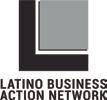

14
Hispanic Executive is published quarterly by Guerrero, LLC. To subscribe, visit www.hispanicexecutive.com/subscribe. For editorial consideration, please email info@hispanicexecutive.com. By submitting a letter, you agree to let us use it, as well as your full name, city, and state,
our
We may
clarity.
edit for
MIS SION
one’s work makes an impact in the community, it transcends employment and becomes a calling. These executives have answered their call.
When
Mission 16 Dr. Albert Reyes, Buckner International 22 Dolores Gonzalez, IDEA Public Schools 26 Antonio Argibay, Meridian Design Associates, Architects, PC 29 Giamara Rosado, Acacia Network 32 Janeth Medina Larios, Bank of the West 34 Pete Delgado, Salinas Valley Memorial Healthcare System
Obedience and Intervention
BY BILLY YOST
Dr. Albert Reyes’s faith informs his mission as he strives to strengthen the family bond
16 Mission
 Dr. Albert Reyes
President and CEO
Dr. Albert Reyes
President and CEO
KENT BARKER
Buckner International
Dr. Albert Reyes learned to follow the call.
It first came from his no-nonsense Marine Corps father, who taught his three sons how to respond when he called them. “My dad would say, ‘When you hear my voice, say “Yes, sir” and start running toward me until you find me.’ That’s how we were raised,” Dr. Reyes says. “There wasn’t any alternative. We did what we were told to do.”
It was when Dr. Reyes was fifteen that he started hearing a different kind of call. “I began sensing that God, the Father, was calling me to vocational ministry, and I applied the same principle,” Dr. Reyes explains. The good doctor has since gone where he believed God wanted him to be—and his trajectory has become an act of obedience to his faith and life purpose.

Today, as the sixth president and CEO of the 141-year-old nonprofit Buckner International, Dr. Reyes finds ways to serve those most in need, thanks in part to a razor-sharp business acumen that would rival the talents of any bigwig pulling the levers at a for-profit conglomerate. Buckner is focused on keeping families together by investing in them early and educating them about creating a foundation strong enough to weather storms without allowing the cracks to become widespread.
THE BUSINESS OF FAITH
Dr. Reyes’s journey has been a twofold pursuit of both ministry and business experience. As a young man, he real-
ized that to go to seminary, he’d first have to earn a bachelor’s degree. He decided to go the business route, earning a BBA in management from Angelo State University. He had grown up in an entrepreneurial family that dabbled in wholesale candy distribution, grocery stores, and laundromats.
At a certain point during business studies, though, he thought he’d made a mistake. “I have to be honest; I remember sitting in some of my business courses almost complaining to God about when I was ever going to use what I was learning,” Dr. Reyes
says, chuckling. “I thought I should be studying Greek and Hebrew, getting ready for the seminary. But I did what I had to do graduate.” He eventually made it to Southwestern Baptist Theological Seminary—where he earned a master’s and doctoral degree in preparation for vocational ministry— before attending Andrews University, where he earned a PhD in leadership.
At Buckner International, an international ministry serving vulnerable children, families, and senior adults, Dr. Reyes now oversees a $120 million budget that impacts hundreds of thousands of lives and has investors and donors who want proof of concept to know that their money is being spent wisely. Those business skills Dr. Reyes perhaps reluctantly learned are now being put to use daily—an irony that isn’t lost on him.
MARK SANDLIN
18 Mission
Dr. Albert Reyes watches as a client from a local Buckner Family Hope Center in Santo Domingo, Dominican Republic, sews a head scarf. Buckner trains clients in skills that enable them to earn money so they can support their families.


Business | Personal | Employee Benefits | Private Client | Life | Bonding TexCap is a proud business partner and long-standing supporter of Buckner International and the great work they do around the world. 972-720-5340 | TexCapINS.com Guiding you to a more SECURE future.
Determined to pay his way through seminary, Dr. Reyes began working for Dallas-based start-up US Telephone in the 1980s. He received training from best-selling author and management consultant Dr. Ken Blanchard (The One Minute Manager), and by his midtwenties was managing 150 people and a multimillion-dollar budget. That company would later become Sprint, and after helping take the company to its IPO—and, more importantly, graduating from seminary—Dr. Reyes took on full-time pastorates that would lead him around Texas.
He led Baptist University of the Americas to receive accreditation to grant degrees for the first time in its fifty-two-year history. He also led the campus to grow in size by adding a 90-acre purchase of land and lining up the largest single multimillion-dollar gift in the school’s history.
It’s where Dr. Reyes thought he’d spend the remainder of his career— until the call from Buckner came.
WHEN WAITING ISN’T ENOUGH
Over the course of his fourteen years at Buckner International—eight as president and CEO— Dr. Reyes has sought to increase the outreach and support to children and families as well as senior retirement communities. In regard to children and families, the organization developed Family Hope Centers, which were piloted in Guatemala and Honduras before being implemented in Texas under the leadership of Dr. Reyes’s predecessor, Dr. Ken Hall. “We disrupted our own best practices,” Dr. Reyes explains. “What if we don’t wait until children are in a place where they have been abused or neglected? What if we were to get ahead of the problem before it happens?”
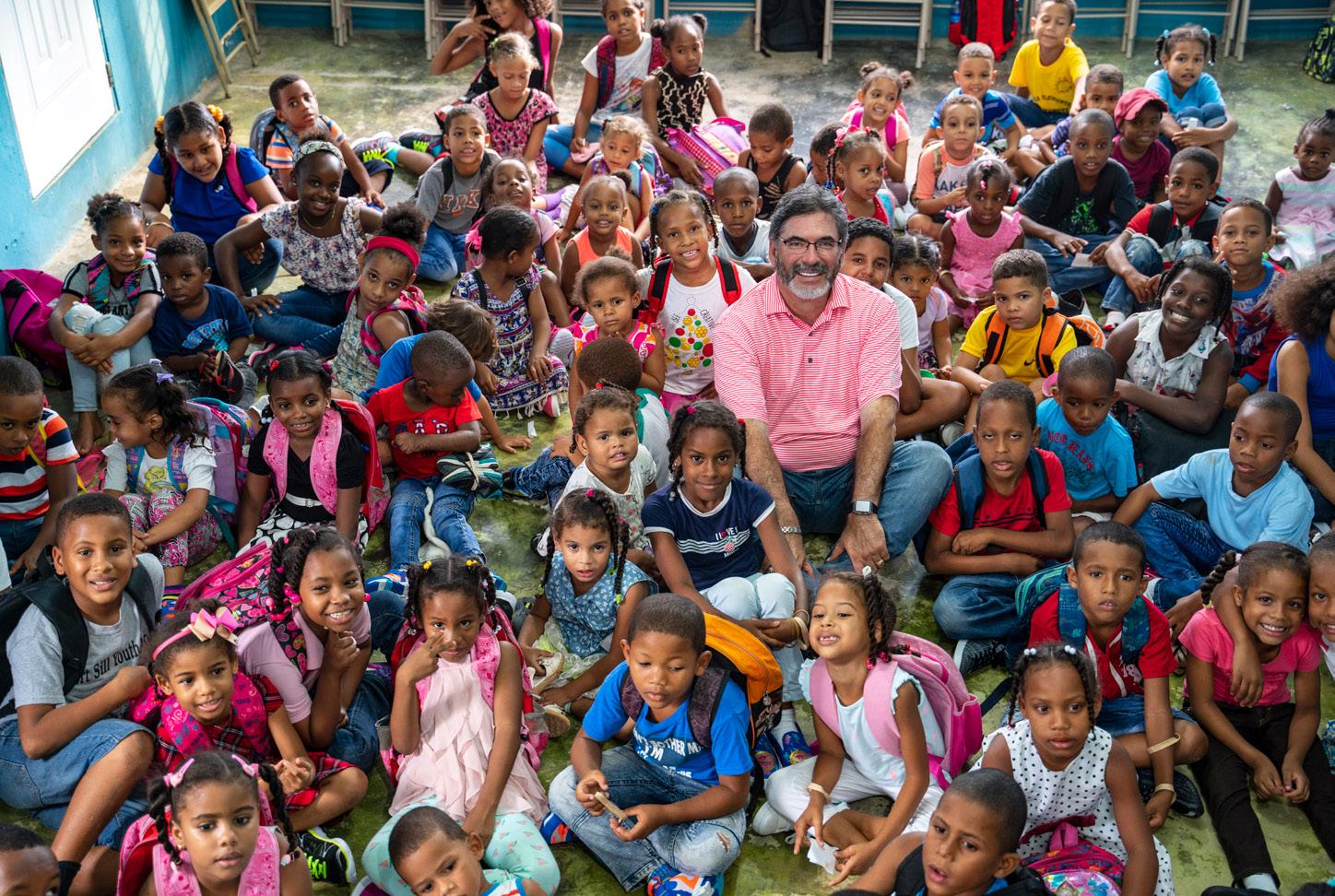
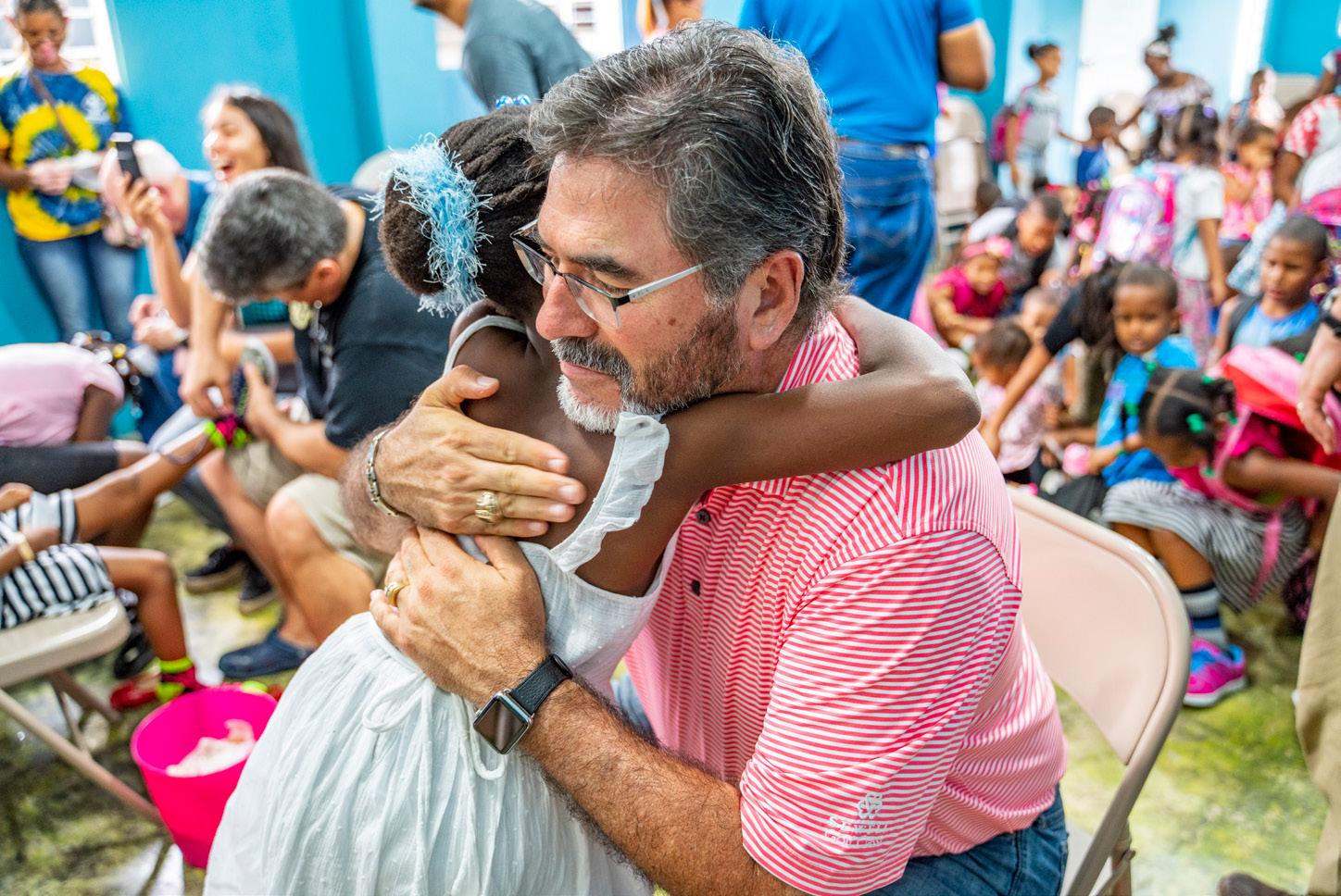
MARK SANDLIN
“What if we don’t wait until children are in a place where they have been abused or neglected? What if we were to get ahead of the problem before it happens?”
20
Dr. Albert Reyes is surrounded by children in the Dominican Republic (top). He receives a hug from a child after giving her a pair of shoes on behalf of Buckner Shoes for Orphan Souls (bottom).
Mission
The idea was to provide customized solutions based on the needs of individual families. That might mean parenting classes, child resiliency interventions, or helping provide isolated families with social connections within their communities. “We identify the issues that families tell us they want to work on and help them create goals to get there,” Dr. Reyes says. “We tell our families that ‘Every pro athlete needs a good coach.’ We want to be the coaches for these families.”
Dr. Reyes, ever the business mind, has effectively quantified the results of the Family Hope Centers approach. “Our family coaching costs about $2,000 per family, per year,” Dr. Reyes says. “If you wait for a child to be separated from their family due to abuse, abandonment, or neglect and to be put into the foster care system to intervene, serving one child will cost $54,000 a year. That isn’t taking into account the trauma or emotional scars they’ve had to endure, or the resources and time it takes to help a child overcome those scars. That’s just the raw cost.” Dr. Reyes says for every dollar spent on prevention, it’s $27 saved on the negative alternative: waiting.

The astute business approach of Dr. Reyes—combined with the deep-seated compassion for those he supports—has long been respected by his most trusted partners. “Dr. Reyes continues the legacy of servant leadership that has always marked the person at the helm of Buckner,” says Gaylon Brown, CEO and managing partner at TexCap Insurance. “His trust in his team and his love for the people they
mi identidad: MI
“I tend to lean toward Hispanic; however, I identify myself more specifically as a Tejano (third-generation native Texan of Mexican descent). We are proud to be Tejanos and citizens of the United States of America, and, as such, we value our deep roots in Mexico, our five-hundredyear history, and the family we continue to interact with across the border. We have a liminal identity, bilingual and bicultural.”
Where’s your heart?
We work with you to offer life-changing options. Together, we can serve through:
Foster Care and Adoption


serve are what propel Buckner to shine hope across the world.”
Currently, Buckner International is the only institution of its kind that is working in this space, according to the leaders of Christian Alliance for Orphans and the Congressional Coalition on Adoption Institute—but Dr. Reyes says it’s OK to be at the front of the pack. “We’re excited about creating this disruption, even if it’s to our own model and best practices. We’re doing the right thing for kids before they get hurt.”
As Buckner continues to provide innovative solutions for the most vulnerable members of the population, Dr. Reyes says he’s got a good idea where he should be leading the organization. He’ll just keep responding to the call.
Be a family for vulnerable children in need of safety and love.
Family Hope Centers
Join us to offer a range of services from counseling to computer classes in communities where vulnerable children and families live.
Family Pathways
Help families stay together by providing affordable housing and support to single parents seeking higher education.

Senior Living
We enrich the lives of the aging population with a continuum of services including independent living, assisted living, nursing, memory care and hospice. buckner.org
 HighGround Advisors congratulates Dr. Reyes for this well-deserved recognition. Since 1930, we have been honored to serve Buckner Foundation and other clients dedicated to transforming lives. HighGround Advisors protects, strengthens and grows the assets of nonprofits, faith-based organizations, and charitable individuals with comprehensive investment management and gift planning services.
HighGround Advisors congratulates Dr. Reyes for this well-deserved recognition. Since 1930, we have been honored to serve Buckner Foundation and other clients dedicated to transforming lives. HighGround Advisors protects, strengthens and grows the assets of nonprofits, faith-based organizations, and charitable individuals with comprehensive investment management and gift planning services.
21 Hispanic Executive
Chief Program Officer Dolores Gonzalez is determined to keep learning for the benefit of every student attending IDEA Public Schools
Deserving of More than Just an Apple
BY KATHRYN KRUSE
THOUGH SHE TRADED CLASSROOM TEACHING for an administrative role more than a decade ago, Dolores Gonzalez spends two days a week away from her computer with teachers, students, and principals.

“It helps me be clear and focused,” the chief program officer for the charter school operator IDEA Public Schools explains. “I need to see what is happening with my own eyes.” Her job, she says, is about prioritizing, a skill she improves as IDEA expands and opens dozens of new schools in Texas, Louisiana, Florida, and Ohio.
Broadly, Gonzalez leads a 150-person team that determines what IDEA will teach its kids, ultimately overseeing student experiences inside and outside of
academics, including English language learner (ELL) and special programs, athletics, assessment, and counseling. While special education service providers—like speech-language pathologists and school psychologists—make up the majority of her team, she directly manages eight department leads. “I used to think I needed more people,” she says. “Now I know I just need the right people with the right expectations.”
Along with clear prioritization, as IDEA grows, Gonzalez shifts other management strategies to maintain quality. Constantly planning ahead—keeping focused on both the current school year and the one upcoming— she recognizes the importance of clear decision-making
22 Mission
and creating alignment with school management teams. As IDEA expands, so does the number of people—and, at times, opinions. “I used to try to get everyone to agree. Now I do the research, ask for feedback, and then make the call,” she says.
Though Gonzalez makes tough decisions, she also believes in satisfaction and engagement. “We can’t lead with, ‘I’m an expert. Do as I say,’” she says with a laugh, explaining the importance of engaging people to understand changes. Besides her constant presence in schools, Gonzalez and her team offer teachers ongoing trainings. She sums up her intent as “creating products so staff want to buy them.”
In 2004 IDEA recruited her as the special education director for their, at that time, single school. She arrived at Rio Grande Valley in Texas with three years of teaching experience, intending to stay only one year. That one year became two, then three. Just recently, she convinced her parents to move to the valley. She’s stayed because of her belief in IDEA.
To hear Gonzalez rattle off the stats of IDEA’s three-year plan to enlarge its school pantheon is astonishing. August 2020 alone will see twenty-four new schools opened, and by 2024, IDEA intends to have eighty-six more campuses. This includes expanding into Tampa Bay, Jacksonville, and Cincinnati.
Dolores Gonzalez Chief Program Officer IDEA Public Schools
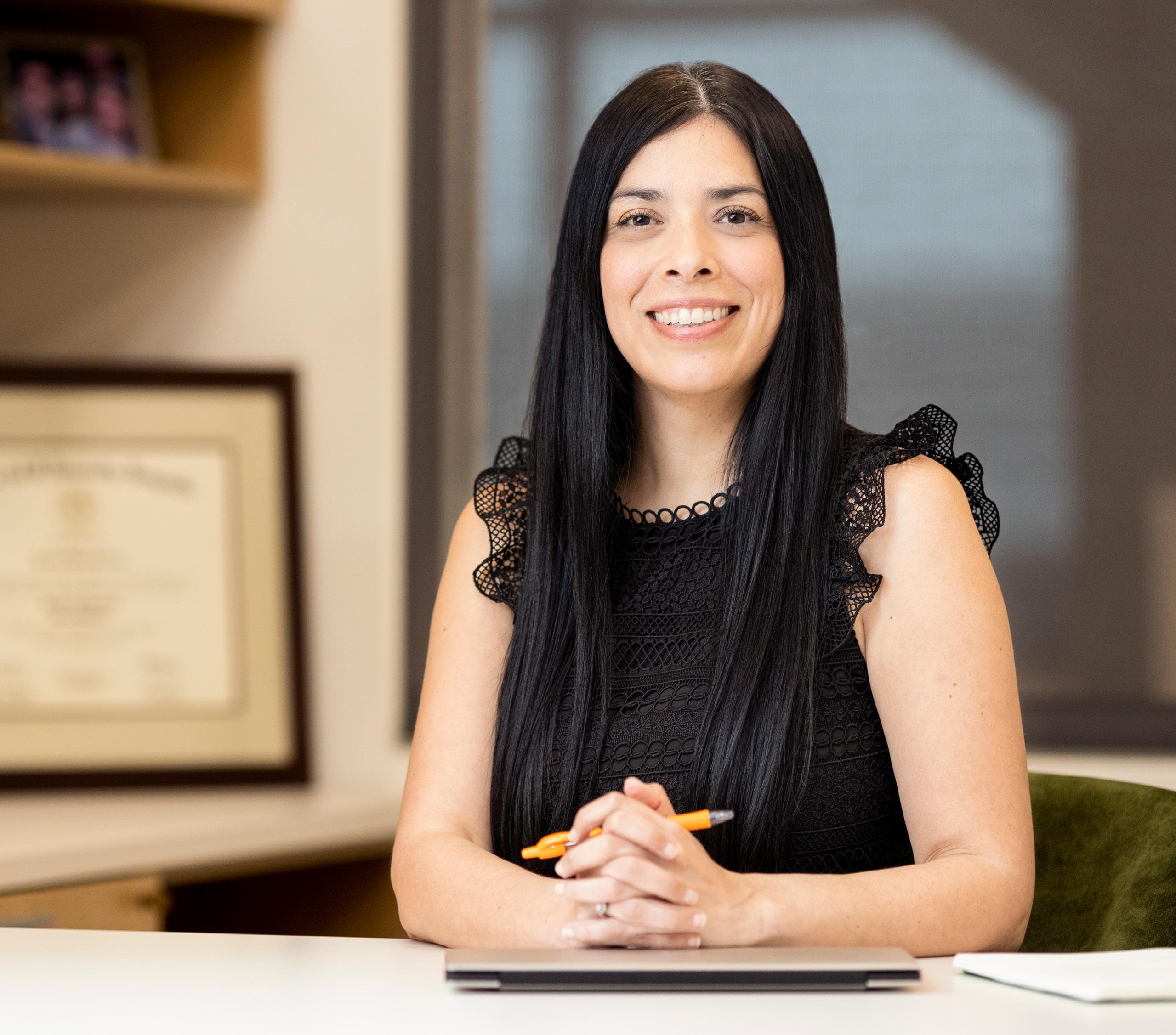
JOHNNY Q PHOTOGRAPHY
Those who collaborate with Gonzalez believe in her relentless drive and vision as well—and, ultimately, feed off of it. “Dolores is a great partner and leader,” says Stacy Miles, chief operating officer of the National Math and Science Initiative. “She has high expectations, which pushes us to continue to raise the bar on our own work. Thanks to her suggestion, our teams meet quarterly for strategic planning to better serve IDEA students.”
As IDEA celebrates their twentieth anniversary, Gonzalez continues to uphold the original vision of cofounders Tom Torkelson and JoAnn Gama. Fresh out of college and part of Teach For America, the pair addressed inequities through after-school programing. Seeing results, they decided to start a school with the mission that every kid goes to college. Gonzalez aligned with their methodology. She reports that, in the past eight years, only two of IDEA’s thousands of graduates did not matriculate to college, and completion rates have soared to three times the national average. IDEA runs a robust alumni program, emotionally and financially supporting college students. Also, it has a prep program that features eleven AP courses: the equivalent of one college year.
IDEA is not worried about filling new seats. In the 2019/2020 school year, nearly thirty-five thousand students applied for fourteen thousand spots. As the organization grows exponentially, it expects demand to keep pace. Gonzales wants quality to grow as well and aims high, saying, “Every campus should earn an A this year.”
To that end, IDEA opened eighteen schools in 2018, while Gonzalez also orchestrated a massive six-month curriculum overhaul. The chief program officer still takes a
deep, calming breath before launching into the story. Leaning into excitement from principals and leaders around Great Minds math and reading curricula and the Being a Writer program, Gonzalez explains, “We decided that if it was good enough for one school, it was good enough for all.” She adds, “Opening up eighteen schools is as hard as rolling out a curriculum like this.”
For Gonzalez, facilitating the shift in curriculum meant convincing teachers and parents of efficacy, materials distribution, and training. Huge belief in the project kept her energized, and the 2019/20 school year assessments are proof: third graders who started the curriculum as second graders ended up outperforming previous classes.
Gonzalez happily reports that she did not lose a single team member during the process, mi
though she learned a few lessons. She values the importance of thinking before jumping in, the emotional challenge that comes with change, and the difficulty of seeing shortterm versus long-term. They’re lessons that IDEA asks its teachers to teach students.
As she considers massive curriculum shifts, training thousands of new and existing teachers and managing everything from ELL to athletics, the chief program officer still attends spelling bees and cheers on first-time kindergartner competitors. Even in this arena, though, she has set metrics. “Within five years, we want to have a student at Scripps,” she says. Then she begins to talk enthusiastically about history competitions a teacher wants to enter before she stops herself and laughs, saying, “That’s the thing here at IDEA. We go all in.”
“I used to think I needed more people. Now I know I just need the right people with the right expectations.”
24 Mission
identidad: MI “ LATINA”
COLLEGE READINESS STARTS EARLY

with top-notch teachers
Unlocking student potential starts with great teachers.
NMSI’s Laying the Foundation gives teachers

the
resources they need to raise expectations and develop advanced levels of thinking and learning.
Led by expert educators, LTF helps teachers (grades 3-12) build subject matter expertise, enhance their leadership of diverse classrooms and prepare students to be confident and creative problem-solvers.
Young students with great teachers are more likely to understand complex concepts that are critical to rigorous coursework in higher grades.
LTF-Trained Teachers See Results
Grade 8 ACT ASPIRE™ Scores1
415 420 425 READING MATH
Students without an LTF-trained teacher
Students with an LTF-trained teacher
1 Phelan, J. and Brown, R. (2017). ALSDE/A+ College Ready LTF teacher implementation evaluation study (West Coast Analytics Research Report). Irvine, CA: West Coast Analytics. nms.org/myLTF Bring LTF
to your district.
Antonio Argibay of Meridian Design Associates creates spaces of innovation, connection, and learning
The Nexus of Architecture and Education
BY SARA DEETER
HISPANIC EXECUTIVE’S LAST CONVERSATION IN 2018 with Antonio Argibay, the managing principal of New York City-based architectural firm Meridian Design Associates, Architects, PC coincided with the firm’s completion of WarnerMedia’s relocation to Hudson Yards. The project was a very important one for Argibay and his team, involving collaboration with other major New York City architecture firms as well as groundbreaking design work for almost a half million square feet of rentable space.
Since then, Meridian Design Associates, Architects has begun designing Discovery’s new world headquarters in New York City and planning with other major clients for their own expansions. “We provide services to a wide variety of projects across the country. The key to our success is that when we come to work, we do the things we love,” Argibay asserts.
Everyone at Meridian is deeply committed to their work, an example of the firm’s “People First” strategy. “People First is about increasing awareness of the business benefits of nurturing a company’s values and culture,” Argibay says. For nearly forty years, he has advanced the idea of a “People First” culture at his firm because the choices architects make every day have an impact on the lives of the people who will be here long after we are all gone.
Argibay doesn’t have any posters describing the firm’s core values hanging on the walls. Instead, he relies on every employee at Meridian to live those values—sustainability, innovation, loyalty, personal development, quality, and opportunity—and to lead by example every day. “When you develop those values, there is less absenteeism, less employee turnover, and higher efficiency because everyone has a much more engaged relationship with their work tasks,” Argibay stresses, “Meridian is purposely and meaningfully engaged with each one of its employees.”
On a roughly quarterly basis, Meridian organizes events designed to embody the firm’s values and maintain the importance of being socially engaged both within and outside of business hours. “We’ve held book signings,” Argibay says. “We’ve had artists, business leaders, scientists, and authors come in to talk about their works. This kind of salon environment, where people can exchange ideas outside of their daily tasks: that’s how we are going to stimulate everyone’s minds.”
Argibay’s passion for creating spaces for learning extends far beyond the walls of Meridian. Over the past two years, his passion for architecture and culture—and the nexus between the two—have converged during his service as a board member of the Friends of the National Museum of the
26 Mission
Antonio Argibay Founder and Managing Principal Meridian Design Associates, Architects, PC
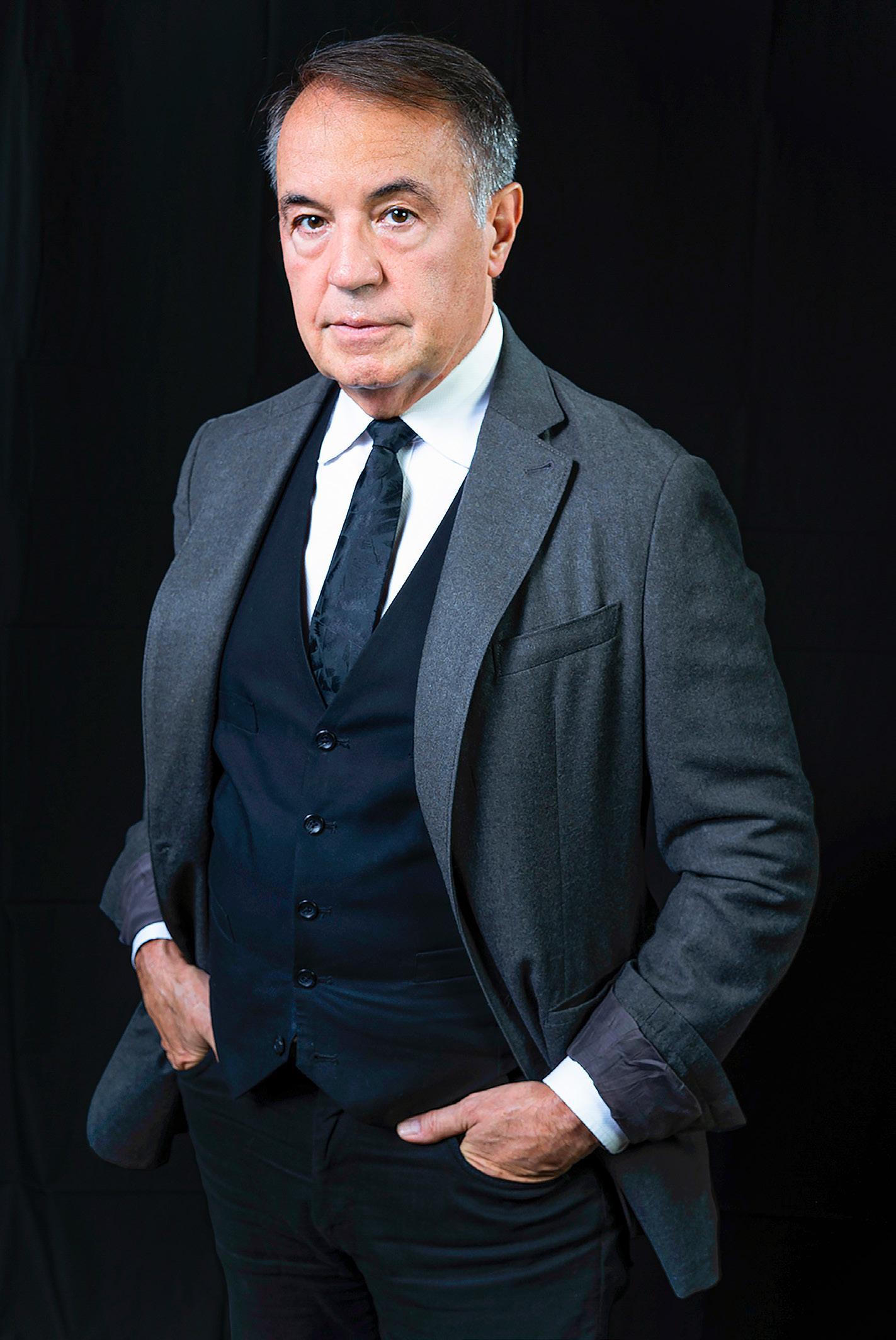
PRACTICAL PHILOSOPHIES
Much as his firm Meridian Design Associates, Architects, PC prides itself on providing elegant yet practical architectural services to clients around the world, Antonio Argibay has advice for rising young Latino executives that strikes a balance between idealism and pragmatism:
Stop self-censoring
“We all do it because we’re so afraid to fail. Let your ambitions fly. Put your fears and insecurities aside.”
Develop the will
“Our willpower is much of what makes us special. You must be able to harness the power of the self to succeed. You will fail, so analyze your mistakes and use your intrinsic drive to get back up again.”
Imagine yourself better
“Improve yourself physically, mentally, and spiritually; these things are inseparable to achieve your maximum potential. Expect to fail. This is how you become better. Learn to analyze and avoid the same mistakes.”
Find the right mentor
“To improve, you will need a teacher to guide you. You must demonstrate your worth and enthusiasm for growth to attract the right mentor.”
Be adaptable
“Positivity is a must. A major key is being able to maneuver around the negatives and find ways to produce the ‘yes’ you seek.”
GEANDY PAVON
27 Hispanic Executive
JRM Construction Management

Building on Experience, Building with Integrity


mi identidad: MI
“I describe myself, perhaps this is old school, as Cuban American. Why? Because it acknowledges an ethnicity beyond Latino, and thus underlines the diversity that is at the core of being Latino, a diversity we should take pride in and savor. We are a glorious mosaic—multiracial, multicultural, and with a wide range of religious beliefs.”
American Latino. He and the board are working to establish a permanent space for learning, knowledge, and sharing that will benefit the American Latino community and all Americans.
“The organization’s goal is to establish the National Museum of the American Latino as part of the Smithsonian museum system,” Argibay explains. “In the mid-1990s, the Smithsonian published what came to be known as the Willful Neglect report, which openly acknowledged that there has been serious omissions of Latino contributions to this great country. In the years since, former President Bush and President Obama created a commission, which finished an expansive multiyear report expressing the need for the National Museum of the American Latino. The board is presently looking to find the sponsors necessary to pass the Senate bill, already having done so in the House with more than a two-thirds majority.
prominent businesspeople and scientists throughout US history, he notes. The report is central to highlighting the contributions of Latinos as a thread of the Americas’ tapestry, not a recent patch. “This history has been frequently omitted from the American story, and this is what the Willful Neglect report addresses,” Argibay adds.
“I believe there is a large cultural void in our Latino community as our different Latino experiences morph into the American experience,” Argibay says. “Education allows us to interpret where we come from as well as where we are going. This museum is a perfect opportunity to get everyone excited about learning—and learning about their communities.”
New York 212.545.0500
New Jersey 973.887.0082
California 949.480.3410
www.jrmcm.com
“With each step we’ve taken,” Argibay continues, “I’ve not only become more passionate about our mission but have also learned how different the Latino experience is in the various regions of the United States.”
Latino presence in the US predates the English colonies, and Latinos have fought in every war and have been
As Argibay sees it, the knowledge contained within the National Museum of the American Latino will do more than fill the gaps in textbooks and public awareness—it will also help rebuild critical interpersonal ties. Argibay hopes the museum will accomplish a strengthening of mutual bonds and affirm commonalities for all Americans. “The museum is going to provide a permanent educational institution where all visitors, especially children, can learn what has been obscure for too long.”
28 Mission
Preconstruction Construction Management General Contracting Construction Services Design Build | Green Building
Giamara Rosado builds on the legacy of her Bronx community thanks in part to her rapidly growing legal team at Acacia Network
Preserve and Prosper
BY COURTNEY RYAN
IT’S REALLY NO WONDER THAT GIAMARA Rosado has found a home at Acacia Network. After all, the nonprofit was built by ambitious individuals, and Rosado has been around ambitious individuals all her life—beginning, first and foremost, with her grandmother. Rosado’s grandmother moved from Puerto Rico to New York as a teenager with the dream of creating a better life for herself and for her family.
“My grandmother and mother paved the way for the family to be successful and showed me what hard work can do,” says the Bronx-raised Rosado. “The women in my life really showed me how to be strong and pushed me in my education.”
That push from her family sparked a lifelong love for problem-solving, which carried Rosado through undergrad at Penn State and to a transformative intern gig with the nonprofit Acacia Network. It was there that she realized there was a diverse array of services in place that could enable her to use her legal skills and give back to the Bronx.
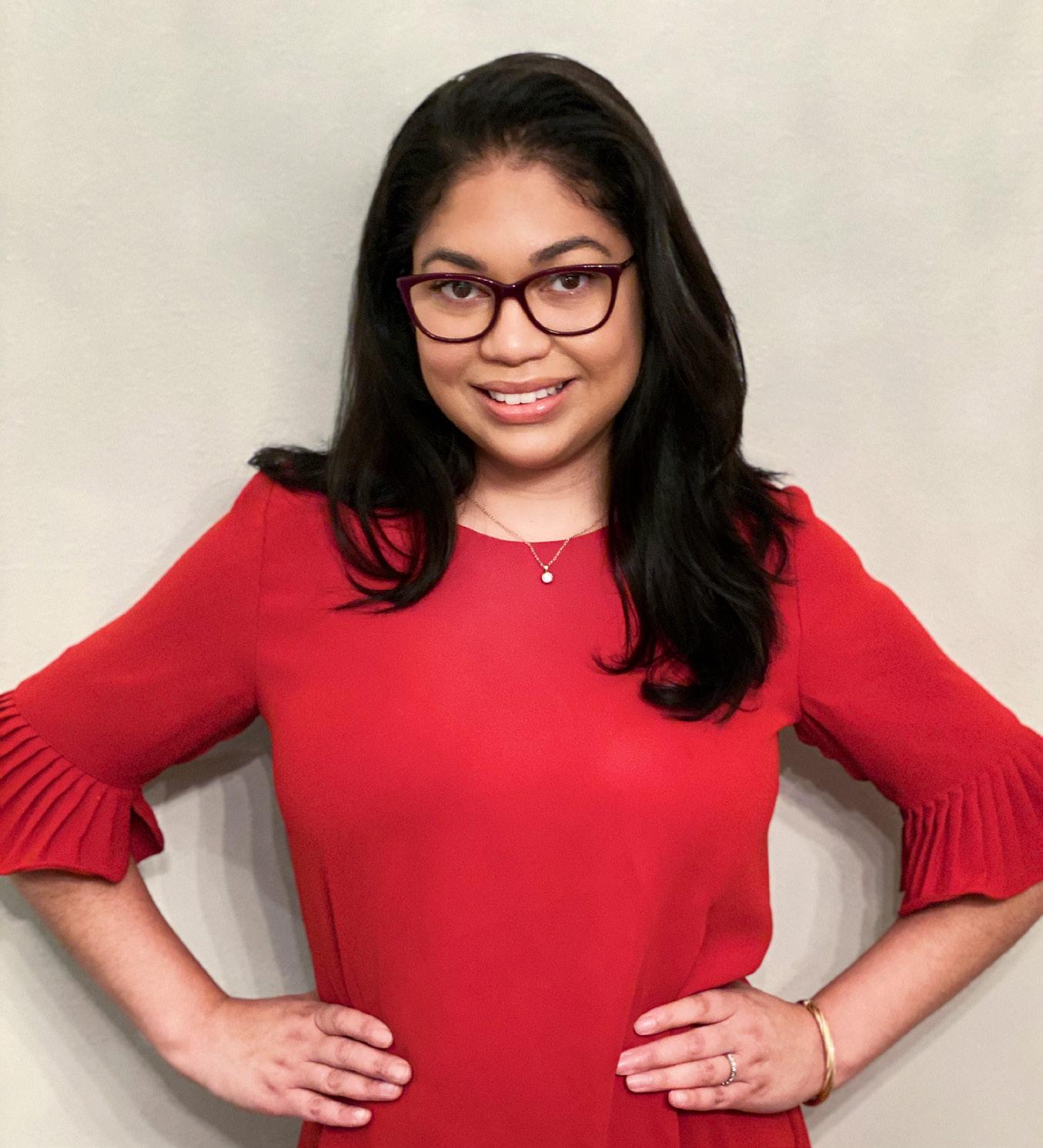 Giamara Rosado SVP and Executive Deputy Counsel Acacia Network
Giamara Rosado SVP and Executive Deputy Counsel Acacia Network
29 Hispanic Executive
REMAINING FOCUSED DESPITE THE CHAOS
Considering Acacia Network has its hand in just about every aspect of society— from housing to day care to senior services—there’s rarely a dull moment, which is fine by Giamara Rosado. “It’s never the same, one day to the next,” she says. “There’s always something going on, whether it’s a submission with a deadline or an emergency in one of our sites or this pandemic that we’re going through.”
To ensure that she and her team stay above the fray, Rosado stresses the need to celebrate successes, even if they’re small. “It sounds cliché when people say that to be happy in a job you need to find one where you love what you do, but it’s true,” she says. “It’s always rewarding when we’re able to pull together and contribute to what is on the table at the moment, especially when you know that what you do every day affects other people.”
“I always wanted to bring my education back to the community that I grew up in,” Rosado explains, though she does admit that she was initially daunted by the tangled world of social services. “I have seen what happens when an organization is not able to keep up with the changing world around them. It’s frustrating to see the deprivation of essential services to our communities.”
Instead of finding stagnation, however, Rosado was pleasantly surprised to discover that Acacia Network responded directly to the Latino community’s need for housing, healthcare, and social services. “Acacia Network was such a dynamic place. I saw that they had an infrastructure that enabled them to maintain essential services throughout the city . . . And I wanted to be a part of it and help nonprofits succeed.”
Rosado enrolled at CUNY School of Law, where she focused on the service of human needs and was able to cut her teeth at the school’s Community & Economic Development Clinic. After graduating, she quickly returned to Acacia Network and rose from deputy counsel to executive deputy counsel before taking her current seat as senior vice president.
“I’ve been given the challenge of building on our legal team to coincide with the growth of the network,” she says of expanding the legal department from herself and one other to a team that now includes a chief legal offi-
cer, compliance officer, risk manager, and four paralegals. Rosado hopes to add additional attorneys and paralegals. During the recent COVID-19 pandemic, she has been encouraged that Acacia Network has been able to keep many individuals employed.
This was similar to when the organization scored a major victory by securing affordable housing for seniors in Puerto Rico. “The organization used local employees with expertise to do that project, even during Hurricane Maria,” she says of what became a huge team effort. “The Puerto Rico project was one of the main goals of our CEO. Our chief operating officer took the lead role, and I contributed as much as I could. Now, I believe the senior home is at capacity, so that’s a great story of overcoming adversity.”
Looking ahead, Rosado plans to do much of the same work, but on a bigger scope. A good example is how she’s currently leveraging her legal acumen to assist with Acacia’s one hundred-plus related entities— both through managing the contract review and addressing the city and state clearance process for funding contracts. Her ultimate focus, she says, is to carry the torch first lifted by Puerto Rican New Yorkers like her grandmother before her.
“The legacy that was started from community leaders in the Bronx is being preserved and built on,” she says. “It’s important to maintain what our community leaders started
30 Mission
so many years ago. I hope to continue to serve our communities to make sure that all their hard work was not for nothing.”
Rosado is continuing Acacia Network’s legacy in multiple ways. She shared a few of her recent daily challenges and opportunities with Hispanic Executive:
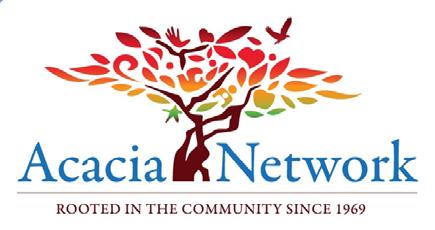
MANAGING THE UNEXPECTED
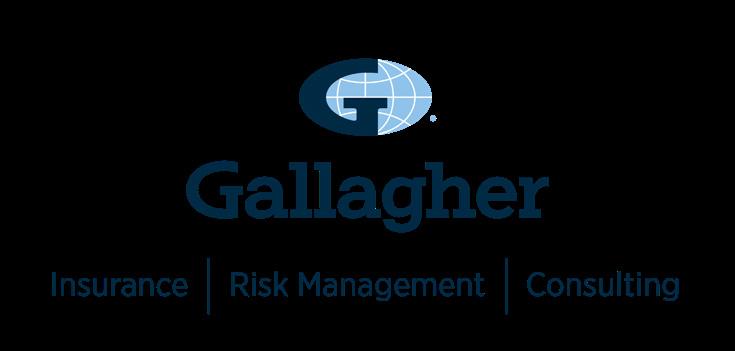
A major goal for Rosado has been to conquer the intricacies of government contracting and use technological capabilities so that the organization can better confront any unexpected issues facing the community. The first test for this initiative has been a major one: the unprecedented spread of COVID19, particularly in New York, where life came to a complete standstill in early 2020 due to the pandemic.
“We serve such a fragile population,” she says. “We have senior centers, a nursing home, a juvenile program for youth who have no place to go.” Fortunately, the streamlined technology system helped the organization address the challenge. “We’re keeping up with the changing regulations and maintaining the legal needs for the network even in unimaginable circumstances— that’s the most rewarding part.”
PAYING IT FORWARD
“There are a few people during my career who I feel really held out a hand and showed me that things are possible if you focus on your goals, so I feel

mi identidad: MI
“Identifying as Puertoriqueña and Boricua has always made me proud. I am a Nuyorican, and I’m proud of that as well. My roots run deep from New York and Puerto Rico. My identity comes from both places.”
like it’s only right to do that for the next person in line,” Rosado says of her approach to mentorship. She helps her paralegals develop career goals and finds future opportunities for them, whether the next stage is at Acacia or elsewhere. “[My internship] let me try things and struggle, so it’s important for me to do the same for others.”
LEADING
FROM WITHIN
Rosado likens her management style to leading a band. “We each have to play our instrument well to make beautiful music,” she says. “I’m not a litigator, I’m not a medical compliance professional, but I understand that they all have their focus and their expertise, and they make the team better because of it. I think that’s how you gain respect from your team members—you value what they can contribute.”
31 Hispanic Executive
is proud to honor GIAMARA ROSADO from
for this incredible achievement!
At Bank of the West and beyond, Janeth Medina Larios builds relationships and acquires skills
Branching Out
BY CORA BERG
“ARRIMATE AL ÁRBOL QUE TE DE SOMBRA.”
That’s what Janeth Medina Larios’s father told her in 2009 when she left Bakersfield, California, for Mills College, where she would be both a first-generation university student and a DACA recipient. “It translates to ‘Seek the tree with the most shade,’” says Larios. “This symbolizes mentorship and sponsorship for me, and it has never failed me in my journey.”
She shared the same quote with a room full of Bay Area leaders in 2013 as she accepted the Financial Women of San Francisco’s annual scholarship. It didn’t fail her then either. A member of Bank of the West leadership heard her speech and offered Larios a mentored position as an analyst in corporate security as she finished her four-plus-one: a BA and MBA. She accepted and has been with the financial institute ever since.
Larios says that while she’s the first person in her family to receive a college degree, one of her biggest inspirations is her father, whose formal education ended in elementary school. He immigrated to the US as an adult—leaving behind a business in Mexico—and started his life in California picking fruits and vegetables. Today, he’s foreman of hundreds of acres of farmland in the Central Valley. “He knows everyone in the Central Valley,” Larios says with a laugh. “Wherever I go, people give me oranges and grapes.” It is this entrepreneurial spirit, with a special emphasis on building relationships and bringing together resources, that serves as an example to Larios.
In her six years with Bank of the West, spurred by a constant drive to learn and foster relationships, Larios has held a variety of positions. As vice president within BOTW’s corporate social responsibility group, she’s a part of several internal initiatives to fulfill a corporate responsibility promise. In October 2019, she launched into a year as a community ambassador for BOTW. Assigned to Earth Island Institute (EII), a nonprofit environmental group founded by David Brower in 1982, Larios has been putting her relationship-building skills to use. “I am responsible for driving community and development strategies for EII,” Larios says. “The role aligns my passion for giving back with the skill set I have developed in the last six years at the bank.”
Earth Island Institute is a fiscal sponsor for more than eighty projects and is a hub for grassroots campaigns dedicated to conservation, preservation, and restoration of the environment. In her work with the organization, Larios applies her professional expertise, supporting an expansion in revenue and funder bases as well as revamping donor strategies. The project has also given her the opportunity to assess her own adaptability to a change in environment. The constraints of only having one year to work, she says, enhances her intentionality around growth: “I’m getting to connections faster and am more proactive about understanding priorities.” She’s also excited that the position is allowing her to develop more transferable skills.
as a means of giving back wherever possible
32 Mission
mi identidad: MI
“I identify as Mexican. I was born in Mexico, and I have always been very proud of my heritage. I am really thankful to my parents for that, because I understand many people lost that appreciation and knowledge about their culture to assimilate in the US. I am also a Dreamer. I came to the US with my family to pursue a better future, but I have always held on to the values and traditions from my motherland.”
The nonprofit world is not new to Larios. She has been on the boards of several organizations, including the Financial Women of San Francisco, for the past five years. “I’m lucky to have a lens into this world,” she says. When Larios discovered she loved finance, she thought going to business school would make her an asset to her family. She now helps many members of the Latinx community by developing supportive programing and, of course, developing relationships that bring people and knowledge together.
She’s also a former president of Latinos in Finance, an organization with Bank of the West sponsorship that aims to diversify the employment pipeline through collective knowledge sharing and grassroots access to opportunities. “The more you move up the ladder, the fewer people you see that look like you,” Larios says. She seeks to support Latinx professionals through increasing access to Latinx leaders and addressing collective concerns. “Group-led education is the fastest way to bridge gaps,” she explains.
Keenly aware of how being a DACA recipient affected many of her choices, Larios now wants to give back to her community. For example, she had very little guidance when she was applying to colleges and would like to help others facing the same issue. She sees other problems to address as well, specifically around women’s empowerment and the unequal allocation of philanthropic dollars.
In her corporate strategies work at BOTW, Larios has had a chance to use her skills in making connec-
Janeth Medina Larios VP of Corporate Social Responsibility Bank of the West

tions and identifying synergies that break down barriers to business cooperation and advancement. She has also grown the bank’s Hispanic resource group at a national level with the intention of promoting a positive culture. Larios helped revamp strategies for this group and developed partnerships with Latinx organizations. She reports focused and well-received leadership development trainings across the bank’s entire footprint in her national chair role. She is also proud to say she brought Rosie Rios, the forty-third treasurer of the United States, to speak.
When her year as community ambassador with Earth Island Institute ends, Larios will return to a role inside BOTW. For the moment, she says, she enjoys a great deal of autonomy in her work with EII, which has not only increased her confidence but also helped her respond more proactively in any situation. Both those skills will serve her well in the future at Bank of the West, whatever her next role might entail.
COURTESY OF BANK OF THE WEST
CommunityFocused, Inside and Out
BY CORA BERG
PETE DELGADO BEGAN WORKING AT NINE years old. His father owned a trash hauling company, and young Delgado’s duties included not just mopping and sweeping but also acting as an interpreter, delivering invoices, and picking up checks. He so enjoyed the hospitals on his father’s client list that after serving in the military, he completed a degree in hospital management, then reached out to the hometown hospital chief executive officer he had presented invoices to as a kid to ask for an internship. “He rolled out the red carpet for me,” Delgado says. From there, he worked his way up through several hospitals to become president and chief executive officer of Salinas Valley Memorial Healthcare System (SVMHS).
Delgado likes to tell this story about picking up a broom at nine years old because, he says, “It’s a reminder that no one does it by themselves.” In his seven years at SVMHS, he has turned around the once struggling healthcare system, but he doesn’t take all the credit. “It’s not me. It’s my talented team that
does the heavy lifting and executes strategies as planned. We invest heavily in their development and provide appropriate management tools.”
But Delgado is clear about his own role. “What does the president do?” he asks, before immediately answering his own question. “Drives change in culture with a focus on quality and safety. I try to create an environment where our staff can thrive. We’ve implemented working values called STAR (support, teamwork, accountability, respect). We identified appropriate behaviors for each value and incorporated them within everyone’s evaluation. This accounted for 50 percent of their evaluation.”
When Delgado started seven years ago, he says, employee engagement scores sat in the 6th percentile. Delgado set out to win the hearts and minds of his staff and worked hard to win their trust. They’ve since climbed to the 82nd percentile. “They like what they do, where they work, and feel valued,” he says of his employees.
Having rejuvenated SVMHS, Pete Delgado focuses on the right ways to care for his employees and his neighbors
34 Mission
Delgado and his team have significantly increased access to medical care for thousands of families. He directed the growth of Salinas Valley Medical Clinic—a network of physician practices with more than 150 providers— which now provides access to care for everyone, regardless of a patient’s ability to pay.

Under Delgado’s leadership, Salinas Valley Memorial has created adult and pediatric diabetes centers, a state-of-the-art infusion center, a primary care clinic in Gonzales, and a

RANDY TUNNEL/SALINAS VALLEY MEMORIAL HEALTHCARE SYSTEM
Pete Delgado President and CEO Salinas Valley Memorial Healthcare System
mi identidad: MI
“I’m a Tejano. My ancestors came from the Canary Islands in the early 1700s and settled in what today we call San Antonio, Texas. San Antonio, as you know, was under the French rule, then Spanish, then part of Mexico. Ultimately, Mexico sold all the land north of the Rio Grande to the US. Of course, I have a strong Mexico influence. I embrace the Mexican culture as well as our American culture—but at the end of the day, I’m a Tejano.”
mobile health clinic that brings medical care to underserved areas of the county, at no charge to patients.
In addition to the hospital, the healthcare system has grown to include thirteen urgent care centers, outpatient facilities and clinics, physician practices, and services throughout the county. Delgado also led the effort to bring the Blue Zones Project to the community, designed to transform health through policy and other changes—and help people live longer, healthier lives.
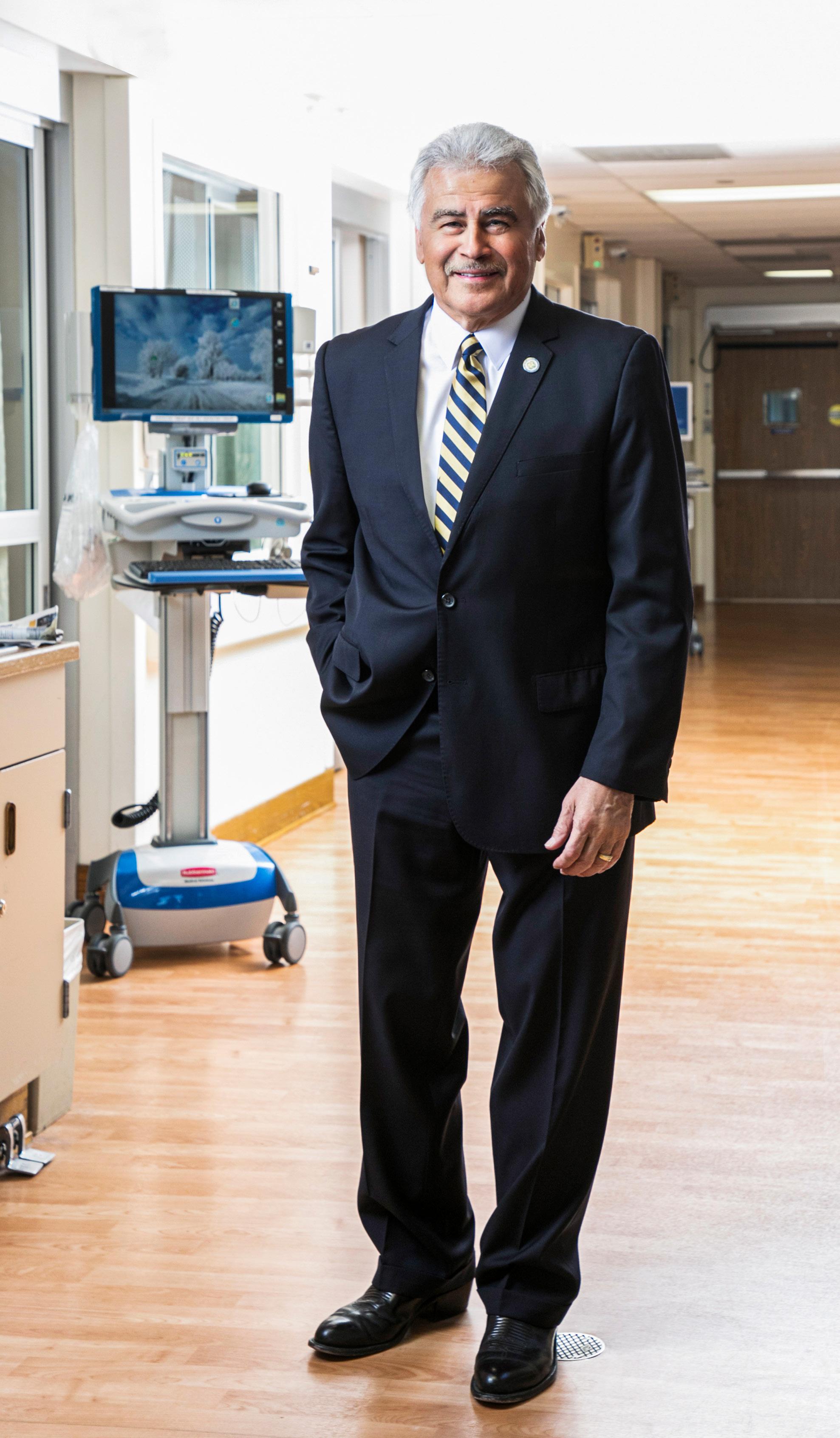
And Delgado never forgets the bottom line. “Don’t take your eye off the financial ball,” he says. “At the end of the day, no matter what type of hospital you are, you have to have more revenue than expenses. No margin, no mission.”
Delgado has been very active in the community, too, having served on the board of directors for Rancho Cielo Youth Campus for the last six years. He is also a member of the Salinas Downtown Rotary, and he serves on boards of several healthcare industry organizations. When he is not working or volunteering, Delgado indulges in his true love: performing mariachi music.
Without a doubt, Delgado’s ability to execute his vision for healthcare has benefited the communities in the region.
“At the end of the day, no matter what type of hospital you are, you have to have more revenue than expenses. No margin, no mission.”
RICHARD GREEN/SALINAS VALLEY MEMORIAL HEALTHCARE SYSTEM
STRA TEGY Strategy
What
38 Ruth Giansante, World Fuel Services 43 Alberto Perales, Elementia 46 Omar Galan, United Community Bank 48 Jose Medina, RT ProExec 55 Ignacio Martinez, Smartsheet 58 Mariela Ure, Universal Studios Hollywood 62 Larissa Zagustin, ViacomCBS 64 Hector Izzo, Suez 66 Rudy Rodríguez Jr., CEC Entertainment
impressive executives featured here share theirs, and they are strategies that engage both the mind and the heart.
is your secret to successful leadership? The
Bringing It All Together
BY A.J. ZAK
Ruth Giansante breaks down silos and builds up communication and collaboration across teams at Miami-based World Fuel Services
38 Strategy

LYNN PARKS 39 Hispanic Executive
RUTH GIANSANTE NEVER EXACTLY pictured herself working in finance. As a teenager, she knew she wanted to go to law school—even at age thirteen she was an analytical thinker with a passion for complex reading. During her first full-time position at a top law firm in her native Puerto Rico in the early 2000s, though, she discovered that the partner track was not for her. She found herself craving a more diverse work experience and a better work/life balance. When an opportunity came up to join a company as legal and finance director, she took it.
That decision set her on the trajectory to where she is now, as senior vice president of finance services at World Fuel Services, a Miami-based global fuel logistics company. Since joining the business about fifteen years ago, Giansante has worked to build up its
legal department, reposition the audit function as a strategic part of the business, and in 2018, she was part of a team that embarked on completely reorganizing the finance department. Today, she leads a team of 140 people across 7 functions of the business.
Giansante spent her early formative years in Italy before her family moved to Puerto Rico, where she was born. Her background and international upbringing made her comfortable early on in life with the concept of being an outsider.
“When we were growing up in Italy we were always the American kids, and when we moved to Puerto Rico we were the Italian kids,” says Giansante, who speaks Italian, Spanish, English, and Portuguese. People often ask her if she feels more Puerto Rican or more Italian, and it’s a tough
Ruth Giansante SVP of Finance Services World Fuel Services
WORDS OF WISDOM
Ruth Giansante offers these pieces of advice to Latino leaders who strive for success:
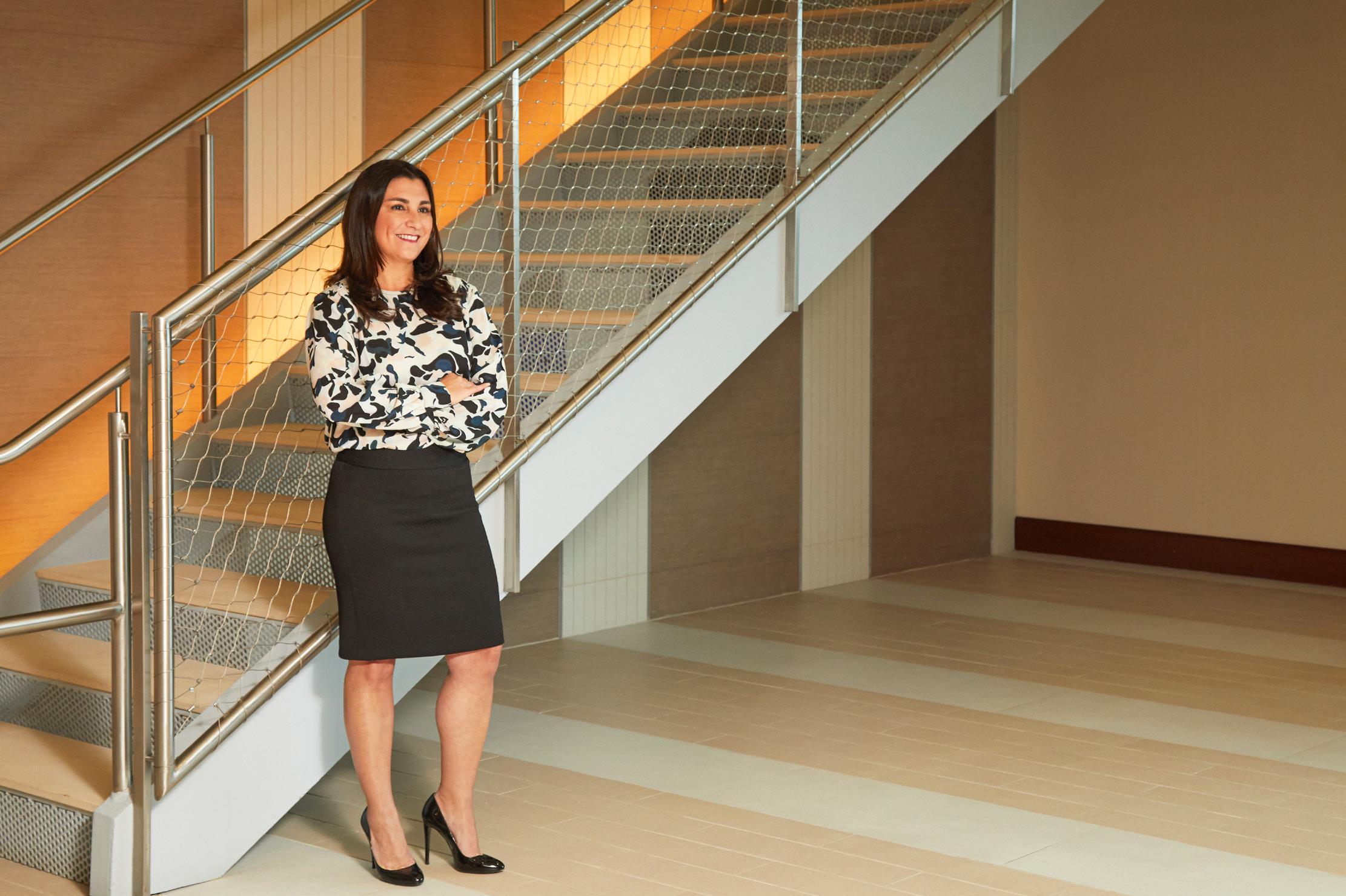
Don’t be rigid in how you progress in your career. Be open-minded and flexible.
“There’s a tendency in this day and age to think, if you choose the job you love you’ll never work a day in your life,” she says. “But the truth is, even in a job you love, you have to work hard.”
To be a successful leader, you have to be humble and trustworthy.
Lastly, Giansante cited a quote from Supreme Court Justice Sonia Sotomayor: “Build bridges instead of walls.”
LYNN PARKS
40 Strategy
mi identidad: MI






























































































“Being half Puerto Rican and half Italian, I’ve always believed the term Latin is more appropriate to identify myself since it represents not only people from Spanish-speaking countries but also from countries speaking other romance languages such as Italian, Portuguese, and French. After all, Italy was the birthplace of Latin culture. My youngest brother coined the term Boricualianos to refer to us, which I think is brilliant as well!”
question to answer, she says. “It’s hard for me to really choose one, and frankly, I don’t believe that you have to.”
At the University of Puerto Rico, Giansante double majored in accounting and finance before attending the university’s law school. After graduating in 2001, she joined O’Neill & Borges, a prestigious firm based in San Juan. Her plan was to work her way up the ladder there. But then, in her third year with the firm, her course shifted. Former executives from software company Citrix—whom Giansante knew from college—were launching a new business called Knowlity and wanted someone with business and legal expertise to join the team.
She became Knowlity’s legal and finance director. Two years in, the bulk of her work with getting the company’s legal and compliance functions


set up was finished, and she found herself craving a new challenge. But her time at Knowlity helped her realize she wanted an in-house role with a global organization.
She moved to Miami in 2004, and that’s where an opportunity with World Fuel Services came up. Giansante joined the company as senior counsel, the first hire made by the general counsel. Early on, it was just the two of them juggling transactional and commercial matters, latenight phone calls to talk to attorneys in distant time zones, building a new corporate governance and compliance structure, and more.
In 2014, an opening appeared for a chief audit executive in the company’s finance department. Having a deep understanding of governance, risk, and compliance from her legal roles,




















Think differently. And together.
In an inclusive culture, differences in backgrounds and perspectives can inspire bolder thinking. The result? More vibrant, daring, and innovative solutions. See what inclusion powers at deloitte.com/us/inclusion.








41 Hispanic Executive
© 2020 Deloitte Development LLC. All rights reserved.
Copyright
Giansante was intrigued by the opportunity. Senior leadership wanted to change the perception of the audit function from a “check-the-box” role to a more strategic business partner position, she says.
So, she took the job, and worked on integrating the audit function throughout the organization, without losing its crucial independence. Giansante credits her success to the fact that she had by that point spent years building strong relationships with team leaders.
“Once I started talking to them about what audit could do for their operations, it came from a different perspective,” she says. “It wasn’t, ‘Well, audit is here to check on the work I’m doing’—it was more from, ‘Yes, we have to do that, but we will guide you in improving your controls and processes.’”
In 2018, World Fuel Services’ chief financial officer identified the need to take a holistic look at the company’s finance function, Giansante says. That led to a complete transformation of the department, including reorganizing finance into three core groups. Another recent focus is on breaking down unproductive silos among different teams.

“We have a lot to improve on, but you can definitely sense the shift in the culture,” she says. The transformation focuses on building a collaborative environment, with a priority on open communication. Along with that evolution, World Fuel Services has renewed its focus on the characteristics it looks for in new hires and existing team members—people who are humble, hungry, and people-smart.
Giansante’s own transformation from her roots as an attorney to her current role in finance has been both challenging and rewarding, she says.
“I’ve accepted the fact that once a lawyer, always a lawyer. That’s just ingrained in the way I think,” she says. “But having that analytical way of thinking and considering commercial, compliance, and legal risks in decision-making has been a great asset in my finance career because I can approach matters from a different perspective than someone who has always looked at things from a purely accounting or finance perspective.”
Her varied background has also proven useful in her role as a servant leader for a large, talented team. That means letting go of control and instead looking for places where she can help to make the company’s teams cohesive.
“I’m tasked with bringing it all together,” she says.

42 Strategy Congratulations
“I’ve accepted the fact that once a lawyer, always a lawyer. That’s just ingrained in the way I think.”
, Ruth!
Here’s to all your well-deserved recognition. We are proud to be your valued partner and honored to celebrate your leadership achievements.
Sincerely, Your JLL partners
Keeping Legal Accessible— and Coherent
BY BILLY YOST
ONE MONTH AFTER ALBERTO
PERALES
was hired as general counsel at cement and construction materials company Elementia, the Mexico City-based organization announced it would be spinning off a newly created entity that would comprise the metal products and building systems components of the business. While a spin-off of a public company is a common occurrence in US business, it’s rarely seen in the Mexican market. “There have been maybe one or two companies that have gone through this sort of reorganization that have been listed on the Mexican Stock Exchange,” Perales says. “There are significant negotiations to conclude—from banks to bond holders to the stakeholders at the Securities and Exchange Commission here. And I was very involved from the onset.”
Hitting the ground running is one thing, but Perales had to do more than that: his experience was more along the lines of trans-
forming a sixty-eight-year-old business while simultaneously creating a new public company. Fortunately, he came in with experience in telecommunications, technology, and oil and gas, all of which helped him learn the new business quickly.
Perales actually sees the spin-off as a bestcase scenario, pointing out that it offered a crash course in learning exactly how the business works—an important part of the acclimation period for any general counsel. “Not only was I learning about our business, but we were doing presentations for our board of directors and stockholders to explain how we envisioned this would work in the future when the two units split,” he says. “That also meant explaining how things had worked in the past. It was a great education for me and a pretty one-of-a-kind experience.” The spin-off effort continues, and Perales says he hopes the transition will be complete by the end of 2020 or the beginning of 2021.
43 Hispanic Executive
At Elementia, Alberto Perales has demonstrated how the legal department can be a help rather than a hindrance
HELP AT ALL LEVELS
Alberto Perales has managed successful transactions for a variety of organizations, but he’s also given his time to help those who need it most. The lawyer offered pro bono work for ShelterBox— an international disasterrelief charity that provides emergency shelter and other aid items to families who have lost their homes to disaster or conflict—when the organization was first entering Mexico.
He is also helping Elementia build out its sustainability and green initiatives. “We want to be the green provider of construction materials in Mexico and wherever else we’re located,” Perales says.
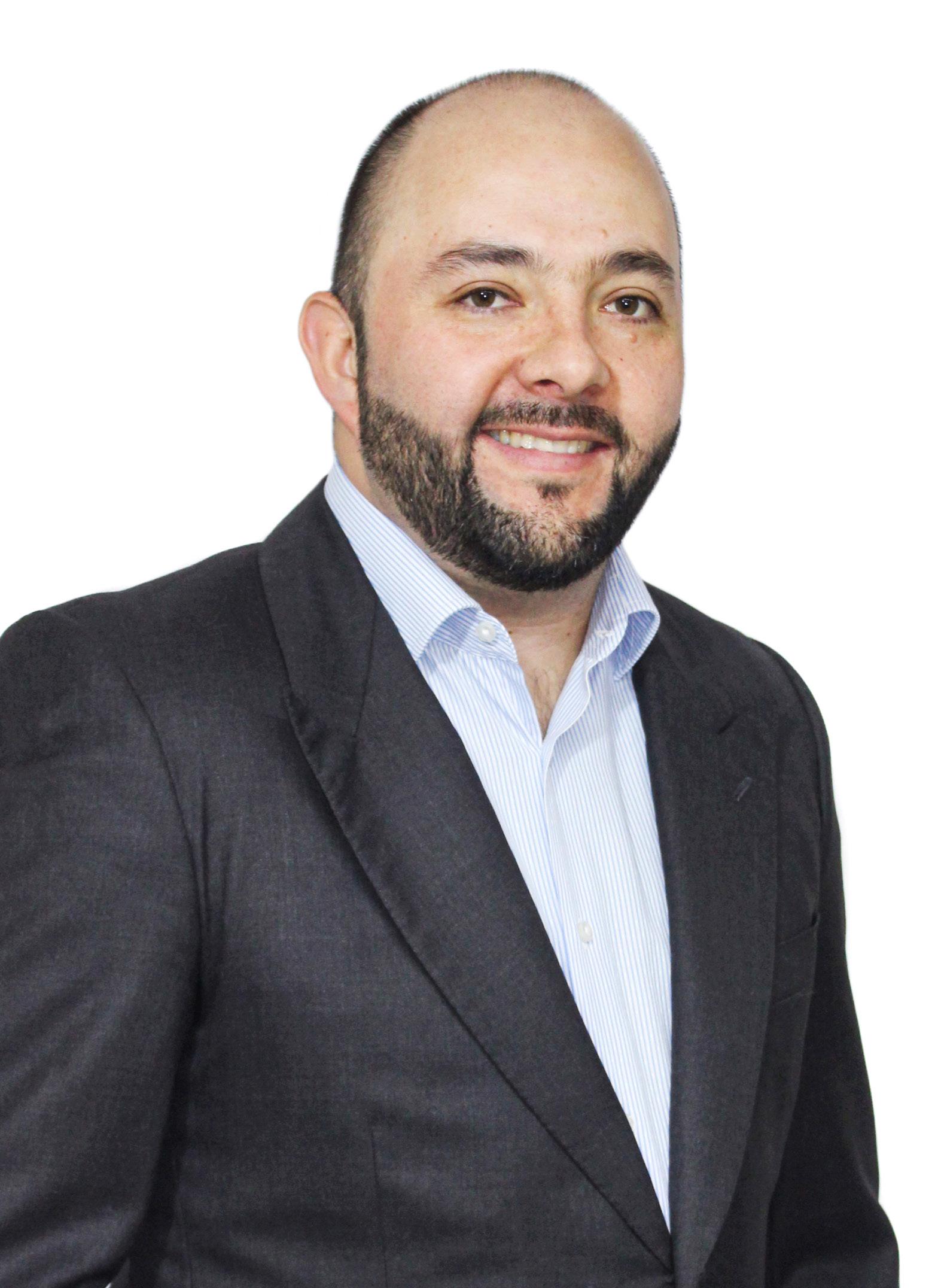
“We know we can make a difference by being greener, and we’re currently working with an external firm to address efficiencies in all of our different business units. It’s a complicated process, but it’s one that we are dedicated to.”
MORE THAN A LAST RESORT
The new company structure wasn’t the only issue of concern for Perales when he arrived at Elementia. “When I got here, I think legal was really seen as a last resort,” he explains. “It was a department you came to when you had trouble that you couldn’t solve or you just wanted to have someone take it out of your hands. We’ve been working to enact significant changes to that kind of mind-set when it comes to our internal clients.”
Perales says he wants the legal department to be seen as enablers for
Elementia’s business units. Accomplishing that has meant being proactive in explaining to various departments how legal can help them. “We had to do a lot of education because I don’t think the business understood what legal could do for them and how the earlier we see it, the more we’re able to able to help,” he explains.
Under Perales’s direction, the legal department started offering preemptive actions to business units from procurement to credit to sales, with the idea that those units could then go to their own clients and promote the
CLAUDIA VALENCIA
44 Strategy
Alberto Perales General Counsel Elementia
initiatives made by the renewed legal parameters. “I think we have much more control over how we’re handling transactions from a legal standpoint now, and I think that’s really helped the business,” Perales says.
A HANDS-ON APPROACH TO LEADERSHIP
While Elementia is the first company where Perales has held the role of general counsel, the lawyer’s extensive experience in multiple industries has led him to value open communication as part of his leadership. “Vertical organizations were obviously created for a reason, but I don’t see it working that way right now,” Perales says. “I like talking with my team every day; I dedicate a lot of time to communicating with my managers and attorneys at all levels.”
That also means that while part of Perales’s job is to see the bigger picture, he’s also comfortable with focusing on the specifics of whatever he works on. “I’m very hands-on and really enjoy getting into the details with my team,” Perales says. “When you get involved in the matters and provide whatever assistance you can when it’s brought to you, I think my team appreciates it, and it’s also very rewarding for me.”
Perales takes a candid and personal approach to communication outside of his department as well. “It obviously took some time, but I think I now have a very straightforward relationship with everyone on the executive team,” he says. “It’s just easier to knock on the door and start talking about something that needs to be done.”
mi identidad: MI
“I identify myself with the term Mexican for obvious reasons. We Mexicans have a special identity with the past and the present, pride for our pre-Hispanic roots, and hope for a modern and promising nation. We also have a special relationship with the US because of our closeness, but we remain faithful to our culture. I am proud that Latinos are now getting more recognition for our contributions, but this comes also with the responsibility to get better every day to maintain and increase such recognition.”
45 Hispanic Executive
Supporting visionaries.
Pepper proudly salutes
Perales Mendoza and Elementia.
to
nonprofit organizations and individuals.
Troutman
Alberto
We serve as trusted advisors
leading businesses, governmental entities,
troutman.com
Troutman Pepper Hamilton Sanders LLP
Omar Galan uses tactics he learned in the Air Force to support United Community Bank and its customers
Ready to Deploy
BY CORA BERG
OMAR GALAN PRACTICES WHAT HE calls “preventative medicine.” The senior vice president and associate general counsel for United Community Bank (UCB) isn’t talking about actual medicine, although he did grind through one year of medical school: the prevention he practices focuses on legal and financial concerns for customers and lenders.
A shy kid who moved from Puerto Rico to Arizona when he was eight, Galan says he encountered a steep language-learning curve after arriving in the US. A few years later, his family headed to Germany, where he gained a deep appreciation for the culture’s organization and efficiency. He planned a military career, and after graduating university as a first-generation student, he was commissioned as an Air Force officer. Galan supported missions and deployed to Turkey, Iraq, Kosovo, and other classified locations around the world as his unit’s intelligence officer, which he says he found truly satisfying. “I was responsible for squadron/group briefings, and mission planning, and I even reassured the aircrew of the integrity of my information by flying combat missions with my aircrew,” he explains.
While Galan loved the Air Force work, after four years he realized he also loved his home life and wanted to start a family. After his wife, who worked at Mercer University
School of Law, convinced him that a JD offers a wide range of fascinating career choices, he completed his law degree at Mercer. He spent several years in commercial real estate law before shifting focus and taking a position at United Community Bank eight years ago. “I’ve become well-rounded,” he says.
Though he left the service years ago, Galan has brought Air Force processes to UCB. “In the Air Force you are either deployed or training for deployment,” he says. “We constantly train for the game.” Galan wants “frontline” employees to know how to spot and respond to legal risks, even if they do not know the solution to the problem entirely. Basing topics on legal trends he sees, Galan leads ongoing, in-depth trainings every other month, starting with a few minutes of music prior to the call and ending exactly on time. A recent focus on loan covenants and events of default has led, he says, to a trackable reduction of questions and issues for loans that may be headed to the bank’s loss mitigation or special assets departments.
Galan started at UCB as legal counsel and is now responsible for responding to all of the operating company’s legal risks, including supporting the company’s 149 brick-and-mortar locations, back office operations, M&A, vendor contracts, and, most recently, litigation.
Discussing his general workflow, Galan says that in any given week, he might expect his average days to include communicating with concerned customers and providing real time support to bank employees on matters that could increase the bank’s legal or reputational risk. In reality, he says, “You don’t know what wild card might be waiting. A
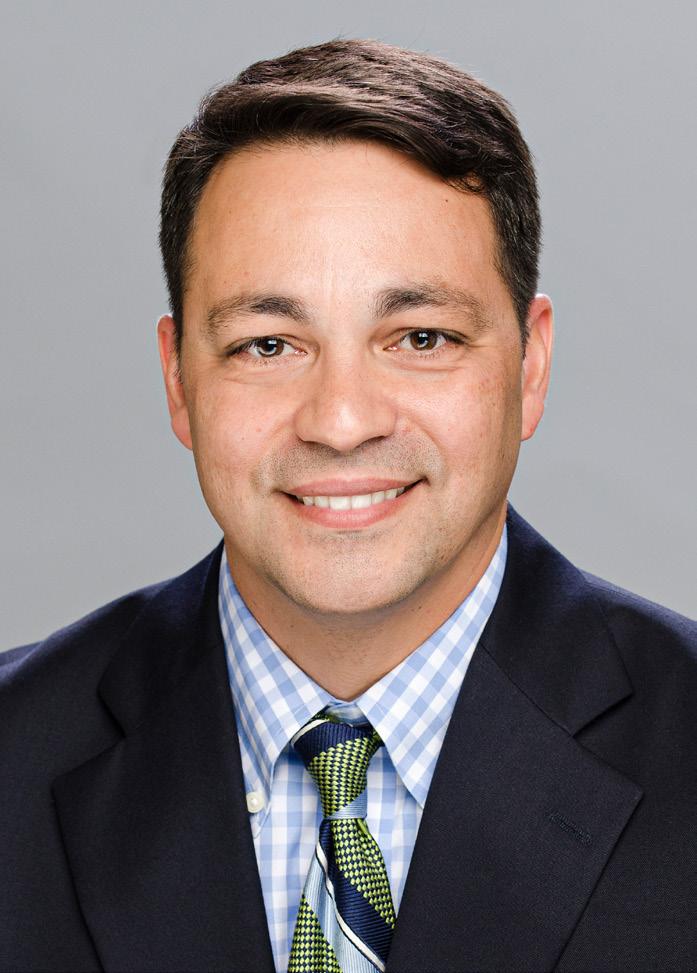
VELVET BLUE PORTRAITS
46 Strategy
Omar Galan SVP and Associate General Counsel United Community Bank
customer might have crashed a car into a branch office, or a wire fraud case may have popped up.” Recently, for example, he was called to respond to a situation that involved a customer struggling with dementia. The customer’s children, unable to access their parent’s account, had concerns about financial decisions the customer was making. Galan helped the family find solutions, including providing read-only online banking access for the customer and walking the customer’s son through the steps needed to take over the account.
Because of this incident, Galan is leading UCB in looking at other preventative measures to avoid potential problems, including a review of bank policies and procedures, trying to balance elder-abuse concerns and best practices to assist customers suffering memory loss, educational tools for tellers on both how to spot signs of difficulty with banking and how to respond, and a social media campaign to educate customers.
It’s an all-encompassing approach to proactive problem-solving that those partners who work with Galan have noticed and heralded. “As one of the financial service industry’s top executives, Omar demonstrates excellence in all that he does,” explains Ron C. Bingham II, a partner at Adams and Reese LLP. “It’s our privilege to work alongside such an outstanding leader as Omar and to watch his continued success.”
Galan’s team, responsible for the risk and safety of the bank and its

customers, manages with a very lean head count for an institution of UCB’s size, he says. A general counsel, a legal counsel, two paralegals, and two legal support members—together with Galan himself—run all legal functions for the $13 billion bank.
“Our culture is very customerfocused,” Galan says. “We give the benefit of the doubt.” While this means that UCB sees fewer disputes and litigations, he explains, he is called on to take time and be flexible when problems arise. “By the time an issue gets to legal it’s been through the ringer. We look for solutions that will benefit all involved.” Galan’s strategy involves listening and finding out what is not being said.
Despite the challenges of his job, Galan is proud of his employer’s values, noting it has both high customer satisfaction and high workplace ratings. “The bank treats others as they would like to be treated,” he says. UCB, which recently expanded to a new state, is looking to double in size in the upcoming years, and Galan is ready to grow along with the company.
In February 2020, Galan took on a new challenge: he was appointed cochair of UCB’s brand-new diversity and inclusion committee, nicknamed the Power of U. Focused on improving customer service, increasing performance, and designing welcoming environments, Galan is excited for the new addition to his role. “Let’s start small, and we will build momentum,” he says.
As SVP and Associate General Counsel of United Community Bank, Omar Galan sets a higher bar for us all. We are proud to work closely with Omar and other financial services industry leaders to help their companies grow and achieve more. We congratulate Omar on his remarkable career and look forward to what’s to come.
“Our culture is very customer-focused. We give the benefit of the doubt.”
ALABAMA FLORIDA GEORGIA LOUISIANA MISSISSIPPI SOUTH CAROLINA TENNESSEE TEXAS WASHINGTON, DC www.adamsandreese.com Congratulations,
Omar Galan
Working Twice as Hard to Get Half as Far
BY CLINT WORTHINGTON
Jose Medina was raised to believe in the rewards of hard work. Today, he applies those principles in helping RT ProExec grow exponentially.
TKTKTKT
48 Strategy
Jose Medina’s attitude and work ethic were instilled in him from an early age.
Born in Cuba, Medina immigrated to the United States in 1967 at the age of three. His family of four shared a one-bedroom apartment in the Bronx (New York), and Medina’s parents educated him on the dignity and necessity of work. “My mother taught me that I would have to work twice as hard to get half as far,” Medina recalls.
Some of his earliest memories of his father are hearing him whistling at five o’clock in the morning as he prepared to catch two separate buses to arrive at his maintenance crew job. This taught Medina about the joys that come from work and the dignity it provided: “He never had to go to work, he got to go to work,” he explains. Medina has applied those principles to a long career in insurance work at AIG, Executive Risk, Carpenter Moore, and OakBridge, and he still believes in them today as president of RT ProExec, a division of RT Specialty.
When Medina joined RT Specialty’s professional and executive liability team as president in 2010, the insurance division’s premium sat at about $200 million. Nearly a decade later, the division finished at $1.4 billion in premium, a fact Medina chalks up not just to RT’s acquisitions but the substantial organic growth they’ve experienced during his tenure. Thanks to a customer-centric approach and the efforts of Medina and his hardworking team, he’s been working diligently to find ways to maintain that growth while simultaneously elevating service standards.

Our coverages run the gamut
At Travelers, we understand that flexible insurance options are important to your future. That’s why we’re committed to solutions that can evolve with the times. From traditional management and professional liability coverages to innovative cyber protection packages, Travelers has the ability to adapt to the changing needs of your business. Today – and tomorrow.
travelers.com Travelers Casualty and Surety Company of America and its property casualty affiliates. One Tower Square, Hartford CT, 06183 © 2020 The Travelers Indemnity Company. All rights reserved. Travelers the Travelers Umbrella logo are registered trademarks of The Travelers Indemnity Company in the U.S. and other countries. CP-9546 Rev. 4-20

LAUREL CHAMBERLAIN
50 Strategy
Jose Medina President RT ProExec
One of the partnerships Medina enjoys most is his collaboration with fellow RT ProExec president, Alex Jezerski, an old friend and colleague of over twenty-five years. “I am proud to say that Alex and I have never had an ill word towards each other,” says Medina. Any issue, including strategic decisions, is usually solved with a brisk walk around their building to talk it out. “If it’s a difficult decision, we simply walk around the building twice.”
Together, Medina and Jezerski strive to make the most of RT ProExec’s customer-centric business model, which Medina cites as a major factor in the division’s success. “From our end, we do not limit ourselves to simply competing against our peers,” he explains. “Rather, we hold ourselves up against any company, irrespective of industry, that offers exceptional customer service.” Medina’s goal is to be as good as, if not better than, any other company providing relevant value for their customers. By setting the bar
high, he hopes to provide the level of attention and professionalism that his company’s retail partners deserve.
This approach has paid incredible dividends over the last few years: RT ProExec has become the largest wholesaler in the professional, executive, and transactional liability field, with twenty-five offices across the United States and a strong team of three hundred dedicated professionals. But Medina doesn’t plan on slowing down; instead, he’s looking for new ways to approach the business with the fundamental idea of providing exceptional customer service to their retail partners. As Medina says, “We subscribe to the notion that there is no such thing as best, only better.”
It’s a mentality of which Medina’s longtime business partners have always taken note, and one that has ultimately helped him forge stronger bonds along the course of his career. “In our business, one of promises, relationships matter!” explains Jane Peterson, chief
MI
mi identidad:
“I am certainly proud of my heritage, but as far as I see it, I am an American—and very grateful for that. Many are born in America, and hence consider themselves American. I value the fact that I was not born here but chose and was accepted to be an American.”
“We hold ourselves up against any company, irrespective of industry, that offers exceptional customer service.”
51 Hispanic Executive
Cutting Edge Coverageour Produc ts make the di erence.
underwriting officer at Markel Specialty. “I have known Jose for twenty years and admire his integrity and passion for both the industry and his customers. Above all, his genuine interest in colleagues, tremendous sense of humor, and humility set him apart as a person and a leader.”
While Medina takes stock of RT ProExec’s successes and begins to plan the next decade of strategy, he’s learned two significant lessons as a manager and leader. Primarily (“and this will come as no surprise,” Medina admits), the customer comes first: “We have to provide our retail partner with value, and in order to do this, we preach that you must be exceptional at your vocation.” That means moving quickly and intelligently, being responsive and high-energy, and adapting to change as it inevitably arrives.
E-Risk Ser vices is dedicated to providing innovative, comprehensive, top-quality underwriting services for Management Liability Insurance Products. Our company is extremely exible and easy to work with, and the “E” in our name re ects much of what we o er. ww


The second lesson, and the most important one, is to practice humility as your business grows. “I’m reminded of Ralph Waldo Emerson, who once said, ‘The louder he talked of his honor, the faster we counted our spoons,’” Medina explains. While confidence is key, it must be accompanied by hard work, preparation, empathy, and an ability to find solutions.
Looking to the future, RT ProExec is working to continue its immense growth and cement its position in the insurance space. “Generally speaking, we have always welcomed challenges,” says Medina. Luckily, many of his colleagues share the principles of hard work that Medina himself was raised with. “RT ProExec is full of people who adopt the belief that they have to work twice as hard to get half as far,” he says.
52 Strategy
“If it’s a difficult decision, we simply walk around the building twice.”
w.eriskser vices.com/bam
Thanks to Jose Medina for being a leader who inspires us and makes us proud to work in the insurance industry. And best wishes to all of our friends at RT Speciality for continued success.

Congrats!





Our Automation Accelerates Your Compliance GET FEDRAMP AND PCI COMPLIANT… IN 80% LESS TIME IN DAYS, NOT MONTHS FOR 50% OF THE COST www.anitian.com
AUTOMATION
Accelerate your path to compliance, cloud-secure environments, and market readiness. Anitian is Uniting DevOps & Security
SECURITY & COMPLIANCE
PLATFORM
Don’t Worry. Start Planning.”
BY CORA BERG
IGNACIO MARTINEZ’S COLLEAGUES CALL him “Chief Worrier”—and with good cause. As vice president of security, risk, and compliance for Smartsheet, Martinez has a big job. He not only oversees these areas for Smartsheet itself but also helps Smartsheet’s customers understand and have confidence in how they are handled. He says that coworkers tell him, “You protect us from everything,” which is a lot to live up to. Even with so many possible risks to manage, Martinez reports that beyond occasional concerns about where his teenage children are, he generally stays calm. “Don’t worry,” he says. “Start planning.”
Martinez credits much of his composure to the nearly thirty years of consulting he did in the security and risk areas prior to moving into industry and taking his position at Smartsheet. Years of working with a variety of companies exposed him to various industries and disciplines as well as the risks clients faced. The result? Confidence in his ability to assess any risks that might arise and his ability to help teams construct courses of action. He explains that risks that appear new for any individual company won’t necessarily feel unexpected or panic inducing for someone who has shepherded multiple organizations through similar situations before. “It might not be normal for a lot of people, but when one has seen it before, one can formulate a plan,” the VP says, leaning on the mantra by which he has learned to live.
At Smartsheet, Ignacio Martinez complements his decades of experience with a resolve that keeps him laser focused yet nimble when it comes to risk and compliance
“
55 Hispanic Executive
Ignacio Martinez VP of Security, Risk & Compliance Smartsheet
Martinez came to Smartsheet intrigued by its challenges. Currently, the software as a service (SaaS) company is in the midst of a massive global expansion, which provides Martinez with plenty of opportunities to utilize his experience and expertise. One of those opportunities began six months after his arrival in August 2017, when he planned and then led the company in a strategy to achieve FedRAMP authorization, which is a security standard for cloud services in federal spaces. After a long and expensive year that involved the formulation of a multidisciplinary team, the creation of an entirely new instance of Smartsheet, and undergoing third-party assessment, the company got the thumbs-up to deploy the platform and begin to address a large federal demand for Smartsheet’s technology.
FedRAMP authorization is hardly the only success Smartsheet has experienced with Martinez’s support. Since his onboarding, the company has more than tripled in size,
approaching a $400 million annual run rate— not to mention it also went public. “I have watched and helped this company go from a start-up to a major enterprise,” Martinez says.
A key to this success, and something Martinez prides himself on, is building welltaught and functioning teams. As he puts it, “My goal is that no one would miss a beat if I was suddenly gone.” Unsurprisingly, given Martinez’s scope of expertise and influence, the teams he works with regularly are diverse in both purpose and operation. They include corporate security and compliance teams that directly report to the VP. He also has heavy involvement with an engineering information security department as well as the attorneys on the legal team—all of whom work closely with Martinez and run negotiations and drafts.
Of course, Martinez’s facility for teamwork also extends to the partners with which he interacts on a regular basis at Smartsheet. One such partner is Anitian Founder and
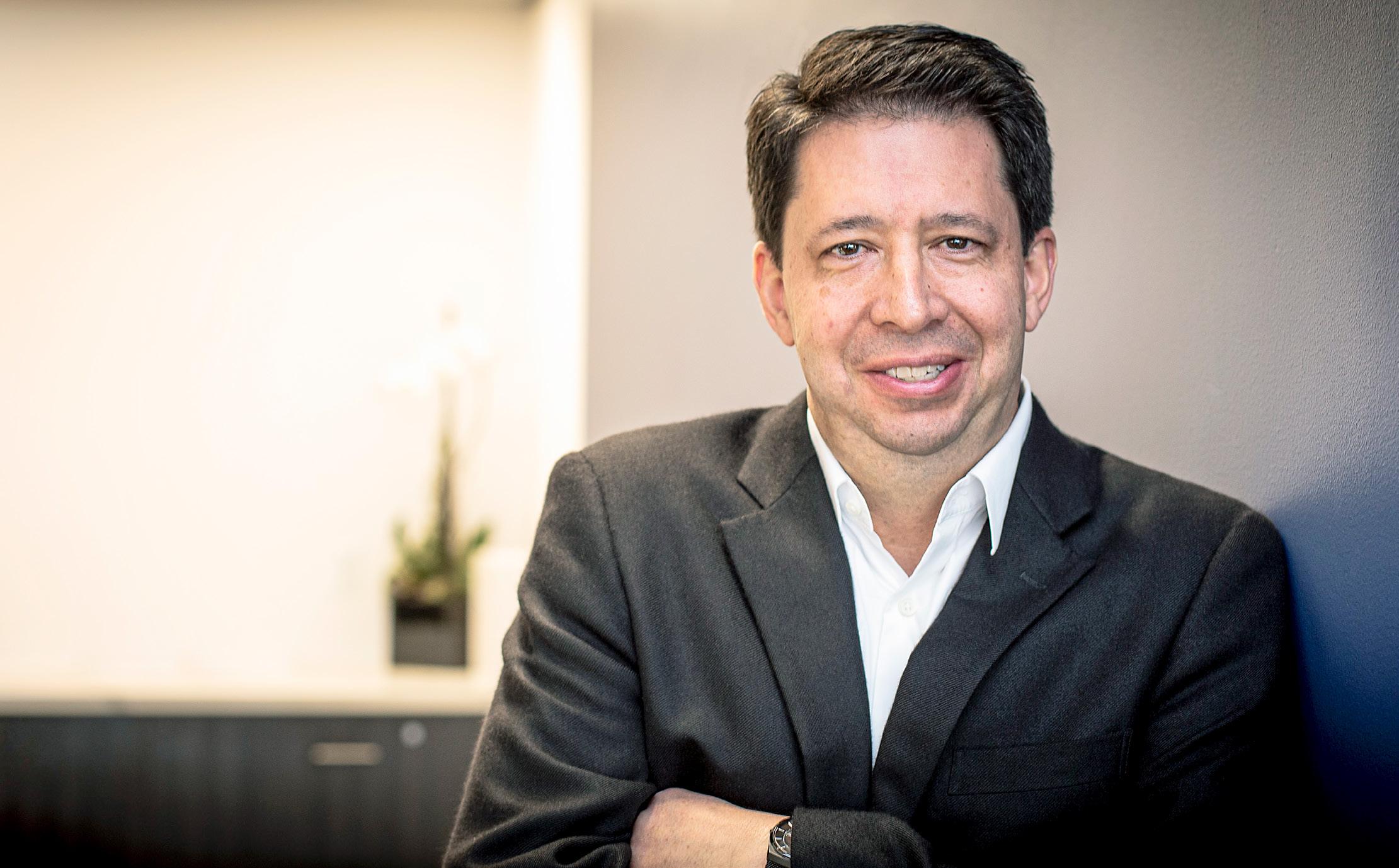
mi identidad: MI
“My world changed about six months ago when one of my boys urged us to do genetic [ancestry] testing. I thought it would confirm what I had figured out about my heritage. Boy, was I wrong. The results came back showing I was nearly all Spanish—a majority from south-central Spain and second from the Basque region of northern Spain/southern France. I scratched my head and realized I had to do some digging.”
MORE ONLINE: To read Ignacio Martinez’s full response, visit hispanicexecutive.com
COURTESY OF SMARTSHEET
56 Strategy
CEO Andrew Plato, who explains, “Working with Ignacio was a tremendously rewarding experience. Ignacio has a deep understanding of risk and security in the cloud. His leadership, patience, and compassion united multiple parties—all working at different cadences—into a cohesive effort that got Smartsheet across the finish line quickly.”
Martinez’s enthusiasm for education, talent building, and teamwork also shows itself in his efforts outside of Smartsheet. Dedicated to expanding educational drive in Hispanic communities, he volunteers with a program that puts at-risk youth through private high schools and mentors them into the college years. In speaking with these young men, Martinez shares his family’s story to show a model for potential. His grandfather, whom he knew well as a child, moved his family to the United States when Martinez’s father was five years old. The family worked as itinerant laborers, but his grandfather insisted that all his children attempt to go to college in order to take advantage of the education available to them. All of Martinez’s aunts and uncles received graduate degrees, and his father, who earned a PhD in organic chemistry, held top-secret posts with the US government. “Face new worlds,” Martinez tells kids. “Take advantage of
education and then there is nothing you can’t do.”
The ingrained understanding that reaching out for opportunity and challenges is impactful will continue to resonate with Martinez as his work at Smartsheet stretches into the future. As he readies himself to take on his next tasks, he talks about a focus on privacy, explaining, “Our customers want to know their data is safe and want to know how it is handled.” He understands that customers, not just the company, seek “protection from everything.” Keeping these concerns front and center, Smartsheet has a focus on protecting customers’ data in cutting-edge ways, all while pushing on towards its first billion-dollar year. Characteristically, as Martinez describes the company’s path, he is both enthusiastic and calm. He is ready. Looking forward to exciting changes and growth at Smartsheet, Martinez knows that, as with every company he has worked for, risk is part of the equation. “To make money in business it is all about risk and reward,” he says. Maintaining this knowledge, and, of course, always willing to plan, the vice president feels prepared for what is to come at Smartsheet. “People worry about the unknown,” he says. “I have confidence because I’ve seen this before.”
Kratos, an accredited FedRAMP Third Party Assessment Organization (3PAO), provides cybersecurity services across all commercial sectors, Department of Defense, and Intelligence Community to meet FedRAMP, CMMC, PCI, FISMA/NIST, and other cybersecurity frameworks. Our capabilities include strategic cybersecurity consulting, cloud security, penetration testing, continuous monitoring, and 3PAO compliance and assessments. CyberSales@KratosDefense.com


“People worry about the unknown. I have confidence because I’ve seen this before.”
57 Hispanic Executive kratosdefense.com CyberSales@KratosDefense.com Kratos Cybersecurity Services Compliance Services Operations, Defense & Engineering Governance, Risk Management & Strategy
Mariela Ure brings lessons learned over the course of her career to her role as chief marketing and sales officer for Universal Studios Hollywood
Marketing Maven
BY STEPHANIE ZEILENGA
BEING INTELLECTUALLY CURIOUS IS a fantastic way to launch a career. Just ask Mariela Ure, chief marketing officer at Universal Studios Hollywood. She began her career as an entry-level intern at Disney World nearly thirty years ago where she quickly learned she had access to one of the top entertainment marketing teams in the world—and she wasn’t shy about asking them questions. “I’d talk to the marketing manager to understand how they made marketing decisions,” Ure says.
She ended up landing a full-time job at Disney as a marketing manager, where she spent the first decade of her career soaking in a world-class education on the fundamentals of marketing. “I learned sophisticated brand management strategies that I still rely on to this day,” Ure says. Disney also gave her expertise in customer-relationship market-
ing—a fledgling trend at the time—as well as marketing analytics and the importance of aligning marketing with the customer experience. “Seamless integration between marketing and the guest experience is critical to elevate a brand,” she says.
After leaving Disney, Ure made it a point to gain exposure to a wide range of marketing disciplines, including advertising, TV production, segmentation strategies, and digital marketing. During the nine years she spent at Bank of America, she worked in various marketing functions—including customer relationship marketing work—and ultimately rose to the level of senior vice president of brand marketing, focusing on the bank’s corporate social responsibility efforts.
Later, she transitioned to work for Wells Fargo, which at the time had acquired Wachovia and needed to develop a national Hispanic
58 Strategy
segment strategy. Her work was instrumental in the bank’s ability to increase market share in the Hispanic market nationally. “In senior executive roles, you’re challenged with solving business problems or pursuing business opportunities,” Ure says. “To accomplish this, it is important to have an understanding of a wide range of levers accessible to you to help a business grow.”
These collective experiences paved the way for her current role as head of marketing for Universal Studios Hollywood, one of the biggest entertainment brands in the world. A former Disney manager recommended her for the job, and she was hired in 2018.
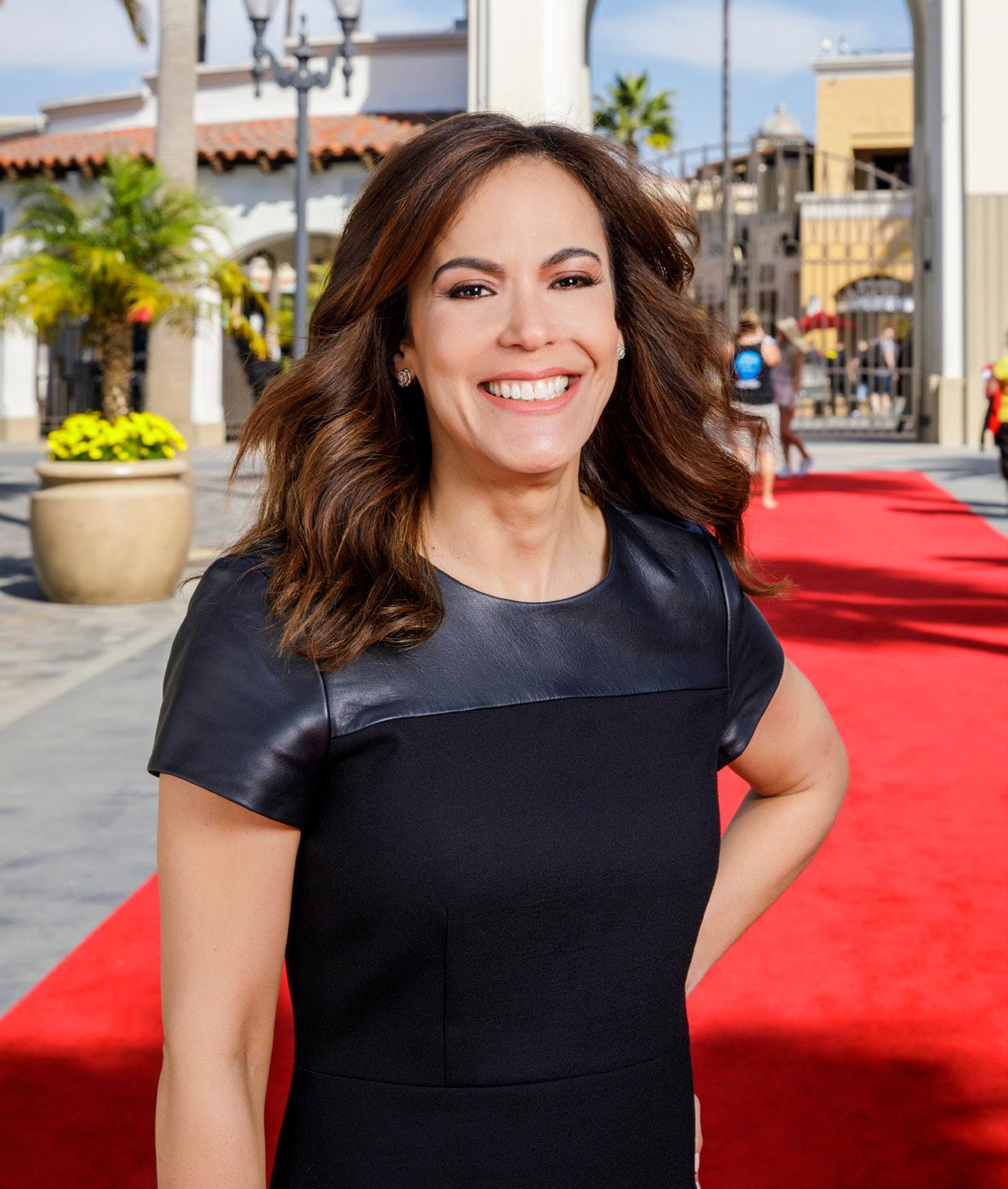
As chief marketing officer, Ure’s main mission is to efficiently drive profitable attendance at the Hollywood theme park, which she and her team of more than one hundred marketers accomplish in a number of ways.
Mariela Ure Chief Marketing Officer— Marketing & Sales
Universal Studios Hollywood
MARIELA URE,






SPARK FOUNDRY



would like to congratulate you on this recognition of your accomplishments.
As you look ahead to the future at Universal Studios Hollywood, we look forward to continuing the ride with you.


DAVID SPRAGUE / UNIVERSAL STUDIOS HOLLYWOOD
One strategy involves devising and executing national marketing plans to raise awareness of new attractions, like the new Jurassic World ride that opened in 2019.
“That campaign was extremely successful,” Ure says. “In addition to achieving the business goals, the marketing campaign was well received by the press and fans. It also received an outstanding response in terms of social media and views.” Now, her team is focused on marketing its newest ride, The Secret Life of Pets: Off the Leash.
Under Ure’s leadership, her team also plans and executes a series of unique events designed to drive attendance and engage visitors. In 2019, Universal Studios Hollywood launched its first Running Universal event, which gave runners (and walkers alike) an opportunity to experience the theme park and the surrounding movie studio in a new way. And soon the theme park will host another new event: Bravo’s Top Chef Food & Wine Festival, which will include food inspired by the hit television show, live cooking challenges, and panels featuring show alumni.
“We’re part of the NBC Universal portfolio of successful brands and it is rewarding to partner with them and combine our assets to bring our guests unique experiences that only we can deliver,” Ure says. “The Top Chef event started with a strong partnership with Bravo, and it made sense to leverage the combined brands to create a food and wine event unlike any other. The inclusion of their chefs and talent helped to create a totally unique event that combines what made Top Chef successful with the unexpected thrills guests only experience at Universal Studios Hollywood.”
Ure says she is relentless in her pursuit of delivering value for Universal Studios Hollywood, but she also credits her team with her success. “I work with some of the best marketing professions in the industry. In leading my team, I use three guiding principles: develop strategies grounded on data and facts, not personal views; collaborate with others because it’s always better than working alone; and strive to elevate performance with empathy and care for others.”
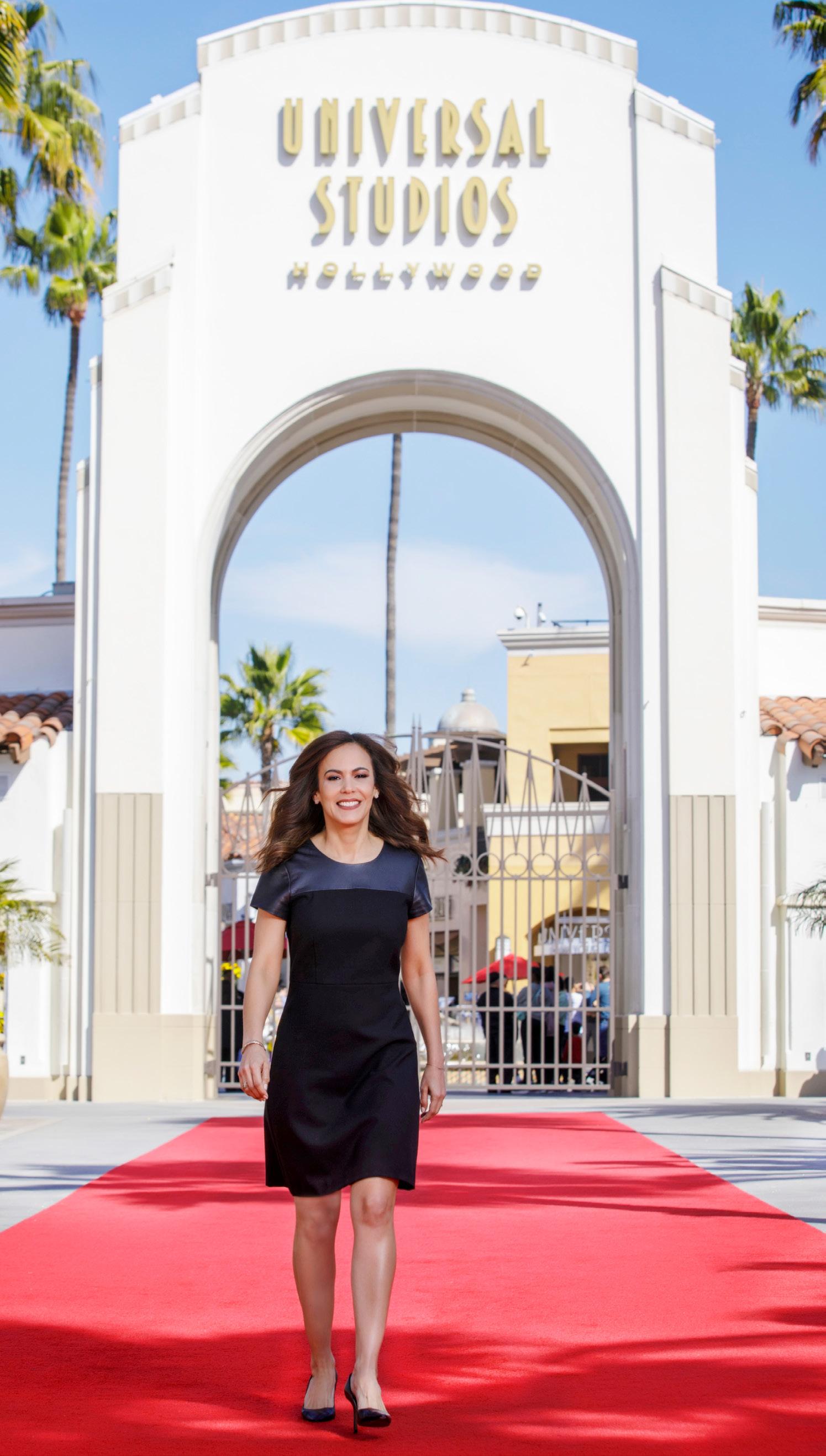
mi identidad: MI
“I describe myself as a Latina/Puerto Rican because I identify and relate with the culture, experiences, work ethic, and many other qualities that people from Latin American countries share."
DAVID SPRAGUE / UNIVERSAL STUDIOS HOLLYWOOD
For those pursuing a career in marketing, Ure has one simple piece of advice: prioritize learning. “It’s critical to find ways to gain knowledge and skills in every job,” she says. “To achieve success, find professional growth and increase responsibilities—it is critical to take knowledge you’ve acquired at one job and bring it with you to your next role. You need to prioritize more than just the job title and how much you’re getting paid.”

Reflecting on her best professional experience, Ure says it was the unexpected that challenged her the most. Earlier in her career, because of a merger at Bank of America in which her job was eliminated, Ure was offered a role in media planning and buying, which she knew nothing about. Instead of running from the opportunity, she seized the moment.
“The company invested in me, provided training, and allowed me work at a media buying agency for a short period. I stepped outside my comfort zone and took a risk . . . and that risk paid off. I was willing to admit I didn’t know what was required of the job, so I learned and later used my learnings to make significant contributions.”
GSD&M congratulates Mariela Ure for being among the most accomplished Hispanic senior leaders in the nation. We are a proud partner to Mariela and the rest of Universal Parks & Resorts. GSD&M is a creatively driven, full-service agency in Austin, Texas, that believes in ideas that make a difference. GSDM.com.
61 Hispanic Executive
“In leading my team, I use three guiding principles: develop strategies grounded on data and facts, not on personal views; collaborate with others because it’s always better than working alone; and strive to elevate performance with empathy and care for others.”
¡WOAH!
CONGRATULATES MARIELA URE for being among the most accomplished Hispanic senior leaders in the nation.
BY ZAYVELLE WILLIAMSON
SVP and GC Larissa Zagustin on her commitment to helping entertainment giant ViacomCBS remain one step ahead of the innovation curve

One Step Ahead
SERGEY MIRONOV/SHUTTERSTOCK.COM 62 Strategy
However, thanks to a top-notch legal team, her own decades of experience, and an eternal sense of optimism, Zagustin has proved more than capable of adapting to those changes and strengthening Viacom’s reputation as a premier provider of entertainment content.
In today’s world, content is king, Zagustin explains. It is why traditional TV channels have given way to subscription-based models such as Amazon and Netflix—and why even industry leaders like ViacomCBS are forced to find new ways to innovate both their products and their business models, year after year.
“We are [in] an industry that is radically changing,” Zagustin remarks in a 2018 interview. “Now, people even watch programming on their phones! Technology is advancing, and as that happens, the industry is changing.
“It makes us think outside of the box,” she continues. “We have to be pioneers in many things, and creative on both the business side and the legal side. It is quite exciting because no one knows what technologies will exist in a year or two. That forces us to think a lot.”
But even if no one quite knows what the future holds, Zagustin says, the company must still prepare for what lies ahead. “We have to know how [content] is being consumed and in which direction the technology is going; we have to find out how to prepare ourselves to be creating products for that type of consump-
tion,” the GC explains in her interview. “We cannot afford to catch up on these issues—we must be one step ahead.”
According to Zagustin, one of the major trends the company is currently looking at may sound too good to be true: free content. Platforms such as Pluto TV, which was acquired by ViacomCBS in 2019, offer a wide array of free-to-access movies, traditional television programming, music videos and concerts, Spanish language entertainment channels, and more.
But while this shift towards free content is good news for consumers, it creates a whole new set of challenges for legal leaders like Zagustin. It is a completely different type of business model, she explains, but she and her teams are still responsible for helping the company create successful, top-quality products.
Fortunately, Zagustin is well up to any challenge that comes her way. An optimist by nature—as she notes in her 2018 interview, “I confront every difficult situation with a smile”—the GC has also made a point of cultivating a broad network of knowledgeable, supportive outside counsel.
“What I value most is that the external consultant is also a business partner,” she says, “that they understand the business and that he does not wear the lawyer’s hat too much—
that is to say that they understand the business operations.” And outside counsel across the world have responded to that need: over the past decade, Zagustin has witnessed a critical shift in the way that legal firms work with corporate clients like ViacomCBS.
“They now support you more when making decisions,” the GC notes. “One appreciates an outside consultant of that kind much more than one who simply tells what the law says.”
And Zagustin can very much understand the effort that it takes law firms to move towards a business-centric model, as she herself has undergone a similar transformation over the course of her career. “Being around people who are leaders and very good in the business sector has influenced me a lot,” comments the GC, who was named to the Legal 500’s GC Powerlist in 2017. “I am no longer just a lawyer; I am also a business partner, a business ally for everyone within the company.”
Santamarina + Steta congratulates Larissa Zagustin on this well-deserved honor. S+S, a one-stop shop of experts in Mexico who develop strategic solutions that produce successful results for our clients, ensuring reliable, multidisciplinary, integrated, and comprehensive approaches. We make our clients’ challenges our own— this is our seal of quality and excellence.
63 Hispanic Executive
Television may seem like one of the staples of American culture, but veterans of the entertainment industry—such as ViacomCBS’s Senior Vice President and General Counsel Larissa Zagustin—know that modern television is fast-paced, ever-evolving, and often completely unpredictable.
By aligning his personal values with the mission of Suez, Hector Izzo has turned in-house legal counsel into proactive business partners

Expanding Past Department Lines
BY ANDREW TAMARKIN
IN TIMES INFLUENCED BY SOCIAL MEDIA
and the buzz of around-the-clock communication, the line between personal and professional identities can get blurred. For some, the fading boundary warrants concern around privacy and conduct. Hector Izzo, on the other hand, understands the situation differently. Individuals ought to be authentic to who they are in and out of the office, so personal ideals must align with company principles in the workplace. Guided by this mentality, Izzo has revolutionized the function of Suez’s general counsel as its chief compliance officer.
Izzo joined forces with Suez to lead their in-house legal team in September of 2017— largely due to the values the company represented. Its dedication to economic and technological development—and its mindfulness of society and the environment—made accepting the job an easy decision. And, since his start, Izzo has “brought the legal into the business” by transitioning his in-house counsel into proactive legal partners.
As in-house counsel, Izzo’s understanding of the pressure points, strategy, and objectives of the business model is coupled with his ability to impart counseling on risks and legal issues
Hector Izzo General Counsel and Chief Compliance Officer Suez
to management. “Rather than only communicating legal advice, I can offer more in-depth counseling,” he says, “because I am an insider.” As such, he expects the same well-roundedness and understanding from his team.
“The legal in-house team you create is the key to your success as a leader,” he explains. “No matter how smart, talented, driven, or passionate you may be as a general counsel, the success of your legal department depends in large part to a strong and motivated team that works well together in accomplishing the tasks and goals that come along.”
Izzo has found that, when regarded as business partners, in-house counsel is less likely to act as a bottleneck to departments. He involves his legal team in business strategies and policies at their developmental stages; and, by interacting cross-departmentally early on with a collaborative win-win approach, his team can better understand company goals and more effectively help balance the legal risks with the benefits.
Bottlenecks are often caused simply by a lack of capacity and efficiency. Oftentimes, no individual team member is responsible for such blockage, Izzo believes. The culprit is revealed
LUIS ANDRES MORA 64 Strategy
mi identidad: MI













“The word ethnicity derives from the Greek word ethnos, meaning a nation; however, such a word is used nowadays more to denigrate by stereotyping a group of people with certain behavior characteristics and framework someone’s nature, rather than identify the social origins. Thus, I don’t like to brand myself to a single ethnicity, but however you want to call me definitely will make me proud, as all ethnics are part important.”
in the overall process or at the time counsel is involved. “From our side, it all begins with awareness and understanding: knowing where, when, and how roadblocks happen and developing the most effective way to surmount these obstacles.”
Thus, by forwarding a message of communication to his team, both efficiency and business growth are better realized.











He doesn’t wait around to be called on by members of his team. He informally checks in. He asks about their current workload and mental well-being. And when someone needs help, he goes out of his way. “I always say, ‘I’m not going to teach bible to the Pope.’ Hence, I’m not going to teach you laws; rather, with my experience, I’ll try to guide knowledge into [application].”

By understanding the strengths of each individual on his team, Izzo feels comfortable delegating tasks appropriately and rightfully recognizing success. Assigning specific projects to specific attorneys fosters a results-driven attitude that prevents the politicism that can saddle corporate legal departments. In this way, no one attorney obsesses over their own career trajectory and instead values the collaborative nature of the team.
“At first, it was complicated,” he says. “The legal team had never been seen as a partner, rather, as a simple

facilitator of questions and answers. Once [this model] was accepted, management realized we were contributing and adding value to the business.” After just one year of Izzo’s new setup, the Legal 500’s GC Powerlist recognized Suez’s in-house counsel as one of the best legal teams in Mexico.
By living up to the expectations he sets for himself, it’s only natural he sets his standards high for his team. But for Izzo, growth is not only defined by success. Growth also comes from the confronting of challenges and learning along the way.
“Mind-set is everything,” Izzo says. “A growth mentality assumes that my views can be changed when they no longer allow me to achieve my goals. I challenge myself all the time. It helps me grow, pushing myself beyond what I believe I can do.”
This mentality serves as his guiding light in and out of the office. He volunteers regularly at local animal shelters and encourages his team to similarly commit to community action. By rejecting a crystal clear personal-professional dichotomy, Izzo can speak on corporate behavior grounded in philosophies that expand past department lines.

As he says: “It’s not only a job title. It requires a self-commitment to preach by example and deal with situations in both a personal and professional manner.”
Not one size fits all, that is why our full-service law firm has developed a client centered legal practice in Mexico, providing tailored services working side by side with our clients, understanding their business objectives and needs.
It is an honor to work with Héctor Izzo, outstanding deal maker and leader, who has allowed us to have a deeper understanding of Suez and the industry which reflects on the quality of the services we provide.

Contact us +(52 55) 2591-8881 info@farahrevilla.com.mx www.farahrevilla.com.mx MEXICO CITY
Delivering Smiles to Kids— and Employees
BY KEITH LORIA
RUDY RODRÍGUEZ JR. KNOWS HE HAS A JOB
that many would envy—a position with the unique ability to make children smile every day. He serves as executive vice president, chief legal and human resources officer, and corporate secretary for CEC Entertainment, the Texas-based company that operates a total of 555 Chuck E. Cheese and Peter Piper Pizza restaurants in the United States and Canada, and oversees 186 franchised restaurants in an additional 15 foreign countries. “It’s a very special place,” Rodríguez says. “Every part of the organization has a part in thousands of children around the world having their best day, every day.”
He’s been with the company for five years, adding the CHRO role in 2018 after joining as general counsel and corporate secretary. Today, he spends less time doing legal work in order to focus on human resources. “I have taken on the responsibilities of providing human resources services to the field and to
the corporate support centers of both brands,” he explains. “The compensation and benefits area is within my supervision and required an intense period of learning and study. It’s been exciting and an invigoration of my career.”
This year began at CEC Entertainment with the January appointment of new CEO David McKillips, who has twenty-five years of experience in the family entertainment, media, and theme park industries. “This is the first time I’ve been through something like this as a member of an executive team, so that was an interesting transition,” Rodríguez says, adding that the first sixty days went “very smoothly.”
By mid-February, however, the company had to pivot to address the crisis brought on by the COVID-19 pandemic, which within months devastated the American economy, and in particular, the restaurant and family entertainment industry. McKillips assigned Rodríguez to lead the company’s task force
66 Strategy
Rudy Rodríguez Jr. of CEC Entertainment works to make the company’s employees as happy as its guests
assembled to coordinate the company’s response. He says that in March the issue “required my full attention . . . to the exclusion of almost everything else. That has also been new to me, dealing with intense crisis response activity from the perspective of an executive leader.”
Rodríguez, who was general counsel of American Eagle Airlines on September 11, 2001, says that this crisis has been more challenging and unsettling, due to the catastrophic impacts on a much wider range of industries and the inability of policymakers and scientists to swiftly and decisively bring it to conclusion. “It’s like nothing we’ve ever seen before,” he says, “and we can only hope that our economy will recover quickly when a vaccine becomes available.”
While working through critical issues is the challenge of a lifetime for Rodríguez, when the company is on normal footing, he says, “I want this to be as fun a place to work
as the people we tell think it is whenever we tell them we work for Chuck E. Cheese,” he explains.

CEC Entertainment has distributed employment engagement surveys for the last four years, and while they’ve seen improvements in employee engagement, Rodríguez says they want to see more. “We have a dedicated committee working on things as obvious as improving our benefits offerings and costs to getting more involved in the community and charitable outreach,” Rodríguez explains. “We’re being more flexible in work hours, the dress code, and we’re giving managers more flexibility with their teams.”
Last year, the company implemented a scholarship program for the first time and is expanding the avenues for employment giving in 2020.
“I lead regular town hall meetings here at the support center, which are always a lot of fun,” he says. “We share information but
Rudy Rodríguez Jr. EVP, Chief Legal & Human Resources Officer, and Corporate Secretary CEC Entertainment
also have opportunities for things like talent shows, pajama parties, and ways to act a little bit goofy. We end every one with the opportunity for our people to describe some of the best things that have happened to them recently at home, outside of the company. We all share in each other’s victories.”
Rodríguez says that in many ways, it’s all about the kids. “The image of children thanking their parents at bedtime for taking them to Chuck E. Cheese gives me a lot of satisfaction and pleasure in what I do,” Rodríguez says. “I have shared that vision with the people
VONDA KLIMASZEWSKI
mi identidad: MI
“My father is a retired college professor who came of age in the 1960s and instilled in all of his children a great pride in our Mexican American heritage. Throughout my childhood, we referred to ourselves as Chicanos. In college and law school in the 1980s, I became more comfortable with Hispanic and then Latino, and I still use these terms, as well as Mexican American.”
I work with, and there’s a great deal of warmth that we have about what we do every day. We help bring smiles to kids and offer an opportunity for families to bond and be closer together.”
One of Rodríguez’s goals at CEC Entertainment has been to diversify and expand the customer base, which means improving the appeal for parents. “Over my five years here, we have worked on improving the food options—the variety and flavor, as well as ensuring the restaurants are as clean and inviting as can be,” he says. “Over the last couple of years, we have engaged in a company-wide remodeling project that has resulted in the remodel of nearly a hundred restaurants, with plans for more this year.
The new restaurants have a look and feel different than those that parents visited as children.”
With McKillips now at the helm as CEO, Rodríguez says the company is looking to capitalize on the brand recognition of the Chuck E. Cheese character and his friends, doing more licensing and branching out to areas of entertainment outside the walls of the restaurant.
“We’re also looking to expand internationally through additional franchising, which we’ve done a lot more of in the last couple of years. But over the next five to ten years, our plans are mind-boggling—there are amazing opportunities in that area,” Rodríguez says.
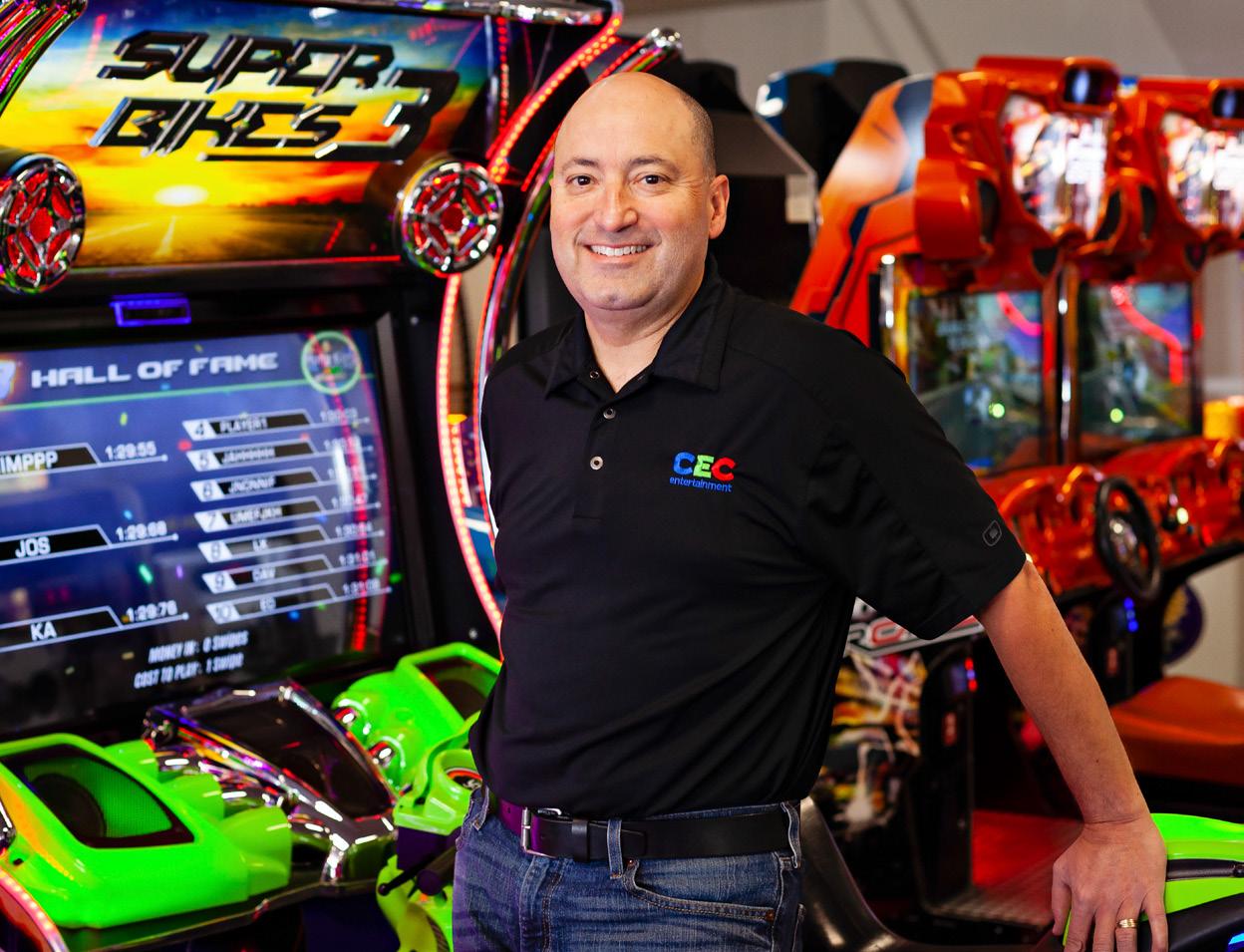
VONDA KLIMASZEWSKI
68 Strategy
ENTRE PRENE URS Entrepreneurs 70 Arturo Sneider, Primestor Development 77 Alex Corral, Joe Agency 80 Andres Idarraga, Creci 83 Margarita Pineda-Ucero, Women Dignity Alliance 86 Peter Zaldivar, Kabouter Management LLC Perhaps the ultimate form of leadership is business ownership, and the Latino community is rich with entrepreneurs. The men and women featured here tell stories of risk, reward, and the lessons learned along the way.
Building Up from Within
BY A.J. ZAK
As CEO of Primestor Development, Arturo Sneider is passionate about serving communities based on what they need and building a true economic foundation from within
70 Entrepreneurs
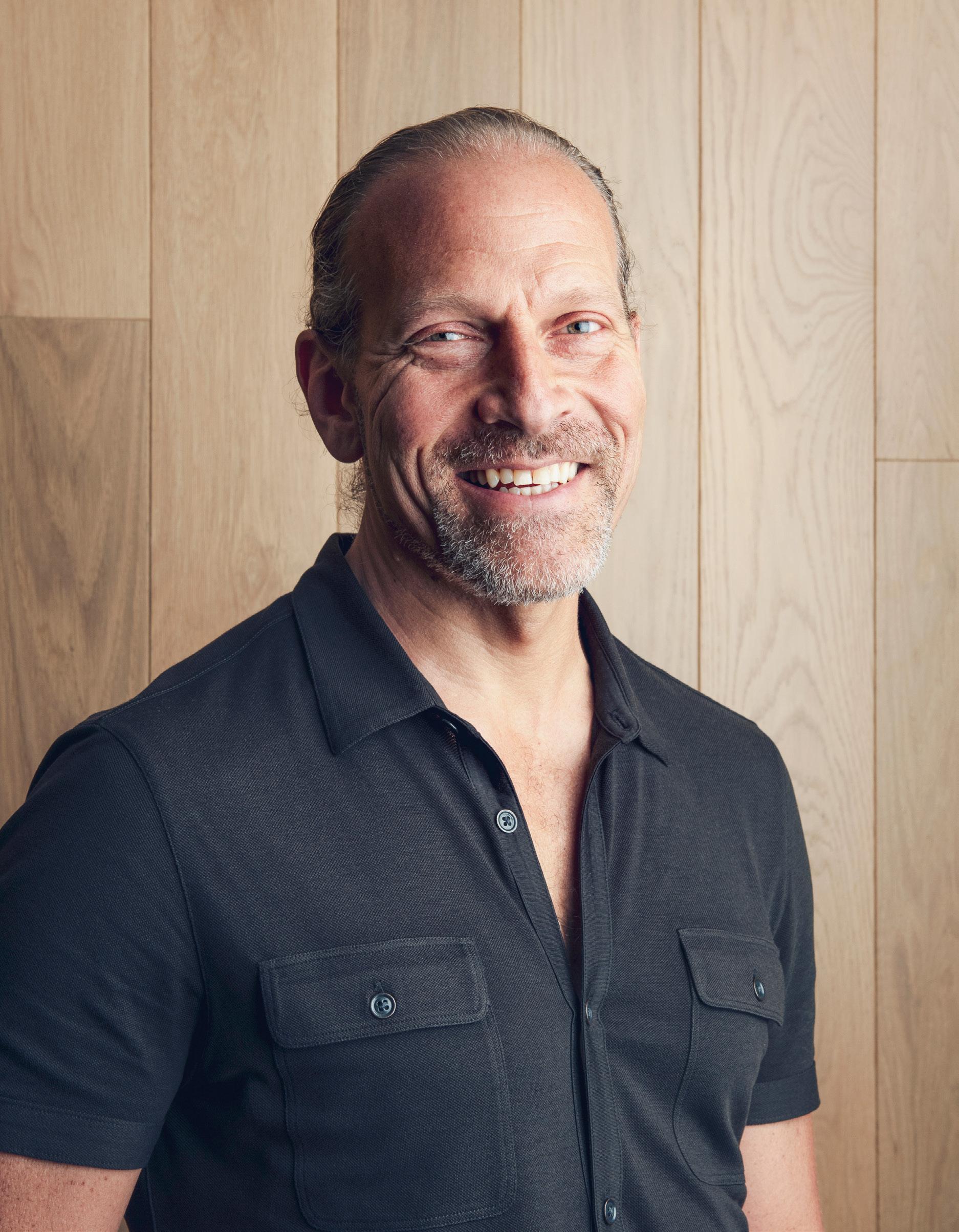
COURTESY OF PRIMESTOR DEVELOPMENT
71 Hispanic Executive
Arturo Sneider CEO Primestor Development
But as CEO of Culver City, California–based Primestor Development, Arturo Sneider takes an activist approach in all the work his company does to boost marginalized communities that have historically been passed over or misunderstood by other developers.
Over the past twenty-eight years, Sneider and his team at Primestor have continued to make strides on major development projects in underserved communities in Southern California and elsewhere. Recent work includes the launch of an urban infill fund to build up underutilized properties in Latino neighborhoods, a massive commercial redevelopment at the historic Jordan Downs public housing complex in Los Angeles, and an initiative to explore the possibility of converting Primestor itself to an employee-owned business.
“I would qualify this as a labor of love,” Sneider says. “Our activism takes shape in real estate because we think that we can create, in the built environment, a very tangible, distinct, positive change—and in some small way, make people’s lives better.”
Sneider moved to the US from Mexico City in 1986. A job working in a restaurant kitchen brought him into the culture and life of the Latino community in Mexico’s
neighbor to the north, and it was an eye-opening experience.
“I started understanding the disconnect in the lives of what we understood to be our community, and how we were perceived in the US—and the very different realities,” he says.
Sneider also started to familiarize himself more with parts of Los Angeles where neighborhoods struggled with violence, poverty, and disinvestment. That’s what piqued both his anger and his interest in working to solve those problems, eventually leading him and his business partner to create Primestor Properties in 1992. The company became Primestor Development in 1999.
Those early years brought plenty of challenges. It took Sneider and his partner nearly a decade to learn the business and also to educate other players in the real estate industry on the opportunities that existed in underserved markets. They faced constant rejection along the way. Since its early days, though, Primestor has grown into an industry leader. With a portfolio valued at more than $750 million, the company manages 3.3 million square feet of property in four states.
“Our activism takes shape in real estate because we think that we can create, in the built environment, a very tangible, distinct, positive change—and in some small way, make people’s lives better.”
To many, activism and the real estate industry might not seem like a likely pair.
72 Entrepreneurs

www.nadelarc.com | 310-826-2100 LOS ANGELES | LAS VEGAS Designing for the next generation of Los Angelenos We are privileged to have worked with Primestor as the Designer and Architect of Freedom Plaza
Because just like Primestor, at KPRS, we believe that building is serving. Serving our partners, people and communities, while building a reputation for the highest quality in everything we do.
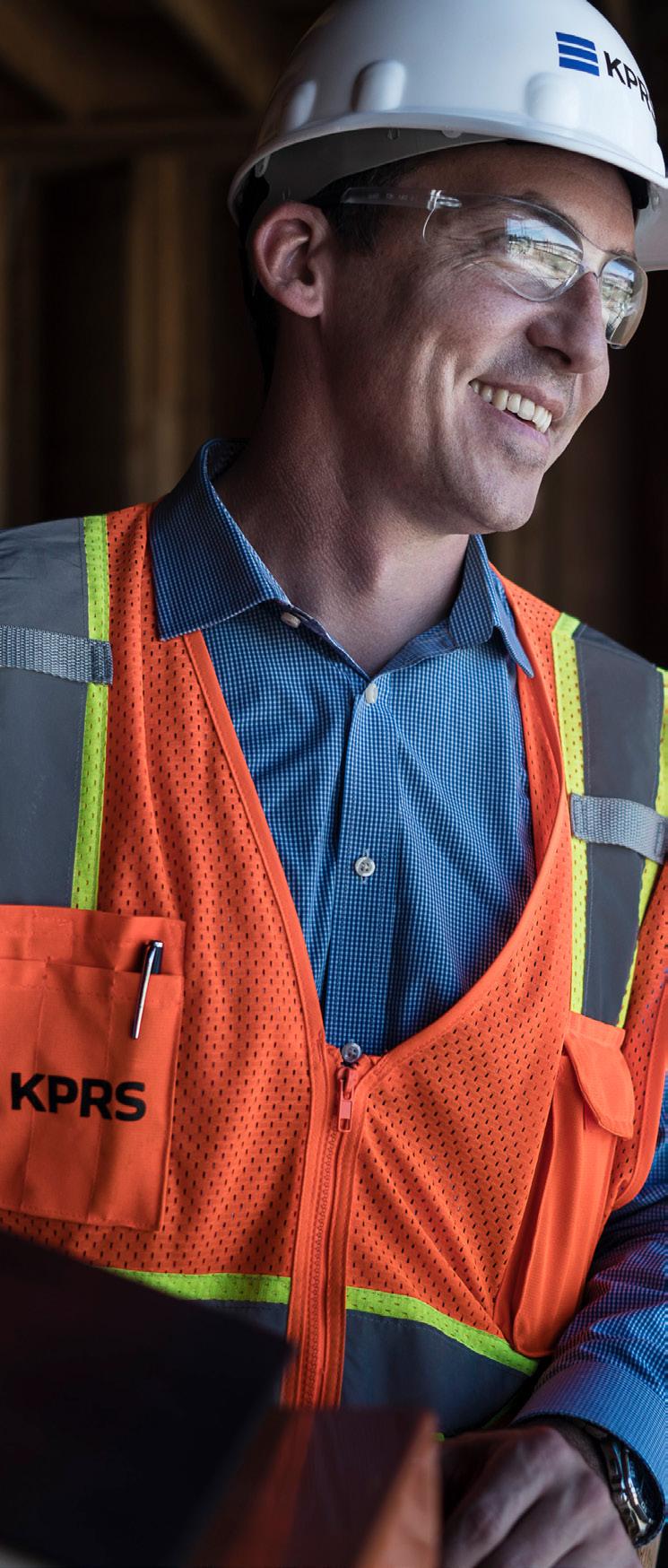
For more information, visit us at: www.kprsinc.com Building is serving.
Since 2014, the company started focusing more on urban infill, mixeduse, and transit-oriented development in Latino communities and is in the midst of raising significant capital funds for such projects. Plenty of cities around the country had already pivoted to build more of that type of mixed-use development, “but in Latino neighborhoods there has been none of that,” Sneider says. The company recently completed a project in Mission Hills, Los Angeles, that repositioned a large, underused retail property and brought major name brands into a community where demand for them was high.

At Jordan Downs, the public housing complex in Los Angeles’s Watts neighborhood, Primestor is finishing up work on a commercial redevelopment project comprising new retailers, a supermarket, a fitness center, and more. A guiding principle through all of Primestor’s work, Sneider
says, is the crucial understanding that a community knows itself better than any outsider could.
“Often, companies, developers approach underserved communities in the way that, ‘We’ve come here to . . . save you or bring you something special, be thankful for it.’ We don’t think of it that way at all,” he says. “We approach it as: we have the privilege to make real change in a positive way and we want to understand your history and what you think is possible.”
Sneider’s commitment to and awareness of the neighborhoods in which Primestor operates has long been championed by the company’s business partners. “Arturo always brings a visionary approach to his work, immersing himself into each phase of the process,” explains Greg Lyon, chairman of Nadel Architects. “He approaches every project by seeking authenticity in design, resulting in
TROY HARVEY
The former Los Angeles County supervisor honors Arturo Sneider as the 2018 Community Builder by A Place Called Home.
74 Entrepreneurs
We are proud to support Arturo Sneider and Primestor in their commitment to transforming the communities they serve.
License No. 751130
EMPOWERING MANAGEMENT



Primestor’s senior management team runs on collective accountability, Arturo Sneider says.





Team members report their personal and professional goals on a monthly basis, and they rotate leading monthly meetings. Primestor department heads also regularly bring performance updates to the senior management team to inform leadership of what the various parts of the company are working on.

“That has given us a lot of improvement in morale and communication,” Sneider says. “And because we have so many different projects in a variety of stages . . . it’s absolutely necessary that you have that level of communication and transparency.”

BRING US YOUR VISION. LET US BUILD ON THAT. TURNING YOUR VISION
REALITY.
We
in Construction Join us in accomplishing something extraordinary! VCCUSA.com RETAIL ENTERTAINMENT THEATER MIXED-USE MULTI-FAMILY OFFICE INDUSTRIAL HEALTHCARE HOTELS EDUCATIONAL
INTO
Over
32 years, VCC has built a reputation as a leading contractor in the nation.
take
pride in building projects that leave a lasting impression on communities and delivering Excellence
mi identidad: MI “MEXICAN”
destinations that speak to the aspirations of their respective communities. Nadel Architects is privileged to have the opportunity to contribute our expertise to Arturo and Primestor.”

A large part of driving community change and empowering people comes down to jobs, Sneider says. Primestor Development focuses on local hiring for construction, vendors, contractors, and more. Internally, Primestor is taking its value of worker empowerment to the next level by exploring the possibility of becoming an employee-owned business. The company is working with the University of California San Diego’s Beyster Institute—which focuses on research and education around employee ownership—to chart a path in that direction.


Both within the company and on its development projects, inclusion is at the forefront of Primestor’s work, Sneider says. In the communities where it invests, Primestor doesn’t simply show up with an idea of what it wants to build, he says. Rather, the process is very open, broad-based, and collaborative.
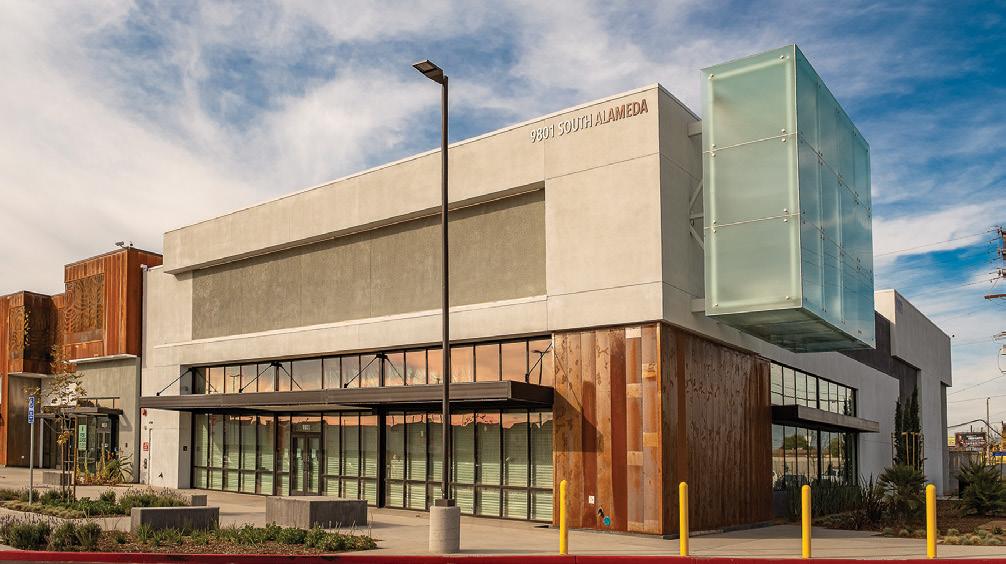


“It is our responsibility to ensure that in some way, shape, or form, we are fundamentally improving the communities we serve for the long term by listening and understanding what the community wants and what their needs are—what their real, day-to-day life is,” he says.
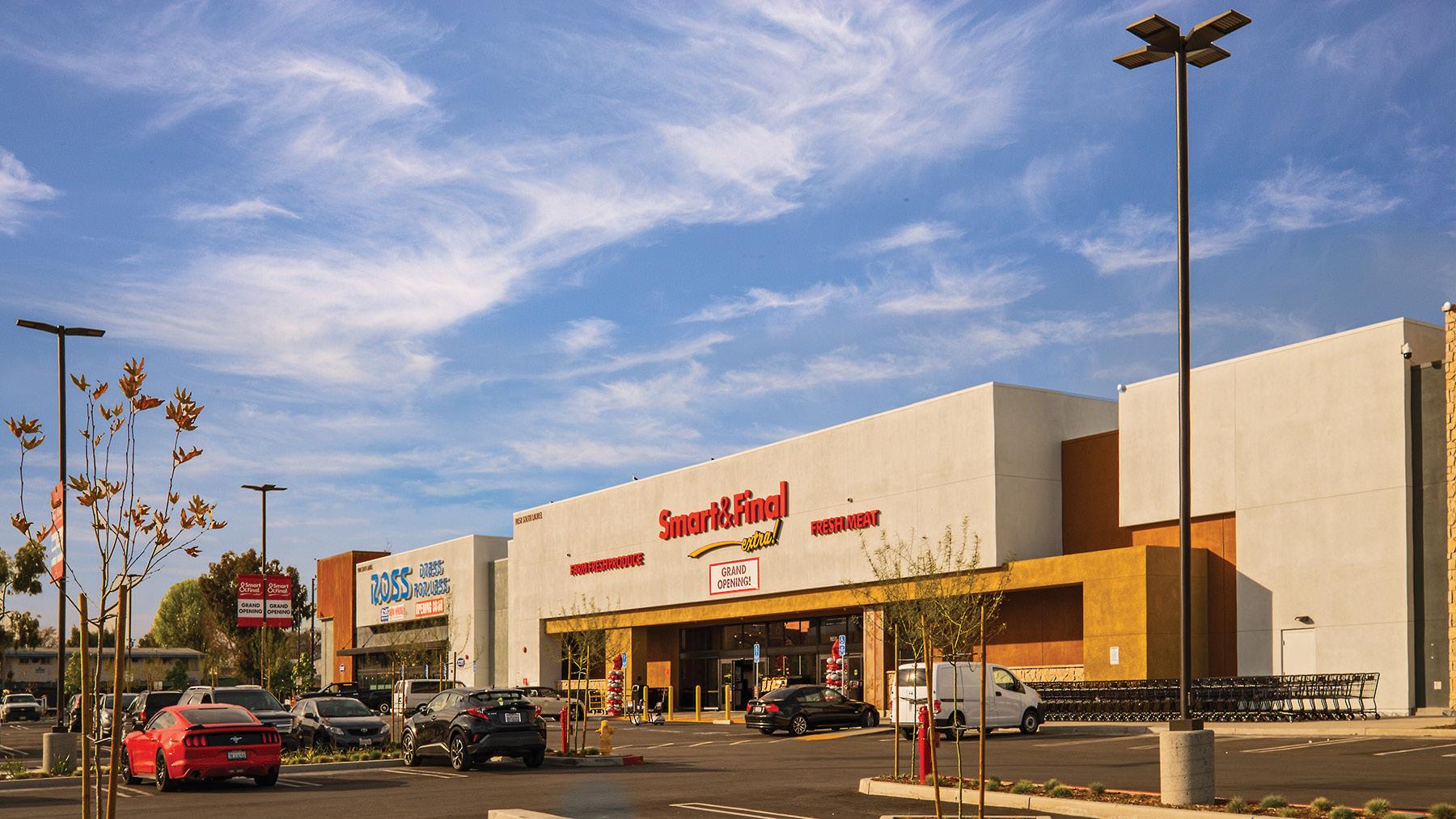
76
Corralling Culture
BY PAUL SNYDER
At Joe Agency, Alex Corral not only embraces his own Mexican heritage, he helps others to do the same
ALEX CORRAL’S GRANDFATHER IS NEVER FAR FROM HIS MIND.
It’s not just the fact that Corral’s marketing and advertising firm, Joe Agency, is named for Jose Corral Favela (though that helps). The life his grandfather lived and the lessons he passed on, Corral says, guide him to this day.
“He was a Mexican immigrant who got deported but made his way back, became a busboy, a dishwasher, and then worked his way up to be the head chef at a very exclusive French restaurant in Santa Monica,” Corral says. “This was before being a chef was a cool job.” He passed away in 2018 at the age of eighty-eight, and a year before that he was still fixing toilets throughout his apartment building.
“He would tell me, ‘The harder you work, the luckier you get,’” Corral adds. “I remember when I was younger he once showed me his hands and made me show him mine. He pointed out his calluses and how smooth my hands are, and he said, ‘I worked hard so that you don’t have to use your hands the way I did.’”
77 Hispanic Executive
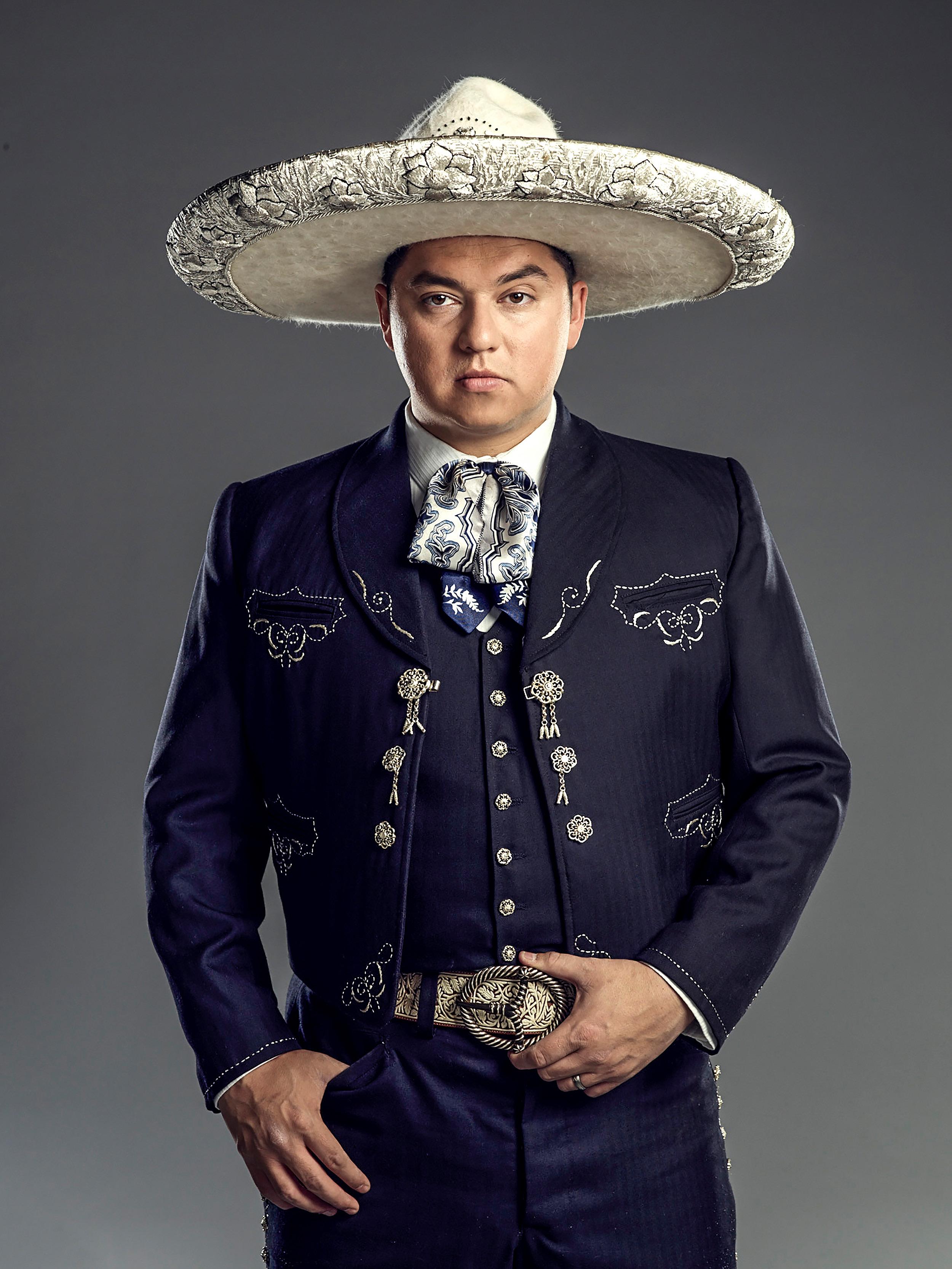
JOE AGENCY 78 Entrepreneurs
Alex Corral Founder and CEO Joe Agency
Although Corral might not do the kind of physical labor that his grandfather did, the dedicated work ethic remains. He’s the creator, executive producer, and star of the Hulu series Los Cowboys as well as the founder and CEO of Joe Agency. And his work at the Los Angeles-based agency isn’t just about brand collaboration and finding new ways to speak to an audience—it’s about a passion for entertainment that can bring people together and change the way that different cultures are perceived throughout the United States.
“The greatest feeling I get is walking into a room of C-suite executives in New York or Chicago or Miami and telling people about our culture and the numbers of a potential audience out there that they can reach,” he says. “When you have a room full of senior executives flabbergasted by this information, it’s very fulfilling, because to me, I’m just sharing stories.”
In addition to sharing stories, Corral and Joe Agency are also cementing identities. Take the agency’s work with Major League Baseball to put the accent marks in certain players’ names on jerseys and printed material (for example, “Gonzalez” becomes “González”). Working with Chrysler and producing commercials for Ram trucks tied to the Los Cowboys even gave the agency a chance to put some regional Mexican music into the mix.
“I think some people are kind of afraid to dabble in that market,” Corral says. “We were told no one listens to regional Mexican music, but to me, this is a big part of my own upbringing and if I can do something to share it, then I want to do that. It’s proven to be successful. There’s a great sense of pride around
Mexican culture and when you get a star Mexican player on board with an idea, they can start a movement in two seconds. There’s a reason why the Mexican National Soccer Team is probably one of the most expensive sporting rights to obtain.”
Beyond sports, Joe Agency is also working to bring more regional Mexican musicians into the spotlight— again, as a tip of the cap to Corral’s own formative years.
“I’ve always been around the Mexican regional space,” he says. “Growing up watching the telenovelas my grandparents and parents watched, listening to that music—I’ve never seen that lifestyle represented, but there’s a market for that. It’s just a matter of showing that data to people who have overlooked it, or maybe never even considered it.”
Even with the success he’s found to date, Corral says he has yet to achieve all that he’s trying to do through Joe Agency. But that’s OK, he says, because it keeps him hungry and searching for more—much like his grandfather.
“The work that the generations before us put in to help build this country and create opportunities for us cannot be overlooked,” he says. “My inspiration comes from those stories and those lessons my grandfather taught me. I’ve always been told that if you’re able to work on something you love, it’s never going to feel like work, and that was my goal since I was a college baseball player. When I knew that wasn’t going to work out, I focused on my passions, which led me back to my culture. This is about more than love and passion—it’s about pride.”
79 Hispanic
“We were told no one listens to regional Mexican music, but to me, this is a big part of my own upbringing and if I can do something to share it, then I want to do that. It’s proven to be successful.”
Executive
Sink or Swim
BY SARA DEETER
TO MANY WHO KNOW HIM TODAY, Andres Idarraga has a story that begins in a six-by-nine cell in a Rhode Island prison. The TEDx speaker and social entrepreneur is renowned throughout academic and business circles for having attended both Brown University and Yale Law School after spending six and a half years in prison. But the story behind that journey—and the story that inspired Idarraga to establish his social impact company, Creci—starts decades ago, before Idarraga even arrived in the United States in the 1980s.
“My father crossed the Rio Grande River, undocumented, and became a textile factory worker in Massachusetts,” Idarraga recalls. “When President Reagan put in place policies that legalized his status, he was so happy—he came from a very poor area in Colombia and had had little to no schooling, so he knew that this was his chance at the American Dream.”
Idarraga, his brother, and his mother were soon able to join Idarraga’s father in the United States. But they ended up in a small Rhode Island town that was far closer to their home in Colombia than the American life they had imagined. At the time, Idarraga explains, 35 percent of Latinos in Central Falls, Rhode Island, lived under the poverty
line. The town itself at the time served as a major crossroads in the drug trade.
“It really cut our teeth, growing up there. And then I received a scholarship to attend a prestigious prep school and was exposed for the first time to a level of wealth I had never seen before,” Idarraga says. “That opened my eyes to the reality that America is very much an unequal society.”
Resentful of that inequity, Idarraga retreated into his neighborhood, dropped out of his school, and eventually resorted to dealing drugs. He was arrested when he was just twenty years old.
But Idarraga had a lot of time in prison. He had time to reflect, time to put in the studying that would within a few years propel him to the halls of Ivy League schools—and he had plenty of time to watch television shows and documentaries.
“There was a show about undocumented people crossing the border to this country,” Idarraga recalls. “There was a young man who kept trying to swim across the river, but the river was strong and turbulent and he was losing strength. He got weaker and weaker, and I could almost hear him thinking, ‘God, if you let me pass to the other side, I will work as hard as needed to provide a better life for
When it mattered most, Andres Idarraga chose a life of meaning—one that’s taken him from prison, to the Ivy League, to the forefront of the business world
80 Entrepreneurs
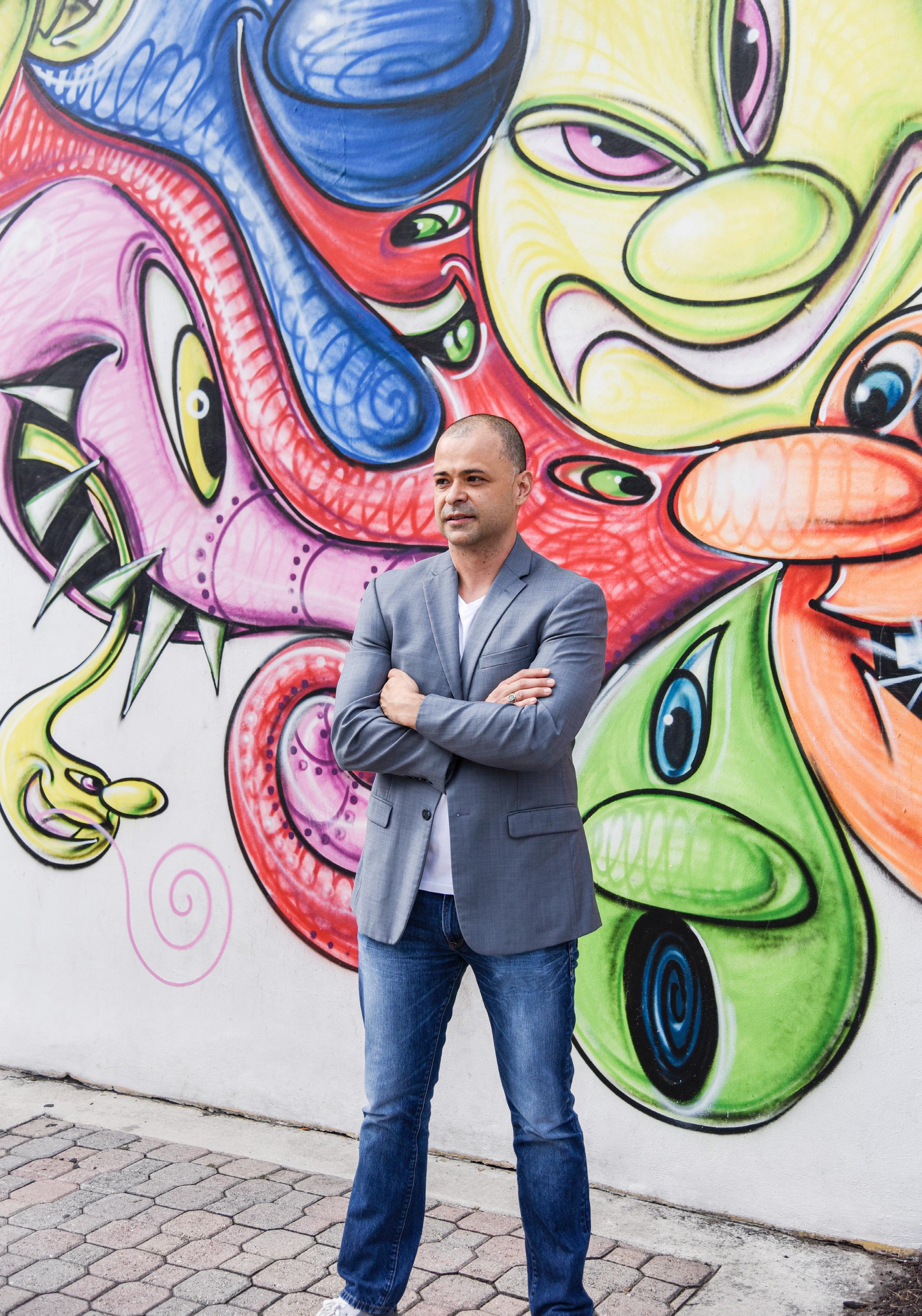 Andres Idarraga
Andres Idarraga
TINA
Cofounder and CEO Creci
BLACKWOOD
myself and for my family. I will work hard to make my life into one that has meaning for myself and others.’
“And that made me think about the sacrifices my own family had made to come to this country,” Idarraga continues. “It made me think about how, despite all they had sacrificed, I ended up in a maximum security prison. And I was furious at myself that I hadn’t done more with my life up to that point.”
Today, there are few who would argue that Idarraga hasn’t brought a profound sense of meaning to both his life and the lives of others. As cofounder and CEO of Creci, a credit platform that works exclusively with businesses that empower individuals, support communities, and protect the environment, Idarraga strives to “fulfill the potential” of communities like the one he grew up in.
“My goal is to empower people of all social classes, to help them get the necessary tools to better themselves as well as their communities,” he explains. “Creci works with small businesses dedicated to making a social impact, which we define as any activity that meets the United Nations’ sustainable development goals for poverty alleviation, climate issues, water recycling and access, infrastructure issues, and more.”
Creci’s platform includes an online tool that provides a statistical breakdown of the social impact of each business it works with, Idarraga says. “Investors and potential investors want to see how their money is being put to use,” he notes.
But all investing, including investments made for a good cause, come with
a certain degree of risk, Idarraga says. “We try to minimize risk while driving a great return, and to do that, we have to be able to measure risk appropriately,” he says. “That’s why we’re so excited to have formed a partnership with Provenir, a company known for its leading-edge risk assessment.”
Together, Provenir and Creci’s own in-house teams represent an “all-star team,” Idarraga says, a team more than capable of helping him fulfill his dream of minimizing economic disparity around the globe.
“Small businesses are a lifeline for communities,” Idarraga explains. “They are a safety net for inclusiveness and are a counter to all the increasing inequality we are seeing, whether that’s in Colombia or Brazil or the United States.
“But after the explosion of small businesses started during the baby boomer era, the rate at which those businesses are established has been trending downward,” the CEO continues. “It is my hope that by financially supporting these companies, we can not only help small businesses make an impact in local communities but also bring back the incredible economic mobility that marked that era.”
Provenir’s powerful risk decisioning platform empowers businesses to stay ahead of risk, get to market faster, and drive business growth. With powerful data tools, a low-code interface, and zero vendor reliance, you’ll gain the speed, agility, and flexibility to get ahead in today’s competitive market. Visit Provenir.com to learn more.
82 Entrepreneurs
mi identidad: MI “LATINO AND COLOMBIAN”
Margarita Pineda-Ucero helps transform businesses into inclusive work environments driven by efficiency
Leading Transformation with Inclusiveness
BY SARA DEETER
“AS A WOMAN ENGINEER IN MEXICO IN the mid-1980s, then as a banker, and later as a Mexican immigrant working for a top five Fortune company in the US, I’ve learned that hard work, diversity of thought, appreciation for talent, and ability to adapt are keys to success,” says Margarita Pineda-Ucero.
Pineda-Ucero’s path through several countries, a C-suite role in financial services, and corporate board positions has shaped her identity as an executive woman. Her journey, she says, has included “profound determination and dedication to my professional career, as well as continuous support from my family, friends, and people who have believed in me or have taken a chance on me.” She has faced challenges and at key pivotal moments, she says, “I’ve also made very intentional choices to balance my personal priorities.” PinedaUcero defines herself, saying, “I am an exec-
utive woman, a mother, a wife, a daughter, a sister, a friend, and a community leader.”
That’s true of many women, PinedaUcero notes. Some are mothers, wives, or caregivers, and operate outside of the business world; others are in the workplace and sometimes the sole provider for their families. “Constantly, women are the pillars of their families and of the communities they form,” she says. “And that means women often have to make career choices based on things that are bigger than themselves. There are choices that keep a balance between loved ones, health and career goals, and a professional drive to move forward within corporations or as entrepreneurs.”
Through Women Dignity Alliance, Pineda-Ucero has developed an international platform for dialogue, helping women make choices in their professional lives.
83 Hispanic Executive
In parallel, she is working with corporations to transform their businesses and corporate cultures through the promotion of inclusion and operational excellence—proving that doing so helps improve bottom lines.
Pineda-Ucero’s drive and versatility certainly hasn’t gone unnoticed. Those she works and collaborates with closely tout her leadership temperament. “As an executive in corporate America and now running my own retained global executive search firm, I interview many leaders from myriad backgrounds,” explains Janice Ellig, CEO of Ellig Group. “Beyond competencies for a position, I look for ten key attributes which I believe make great leaders: character, courage, commitment, collaboration, competencies, confidence, communication, curiosity, champions, and common sense. I look for these traits all wrapped up in someone who is not wrapped in
themselves—someone who is highly authentic. Margarita is one of those exceptional leaders who embodies it all. I am honored to know and support her.”
Through her twenty-year career at global financial services corporation GE Capital, Pineda-Ucero has held business management and operational roles covering various geographies in the US, Asia, Eastern Europe, and Latin America. She’s developed a deep knowledge of strategy, finance, enterprise risk management, mergers, acquisitions, divestitures, global commercial lending practices, and transaction structuring. She says, “My role as chief risk officer for Latin America was the most challenging of all.”
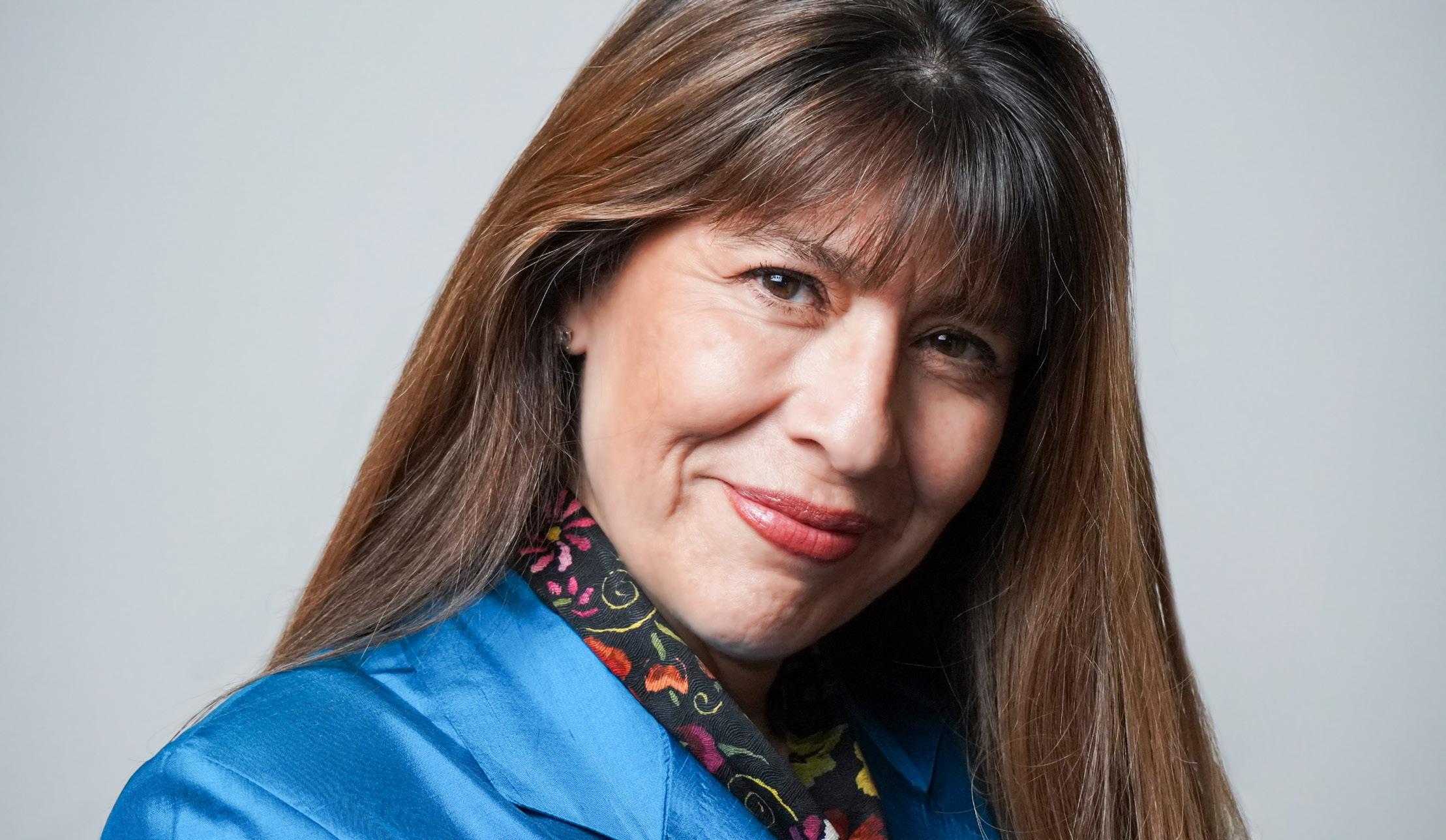
Pineda-Ucero describes that time as “unique in the history of the business, due to heightened regulatory requirements. Those challenges were centered on transforma-
tion—the need to transform the culture, the operations, and the business strategy to move forward,” she explains.
“The business was already great, but the transformation process required that we redesign the risk management organization. We modified its structure and workflow, which allowed us to bring expanded diversity, enhancing the talent pool,” she says. The organization had “excellent policies” in place already to enable varied work formats, like flexible scheduling or remote access. “We revamped certain roles so that workflow enabled people in offices, telecommuting, or working on flexible schedules to collaborate efficiently and with similar relevance across roles within the same organizational level.” And often, she remarks, it was women working in the less standard job formats, a result of the unique roles they held in their families and communities.
JIM MORLINO
84 Entrepreneurs
Margarita Pineda-Ucero Corporate Board Director, Advisor in Business Transformation, and Founder Women Dignity Alliance
“We created a productive and efficient organization that delivered tremendous results! In parallel, we established a workplace environment where all job formats were treated with the same dignity,” she continues.
The importance of that dignity is partly what inspired Pineda-Ucero to envision Women Dignity Alliance. “There is tremendous opportunity today to transform the traditional organizational structures into flexible and agile collaboration teams,” she says. “When you allow employees expanded flexibility and dignity in their particular job format, with clear roles and responsibilities, you empower them to drive results and contribute to the organization’s success.”
Pineda-Ucero says that enhanced businesses with improved dynamics in their corporate culture only happen through a combined effort between top management and employees. As a board director, consultant, and advisor—or someone providing leadership training—Pineda-Ucero helps enable business transformations, improving the diverse talent mix in the organization and enhancing its operational efficiency.
“Empowering a woman to succeed is not exclusively a matter of her having a voice or exposure in the organization,” she says. “It also has a lot to do with the cultural background of the organization as well as with the labor laws and social mores of the country in which she is located.” She adds, “It requires that men and women work together for the greater good.”
Pineda-Ucero believes that there are key “baselines” that align with people across the
globe. In her workshops, she highlights five simple words that she believes help women (and men) to unlock their true potential:
Analyze: “Know who you are, where you are, and where you want to go. Understand the business that you are in, the rules of performance to deliver results, and the company’s values.”
Visualize: “Look beyond your immediate reality. Think big and set the plan to execute with discipline and excellence, surrounding yourself with great people and companions on the way.”
Explore: “Narrow the gap between where you are and where you want to be. Identify your areas of opportunity for learning and work on them. Be realistic and humble. Being humble means truly acknowledging who you are— not more and not less!”
Decide: “Choose what is right for you given your individual conditions and personal life dynamics. Embrace your choice, own it, and move forward. If you need to reassess, do it, but always moving forward. Persevere, never give up, and always be grateful to those who helped you.”
Personal: “Life balance and success are personal decisions. They are unique to you and your reality—don’t try to comply with how others define them. Take care of your intellectual, physical, spiritual, and emotional health. If you break, it all falls apart.”
MI
mi identidad:
“I use Hispanic as a generic description, Latina when being more specific, Mexican when being explicit about my ethnic background, and Mexican American when describing my mixed cultural identity:
“Hispanic, because Spanish was my first language and I connect deeply with the beauty that the Spanish culture brought to Latin America.
“Latina, because I am a woman with deep roots and traditions that are characteristic of individuals across Latin American countries.
“Mexican, because it is the country where I was born, grew up, have family, and have cultural heritage from.
“I am also an American. I became a US citizen when I knew in my heart that I would be willing to die defending what the USA stands for . . . So, I also define myself as Mexican American.”
“When you allow employees expanded flexibility and dignity in their particular job format, with clear roles and responsibilities, you empower them to drive results and contribute to the organization’s success.”
85 Hispanic Executive
Kabouter Management’s cofounder Peter Zaldivar finds success investing in successful companies of which you might have never heard
Small Cap, Big Reward
BY BILLY YOST
IF YOU ARE AN INTERNATIONAL BUSINESS
at the top of your class in an obscure field, you’ll probably be hearing from Peter Zaldivar. With his partner Marcel Houtzager, the principal and cofounder at Kabouter Management LLC has built an internationally successful investment firm by focusing on small cap investment opportunities that require deep digging, long-haul investment, and a commitment to bringing camera-shy businesses out into the daylight. Kabouter’s strategy is, in itself, a differentiator.
Kabouter will invest in a French company that is the world’s only global call center or a Taiwanese firm that is the biggest tester of cellphone chips in the world—not only because the businesses have functioned so well as to almost hold a monopoly in their field but also because they haven’t been actively pursued by the stock analysts at Wall Street’s biggest banks. Why? “Most investors or investment firms focus on larger companies because that’s where most of the investing capacity is,” Zaldivar says. “You can make the most money
through the least amount of effort by investing in large companies.”
Zaldivar’s former boss, legendary former Acorn Fund investment manager Ralph Wanger, was the prototype small cap pioneer, and Kabouter has endeavored to extend his legacy of focusing on smaller international investment. The past seventeen years have proven both Wanger and the partners at Kabouter correct, but the multiethnicfounded company wasn’t built overnight. Zaldivar’s journey has helped shape the soft-spoken Argentine American into a powerful motivator who leads with virtue, not volume.
ALWAYS THE OUTSIDER
Zaldivar is used to feeling like the outcast.
“My parents were part of the generation that really wanted to assimilate,” Zaldivar says. His parents had emigrated from Argentina in the 1950s, and they went to great lengths to try to become the “real Americans” they thought they should be, finally settling down in Oak Park, Illinois. “My parents tried
joining all of these clubs that were primarily Anglo people, but they just weren’t fully accepted anywhere.”
The youngest in his family, Zaldivar grew up in two worlds, a natural translator for his parents but also able to “turn off” his Hispanic identity when he felt it was appropriate. It created a difficult catch-22 for him later in life when he went to live in Argentina after college. “In America, I was considered Argentinian. In Argentina, I didn’t really get credit for being an American or an Argentinian.”
Later, when Zaldivar moved to Asia and was asked where he was from, he would start first with Chicago. However, that answer only seemed accepted once he mentioned his parents were from Argentina—as if he didn’t look American enough. “In the end, it just made me think that I guess I should just take advantage of this,” Zaldivar says. “There had to be a business where I could use this to my advantage and bridge an international gap.”
A motorcycle accident in Hiroshima would set Zaldivar’s final course. After being
86 Entrepreneurs
mi
identidad:
laid up in a Japanese hospital for weeks, he asked his friend to get him a study guide for an MBA. His friend brought back the only English study guide the bookstore had: the Princeton Review LSAT study guide. “So, I studied it,” Zaldivar says, chuckling. He then went on to graduate from Harvard Law. Quantitative investing gave way to the introduction of small cap investment, and the rest sorted itself out.
him and his partner, Marcel Houtzager. “We have similar backgrounds but in completely different ways,” he says. “Marcel is Dutch but he moved to Nigeria as an infant, attended high school in Brazil, and then college in the States. I feel like it’s so important to have a partner you understand but isn’t your carbon copy. It’s really important that we just started right out with a diversity of ideas.”
That diversity, though, is rooted in the quantitative investment and forensic accounting backgrounds of the founders. And that concentration on quality has meant that despite focusing on fewer big-name businesses, Kabouter is currently managing billions of dollars. “It helps in establishing relationships with smaller foreign companies when we call up and say, ‘We’d like to talk with you for a few minutes about your business,’” Zaldivar explains. “A lot of other investors don’t get the opportunity to talk to companies directly. If you can interview a company directly, it’s really easy to get straight to the point of whether or not it’s a company you want to invest in.”
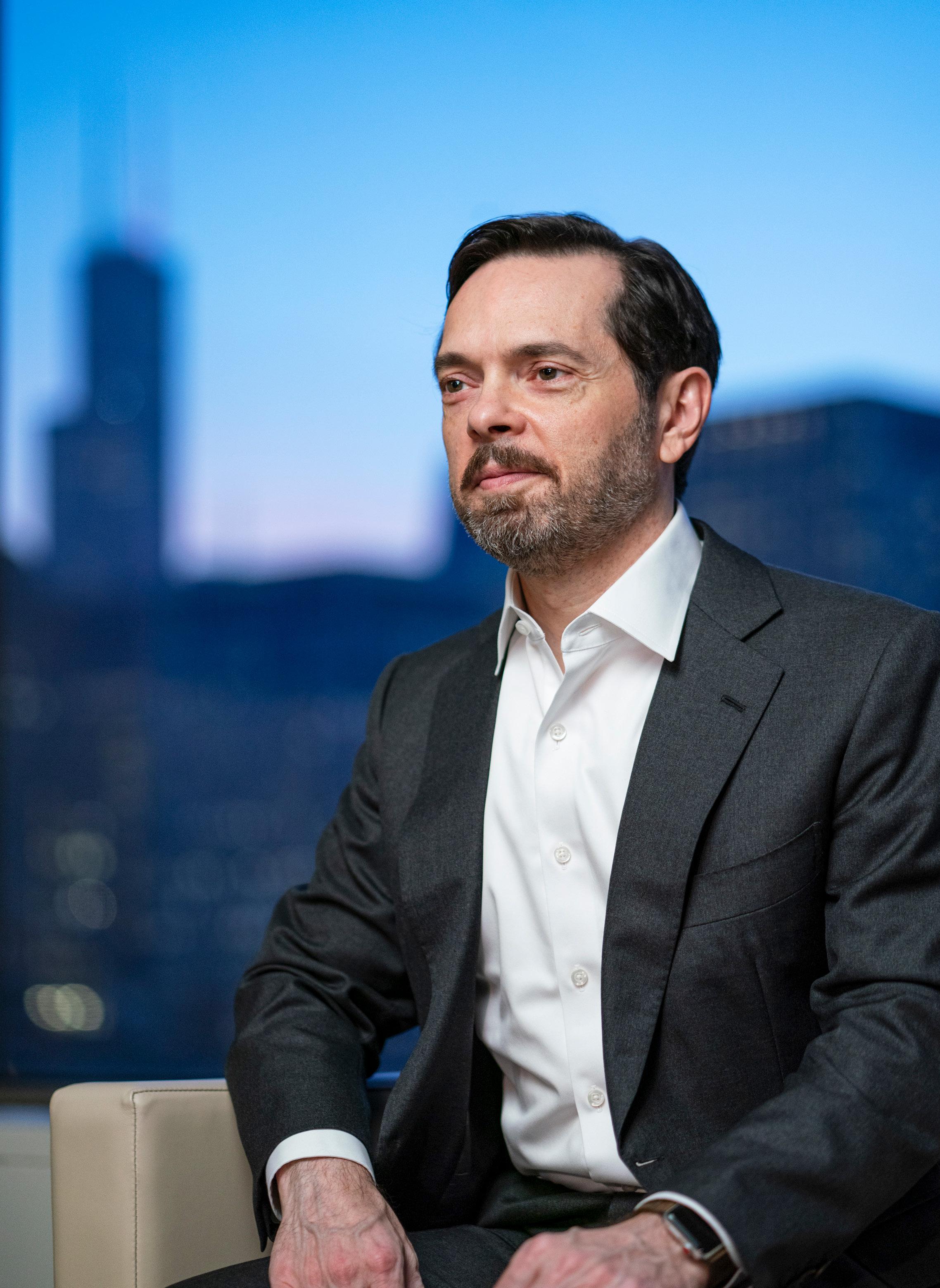
An investment from Kabouter comes with an extremely beneficial kicker that, again, sets it apart from almost any other small cap firm. “We also act as friendly activists,” Zaldivar explains. That means everything from reconfiguring investment presentation materials—in some cases, simply translating them to English—to helping companies raise their environmental, social, and governance (ESG) scores (oftentimes, businesses flat-out haven’t responded to a questionnaire because they didn’t know it was essential in establishing ESG scores). Kabouter will put companies on a US roadshow, a sort of debutante ball for businesses that have no idea how to make public headway into investment capital.
What’s most evident in an hour with Peter Zaldivar is that he believes in the businesses he’s investing in. Kabouter isn’t about pipe dreams; it’s about helping already successful international businesses take it to the next level. You just haven’t heard of them . . . yet.
ALEXANDER GARCIA
Peter Zaldivar
PM, Principal, Cofounder Kabouter Management LLC
A CLASS OF ITS OWN Zaldivar says part of what accounts for the success of Kabouter is the interplay between MI
“HISPANIC,
LATINO, OR LATINX”
This year’s Líderes are not only innovative thinkers in their respective fields but also, in many ways, revered public voices. While they’ve often had to battle to ensure that they and their collective cultures are better heard, it’s precisely been those battles— and those victories—that have propelled them to continue seeking progress.
TOP 10 LÍDERES
CONVERSATIONS AT THE TOP
90 Actor, Comedian, and Writer; Cofounder and Partner, NGL Collective 88
89 Hispanic Executive 98 COCREATOR AND EXECUTIVE PRODUCER, Pose, FX 101 CEO, GLONATION STUDIOS; EXECUTIVE PRODUCER AND CO-SHOWRUNNER, One Day at a Time, Pop TV 104 VP of Talent Recruitment & Development, CNN Worldwide 109 Fellow, VP, and CTO Cognitive Process Platforms, IBM 112 Creator and showrunner, Vida, Starz 115 Author, Vice News Correspondent, Latinx Advocate 118 Publisher and Chief Brand & Revenue Officer, HOLA! USA 122 Cofounders and Co-Owners, Latino Leadership Intensive 126 Founder and CEO, Auger-Dominguez Ventures
CONVERSATIONS AT THE TOP
The entertainer’s long list of credits is a testament to his dynamic talent, as well as his ambition to shed light on the historical contributions and prevailing accomplishments of Latinos in America
PORTRAITS BY CASS DAVIS
WITH RUBEN NAVARRETTE
JOHN LEGUI ZAMO
90
Conversations at the Top
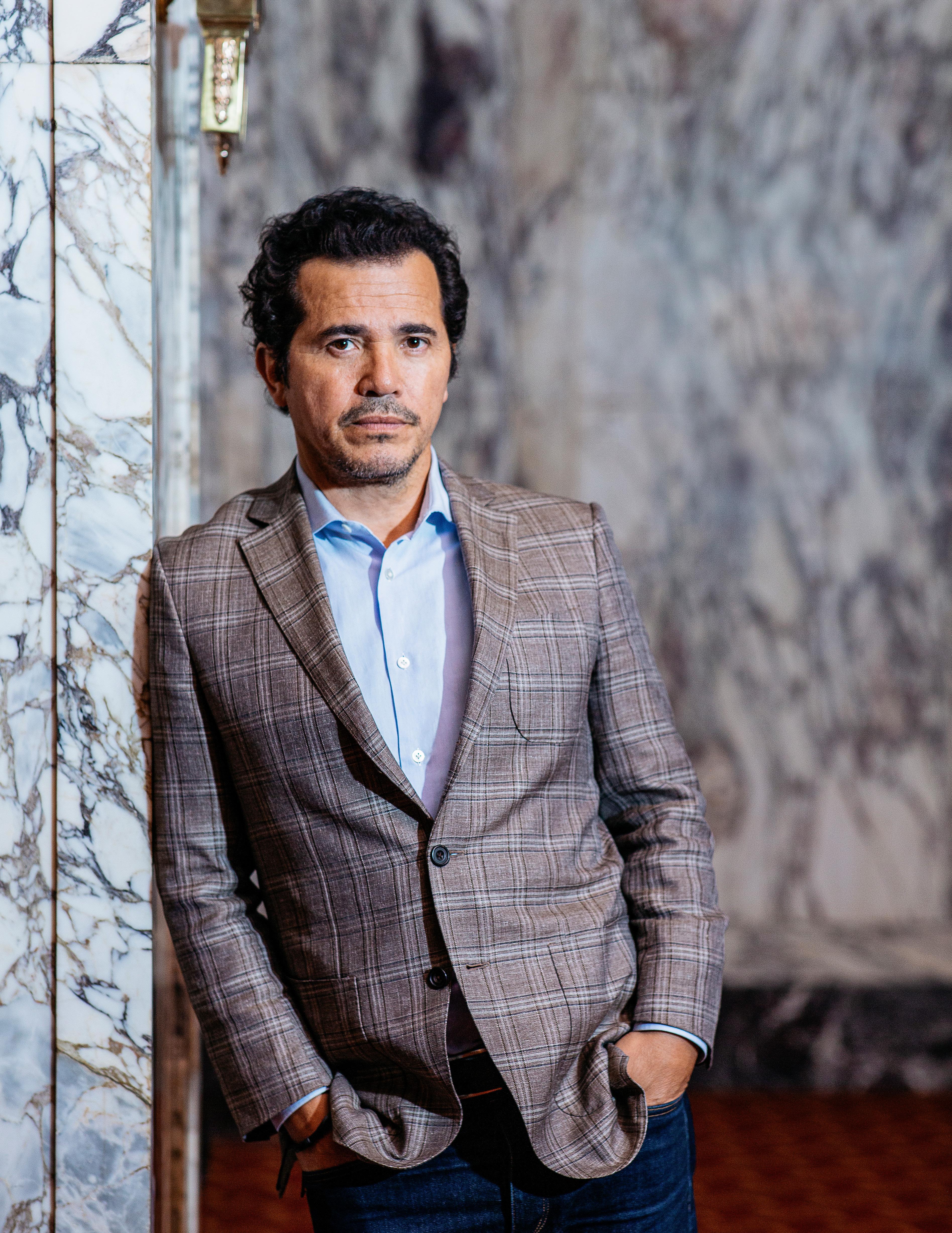
Conversations at the Top
IN AMERICA, SUCCESS DOESN’T START WITH
INHERITED MONEY,
Even in 2020, Hispanics still need to remind ourselves of this principle. There are forces out there that are intent on defining, controlling, limiting, and diminishing us. As our population and spending power have increased, so too has the resolve to cut us down to size. We can’t let them.
That’s the loud-and-clear moral to the story in the play Freak, an autobiographical one-man show that debuted on Broadway in 1998.
Just before the curtain falls, the audience glimpses a grainy, black-and-white photo of a man named Alberto Leguizamo. The Colombian native aspired to direct films before abandoning his studies because he lacked funds. Alberto, his wife, Luz, and their family eventually migrated to the United States where the proud man had to settle for menial jobs. Life was not easy.
Even so, Alberto never surrendered. He never gave into how society saw him. And that example inspired his son John.

The Broadway production of Freak was recorded for HBO and released in fall 1998 with Spike Lee directing. The HBO version won an Emmy for its writer and star, John Leguizamo.
It was back in 1984 that Leguizamo cut his teeth as a stand-up comic in New York City nightclubs. In 1986, he landed his first television part, a small role on Miami Vice In 1991, Leguizamo wrote and starred in Mambo Mouth, an off-Broadway production where he played seven characters. Leguizamo later landed a meaty role in Brian De Palma’s 1993 film Carlito’s Way as the unforgettable “Benny Blanco from the Bronx.” And in 1995, he starred as drag queen Chi-Chi Rodriguez in the movie To Wong Foo, Thanks for Everything! Julie Newmar and received a Golden Globe nomination for Best Supporting Actor. That same year, Leguizamo wrote, produced, and starred in House of Buggin’, a Latino-themed variety series on Fox.
The actor also delved into the world of animation, lending his voice to the character of Sid the Sloth in five Ice Age movies beginning in 2002.
In 2011, Leguizamo opened his semiautobiographical one-man theater show Ghetto Klown on Broadway. The play tells the story of Leguizamo’s career path from the comedy clubs to Hollywood.
The list never ends. It sometimes seems as if, over the past thirty-six years, the
FAMILY CONNECTIONS, OR IVY LEAGUE DEGREES. REAL SUCCESS BEGINS WITH KNOWING WHO YOU ARE AND NOT LETTING ANYONE TELL YOU OTHERWISE.
92
John Talks: Pushing Boundaries in Comedy
“When I did Mambo Mouth, I wanted to push American comedy and have darker themes and edges and go from comedy to drama in zero to sixty seconds. With each show I wanted to do something hopefully that no one had ever done. I wanted to push the boundaries [of art and storytelling] and the limits of what’s acceptable.
“I knew [Freak] was going to be groundbreaking and pioneering because I knew nobody had done that before in terms of being a Latinx person. In terms of comedy in America and one-man shows, nobody was doing autobiographical stories about themselves and showing the horrors of childhood. It was always so candy-coated. Oneman shows were usually about Abraham Lincoln or Samuel Clemens. I didn’t do it because I thought I was so fascinating. My pain was something that was everybody else’s gain. I really felt that.”
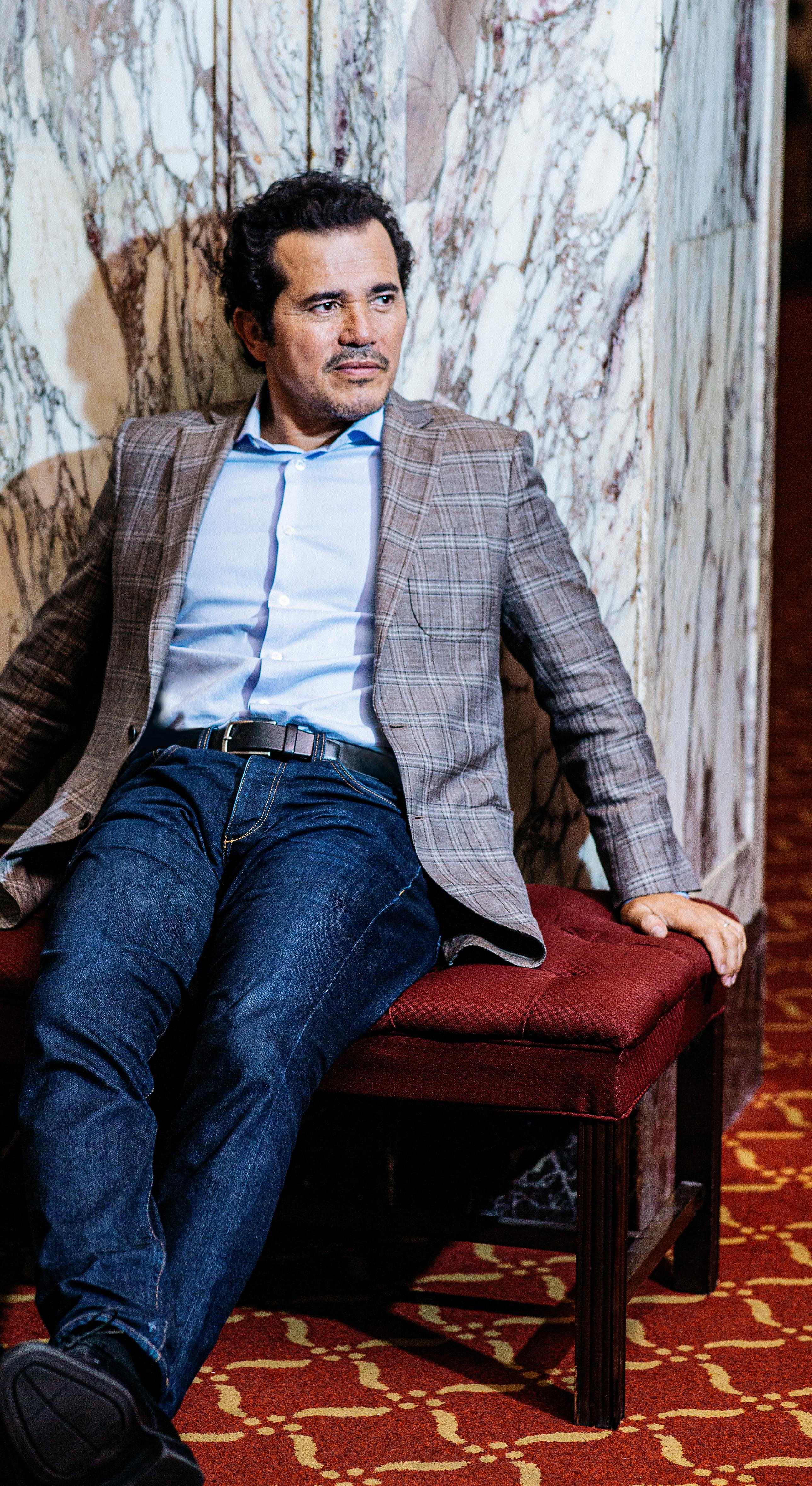
John Talks: Vulnerability and Responsibility
“As a dad, you’re responsible for this life, and you’re responsible for how you shape this life. And I take this responsibility with huge respect. I want to protect this little life, this vulnerable life that I’ve been charged with. How do I send this vulnerable spirit into a world that can sometimes be incredibly harsh?
“That was the whole thing of Latin History for Morons. All this Latin history—that we helped make America, that America wouldn’t exist without us—is so that other Latinx people aren’t vulnerable, and so that they can speak out and be proud and loud and say, ‘I’m Latinx, and I made America. You can’t take that away from me.’
“For us to go out there and be vulnerable in America without the protection of our contributions is not fair and not right. I wanted to correct that.”
Colombian American comedian, actor, author, producer, playwright, and director has never stopped working. Or even stopped to take a lunch break.
The fifty-six-year-old Leguizamo refuses to be boxed in. He’s the comedic actor who can deliver a strong dramatic performance. He’s comfortable on television and film, but his first love is writing and acting for the theater. He’s proud of his Hispanic ancestry, but he also appeals to the mainstream.
I first met Leguizamo in the late 1990s when he was doing Freak on Broadway. We had a mutual friend who set up lunch in lower Manhattan. A few years earlier, while we were both in our twenties, we had both presumptuously written our memoirs. In 2005, we saw each other again in Fort Worth, Texas, at the annual conference of the National Association of Hispanic Journalists, where he was on a panel. And in 2012, we bumped into each other at the Democratic National Convention in Charlotte, North Carolina, the day after former San Antonio Mayor Julián Castro gave a rousing keynote speech.
I’ve followed this man’s career for decades. His material is brave, fresh, and smart. A lot of comedians make you laugh. Not many make you think.
Leguizamo does. He is always tackling new challenges, and he never runs out of ideas. I asked him where all those ideas come from.
“Well, it’s always like what’s in the zeitgeists and a little bit of what’s going on in my life,” he said. “And kind of like what I want to try to do where I try to push art and storytelling further than anybody else has.”
It’s rare to find actors that are equally good doing comedy or drama. I asked Leguizamo if he had a preference.
“I love the challenge of comedy because comedy is very unforgiving,” he said. “So, when
you succeed at comedy, it’s like you overcame a big challenge. But drama, it’s kind of more satisfying in some ways because you just get to use all sides of yourself, go really deep, and it’s about really being in the moment.”
I also wondered whether, looking back on his long career, he could pick out the roles and projects of which he’s most proud.
“It’s got to be the theater,” he said. “I mean, when I did Spic-O-Rama, and I played all the family members of this dysfunctional Latin family, and then all of a sudden I see Eddie Murphy doing The Nutty Professor playing all the members in his family right after, I know I had an influence in American comedy. I was very proud of that.”
What about the dramas?
“I got to say Summer of Sam was really important,” he said. “I just feel like working with Spike Lee was a highlight of my life. He is an actor’s director, and I learned so much. There are no boundaries in film acting. You can go anywhere, and if you have the right director who trusts you and creates a safe environment, you can do anything. You’re super human almost.”
And what about the challenge of navigating across different mediums—from television to film to stage? What’s his favorite way to tell a story?
“Well, I mean, there’s a beauty to stage,” he insisted. “And the challenge of stage is that you got to know what you’re doing. You got to have real technique, and you got to have really studied. Otherwise theater, the stage will beat you up into a pulp and spit you out.”
He went on to complete the thought.
“I mean, film is easier than stage, much easier,” he said. “So that’s what I like about film because I like the easy sometimes. I love the stage because it’s hard. It’s really hard, man. You’ve got to really be present,
94 Conversations at the Top
John Talks: Latin History (and Latin History for Morons)
“We participated in the Civil War and the American Revolution in huge numbers and [made] huge contributions—financially and with blood and lives. And in World War I and World War II, and all the wars that this country has had. I wanted everybody to know that and everybody to understand that.
“I just did some reshoots on Latin History for Morons for Netflix. Netflix generously and bravely supported me because during the tour I got the courage to say even more historical facts and add more stats. So, they’re going to recut it into the new Latin History for Morons. I want to mention about the World War II heroes that we had, the World War I heroes. I’m going to name names, and I’m going to name heroes who won Civil War Medals of Honor directly from Abraham Lincoln who were Latinx.”
and there’s no hiding. There’s no editing. Nobody’s going to fix your performance. It is what it is, and you better have real chops, and you better really deliver.”
Leguizamo more than delivered in his most recent stage performance on Broadway. Debuting in 2017, Latin History for Morons is about several things: from a father trying to inject his son with self-esteem thanks to ethnic pride to the failure of our education system in teaching us all about the historical contributions of Latinos. The show is featured on Netflix.
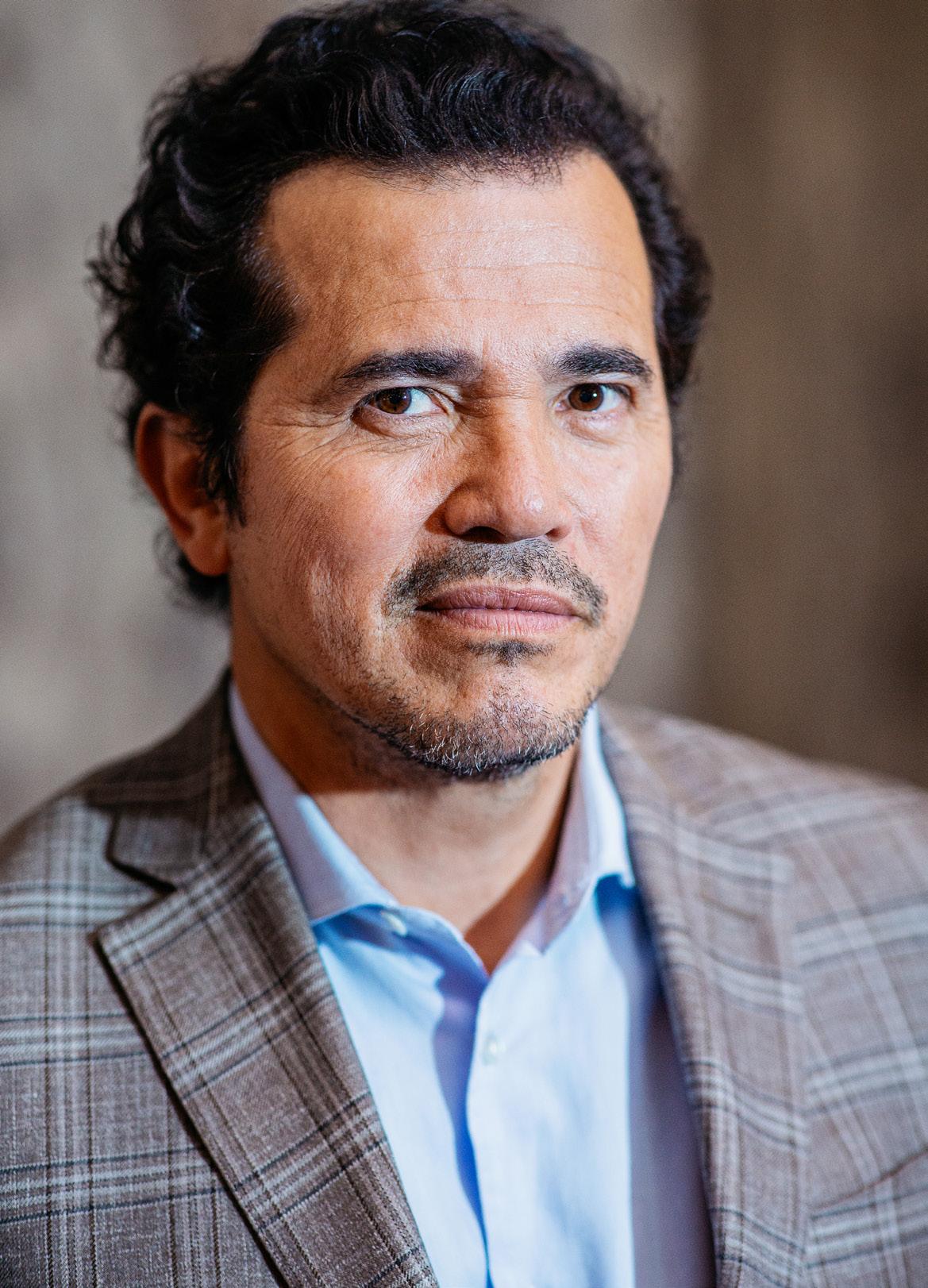
And while you’re on that streaming service, you can also check out the original 2019 miniseries When They See Us, in which Leguizamo plays the father of one of the Central Park Five—otherwise known as the five young men wrongly convicted of rape in New York in 1990.
Recently, the actor/comedian added another title to his résumé: director. Legui-
zamo became interested in the true story of five inner city high school students from Miami—four Latino/a and one African American—who won the US National Chess Championship in 1998. He envisioned a movie blossoming from the story, but white executives in Hollywood couldn’t see it.
“When I went around pitching it to the studios, they were like, ‘Well, Latin people don’t want to see feel good movies.’ I was like, ‘What?’ We want to be depressed? I mean, it’s just ridiculous. I raised the money anyway. . . . It’s just they don’t understand. They don’t get our stories. They can’t relate.”
What did finally emerge was the film Critical Thinking, which Leguizamo directed and stars in.
As for how Leguizamo feels about the “brownout” in Hollywood, where mostly white executives spend their days shooting down movie ideas aimed at America’s largest
minority— a group that, each year, purchases more than their share of movie tickets— well, don’t get him started.
“I’ve been pitching movie scripts for thirty years, and I always got rejected,” he said. “I started to think, ‘Oh, my writing must suck. I can’t sell anything.’ And then I started to realize, no, it’s not my writing. It’s the subject matter. I’m writing about Latin stories and Latin people, and the Hollywood execs and the network execs don’t get it. The gatekeepers are not us—they’re the ones who decide whether our stories are valid or not. And they don’t see it.”
The result is what Leguizamo calls “cultural apartheid” in an industry that, ironically, sees itself as progressive and enlightened. Numbers don’t lie.
“Last year, Latinx people were 3 percent of the faces in front of the camera and behind the camera,” he said. “That’s abhorrent. That’s wrong.”
John Talks: Behind the Numbers
“How can [Hispanics] be the largest ethnic group in America and be so absent, so invisible? It’s crazy. We’re 50 percent of the population of Los Angeles, but less than 4 percent of the faces in front of and behind the camera. That’s cultural apartheid anywhere else in the world. When we’re equal to whites in population in New York City, but less than 1 percent of the stories or staff at the New York Times, New York Post, New York Magazine . . . that’s cultural apartheid. When we’re 40 percent of the population in Texas and less than 7 percent of appointed government officials, that’s cultural apartheid. When we’re 50 percent of the population in the worst public schools in America, but less than 3 percent of the students in the gold standard schools, that’s cultural apartheid.
“Yet at the same time that we’re being held back, oppressed, excluded, denied, we added $2.3 trillion to the US economy. If we were our own country, we would be the eighth largest economy in the world. . . . I mean, our contributions, we’re unstoppable.
“We need Latin executives. We need Latin editors at the New York Post, at the New York Times, and Latin decision-makers in Hollywood. We need Latin executives who understand our stories, who see the value of what we’re trying to say and tell.”

Luckily, Leguizamo found salvation under the neon lights.
“When I’m on Broadway, I have no gatekeepers,” he said. “I just have to produce the play, raise the money, and I’m free.”
Next up for the artist? Perhaps another trip to Broadway—but with a much different vehicle this time.
“Now I’m writing a couple of musicals,” he said. “I was inspired by Lin-Manuel [Miranda].”
Or maybe bringing to the screen a Hispanic superhero. Leguizamo created a comic book figure named PhenomX that he’d like to turn into an action figure. He is using a crowdsourcing site to raise the money to produce it.
“I was trying to use all the things that I saw growing up in the ‘hood’ and all of these horrible toxic factories and conduits spewing out venom, and everybody getting asthma and all kinds of respiratory diseases,” he said. “So, I thought, ‘What if all this horrible stuff that was happening to us was actually making us stronger?’”
When he is not busy creating, Leguizamo is also a businessman.
Case in point: he is a cofounder and partner in NGL Collective, an intriguing digital new media company headquartered in New York that produces cutting-edge video to help clients and advertisers reach the US Hispanic market. As a generator of video content on multiple platforms, NGL (or New Generation Latino) has been up and running for about ten years.
Though the company has evolved a great deal over the course of that decade—early on using Leguizamo’s fervor for the eclecticism of Latin culture as its fuel—NGL’s focus has kept steady on spotlighting the Hispanic
American experience. Ultimately, NGL works from the assumption that anyone with something to sell has to go out and find the market, as opposed to simply waiting for the market to find them.
Today, NGL remains an extension of Leguizamo’s greater mission as a forward-thinking actor, comedian, and playwright. He takes great pride in having helped conceive the company, particularly now as it becomes more and more realized as a force in media.
As a Generation Xer, Leguizamo has been in the game for a long time, nearly four decades. In the entertainment business, that’s a lifetime. With the gray hair to prove it, the “Ghetto Klown” is a veterano now. He’s been working nonstop since Ronald Reagan was in the White House, and he’s put some points on the board.
Of course, movie posters and souvenir playbills don’t tell the whole story. Leguizamo has also been knocked down more times than you can count. But like his old man, he always gets back up and never lets someone else define him, limit him, or hold him down. That’s worthy of respect.
Leguizamo credits those who came before him . . . like, way before him.
“Look at it, we were almost genocided in the 1500s,” he noted. “Ninety-five percent of all native peoples, the Incas, Aztecs were genocided. Only 5 percent survived, and we’re still here and thriving. And we’re still dancing and we’re still singing and we’re still doing poetry and we’re still going. It’s crazy. We’re unstoppable.”
I responded: “Look at your longevity, man. You’re unstoppable.”
“Thank God for my ancestors,” he said. “We get it from them.”
John Talks: The Impact of NGL Collective
“NGL Collective is a company that I helped to create and grow with the intention of having an impact on the Latinx media and entertainment landscape and providing opportunities for our community to change its narrative. My hope is that NGL will go down as being remembered as groundbreakers and pioneers in creating a path for the multitude of Latinx talent hungry to be seen.”
I’ll buy it. Latinos don’t live perfect lives. We struggle. We fight. We suffer fools, and we put up with racism and ignorance. We get knocked down.
But damn if we don’t pull ourselves up and get back to work. We’re tougher than anything life throws at us. We overcome adversity.
John Leguizamo is right. Being bad ass is our super power.
Ruben Navarrette, a contributing writer for Hispanic Executive , is a syndicated columnist with the Washington Post Writers Group, author of A Darker Shade of Crimson: Odyssey of a Harvard Chicano, and host of the podcast Navarrette Nation
97 Hispanic Executive
THE DUTY TO “FILL A GAP”
BY ROMAN NAVARRETTE
THE CATEGORY IS: ROYALTY.
If you are a fan of the Emmy-nominated television drama Pose you’ll recognize the phrase, “The category is . . .” Actor and Emmy winner Billy Porter utters it during the ballroom scenes of every episode.
Steven Canals is television royalty. He has joined a small number of gay men who create stories about the LGBTQ community and who have the power to put that story on a television screen. But unlike most of these gay men, Canals is a person of color (POC)—he’s Puerto Rican and part African American. So, for gay persons of color who have worked in the entertainment industry for a few months, a few years, or even a few decades, he’s an idol.
“I identify as a queer Afro-Latino, and getting to that place has been a long journey,” he explains. “This is partly because for a period of time I simply identified as ‘gay.’ But over time I realized that this term doesn’t feel inclusive of everyone.”
The forty-year-old Canals noted that, while growing up, his family stressed his Puerto Rican background over his black ancestry. He now refers to that as an erasure. As he got older, he realized the importance of embracing that part of his familial identity.

“I grew up in the Bronx in the 1980s, in the housing projects, in the midst of the chaos that was AIDS and crack addiction,” he says. “We lacked access to everything. There were no role models. And it wasn’t until I was fifteen—in high school and part of an after-school program working on a documentary— that I was deeply impacted by the experience and decided to become a storyteller full time.”
After graduating from Binghamton University, he entered the MFA program for screenwriting at UCLA. It was there that Pose was born. At least, that is where the idea was conceived for what would become the Emmy- and Golden Globe-nominated and Peabody Award-winning series. The show also holds the record for most transgender leads.
With the trailblazing FX series Pose, creator Steven Canals celebrates communities that deserve to be better seen and have their stories properly heard
98 Top 10 Líderes
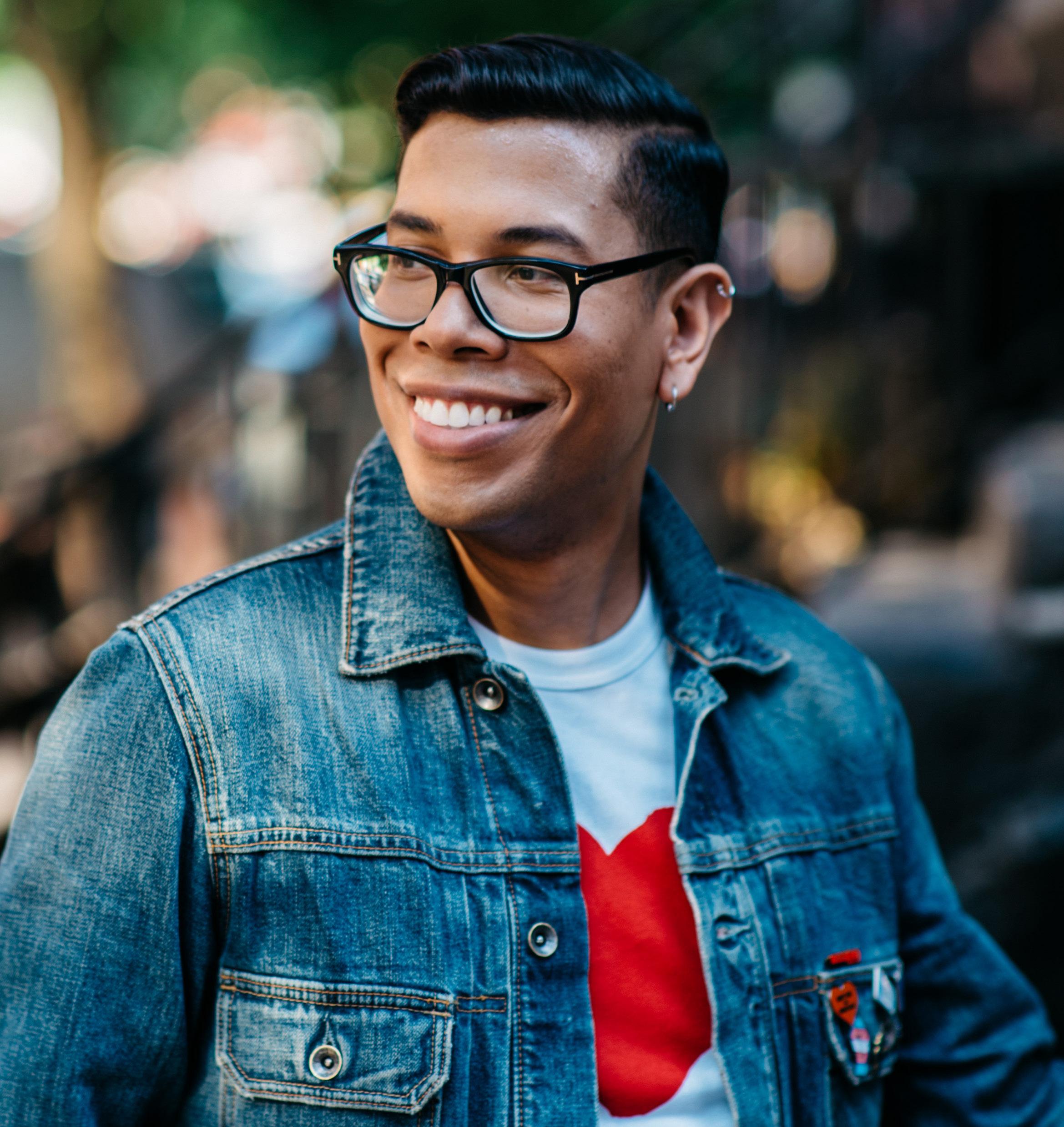
ARIEL POMERANTZ STEVEN CANALS Cocreator and Executive Producer, Pose, FX 99 Hispanic Executive
Canal took the idea to 150 executives in the entertainment industry, and he got rejected every time. Then the king of LGBTQ storytelling came along: Ryan Murphy. While Murphy has a strong handle on LGBTQ representation, an area that had been lacking for him—save for Naya Rivera’s lesbian character in Glee —was persons of color. Enter Steven Canals.
For Canals, whose show centers on ballroom dancing, a cultural phenomenon in the queer POC and transgender communities, it was important that he “fill a gap.”
“If I am feeling unseen, then I know that there are many others out there who feel the same,” he says. “And I am privileged. I am a cisgender male in the community. I know that if I am feeling this way, then the women and transgender members of our community are feeling it even more.”
Canals knows that there are more queer stories being told now than ever before. But he is also aware
that most of these stories are still revolving around white queerness. “There are nuances in the POC LGBTQ community and definitely in the transgender experience,” he explains. “Yes, we are alike, but there are differences and these stories must be told.”
So how does Canals manage to remain focused and keep his eye on the prize? And what advice does he have for other young Hispanic executives, no matter what industry they work in?
“Whatever it is you want to accomplish in life, it’s important to create a set of goals—and don’t let anyone dissuade you,” he asserts. “After letting go of the fear that often controlled me, I learned to trust myself to know that I was good enough and committed to making something happen. I am going to fight to see it through.”
Pay attention. There is something significant happening here. In television, the showrunner and creator role is everything.
Of course, if you’ve seen Pose, you already know that. From season one to season two, the three leads that were not POC have vanished. The characters who were POC and LGBTQ got more screen time. Could someone—a gay POC executive, perhaps— be looking out for the greater POC and LGBTQ communities? And, in particular, for transgender women of color?

If there’s one thing that the POC LGBTQ community could collectively say to Steve Canals as it relates to Pose, it might just simply be, “Thank you.”
Because that community views Pose as its own. It takes pride in every episode and shares every accolade. When the show gets an Emmy nomination, the community gets an Emmy nomination. When it gets an early renewal, the community celebrates that early renewal. And when its star, Mj Rodriguez, becomes the first Afro-Latina and transgender actress to play the lead in an LA stage version of Little Shop of Horrors, the community is there cheering her on.
Canals recently inked an overall deal with 20th Century Fox to create programming. This means more stories and representation for LGBTQ and POC communities to “fill that gap.” And, without a doubt, so many more thank-yous.
MICHAEL PARMELEE/FX
“I IDENTIFY AS A QUEER AFRO-LATINO, AND GETTING TO THAT PLACE HAS BEEN A LONG JOURNEY.”
100 Top 10 Líderes
Steven Canals (left) talks with Mj Rodriguez (center) and Indya Moore (right) on the Pose set.
SEEING IS BELIEVING
Responsible
for the critical hit One Day at a Time, Gloria Calderón
Kellett has inked a deal with Amazon so that she can continue telling stories for everyone
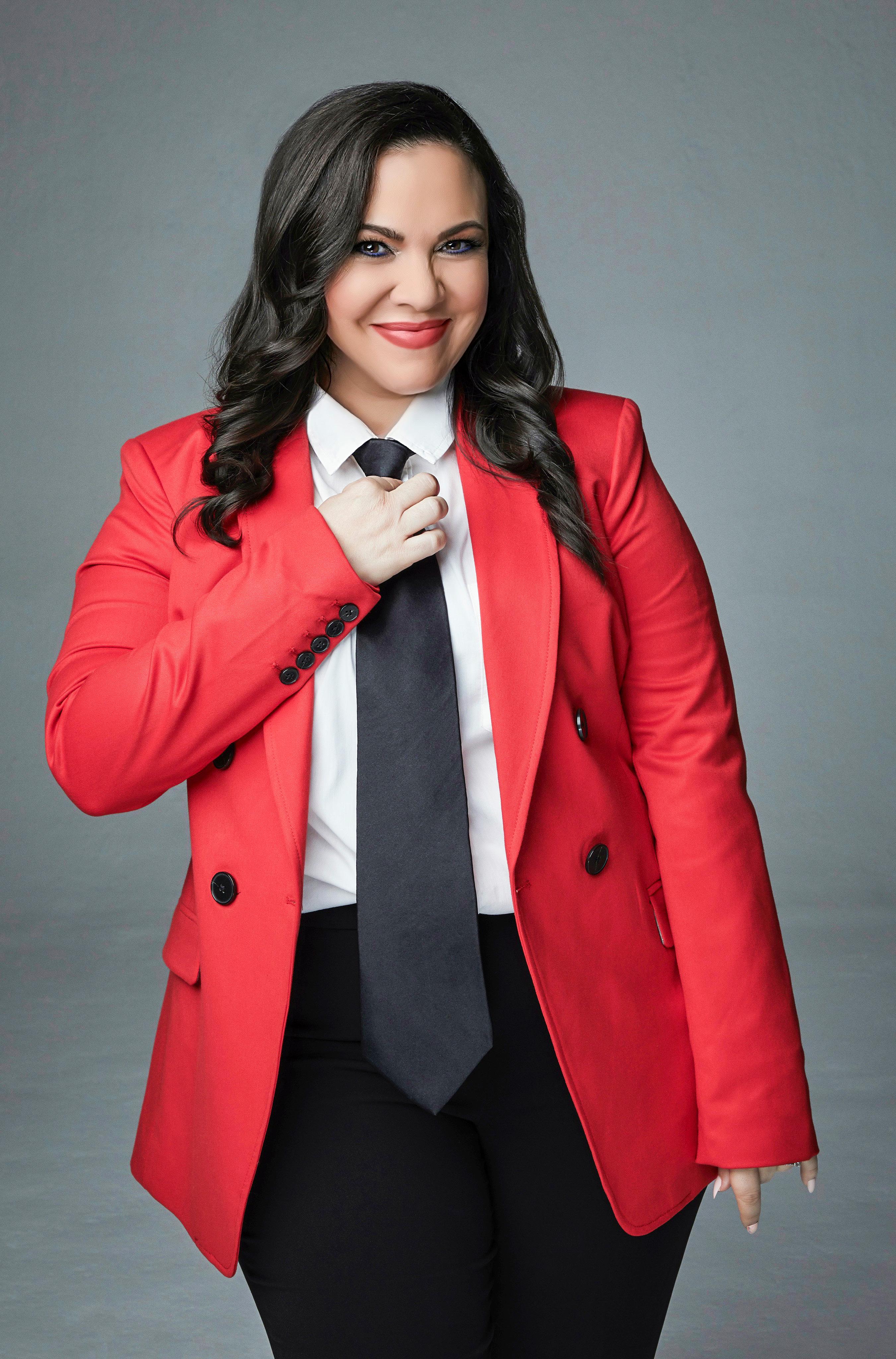 BY BILLY YOST
BY BILLY YOST
LUZ GALLARDO
101 Hispanic Executive
AS A KID, GLORIA CALDERÓN KELLETT SAW
herself in whoever was on-screen. “When I was watching Pretty in Pink, I was Molly Ringwald,” Calderón Kellett says. “When I was watching the Seavers on Growing Pains, I was Tracey Gold.”
Eventually, she began noticing a disturbing pattern. No one who looked like her seemed to be on TV. Having spent her early years in the fairly monocultural state of Oregon, she was used to existing within a predominantly white culture—but one quirky moment in particular provided her the spark to work for change. “I would watch Miami Vice with my dad, and one night we saw there was going to be a character whose name was Calderón just like us. We were so excited. Then he turned out to be the drug dealer.”
The triumph of Calderón Kellett is two-fold. The actress-turnedwriter, writer-turned-playwright, playwright-turned-showrunner-andproducer is responsible for some of the most groundbreaking Latino representation on television. It comes in the form of a reimagining of Norman Lear’s TV series One Day at a Time —with this version being told from the perspective of a Cuban American family. The series is not Calderón Kellett’s first success in Hollywood, nor will it be her last. And it’s precisely her commitment to getting voices heard on the big and small screens that has laid the groundwork for more to follow her path.
You Aren’t Always What You See
Calderón Kellett was initially drawn to acting for the very reason she was confused by what she saw on television. “No one I knew existed in the world on-screen, but I knew we were there,” Calderón Kellett says. “That made me hunger for more stories about people that looked like me and the community I knew and loved.” The Hollywood of the 1990s, unfortunately, was well behind the curve.
Auditions fell into one of two camps. Calderón Kellett was never trying out to play the role of a doctor, hero, or teacher. “Every audition was either a gangbanger’s girlfriend or a gangbanger’s sister,” Calderón Kellett remembers. “It’s funny the first two or three times, but then you realize that this is it. This was the only thing I could get.”
And even those roles became hard to come by. Calderón Kellett was repeatedly told she sounded “too educated” or didn’t sound “Latino enough.” White casting agents and directors were explaining to a first-generation daughter of two Cuban immigrants who escaped the island during the mass exodus of Operación Pedro Pan that she was lacking in authenticity. The frustration boiled over and ultimately led Calderón Kellett to writing. She became conscious of the stark fact that those who crafted stories ultimately had a better chance of making a wider impact on culture at large.
Calderón Kellett would make the most of her decision. She was offered a “double-bump” increase in pay to take on writing responsibilities on The George Lopez Show, one of the few sitcoms on television depicting the lives of Latinos. At first, it seemed like money that was too good to pass up. But when Calderón Kellett was also presented with the opportunity to take a normal paying gig at a little upstart show called How I Met Your Mother, she deliberated. “I remember thinking that if I go to George Lopez , I’m going to be the ‘Latino writer’ for the rest of my career. If I go to How I Met Your Mother and do well, I will be a good writer who just happens to be Latino.”
A New Legacy
Calderón Kellett spent over a decade building out her experience in the very system that had long stifled Latino representation. Remarking on the development of her idea for the reboot of One Day at a Time with partner Mike Royce, Calderón Kellett says it was much more than just putting a Latino spin on an old idea. “I wanted to tell real
102 Top 10 Líderes
“NO ONE I KNEW EXISTED IN THE WORLD ON-SCREEN, BUT I KNEW WE WERE THERE.”
GLORIA CALDERÓN KELLETT
stories about my family and things that actually happened,” Calderón Kellett says. “Some of it was cute, some of it was not. We talk about colorism in our community. We talk about LGBTQ acceptance. We talk about church and religion and all of those issues that are on the table, and how Latinos view them. I think the texture of the show feels real because it is real. A lot of this is ripped from our lives.” The series ran for three seasons on Netflix before being picked up for a fourth by Pop TV.
And Calderón Kellett is just beginning. In November 2019, she was tapped by Amazon to create and develop TV series and films for its streaming service via her own production company, GloNation. “I’m so excited because I feel like I’ve been watching so many of [Amazon’s] shows for so long,” Calderón Kellett says. She joins a growing list of female writers/creators like Phoebe Waller-Bridge (Fleabag) and Lena Waithe (The Chi) developing new and compelling properties for the streaming giant.
“[Amazon] seems like where the cool kids are right now,” Calderón Kellett says, laughing. “So, I’m really touched that when I met their team, everything they said was so in-line with the type of storytelling I want to do.” Though she might’ve been forced to work her way through difficult circumstances in a too often tone-deaf entertainment industry, in doing so Calderón Kellett has helped new stories, new faces, and new ideas find their way to screens all over the world.
Dream a Little Dream
Gloria Calderón Kellett wants to teach you how to make it. Literally. The showrunner, producer, and writer teamed up with YouTube and BuzzFeed to talk about everything from “TV Writing 101” to securing an agent to navigating Hollywood. “It’s my version of a master class,” Calderón Kellett says, laughing. “Except we did it all for free.” The class was conducted in hopes of reaching young people and educating them about how to roll up their sleeves as their careers evolve within the entertainment industry.

COURTESY OF SONY PICTURES
CEO, GloNation Studios; Executive Producer and Co-Showrunner, One Day at a Time, Pop TV
103 Hispanic Executive
Gloria Calderón Kellett (right) sits alongside Executive Producer and Co-Showrunner Mike Royce (left) on the set of One Day at a Time.
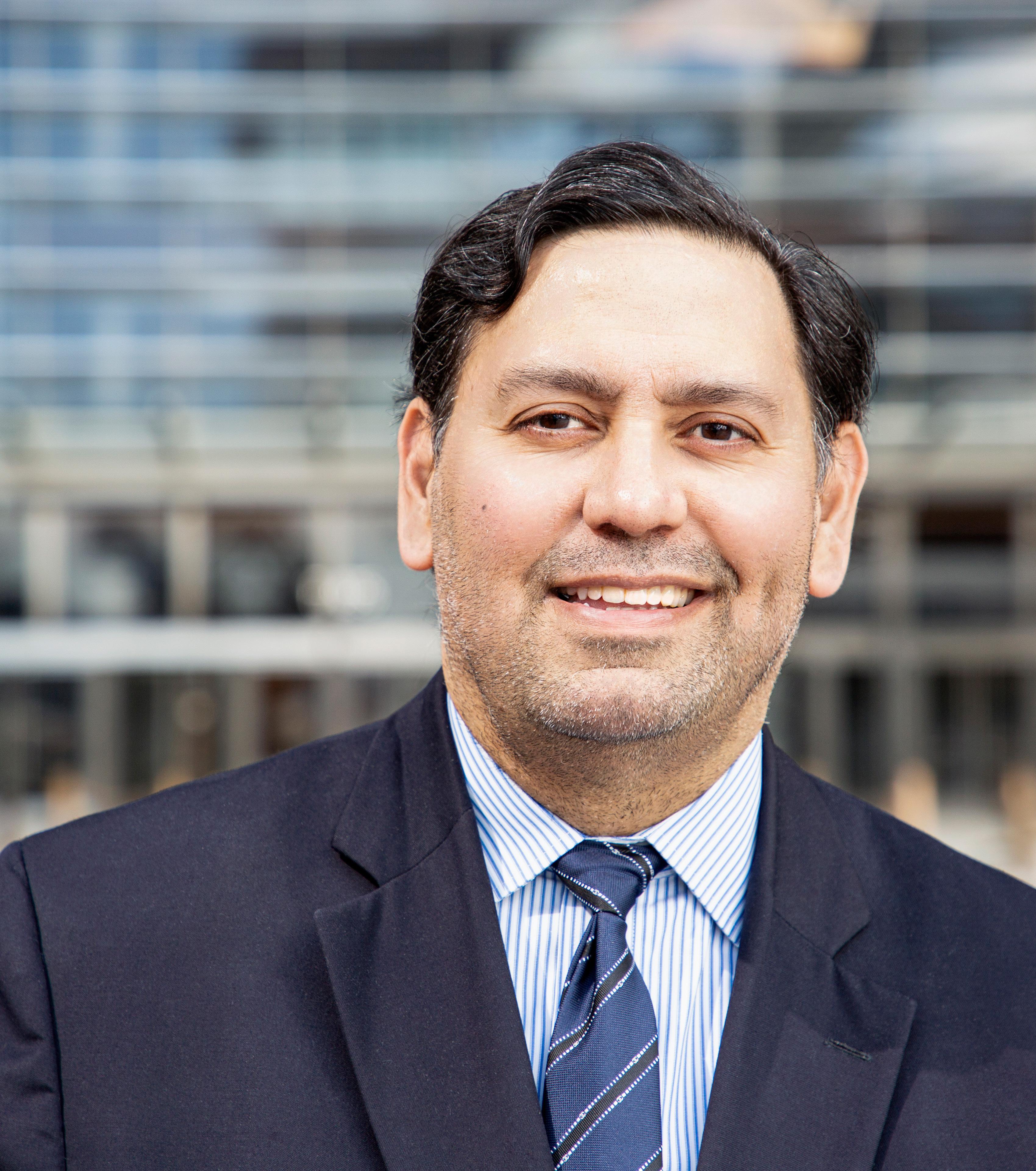
DAVID SCOTT HOLLOWAY 104 Top 10 Líderes
A CELEBRATION OF DIFFERENCE
Ramon Escobar lives in honor of his parents’ choices their choice to immigrate to the United States, and their choice to embrace all that makes them who they are
 BY SARA DEETER
RAMON ESCOBAR VP of Talent Recruitment & Development, CNN Worldwide
BY SARA DEETER
RAMON ESCOBAR VP of Talent Recruitment & Development, CNN Worldwide
105 Hispanic Executive
TO RAMON ESCOBAR, THE STORY
of how he became a vice president at CNN Worldwide begins not with his education at the University of Missouri School of Journalism or with his first position as a producer at Univision WXTV Channel 41. It begins with a love story.
“My father had a very eclectic upbringing in El Salvador—he ran away from home at thirteen and traveled the world working on boats. He even joined the circus at one point,” Escobar says. “But one day, in Colombia, he met this beautiful woman on a blind date and decided to marry her. That was my mother.”
Escobar’s parents initially planned to settle in New York, stopping only briefly along the way in Arkansas to visit some relatives. But as soon as they got to Little Rock, a snowstorm set in and made travel impossible. “My parents had nothing, no money. But they had a newborn to take care of—my older brother,” Escobar says. “So, my father went to the Catholic church and asked for help. They gave him a job in maintenance, and we stayed in Little Rock for the next twenty years.”
Growing up in Little Rock, Escobar and his family lived paycheck to paycheck. “But my siblings and I didn’t know that,” Escobar says. “We never felt that we were poor. I work with a lot of smart people, but I still consider my parents to be the two smartest people I know because of all that they were able to pull off despite the sacrifices they made.”
Escobar’s parents allowed him every opportunity they could, he says, whether that meant ensuring that he visited El Salvador and Colombia during school vacations, or helping him travel to the White House as the Arkansas state representative of Boys Nation—an honor for which he was congratulated by then Governor Bill Clinton, a former Boys Nation representative himself.
“My parents were very insistent that we not forget where we came from,” Escobar says. “That meant talking with our relatives about the culture, the customs, and the food—but it also meant getting all sorts of magazines and newspapers to keep up
with the news from back home. So that created in me a tremendous desire to follow what was going on in the world.
“But the media was also how my parents learned everything they knew about America,” Escobar continues. “When they first got here in the early 1960s, they watched the civil rights movement unfold on TV and then again right outside their house.”
This experience inculcated in both Escobar and his parents a deep appreciation for civil rights, an appreciation that was only compounded by the discrimination that Escobar and his family faced as a result of their “foreigner” status.
But even when he watched television coverage of international events, Escobar says, he did not see many people who looked like him. And those who did weren’t often portrayed in a positive light.
“I saw civil wars, drug wars, and people in bad situations. But I had been to El Salvador. I had been to Colombia. So, I knew that wasn’t the whole picture,” he says. “I decided that was what I wanted to do— become a part of the world that helps shape not only opinions but the reality and facts of life for people all around the world.”
And for nearly three decades now, that is exactly what Escobar has done. From breaking the news of the Gianni Versace murder and
106 Top 10 Líderes
“BEING FROM ARKANSAS IS JUST AS MUCH OF AN ASSET AND A COMPONENT OF MY DIVERSITY AS ANYTHING ELSE.”
AnforEye Talent
For decades, Ramon Escobar has discovered, developed, and mentored elite on-air talent. More than just a knack, his distinct ability has practically become a super power—as evidenced by the media personalities he’s affected over the course of his career.
“I’ve known Ramon for more than twenty-five years, and in that time, have had the pleasure of watching him grow and develop into a great leader with one of the best eyes for talent in the business. He’s helped change the face of CNN, ensuring that we have the most diverse on-air talent in the industry.” —Jeff
Zucker, Chairman,
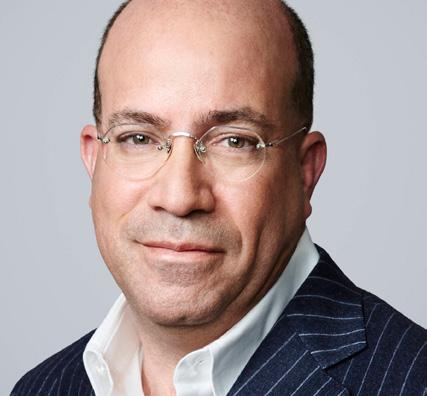
WarnerMedia News & Sports and President, CNN Worldwide
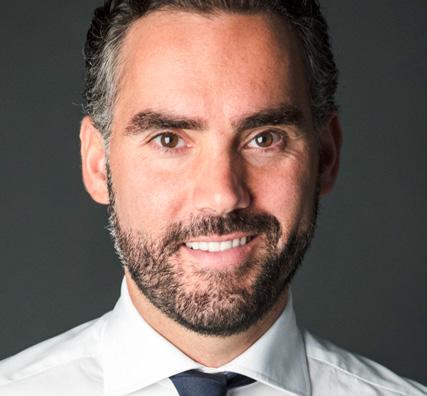
“Ramon has been instrumental in shaping the journalist, newsroom leader, and person I am today. Whether it is pushing me to produce content that is fair and accurate, nurturing a newsroom environment that is collaborative, or reframing diversity and inclusion as a problem to be solved to an opportunity to be realized, Ramon has been an important resource for me.”
—Hugo Balta, President, National Association of Hispanic Journalists and News Director, WTTW (PBS Chicago)
“Ramon was one of the first executives in our industry to recognize and address the lack of diversity in our newsrooms. Not just gender and race, but culture, sexual orientation, age, and points of view. He understands the value this generates for the companies he’s worked for and for the audience. I’m lucky to call him a mentor and a friend.” —Enrique Acevedo, Anchor/Correspondent, Univision Network News
“Five minutes into my job interview with Ramon it became clear the virtues of diversity were personal to him. He spoke about it with true passion and was obviously very proud of the team he built and the advantages of an inclusive work place, and he wanted folks joining his team to understand that from the start. That was twenty years ago, and in some ways it felt like we were ahead of the game.” —Lester
“Ramon is every definition of leader. He leads by example, uplifts colleagues, and invests in people to help each of us reach our potential. His contributions to CNN are visible on air and felt behind the scenes, in the collaboration of colleagues representing diverse backgrounds and perspectives, which Ramon has prioritized in his recruitment and development role. His passion inspires, and his compassion has helped create a culture of familia at CNN.
“Ramon first reached out to me when I was a local news anchor at the ABC affiliate in Denver, my hometown. I was reluctant to leave my work situation at the time, but Ramon’s energy and vision convinced me to take a leap of faith and explore the mission of CNN. Six years later, I’m grateful to consider Ramon a friend and mentor. I have never felt more satisfied or passionate about the work I do as a journalist, thanks in large part to Ramon’s guidance and support.
Holt,
Anchor, NBC Nightly News with Lester Holt; Anchor, Dateline NBC
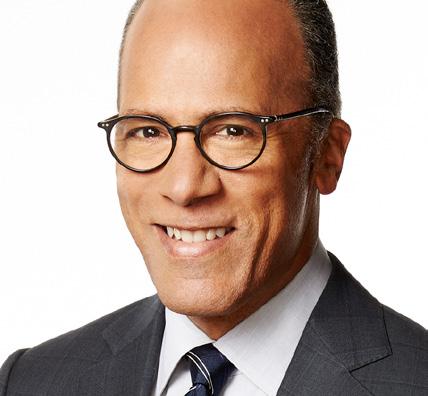
“Working with Ramon Escobar was one of the highlights of my career in journalism. During the 2000 Florida recount, I was reporting on the Palm Beach votes coming in. Ramon called me and encouraged me to call a few more of my sources. With his brilliant insight as an editor, we broke huge news during one of the closely watched stories of my lifetime as a presidential election hung in the balance. He is a great executive and producer.”
—Norah O’Donnell,
Anchor and Managing Editor, CBS Evening News and a 60 Minutes Correspondent
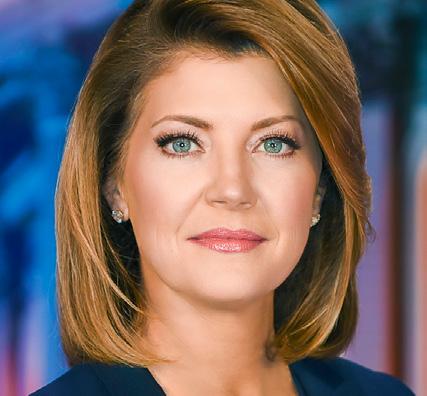
“As an organization, CNN is lucky to have Ramon among its leadership. And as a Latina, myself, Ramon’s success is aspirational. He’s like a North Star, exemplifying what’s possible through tenacity, relationship building, and commitment to having a positive impact—at work, in our community, and around the world.” —Ana Cabrera, Anchor, CNN
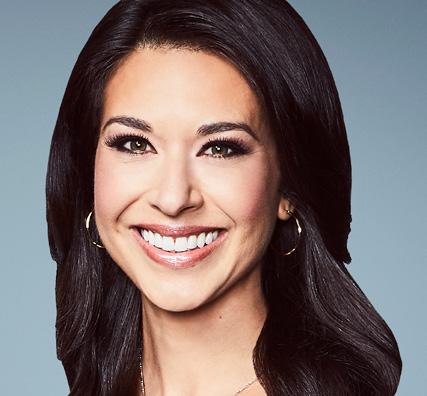 JEREMY FREEMAN/CNN (HOLT), JOHN NOWAK (CABRERA), UNIVISIÓN (ACEVEDO), MARY ELLEN MATTHEWS/NBC (HOLT), CBS NEWS (O’DONNELL)
JEREMY FREEMAN/CNN (HOLT), JOHN NOWAK (CABRERA), UNIVISIÓN (ACEVEDO), MARY ELLEN MATTHEWS/NBC (HOLT), CBS NEWS (O’DONNELL)
107 Hispanic Executive
becoming the youngest news director in the history of NBC to covering the Bush-Gore election in 2000 and going days without sleep to cover the chaos and trauma of 9/11, Escobar has become an undeniable force within the industry.
But these days, Escobar finds himself behind the scenes, working to find and develop the next generation of reporters, producers, and editors as VP of talent recruitment and development at CNN.
“We have to constantly think about how to find the best and brightest people in the world, for on-air and off-air positions,” Escobar says. “We need to find fantastic people and figure out why they aren’t with us, and sometimes that means finding people before they even realize how good they are.”
You have to have an eye for talent in this line of work, Escobar says, a knack for spotting talented young men and women who will turn into respected journalists like Lester Holt, Natalie Morales, Mika Brzezinski, and Ashleigh Banfield. But you also have to be mindful of how all those talented individuals fit into the bigger picture.
“A lot of the people that I’ve worked with or brought on have changed the face of the network by diversifying it—people who are Latino, or African American. But people forget that I am also from Arkansas,” Escobar says. “And being from Arkansas is just as much of an asset and a component of my diversity as anything else.”
All of the different components of who we are and how we think are important, Escobar stresses. And we need to understand that from as early on as possible.
“When I was first starting school, my mom came to me and said, ‘I just want you to understand that it’s possible they’re going to make fun of you,’” Escobar recalls. “And I just thought, ‘Why? Why would anyone make fun of me?’”
“‘Because you’re different from them,’ she said. ‘Your parents come from another country, you speak a language other than English, you have an accent, and your name is so different. You are different.’”
“‘So, what should I do?’ I asked.”
“And she said, ‘Let me ask you something, Ramon. Do you think speaking two languages is better than one?’”
“Yes.”
“Do you think that having traveled and understanding multiple cultures is better than knowing just one?”
“Yes.”
“‘I think so, too,’ she said. ‘This is a strength. But they’re going to make it seem like a weakness because they don’t understand it. So, educate them. Tell them about Colombia, tell them about your family. You can help people not only understand difference but celebrate it, too.’”
As a journalist as well as an executive, Escobar has strived to live up to his mother’s words. And now, as VP of talent recruitment and development, he has the platform he needs to help ensure that everyone else at CNN recognizes their value.
“Embracing diversity isn’t just the right thing to do, it’s the right business thing to do,” Escobar says. “When you have a newsroom that truly looks like the world, he notes, a room with people from Arkansas and Korea, people from conservative as well as liberal backgrounds, people who are gay and straight, white and black, you’ll have better journalism, higher ratings, and a better business all around.
“If we profess to be a news organization of the world,” the VP says, “we must reflect the world.”
“EMBRACING DIVERSITY ISN’T JUST THE RIGHT THING TO DO, IT’S THE RIGHT BUSINESS THING TO DO.”
108 Top 10 Líderes
DARE TO BE CURIOUS
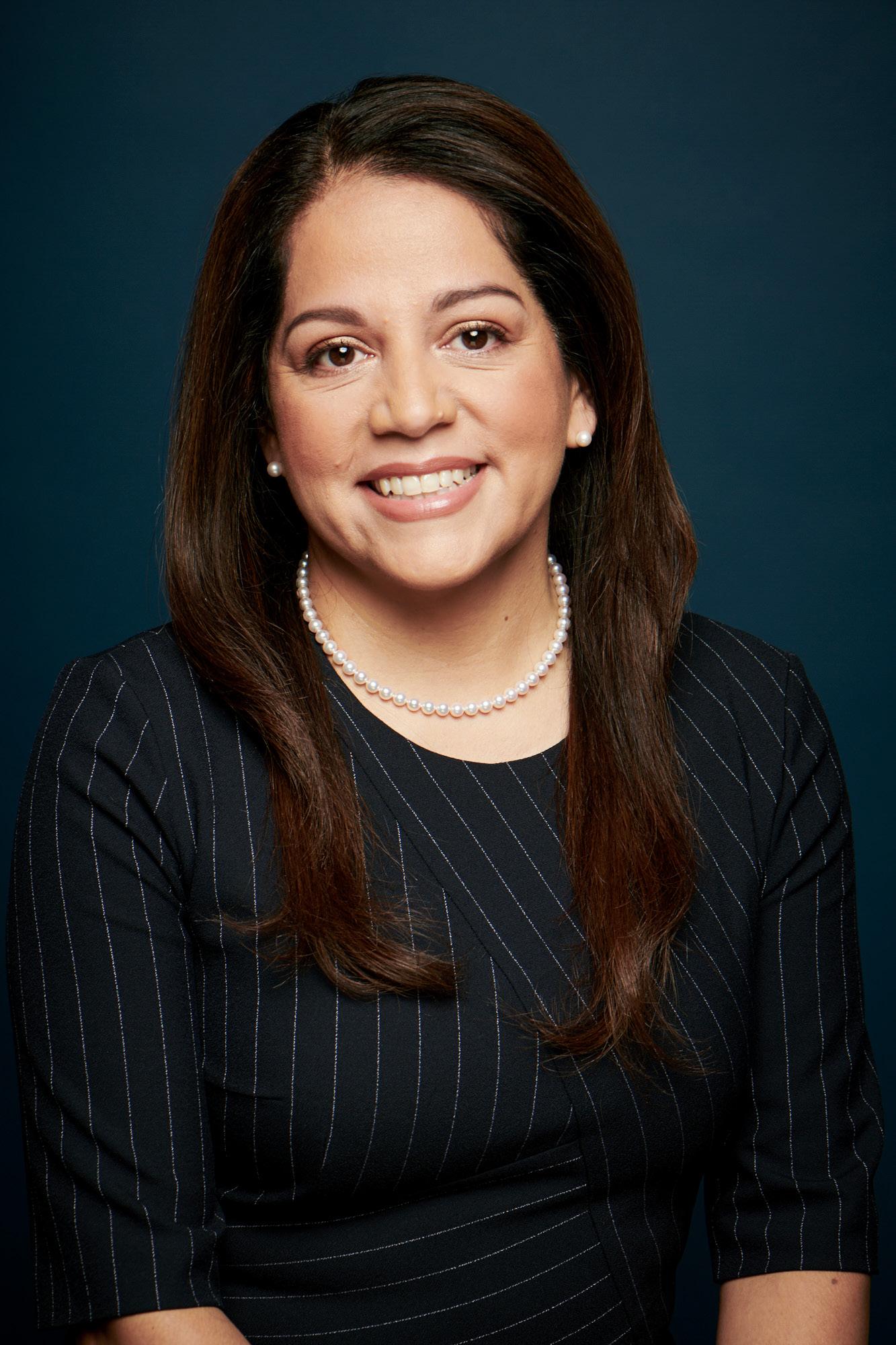 BY SARA DEETER
BY SARA DEETER
IBM’s Teresa Hamid on the importance of embracing change in a fast-paced industry full of opportunity
JON SIMON TERESA
Fellow, VP, and CTO Cognitive Process Platforms, IBM 109 Hispanic Executive
HAMID
TWENTY-THREE YEARS AGO,
when Teresa Hamid joined multinational technology provider IBM as a product developer, she struck everyone around her as a promising and ambitious talent. Now, people working in IBM offices around the world know the vice president and chief technology officer (CTO) as the one to turn to when they’re in need of advice, guidance, or just a listening ear.
“My high school guidance counselor was actually the one who introduced me to computer programming and engineering,” Hamid recalls. “I liked the idea of working with computers—there was always something new.”
Hamid’s early experience in technology secured her a position as a programmer for a large insurance company when she was just sixteen years old. “I was so excited about that job,” she says with a laugh. “It was a tremendous opportunity to take what I had learned and apply it in a real business.”
As Hamid has continued in her career, working full-time for that insurance company for a brief period before accepting her first position at IBM, that sense of excitement has not abated. Her career journey has mirrored the progression of emerging technologies, she explains, allowing her to remain immersed in the most dynamic side of a fast-paced industry.
As an IBM fellow, VP, and the CTO of cognitive process and transformation in IBM Services, Hamid is responsible for bringing leading-edge technologies together in order to drive innovation across businesses as well as product lines. “You do have to continuously challenge yourself,” she says of the work. “You have to be willing to be uncomfortable and have a natural curiosity about what comes next and how we can do things differently.”
Hamid has certainly not allowed herself to become too comfortable in any one place. She’s moved from IBM’s software lab to IBM Services, while engaging with IBM Research, leading the
North America analytics center and now leading business platforms for the cognitive enterprise. She even completed a stint in Cairo, Egypt, as the software lab’s chief architect.
“There’s just a wealth of opportunity here,” Hamid enthuses. “What’s kept me at IBM is knowing that there’s always another area to expand into, always another opportunity—and always, no matter the area, a great deal of energy and passion about the work.”
And these days, that energy and passion are more important than ever, Hamid notes. As CTO, she always makes it her goal to “create a moment of delight” for the individuals that have to engage with data, analytics, artificial intelligence, automation, cloud, and other complex systems. Whether that individual is a business operator or an end customer, the experience is always the focus.
But in the face of COVID-19, Hamid notes, even her high-performing teams needed to step it up. “Across the nation, and across the world, businesses are looking at new ways of working,” she says. “Working virtually is changing the way we work altogether, and IBM Services’ global delivery maintained service level agreements and mobilized teams within ten days of the market being disrupted by COVID-19.”
“But we still need to accelerate and amplify our efforts,” Hamid continues. “How can we be faster? Better? I really enjoy working with clients to answer those questions and provide solutions that enable them to realize their strategy”
That ambitious, client-centered mentality aligns perfectly with the company’s new strategy, recently announced by IBM CEO Arvind Krishna. “Our new CEO recently shared a public letter in which he stated that our goal is to be ‘the most trusted technology partner of the twenty-first century,’” Hamid says. “The role of AI, data, and the cloud—combined
110 Top 10 Líderes
with the ability to continuously provide this level of trusted engagement with our clients—is needed now more than ever.”
That unparalleled support for all clients has earned IBM an indisputable reputation as a leader in the technology industry. But if Hamid has learned anything in her more than two decades at the company, it is that that support extends inward as well as outward.
“I’ve always had great mentors at IBM, great managers who have been willing to help me continue growing and building my career while having a family,” Hamid says. “And having that open communication with managers really helped me find a balance over the years. Because of that tremendous support system, I have been able to enjoy my time with my children and take advantage of opportunities IBM has offered.”
Hamid has paid that forward, helping other women to navigate the organization and plan for any life changes that come their way. But sometimes, she notes, mentorship is far simpler than helping someone figure out the recipe for their personal and professional success.
“Sometimes, being a mentor just means listening,” Hamid says. “Mentees need to know that they can trust you and speak to you about things. Maybe it’s a conversation they can’t have with their manager— but it is certainly one they can and should have with their mentor.”
A Quiet Voice Can Pierce the Noise
Today, Teresa Hamid is widely acknowledged as an influential leader and voice for change. But those around her have not always recognized the power of her particular voice. “In the past I’ve been told, ‘You don’t speak very loudly; you’re too humble.’ But that is the way I was brought up,” Hamid notes. “My belief system is entirely based on my heritage, and in that system, there is a level of respect that you always need to remember.”
As a leader, Hamid has recognized the importance of balancing a belief system while maintaining confidence in expressing opinions and recommendations. By having a voice at the table, she makes sure she shares things of value instead of echoing others.
“You can speak up with respect and confidence while providing impact,” she says. Hamid also encourages others to speak and to be confident in their views. “I may not speak up all the time, but when I do I make sure its impactful.”
111 Hispanic Executive
“YOU HAVE TO BE WILLING TO BE UNCOMFORTABLE AND HAVE A NATURAL CURIOSITY ABOUT WHAT COMES NEXT AND HOW WE CAN DO THINGS DIFFERENTLY.”
“I WILL NEVER RUN OUT OF STORIES TO TELL”
BITTERSWEET. IT’S AN ADJECTIVE TANYA
Saracho knows all too well. Earlier in 2020, about a month before season three of the hit television series Vida returned on the Starz network, the forty-four-year-old showrunner and television creator took to social media and used the oxymoron to let followers know that it was time to put her “baby” to bed. This would be the show’s final season.
She wrote: “This goodbye is too bittersweet for words. I’d be lying if I said I’m not sad about not getting back into that magical writers’ room to keep crafting our story. But after all, I got to tell the exact story I wanted to tell, exactly how I wanted to tell it, and that is rare in this industry.”
Rare indeed—especially rare for Hispanics. And for Latinas in entertainment? Dios mío. If you want to see the odds really skyrocket, factor in another piece of Saracho’s identity: queer. “I’m a queer Mestiza Latina born in Mexico who was raised on the border,” she explains.
BY ROMAN NAVARRETTE
The fact that Saracho got to tell the story about a community of which she herself is a part—that is, to tell her own story—is in itself a narrative of inspiration for the greater LGBTQ community. That fact is not lost on her—and neither is the significance of her groundbreaking deal with Starz to develop new content.
Saracho is largely where she is today for one reason: because she proudly lays claim to who she is. She represents. And she relishes this fact. “There are a lot of people that feel limited or pigeonholed being considered a Latinx writer or creator,” she says. “But I never felt limited by this.”
She’s dedicated herself to telling these types of stories from the very beginning. Back in 2001, she created Teatro Luna, an all-Latinx theatre company in Chicago. “I will never run out of our stories to tell,” she says.
As showrunner for the series Vida, Tanya Saracho has never felt her creative voice was limited by her Latinx identity instead, she feels it was emboldened because of it
112 Top 10 Líderes
TANYA SARACHO

JACKSON DAVIS
113 Hispanic Executive
Creator and Showrunner, Vida, Starz
She probably also knows she will always have a career in Hollywood. From the moment she arrived, Saracho never tried to hide her identity to get ahead. This was her ticket in. “When I came to this town, I made it known to executives that if they needed this type of Latinx experience or representation to give me a call, particularly anything Latina centered,” she explains. “Anything around political brownness or queerness or involving immigrant status, I can speak to well.”
Saracho was dubbed a “diversity hire” during her first writers’ room gig on Lifetime’s Devious Maids Nevertheless, she later earned a spot inside the writers’ room for HBO’s Looking, which gave her a chance to show her range.

Despite her uphill battle, she was able to navigate around obstacles to reach where she is now. Today, that includes a writers’ room she’s assembled that is all Latinx, queer-inclusive, and, as with season three of Vida, all Latina.
“I wasn’t very gracious in the beginning and was in darkness a lot, especially during that first year,” she says. “I sort of got thrown into the pool without any planning or any design. I didn’t politically know anything about it either—about what it means to be a brown-bodied person in such a white space as the writers’ room. I wanted to quit all the time.”
Lucky for us, Saracho didn’t quit. And, after Devious Maids, her experience on Looking was the catalyst for showing her what she could do within the television landscape. “You can make art,” she gushes.
She explains that there is Looking DNA in Vida, talking about how the scenes are creatively shot to help tell the story. The way in which she describes her techniques alludes to her innate ability to incorporate a “Latino lens.”
Saracho possesses hustle. She’s full of hustle. And other Latinas in the business, many of them actresses, possess that same hustle. Whether it’s exemplified on another Latinx television hit, like Hulu’s East Los High, or during auditions for Saracho’s show, they all hustle. But is that enough in Hollywood?
With an in-depth focus on “gentefication,” LGBTQ issues, and family, Vida was a critical hit. It was praised by industry execs, journalists, and the Latinx community. It boasts a 100 percent rating on Rotten Tomatoes. It was named 2019’s Outstanding Comedy Series at the GLAAD Media Awards.
Yet the ratings struggled, and many say that it wasn’t easy for Hispanics to access. You had to pay $8.99 to watch it on the Starz app, which doesn’t really offer other Latinx-focused shows or Latinx actors. The end was inevitable.
Bittersweet indeed. But for Saracho, as leader of her own show, the silver lining shines bright.
“One of the best things about Vida was being able to hire people and give them their first shot, just like I got my first shot as a showrunner,” she says. “Nothing excites me more than that.”
A true chingona, Saracho knowns that sometimes to take up space means you have to demand it, and she believes that type of mentality applies to all types of careers. The battle cry “No stories about us without us” is a way of life for her. But it’s also a theme she hopes others will incorporate into their lives.
KAT MARCINOWSKI/STARZ
114 Top 10 Líderes
Tanya Saracho (center) speaks with the stars of Vida Melissa Barrera (left) and Mishel Prada (right).
DON’T BE AFRAID OF THE X
Author and journalist
Paola Ramos documents the Latinx movement and community in hopes of redefining what it means to be Latino
BY BILLY YOST
PAOLA RAMOS
Author, Vice News Correspondent, Latinx Advocate

JULIO GONZALEZ NUÑO
115 Hispanic Executive
PAOLA RAMOS DIDN’T INTEND
to become a prominent voice for the Latinx community. She didn’t set out to become a de facto storyteller for those who have been ignored for decades, for centuries. But that’s kind of the point. Whether focusing on Latinx drag queens who are working to battle an HIV epidemic in a Texas border town, trans migrants fighting to get their families out of border detention centers, or the dozens of stories of the oft-forgotten Latinx populations of Midwest America, Ramos is important because of the exposure she gives to an influential population. And considering that she believes the 2020 presidential election to be the most important of her lifetime, she’s more motivated than ever to help the country’s second largest voting bloc better realize that it’s time to amplify its collective voice.
Storytelling with Purpose
It’s pretty easy to say storytelling is in Ramos’s blood. She is the daughter Jorge Ramos and Gina Montaner, the former being one of the most recognizable names in American Spanish language broadcasting, and the latter being a journalist and managing editor at Telemundo 51 in South Florida. Ramos’s own desire as a forward-thinking storyteller collided head-on with the first term of the Obama administration and her passion for political advocacy. “I graduated [from Barnard College] right when Obama got into the White House and that sparked my interest in wanting to get involved and be part of that movement,” Ramos says. “Since then, I’ve stayed in politics.”
Ramos was a political appointee during the Obama administration and played a part during his 2012 reelection campaign. During Hillary Clinton’s presidential campaign in 2016 she was the deputy director for Hispanic media. Suffice it to say, she’s been around the block. And in 2020,
Ramos says the stakes couldn’t be higher. “For many communities out there, it is kind of a life and death scenario,” she explains. “This community has been the number one target of the current administration. Even during [the COVID-19 quarantine], ICE continues to do their raids, the wall is still being constructed, folks are still in detention. Here in New York, four out of ten Latinos have already lost their jobs because of [the pandemic]. It just doesn’t end.”
Even though the Latinx community too often feels unified as a collective target—and isn’t heard enough outside of the national discussions on immigration and race—Ramos has built her career on celebrating the uniqueness and variety of the culture. Her work for Vice News documents various subcultures and niche Latinx communities—much like those in contemporary white society—to help better contextualize a community that shouldn’t be singled out by its heritage.
Ramos’s upcoming book, Finding Latin-X: In Search of the Voices Redefining Latino Identity, was written to further that multipart narrative. “The idea is to understand the Latinx movement and hopefully help redefine what it means to be Latino,” Ramos says.
The cross-country road trip she set out on to provide subject matter for the book included stops in California’s Central Valley, as well as parts of the South, Midwest, and East Coast. Ramos conducted interviews with women’s rights activists at the border, for example, as well as indigenous communities in the Deep South that stretch back three generations. “It was a road trip to discover what it means to be Latino,” Ramos says. “From older generations to young people: I conducted so much field research and in-person interviews. It was amazing.”
The book will aim to continue the conversation about the roles Latinx communities and individuals
116 Top 10 Líderes
play in a society that too often ignores them until a political scapegoat is needed.
Defining Latinx
In hoping to better understand the Latinx movement, Ramos says her own story of self-discovery was an important starting point. “I think that’s part of the reason I’m so tied to the term Latinx ,” Ramos explains. “It was the first time I felt that a word completely represented me. Not just because I’m Latina or queer or the daughter of immigrants, but because I think it reflects a maturation. It allowed me to be myself, all at once, without apologies.”
Ramos is keenly aware that it was a privilege to grow up in a progressive household that allowed her to wrestle with her own self-discovery—a privilege that many are not granted in the same way. But perhaps that’s one reason why she commits herself to helping others share their stories.
“I think when Latinos are talked about in the media, many people try and put us in a box and think that our stories are only meant for a Latino audience,” Ramos explains. “It’s really important to me to make sure that in telling these stories, we’re reaching Americans across the board.”
In doing so, Ramos hopes that non-Latinx may be able to see a glimmer of themselves. “A person in the Midwest may seemingly think they have nothing in common with a drag queen on the border,” Ramos says, with a laugh. “But person-to-person, these are emotions and feelings. We all share a lot of that in common, and it’s so important to make that connection with people.”

That’s doubly important when considering just how many Americans are exposed to Latinx culture and how the ways in which Americans process that exposure too frequently skews xenophobic. “Yes, some Latinx are undocumented,” Ramos says. “But they’re also serving in executive positions. I think
once people understand the true meaning behind Latinx, it should make you feel proud of who you are and not be afraid of that X. I think the biggest problem with that term often comes from Latinos themselves. We’re in that stage of just educating ourselves and seeing each other face-to-face for the first time and being OK with it.”
JULIO GONZALEZ NUÑO
“[ LATINX ] WAS THE FIRST TIME I FELT THAT A WORD COMPLETELY REPRESENTED ME. NOT JUST BECAUSE I’M LATINA OR QUEER OR THE DAUGHTER OF IMMIGRANTS, BUT BECAUSE I THINK IT REFLECTS A MATURATION. IT ALLOWED ME TO BE MYSELF, ALL AT ONCE, WITHOUT APOLOGIES.”
“MULTICULTURAL IS THE NEW MAINSTREAM”
At HOLA! USA Sylvia Banderas Coffinet understands that the Latinx community deserves a proper platform from which to amplify its collective voice
 BY BILLY YOST
BY BILLY YOST
MARK LOPEZ 118 Top 10 Líderes
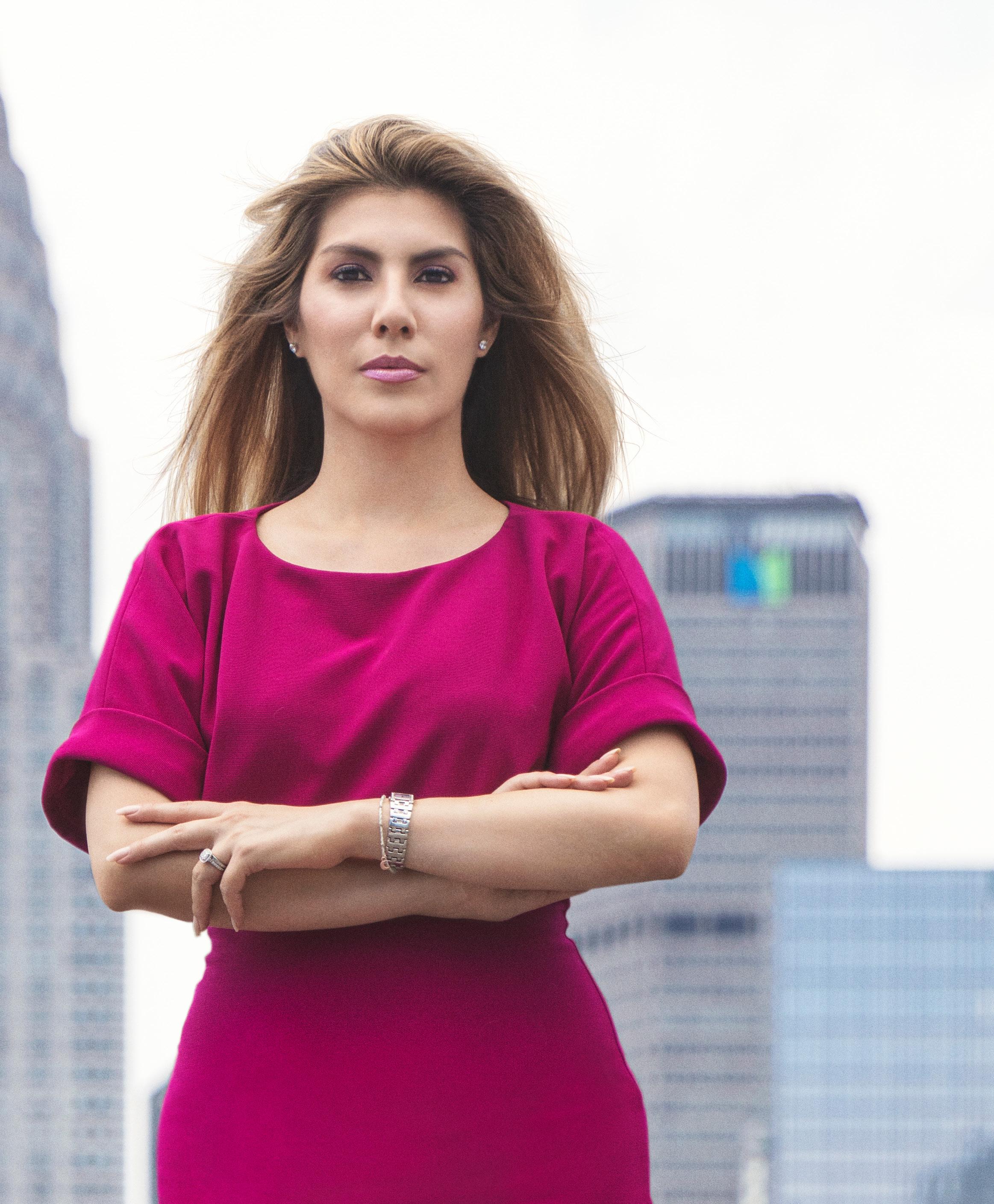
SYLVIA BANDERAS COFFINET Publisher and Chief Brand & Revenue Officer, HOLA! USA 119 Hispanic Executive
AS PUBLISHER AND CHIEF REVENUE OFFICER FOR THE US arm of the global HOLA! brand—hired at age thirty-three, no less—Sylvia Banderas Coffinet is focused on refocusing the narrative as it applies to one of the largest and fastest-growing demographic groups in the country. She’s made it her mission, both on the clock and off, to recognize the greater accomplishments of the Latinx community and how important it will be in defining the future, our future, together.
Banderas Coffinet spoke with Hispanic Executive about how mainstream media is well behind the curve when it comes to the representation of the Latinx community and how her upbringing influenced her commitment to pursuing equality. Her efforts have not only earned her congressional recognition from California Congresswoman Linda T. Sánchez, but also a commendation from the County of Los Angeles.
Could you talk about your upbringing in Los Angeles and how you feel like it continues to inform the work you do, including your nonprofit work with Ella’s Foundation?
Growing up in East LA has played a tremendous role in shaping my cultural identity and pride. I had the privilege of learning about my culture firsthand in a way that is very unique because of how ubiquitous Mexican culture is represented in the rich mosaic of cultural diversity that makes up the city.
I grew up surrounded by mostly Spanish and Spanglish speakers in my neighborhood, listened to mariachi music, danced cumbias, watched local artists paint murals dedicated to La Virgen de Guadalupe, and learned about Cesar Chavez and Dolores Huerta before I was eight years old. I attended regular family carne asada backyard gatherings that to this day are my most cherished memories growing up. The food, the music, the customs, and celebrations were very culturally rooted and centered. No doubt my cultural pride was forged under truly rich circumstances and imparted to me the great gift of pride in my heritage.
Being of service to others has always been important to me. I worked with Ella’s Foundation until 2017 and focused on bringing awareness to the important mission of mentoring underprivileged Latina youth. Now, my energies are focused on mentoring young Latina professionals and helping them advance their personal and career development as a way to empower more Latinas to take on larger corporate roles and opportunities.
What has your leadership provided to HOLA! USA and what about the mission of the organization aligns with your own mission and values?
I am a purpose-driven individual and expressly took on the role of leading HOLA! USA platforms because I believe deeply that our values were aligned in terms of authentic representation in the media for the Latinx community. HELLO! & HOLA! Media Inc. launched in the US to focus on the US Latinx population, and I wanted to lead a media brand that was for us by us.
HOLA! USA is dedicated to changing the narratives that propagate negative stereotypes about our community, which impacts how we see ourselves and how others see and treat us.
For example, a media study in 2019 (USC Annenberg Inclusion Initiative) revealed that only 3 percent of all lead roles in film and TV were of Latinos and, of that number, 25 percent were actually criminal portrayals. Given that we represent nearly 20 percent of the population, this is a dismal and awfully disproportionate reflection of the reality of audiences in America. We deserve so much better. American Latinos take pride in being American. They work hard and contribute to the economy, nurture and care for their family near and far, live colorful lives bursting with culture, preserve their roots and honor their heritage, and see themselves as 100 percent Latinx and 100 percent American.
120 Top 10 Líderes
Could you talk about the interaction of mainstream media and Latinx culture and where you think more representation efforts can be implemented?
Given the immense scale (one in five adults in the US are Latinx), economic power (buying power is projected to surpass $1.7 trillion), and growth rate (one in four children in the US are Latinx)— according to analysis from both Nielsen and Pew on the Latinx audience—it is a mystery that more mainstream media companies are not leading with multicultural programming and content. Ideally, content should reflect the reality of the audience that it serves. Alas, that is just not the case as instead we are seeing metrics of somewhere between 2 and 4 percent of total representation in the media.
The truth is that multicultural is the new mainstream and that multicultural done well is mainstream done right.
That said, we have a long way to go, but I believe one way to implement representation is for media companies to focus on diversity hiring, specifically in leadership roles that make programming and content decisions in film, broadcast, and media. There certainly isn’t enough Latinx representation in senior-level positions in the world of media and publishing, for example, and that is a shame because there is plenty of research that indicates that a more diverse workforce leads to significant advantages in creativity, increased productivity, and higher competitive advantages for companies.
What voice do you feel you bring to your organization? What are the challenges of trying to relay the Latinx identity to a wider population?
Because of my personal story and experience growing up undocumented, I care deeply about Latinx representation and social equity. I know what it means to be invisible and not have a voice, or worse be pigeonholed into a narrative that has nothing to do with my reality or can even go as far as criminalizing an entire group of people.
We are rapidly becoming the most influential demographic of this country. We have the power to
affect the way this country looks, eats, dances, thinks, and even votes! Our differences are not greater than what binds us: heritage, values, work ethic, family, and our positive aspirations for ourselves and our nation.
Are there any points of pride in your work for HOLA! USA that you look to when you need inspiration or motivation?
My greatest inspiration and motivation is my team. I work with a group of highly talented and dedicated content creators, editors, writers, marketers, sales people, analysts, and audience acquisition experts that give it their all every single day.
Ours is a steady upward climb, but we make it to the top together and deliver a high value proposition to savvy brands that care about how they are engaging with Latinx consumers. Speaking of brands, we’re anchoring our marketing success much to the benefit of our significant client base, including Estée Lauder Companies, Ulta Beauty, Sephora, MARS, Unilever, Target, Toyota, Porcelanosa, and Childrensalon. For a brand that is under five years old, we’ve already worked with over seventy-five accounts and counting—which gives us great pride and validates the work we are committed to.
“I KNOW WHAT IT MEANS TO BE INVISIBLE AND NOT HAVE A VOICE, OR WORSE BE PIGEONHOLED INTO A NARRATIVE THAT HAS NOTHING TO DO WITH MY REALITY OR CAN EVEN GO AS FAR AS CRIMINALIZING AN ENTIRE GROUP OF PEOPLE.”
121 Hispanic Executive
IT’S TIME TO RAISE THE BAR
BY SARA DEETER AND KATHY KANTORSKI
FOR
YEARS, CORPORATE
AMERICA HAS BEEN sending out a call for diverse, talented leaders capable of driving growth and fostering inclusive workplaces. But few companies have found it an easy matter to find that talent. According to Dr. Robert Rodriguez and Angel Gomez, cofounders and co-owners of the Latino Leadership Initiative (LLI), the problem centers on the fact that most leadership development programs have not truly combined those ideas of diversity and leadership.
Gomez and Rodriguez recently spoke with Hispanic Executive about the LLI and their efforts to solve this problem.
So how do you two know each other, exactly?
Dr. Robert Rodriguez: We’ve known each other about fifteen years now—I don’t know exactly where we first met, but when I met Angel, he was working as a consultant. And at the time, I was considering becoming a consultant myself.
So I think our friendship really started to solidify when I told Angel my thoughts about going out on my own, and Angel told me to just go for it. “You have the expertise, you have a brand, you have the network,” he told me. “There’s no time like the present.” And now, we have a solid friendship that has led to the great privilege of being able to work together.
Dr. Robert Rodriguez and Angel Gomez on their efforts to create a rigorous, intensive leadership development program for Latino professionals a program unlike any other in the marketplace
122 Top 10 Líderes
Cofounders and Co-owners, Latino Leadership Intensive
ANGEL GOMEZ
DR. ROBERT RODRIGUEZ
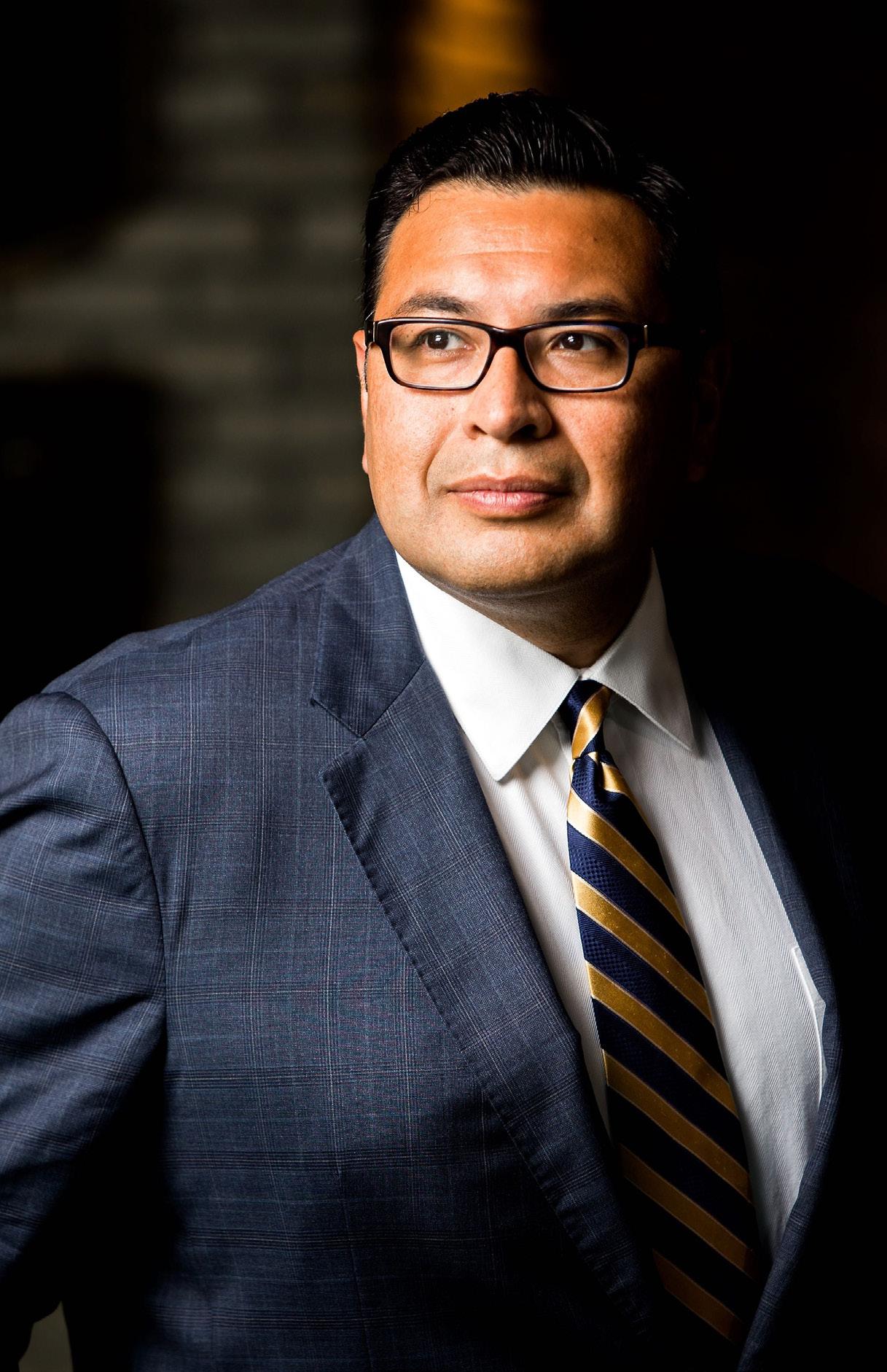
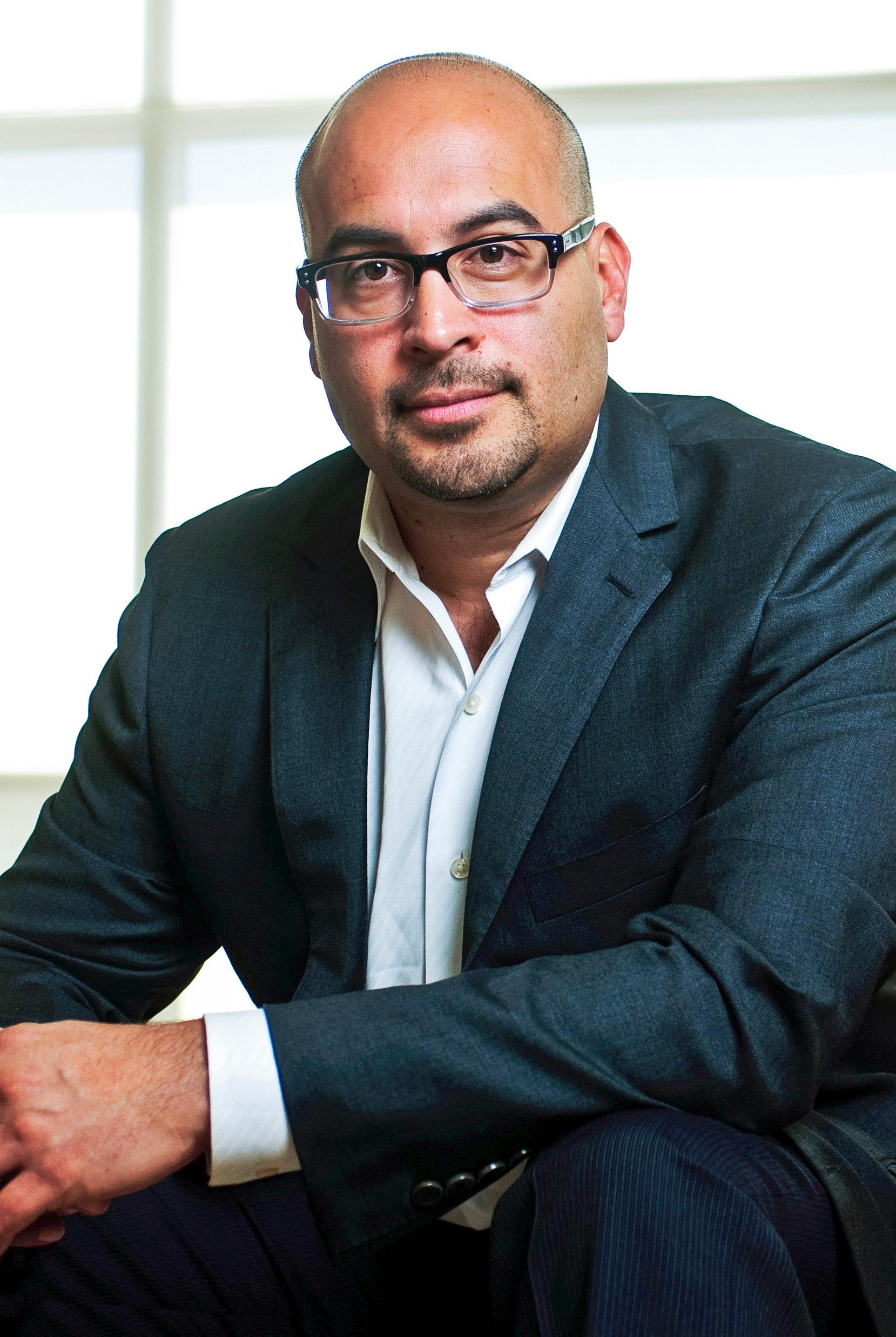
BRIAN J. MOROWCZYNSKI (GOMEZ), JORGE CAMARGO (RODRIGUEZ) 123 Hispanic Executive
Angel Gomez: My practice revolves around leadership development— teaching folks how to be better managers and leaders, doing executive coaching, talking about organizational development and organizational culture. I speak at many different conferences throughout the world on those issues, and Robert and I always thought it would be great to find a way to work together, to combine his experience around diversity with my expertise in leadership development and career management.
So after a few years of having lunch together and keeping in contact, we sat down one day in Chicago over a deep dish pizza and started brainstorming. Can we fashion a seminar where we look at essential leadership practices through the lens of the Latino cultural script? There is a way that Latinos show up—often unconsciously—in the workplace that may clash with American corporate culture. But what are the things that Latinos are doing that would actually be a benefit to us in that culture?
And after finishing that pizza and a pitcher of beer, we came up with the Latino Leadership Intensive.
What makes the Latino Leadership Intensive unique among all the other leadership programs out there?
Rodriguez: I myself went through a Latino leadership program at UCLA, and I’d seen many Latino leadership programs in academia as well as the corporate and nonprofit worlds. But the subjects of Latino identity and leadership topics were always separate. I had never seen a real fusion of the two, a fusion of what we call the Latino cultural script and business concepts.
Can you provide an example of how those two concepts can and should be integrated?
Rodriguez: Absolutely. It’s questions like, “Does our Hispanic heritage influence how we make decisions? Does our collectivist nature impact how we deal with conflict?” I’ve also seen many Latinos in the corporate environment struggling with their sense of identity and asking themselves, “Do I shout it from the rooftops that I’m Latino, or should I downplay it? I don’t want to be the token Latino—should I turn down job opportunities if I feel that’s the only reason I was offered the promotion?”
We wanted to address these real-world challenges that our community is facing in a mature, curated, structurally sound format.
“THIS WHOLE IDEA OF IDENTITY IS ESSENTIAL TO EVERYTHING WE DO AND— WHETHER OR NOT WE ARE COMFORTABLE WITH OPENLY EMBRACING OUR IDENTITY— IS MANIFESTED IN OUR BEHAVIORS AS WELL.”
124 Top 10 Líderes
–Angel Gomez
Gomez: I have a very, very strong point of view that anything I deliver has to be structurally sound, has to be curated. Everything in the program has to tie together, and make sense together. It has to be what I call a “Cobb salad” program, where you’ve designed the content very intentionally, rather than an ensalada mixta in which you’ve just put a lot of things together in one space.
What kind of impact have you seen from this program thus far?
Gomez: We encourage everyone to raise their awareness about who they are, how they show up, and how others perceive them. This whole idea of identity is essential to everything we do and—whether or not we are comfortable with openly embracing our identity—is manifested in our behaviors as well.
Rodriguez: And once someone gets more grounded in their sense of identity, they can relate better to others. They may realize why an Asian American colleague may not want to join the company’s Asian ERG; they may meet someone from the LGBTQ community who does not want to come out and have a better sense of what that individual may be dealing with.
But in addition to helping them become more inclusive leaders, the program also helps participants see their own Latino heritage as an asset. For years, many of these individuals have thought that they got to their level because they’re smart, they work hard, and they deliver results. But as they start moving up in the corporate world, they realize that everyone at that level is smart. Everyone works hard.
So what’s going to differentiate you from other folks? Your Latino background. It can be your secret power—it will help you bring a global perspective to your work, serve as a more inclusive leader, and improve your leadership abilities across the board.
What are some of the topics that you cover in the program?
Rodriguez: At the very beginning, we always emphasize that this is a program designed by Latino leaders, for Latino leaders. It’s an authentic space where you don’t have to hide who you are and won’t be judged.
One thing that we always talk about is how Latinos tend to be collectivist in nature—we tend to be focused on what’s best for the team rather than individual performance. We encourage everyone to talk about that and how it may affect their decision-making, their problem-solving, and even how they coach others.
“YOUR LATINO BACKGROUND. IT CAN BE YOUR SECRET POWER.”
–Dr. Robert Rodriguez
Gomez: People may be really good at working together on a team, but their tendency towards collaboration—and the cultural script that has told them to be nice, be likeable, and not create conflict—can actually get in the way of performance. If you are too focused on ensuring that everyone on the team is being respectful and getting along, you can lose track of the fact that you have a deadline. If you aren’t willing to deal with conflict, you may not speak up for yourself and may just tell other people what they want to hear.
Of course, we also talk about foundational leadership concepts, like emotional intelligence, strategic thinking, and active listening.
Looking back on the LLI years from now, what do you hope to have achieved?
Gomez: I want to know that there are thousands of people doing their jobs better because they interacted with me for a couple of days. The soft skills that I focus on are the most important and hardest skills to master—they are the key to success in climbing up the corporate ladder.
Rodriguez: Early on in my career, I didn’t embrace my Hispanic heritage because other folks were always telling me that I was the token Latino, that the only reason I was there was because of a diversity program. My parents always told me to not speak Spanish, to just assimilate. So I never thought that my identity was benefiting me; if anything, I thought it was hurting me.
But I hope that when people walk out of this program, they have not only developed their leadership skills but have also come to see their heritage as something they can really leverage and be proud of. We need individuals with that mentality if we are going to elevate the broader Latino community.
125 Hispanic Executive
DAISY AUGERDOMINGUEZ
Founder and CEO, Auger-Dominguez Ventures
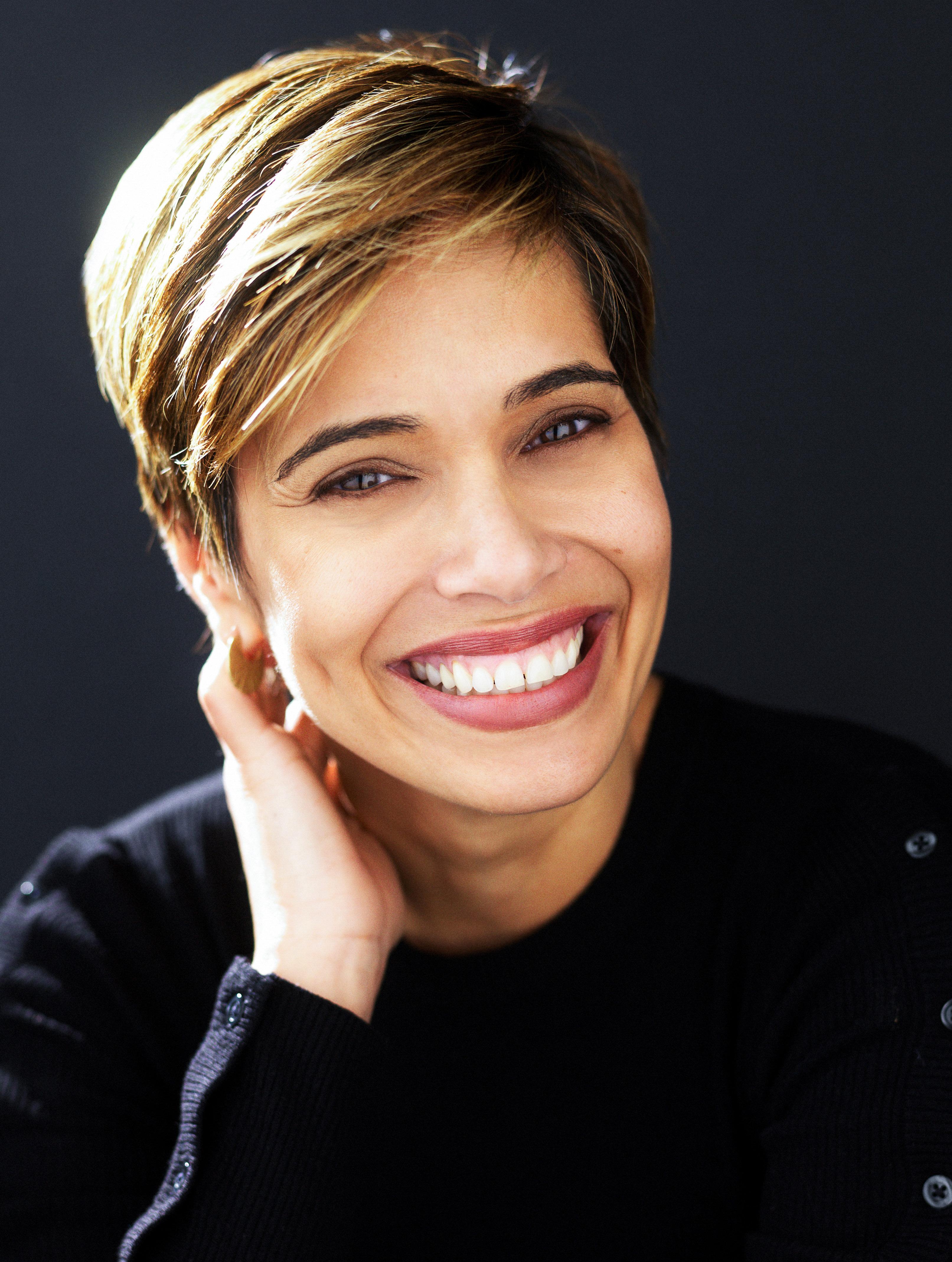
JEFFREY MOSIER
THE FUTURE IS OURS
Daisy Auger-Dominguez is hopeful for a corporate America that embraces its inclusivity, compassion, and equity but it’s up to all of us to make that a reality
BY SARA DEETER
ARE WE COURAGEOUS ENOUGH TO

reimagine our workplaces? That is the question that Daisy AugerDominguez, founder and CEO of consultancy firm Auger-Dominguez Ventures, has been asking for years. “America has always been an experiment,” she explains. “A complicated experiment built on racialized concepts of freedom, citizenship, and democracy.”
“If we don’t maximize the breadth of all our talent and build inclusive and equitable organizational cultures and systems,” Auger-Dominguez continues, “we will fail to maintain our competitive position globally. And the grand experiment that is America will fail.”
For more than two decades, Auger-Dominguez has been fighting the cultural norms and structures that have prevented corporate America from capitalizing on that full breadth of talent—the same norms and beliefs that have over the years branded Auger-Dominguez as “too foreign to speak English well,” too poor to be good at math or writing, and too much a product of affirmative action to be deserving of the achievements for which she has worked so hard.
127 Hispanic Executive
As a leader at top companies such as Google, Viacom, the Disney ABC Television Group, and Moody’s Corporation, the Bucknell University alumna has challenged the corporate world to cultivate workplaces marked by inclusion instead of microaggressions. But despite her passion for and commitment to these issues, AugerDominguez’s fight to “create space and opportunity for others” eventually began to wear her out.
“I was stuck in a corporate Game of Thrones,” Auger-Dominguez says with a laugh. “I was defining my entire existence by titles and achievement. I spent my energy battling toxic managers, battling ‘stuck’ organizations that didn’t want to move beyond simple solutions, and battling practices like covering, the practice of downplaying who you are in order to succeed in an organizational context.”
A study by the Center for Talent Innovation found that 76 percent of Latinos repress parts of their personas at work. “I was exhausted!”
Disillusioned with that lifestyle, AugerDominguez took the opportunity to take a full year off work following an organizational restructuring.
“I called it the ‘Year of My Heart,’” she says. “I knew that I needed to heal my heart and take care of myself—and I also knew that if I didn’t take time
to travel and disconnect, I was just going to get back into the same habits.”
So instead of taking headhunter calls and spending her days in an office, Auger-Dominguez traveled with her family over an entire summer. She reconnected with her past, with her Dominican heritage. When she returned to the US, she spent time with friends and mentees. She found time to attend every single board and committee meeting for Planned Parenthood Federation of America, the Robert Sterling Clark Foundation, the Brooklyn Children Museum, and other organizations she had been serving for years. She chopped off her shoulder-length hair into a pixie cut. And she didn’t look back.
By winter 2018, however, Auger-Dominguez knew that it was time to find another role. But while she had been receiving offers for months, none of them felt quite right. “I knew that all those organizations wanted me to do the same thing I had for years—to be their voice for diversity while leaders were only willing to make surface-level changes,” she notes. “I had seen how that played out, and I wasn’t interested.”
It was time for Auger-Dominguez to strike out on her own, to find the opportunities to implement
“THIS IS ABOUT OUR COLLECTIVE FUTURE. . . . WE ARE ALL INEXTRICABLY BOUND TO EACH OTHER.”
128 Top 10 Líderes
the lasting changes she had been dreaming of. And in April 2019, Auger-Dominguez made her move, starting Auger-Dominguez Ventures and sending out a call to everyone from Fortune 500 corporations to start-up companies to social impact organizations that she was ready and willing to help them “reduce the gap between the values that they espoused and the experience of their employees.”
In the year that has passed since then, Auger-Dominguez has been working “nonstop” to help the people and organizations that reach out to her.
“My vision has always been to build workplaces that work for everyone,” she explains. “In the grand scheme of things, I want to inspire leaders to be more courageous, to lead inclusively, and to shape workplace culture that are—in their very DNA—compassionate, inclusive, and equitable.”
And as Auger-Dominguez sees it, that is by no means some far-off dream. “It’s not going to happen overnight, of course, but I do believe that change can happen a lot faster than people think,” she remarks. “Instead of constantly struggling with moving past the trending hashtags, political landmines and pervasive blind spots, organizations can operate in inclusive and equitable ways.”
That inclusive culture, according to Auger-Dominguez, has to start at the top. “The individuals currently being groomed to take over leadership positions in the next five, ten years, are going to be expected to lead far more inclusively and equitably than their predecessors,” the CEO says. “We should be preparing those leaders to not just be outstanding operational leaders but innovative people leaders as well. They can’t simply replicate the same leadership patterns that have kept largely white and male executives the perpetual majority and prevented others from having seats at the table for so long.”
That work of transforming organizational structures and cultures will be hard—“really hard,” Auger-Dominguez acknowledges. “But this is about our collective future. All of our choices have consequences. We are all inextricably bound to each other, and we now have a unique opportunity to build radical new models of work that will last beyond any of us.”
There Is No Equality without Choice
Daisy Auger-Dominguez has been fighting for women and women of color specifically for decades, striving to ensure that they are able to do whatever they wish in their professional lives. But as she points out, “You can’t have autonomy or control over your career if you don’t have control over your own body.”
That conviction is what inspires Auger-Dominguez every day as a Planned Parenthood Federation of America board member. The nation’s leading sexual and reproductive health care provider, Planned Parenthood Federation of America is also the nation’s largest provider of sexual education—including more than 500,000 Latino patients.
“I know it’s hard, especially for immigrants and Latinos, to access high-quality healthcare in this country,” Auger-Dominguez says. “I’m honored to be able to support Planned Parenthood and the amazing staff and volunteers on the front lines of this important work.”
129 Hispanic Executive
Editor’s Note: At press time, Daisy Auger-Dominguez had joined Vice Media Group as its chief people officer.




































































































































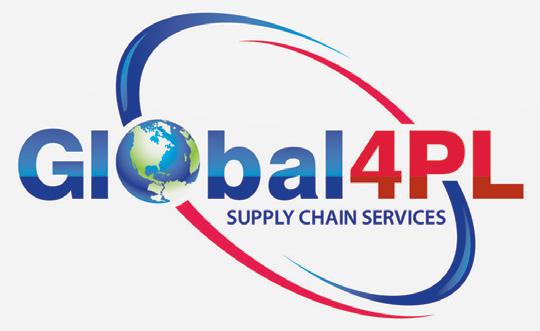












GLOBAL4PL: THE IMPORTEXPORTTRADE COMPLIANCEEFFICIENCY SUPPLY CHAIN EXPERTS – so you can grow globally Exporting is a great way to increase sales since the market overseas is larger than the U.S. market. At Global4PL, we do our best to help our customers grow globally. info@global-4pl.com www.global-4pl.com Extraordinary People. Extraordinary Stories. Subscribe Now hispanicexecutive.com/ subscribe Tell Us Your Story hispanicexecutive.com/ getfeatured
INSIG HTS
The philosophies of innovative leaders have the power to inspire and spark change. Read on for the thought-provoking insights of these successful executives.
132 Lorna Hagen, iHeartMedia 137 Mario Rivera, Depository Trust & Clearing Corporation 140 Carlos Medina, One Technologies 143 La Dell Diaz, ACI Worldwide 146 Roger Morales, KKR 148 Pablo Cella, Amdocs 150 Ramon Ceron, Atkore International Group 153 Hector Coronel, Panda Restaurant Group 157 Lew Chavez, Nexa 160 Andres Angelani, Cognizant Softvision 162 Andy Velez, Bank of America
Insights
The Voice You Can Trust
BY SARA DEETER
Lorna Hagen is as dedicated to the employees at iHeartMedia as the company is to its listeners—and that’s saying something
132 Insights
Hagen Chief People Officer iHeartMedia
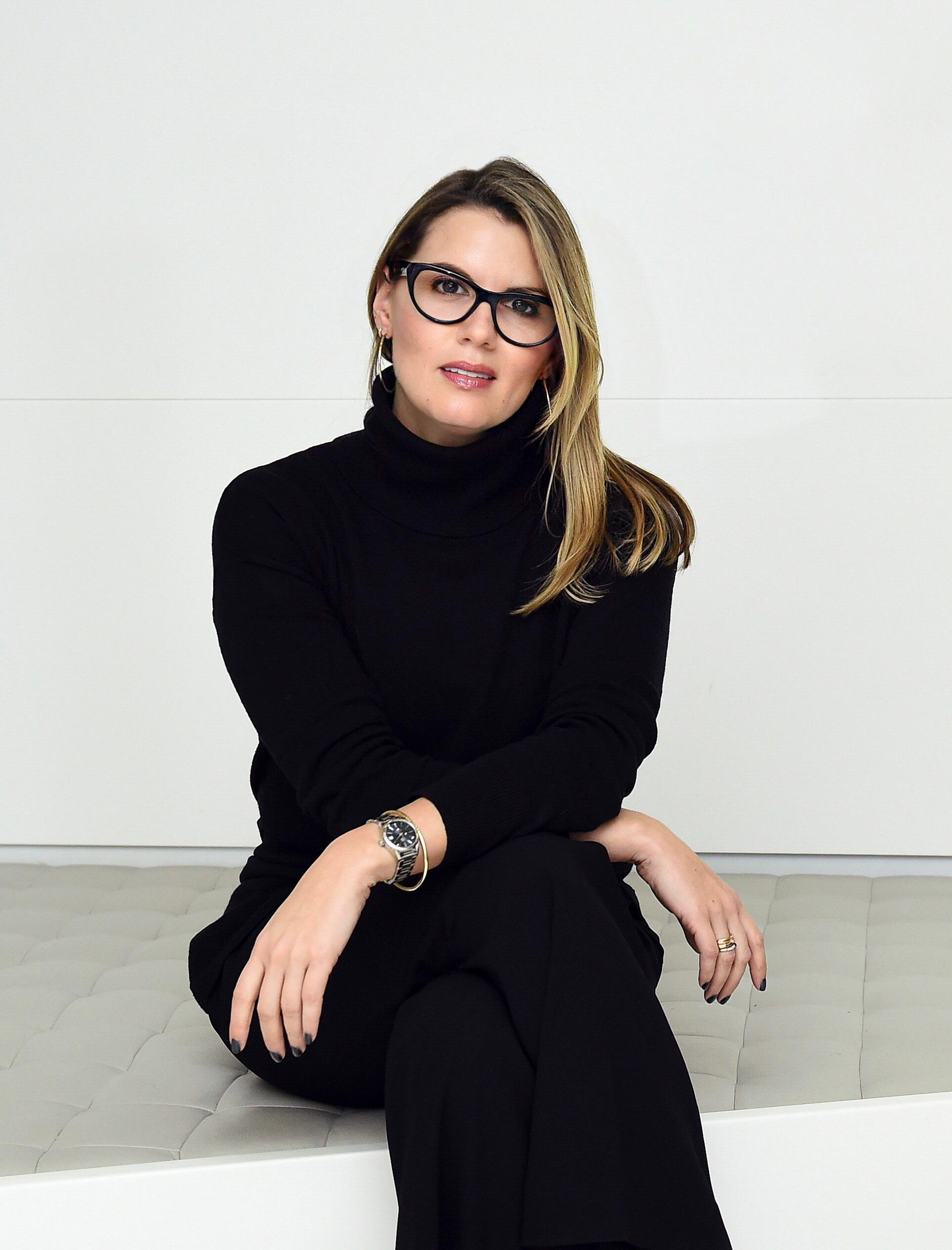
COURTESY OF IHEARTMEDIA 133 Hispanic Executive
Lorna
When Lorna Hagen speaks, you can’t help but listen.
Like the innumerable radio, television, and podcast hosts who work alongside her at iHeartMedia, a prominent media organization and the top audio company in the United States, the chief people officer radiates a sense of warmth that naturally draws people in. But of course, Hagen also couples that warmth with a talent for incisive leadership, a genuine passion for the world of audio content, and the type of forward-thinking mind-set that makes her an ideal match for an industry innovator like iHeartMedia.
An alumna of Cornell University, Hagen has spent nearly two decades exploring the HR space. From her first position as an associate at IMG and throughout her subsequent leadership roles at HarperCollins Publishers, Dow Jones, Ann Inc., OnDeck, and leading software company Namely, Hagen has cultivated a broad-ranging understanding of how to drive organizational success.
But in recent years, Hagen says, she has begun to reframe the way she thinks about her career trajectory. “All throughout my professional journey, I’ve thought about the same two questions,” she explains. “How do I constantly stay curious? And how do I figure out which are the right opportunities to say yes to, and which are the right opportunities to say no to?
“Now, those ideas are even more important to me than they were a few years ago,” Hagen continues. “And I’ve come to realize
that, ultimately, I’m looking for meaningful opportunities—opportunities where I can be a user, a consumer, and an advocate for all that the company does. And that’s really easy for me at iHeart.”
A “huge lover” of audio entertainment, Hagen turns on her radio to listen to the news or a podcast first thing every day. “I love podcasts like Noble Blood and Blood Ties,” she offers enthusiastically. “And I’ve found that I concentrate more fully when listening to nonfiction than when I read it. When I listen to audio books like Malcolm Gladwell’s Talking to Strangers, it’s a completely different experience.”
And since she came into the role of chief people officer in October 2019, Hagen’s passion for audio has only been . . . amplified.
“When I was first contacted about the position, I loved the idea of being able to experience what the company is putting out into the world. Not to mention that my teenagers are constantly listening to music, which makes me a very cool mom just by working here,” she says with a laugh. “But as I started to dig into the world of audio, I really began to appreciate what amazing platforms this company has to offer.”
According to Hagen, iHeart reaches over 90 percent of Americans every month. It has a larger audience with more streams and downloads than any other podcast platform; it is a partner to the reVolver podcast
THE NUMBERS BEHIND THE NUMBER ONE AUDIO COMPANY IN THE COUNTRY
9 out of 10 Americans reached every month
250 million monthly listeners in the United States
848 live broadcast stations
150 million+ podcasts downloaded every month
130 million+ registered iHeartRadio users
Source: iHeartMedia
134 Insights
network, the largest Hispanic podcast network in the world; and it is working with industry powerhouses like Shonda Rhimes to bring exciting new series to life.
All of which means, Hagen points out, that the company holds a unique place in the public’s consciousness.
“Audio’s reach is immense, and we have research showing that consumers believe it is more trustworthy than other platforms,” she says.
“As consumers, we are continually confronted with questions about what information we see in digital media is real and what isn’t. In our current cultural environment, it’s important to be at an organization where there is a high level of trust with our customers.”
Without that trust, Hagen notes, iHeart could not so effectively connect with its millions of listeners. “We want to be there for all of our listeners and be a friend to them anytime, anywhere,” she says.
And to Hagen’s mind, the company’s success in connecting with listeners, and in maintaining its position at the forefront of innovation, directly hinges on iHeart’s ability to drive those same ideas internally.
“We need to be as committed to being there for our employees as we are
for our listeners. We want our employees to feel a keen sense of belonging, to feel that they contribute every day in ways that are meaningful to the organization,” she says. “And just as the company is embracing technology and artificial intelligence, we need to keep the changing reality of how we do work at the top of our employees’ minds.”
Engagement comes when the company has a very strong sense of purpose that resonates with employees’ personal values, Hagen explains. It is what she thinks about every day in terms of the experience that she and her team are trying to create for people at iHeart, and it is already at the center of the company’s overall culture.
It is the other goal, Hagen says, that has occupied so much of her attention since she became chief people officer. Preparing for the future of work is a constant effort, she believes—it
135 Hispanic Executive Blaze your own trail at diversity.fidelitycareers.com EOE Being #DifferentTogether takes us further. Fidelity Investments Honors iHeartMedia Chief People Officer, Lorna Hagen.
MI
mi identidad:
“PUERTO RICAN AND/OR LATINA”
shaping the future
SPEAKING WITH ONE VOICE
Lorna Hagen loves John Leguizamo’s Latin History for Morons show (p.90) so much she’s seen it twice—and that’s just the Broadway version.
“The show is just so, so interesting,” Hagen enthuses. “It’s about the idea of tearing cultures apart, but it ultimately comes back to this concept of speaking with one voice.
“And that idea of inclusivity really resonated with me because that’s how you see real change in the corporate world,” she continues, “when you advocate for yourself as well as others, when you listen and are open to things you don’t know or understand. It’s not really about blurring the lines of identity but rather about celebrating those different identities.”
requires an organization to foster a culture of agility and adaptability, build company-wide tools for change management, and cultivate the mindsets and cultural fortitude necessary to embrace rather than resist change.
In less than a year, Hagen has already made significant headway on that front, introducing a change management training program that has helped more than two hundred leaders and managers across iHeart to “think about what’s coming next and to understand how everyone can get there together.”
“The world is moving faster than it ever has before,” Hagen says, “and organizations like iHeart are proactively building foundations of change management expertise to continue to evolve. Anyone who’s ever been a parent knows what change looks like and most accept it—if not there would be millions of sad parents out there because their children outgrew the sweet six-year-old age. We need to make our leaders understand that that type of evolution is also normal and needed at organizations. It’s just about honing that foundation and turning it into a conscious discipline.”
www.mercer.com
At Fidelity Investments, we embrace a culture of inclusion to unlock the magic of fresh perspectives, which fuels our innovation. By building a workforce with diverse backgrounds and perspectives, we better reflect the customers we work with and create deeper connections and better collaboration with them.
136 Insights
boldly
At Mercer, we’re redefining the world of work, reshaping retirement and investment outcomes, and unlocking real health and well-being.
Congratulations, Lorna! Mercer is excited to be a continued partner with Lorna to boldly shape the future!
From cofounding a Latino fraternity at Cornell to giving up-and-coming leaders a leg up at DTCC, Mario Rivera is bent on helping others
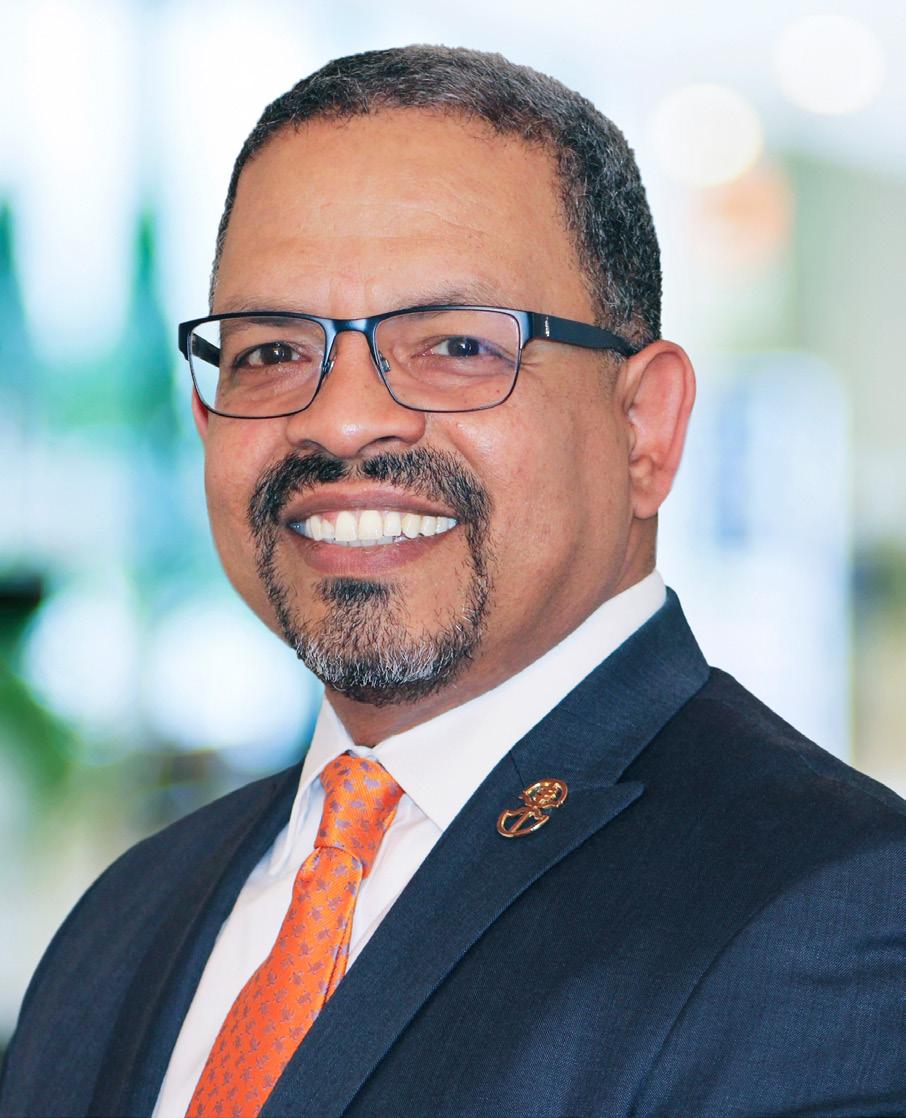
Focused on the Future
BY CORA BERG
IN HIS NEARLY TWENTY YEARS working at the Depository Trust & Clearing Corporation (DTCC), Mario Rivera has held a variety of positions. The financial services technology company encourages its staff to move around and seek other opportunities within the organization— and Rivera uses these role changes to support his own career growth as well as the development of future leadership. Whenever he shifts roles, he evaluates his direct reports, identifying team members who may eventually take his position. “We talk career goals,” he says, “and I train them into my role, sharing skills and developing strategy.”
Mario Rivera Executive Director of Enterprise Application Support Depository Trust & Clearing Corporation
Sometimes things come full circle. Rivera worked on the risk management team at DTCC for several years before transitioning to wealth management, and later to finance and HR support. In December 2019, Rivera returned to risk management when he took on the role of executive director of enterprise application support. He now manages a sixty-person risk and data services team that, he says, “supports the risk calculation systems for each
of DTCC’s clearing corporations. We are constantly recalculating risk for the US market.”
During his time in the risk department, he has run his own process to overhaul the team structure. Where, previously, the team was organized into subgroups based on technologies, Rivera has switched it up to create a more client-centered team focused on internal clients and their needs. “The business side should not have any concerns about tech,” he says. “Our work should enable the client to get their work done.”
One of his tactics has been to pair analytics team members with technology experts, making sure they understand each other’s needs while providing cross-training opportunities. It seems to be working: he reports feedback that the responsiveness from his team is up and coordination is getting even better.
Rivera also focuses on work methodology. A huge advocate for Agile methodologies, he has helped integrate the development approach throughout DTCC. “It’s client-focused,” he
137 Hispanic Executive GISELLE GONZÁLEZ RIVERA
explains, much like other transformations he has led. Rivera appreciates the decreased time-to-market that Agile’s clear prioritization structure encourages. The MVP (minimum viable product) principle means that clients get value sooner from the solution and can also provide feedback throughout a design process. “We use incremental delivery to get to the end state,” he says.
Rivera recalls a massive finance project, which involved eight different squads overhauling huge systems, where Agile transformed his work. Because of the need for input and opinions from many people, he says, “not much happened because everyone pulled in different directions.” Not much, except lots of meetings. Once they shifted tactics and the whole group focused on a single priority, the logjam broke and they could then take other needs into account.
Rivera helped put together DTCC’s first formal release of Agile in 2017. Unlike most organizations, he explains, “we are a highly regulated firm.” The result, he says, is that DTCC cannot simply build systems; they must also provide robust documentation.
Effecting change by facilitating groups of people is not new to Rivera. Raised by a
MI
mi identidad:
“I primarily refer to myself as Puerto Rican as well as Latino. I know in the US we also use Hispanic, which I use as well.”
mother who believed deeply in the importance of education—and who got her bachelor’s degree at night while working full-time and raising kids—Rivera says, “It was just understood that we would go to school and do well.” He studied engineering at Cornell University, where the Latinx population was only 4 percent. “We saw people not make it,” he recalls of his mostly first-generation cohort.
Driven partly by the low number of Latinx students, Rivera was one of the founding fathers of Cornell’s Latino fraternity Lambda Upsilon Lambda, thus creating a community to help others pool knowledge and experiences. “You need the smarts and the discipline,” Rivera says of making it at Cornell. “We wanted to share what we had learned. We wanted to help others succeed.
Having Latinos represent only 4 percent of the Cornell population didn’t seem right to us.”
Founded in 1982, the fraternity now has more than seventy chapters around the country and is still all about community, getting involved, and giving back, Rivera says. As an alumnus, he helped endow the Latino Living Center on Cornell’s campus. The experience showed him the long-term impact of the organization: “I cofounded it with people from a different generation,” he says.
In 2009, Rivera cofounded Unidos, DTCC’s Latinx employee resource group. It’s one of several employee resource groups at the company; diversity and inclusion is very important to the organization, he says. “It came from many places, including the idea that, from a business perspective, diverse workforces are—and have been proven to be—more successful,” Rivera explains. Unidos provides a networking space where members can meet people from across the company, demonstrate their talents, and be part of mentoring circles. Rivera spent four years building the group and, true to form, nurturing future leadership. “Now I’m just a member, passing the baton to new leaders,” he explains.
From his profession to his alma mater, the executive director provides encouragement, laying foundations that will bolster success. This extends to his own home as well. All of Rivera’s four children followed in his footsteps and attended Ivy League universities, one at Wharton/UPenn and three at Cornell. When one of his daughters discovered he had cofounded the endowment to support Cornell’s Latino Living Center, she told him, “Dad! That’s the meeting place for all of the Latinx organization on campus.” Life indeed had come full circle as he got to see how his efforts so many years ago affected the college experiences of his children.
138 Insights
“We wanted to share what we had learned. We wanted to help others succeed. Having Latinos represent only 4 percent of the Cornell population didn’t seem right to us.”

Carlos Medina on the experiences that molded him into a leader capable of supporting the growth and transformation of an organization like One Technologies
Embrace Change as One
BY SARA DEETER FOR THE PAST THREE DECADES, CARLOS
Medina has been living in a “crucible of experience.” As a leader at major corporations such as JCPenney, GE Capital, IBM, and Experian, Medina has played a key role in driving strategic growth and has proven himself to be an expert in organizational change.
Today, as senior vice president and head of strategic partnerships and business development at One Technologies, Medina leverages what he’s learned to help establish the company as a destination dedicated to its customers, business partners, and teams alike.
A University of South Florida graduate, Medina has continued to prioritize learning and development throughout his professional career, enrolling in change leadership programs as soon as he obtained his master’s degree.
“Delivering top-notch products and services to your customers hinges on your ability to grow as an organization and increase satisfaction for both your customers and your employees,” Medina explains. “Whether you’re working on a project that is supposed to drive tens of millions of dollars or landing large deals, it all comes down to how change
relates to three things: yourself, the people around you, and the organization as a whole.”
The first step is to embrace yourself as a change catalyst and change leader, Medina says. “You have to be the one who embraces change, the one who has the tools and skills necessary to adapt and be agile. And that takes a great deal of self-awareness,” he points out. “You have to be extremely cognizant of your strengths as well as your weaknesses.”
The second step toward effective change leadership is to promote your own ability to effect and manage change so that others have confidence that you can “walk the walk,” Medina notes. “But the third component, the organization, is what really moves the needle.
“Any change leader has to act in the context of the larger organizational culture,” he continues. “And that can be incredibly challenging—your organization may be global in nature or may need to support cultural assimilation of a company that was recently acquired.”
According to Medina, it is his focus on these three elements that has enabled him to create an impact at each and every organization he has worked at. And at each of those
140 Insights
Carlos Medina SVP, Head of Strategic Partnerships & Business Development One Technologies
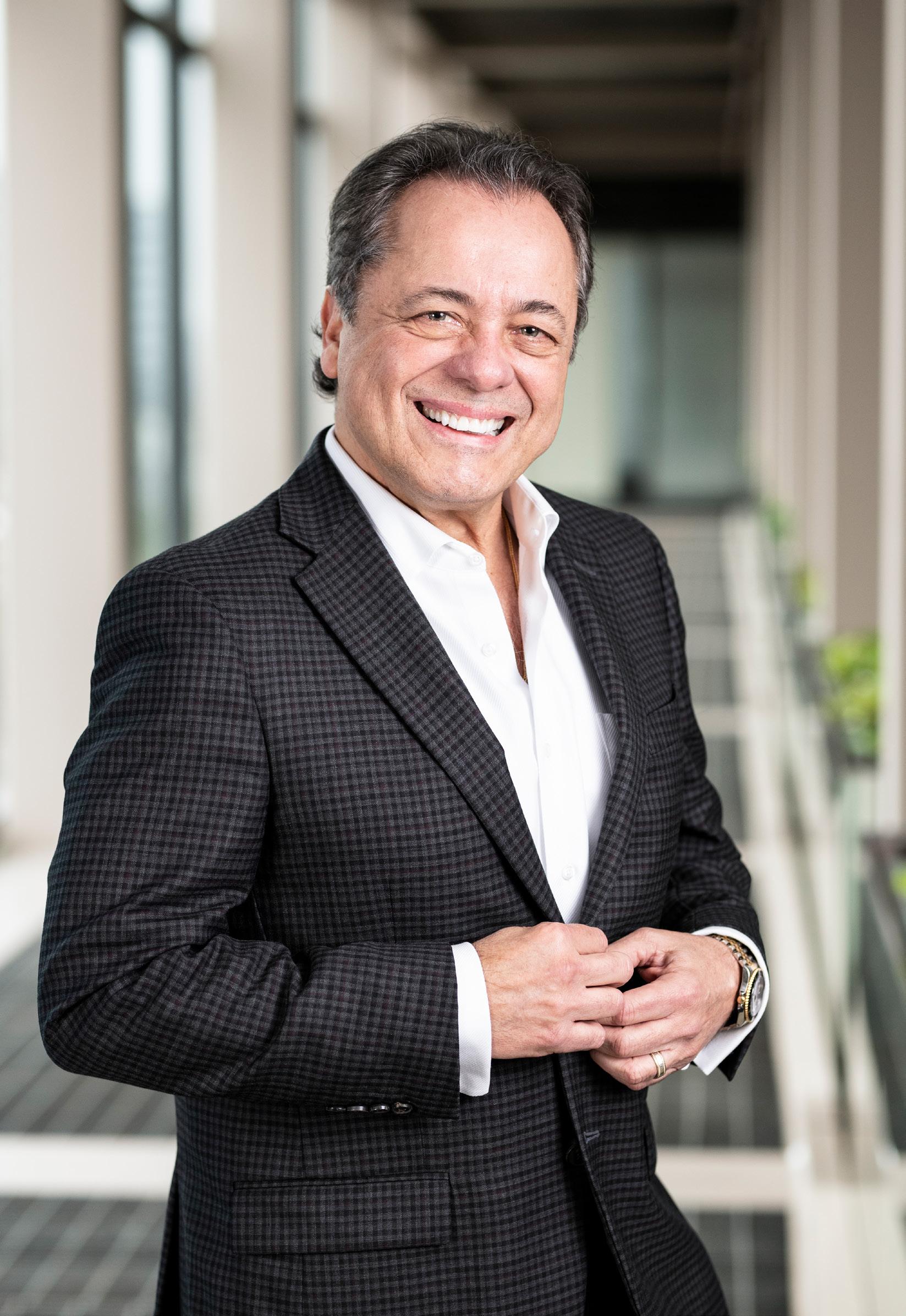
companies, he notes, he has met “fantastic” people working across an array of disciplines who have mentored and supported him in driving that impact.
“I think that speaks a bit to the Hispanic culture as a whole and how we thrive working together as a team—as a family,” Medina reflects. “That’s exactly how it is here at One Technologies. We are very process-focused, very centered on our customer and innovation, but at the same time, we are very much like a family in the way that we care for each
MI
mi identidad:
“I
other and recognize the value that each of us brings to the organization.”
Based in Dallas, One Technologies is known for providing innovative financial credit information, solutions, and products such as credit monitoring and protection services, Medina explains.
As SVP, Medina’s aim is to “drive growth through a customer-centric focus and a myriad of opportunities to align with our company vision and to develop strategic partnerships that align with what we want to deliver to our customers. It’s a lot of orchestration—a lot of herding cats,” he says with a laugh.
But no matter how large or chaotic that herd is, Medina stays committed to the three key areas of change leadership: yourself, your teams, and the organization. As a team leader, he always has his “ear to the ground, a finger on the pulse of both the marketplace and the consumer base” in order to ensure that he and his team are able to stay on top of any new developments. He works every day to strengthen his team, to model the adaptability required to launch new products, and to be an example of the self-awareness needed for true collaboration.
DAVID LOI / DEEP ELLUM MEDIA
am half Spaniard—born in Málaga, Spain, to a Spaniard father and Colombian mother. It’s more like Ibero-Latino. Ibero from the Iberian Peninsula.”
But it is the culture at One Technologies, Medina says, that has truly made it a leader in this industry.
“Culture brings value to an organization, and we firmly believe in our values at One Technologies. It’s a key reason we have been named Texas Employer of the Year for six years running,” Medina asserts. “We’re proud of how we put our culture front and center—that culture is very entrepreneurial, and very focused on the customer, but at the end of the day, everything that we do is about our customer and our people.
“Every single member of my group, as well as the executive leadership team, is focused on driving both the customer agenda and the people development agenda,” the SVP continues. “Developing future leaders is primordial; it’s key. Everyone in our office, no matter their role, is enrolled in a strengths-based leadership program and in personal development focused on our company values.”
When you put all those pieces together—leadership development, change leadership, organizational culture, team coordination—that’s when you really see an organization thrive, Medina says. Indeed, that is how One Technologies has built a reputation for cultivating strong, long-lasting relationships while “flawlessly executing” some of the best products and services in the market.
“There are so many other products out there that don’t even come close to ours in terms of the informational and educational value we bring to our customers including among others, monitoring, and identity protection services,” Medina says. “We want to educate consumers so that they can manage their future financial wellness, to provide them with the tools and knowledge they need to figure out how to buy a house, afford a more reliable vehicle, or put their kids through college.
“And when I look at Latino communities and the people who are trying so hard live the American dream and obtain those things for themselves and for their families,” the SVP adds, “I know that we are doing our part to help them. Furthermore, and considering our current global health and required virtual environment, it is also this sense of family that keeps us united with a great sense of pride as we continue forging ahead as a team.”

142 Insights To learn more, call us at (844) 899-5653 or email salestui@transunion.com Turn consumers into customers Turn transactions into recurring revenue Turn to TransUnion® Gain a meaningful advantage in the consumer marketplace with TransUnion – attract more prospects, engage customers like never before, drive loyalty, and earn a greater share of wallet.
digital experiences
personalized. TransUnion
for consumers,
lives better,
brand loyalty,
Consumers expect
that are smooth, safe, and
helps businesses deliver
making their
building
and gaining a competitive edge. Because our mission is to help consumers and organizations transact with confidence and achieve their goals. We call this Information for Good™.
“And when I look at Latino communities and the people who are trying so hard live the American dream . . . I know that we are doing our part to help them.”
How Y2K (Indirectly) Brought La Dell Diaz to ACI
BY CLINT WORTHINGTON
LA DELL DIAZ HAS BEEN WITH ACI Worldwide for twenty years—and her path to the company began, oddly enough, with Y2K. Her first major position as a contract attorney was with regional Bell operating company US West, where she was part of a team of lawyers hired in the pre-Y2K panic. “We dug into jillions of contracts, talked to engineers and network operators and all that kind of stuff,” Diaz explains. “And then Y2K comes and it’s just . . . New Year’s Day. No big deal.”
There was a tiny twinge of regret that all their hard work was for nothing, she admits, but “everybody was happy that they now have contracts that meet their needs,” she says. “And oh, by the way, it’s not the Stone Age.”
After the new year, her employer gave Diaz three months of pay to keep her on the books and find a new job, which she did: she was hired as an associate counsel with ACI Worldwide, which develops electronic payment systems software. Twenty years and several promotions later, she’s senior vice president of legal.
Two decades is a long time to survive and thrive in the tech industry, and Diaz credits ACI’s emphasis on knowledge, experience, and expertise with its ability to stay relevant in the ever-changing market. When she joined in 2000, there were just over a thousand employees globally, with a $300 to $400 million market cap. Now, ACI has more than four thousand employees with a $5 billion-plus market cap and serves more than five thousand customers around the globe.
143 Hispanic Executive
Over the last twenty years, Diaz has seen a lot of changes in technology—and she’s helped ACI Worldwide keep up with all of them
La Dell Diaz SVP of Legal ACI Worldwide
over the next five years while the company tripled in size.
One of Diaz’s major roles is facilitating communication: she not only manages her team of twenty-seven attorneys and contract administrators, who are spread out in offices across the world, but also interfaces with virtually every other department at ACI, from sales to finance and tax to product development and engineering, to make sure agreements are aligned with the company’s professional strategy.
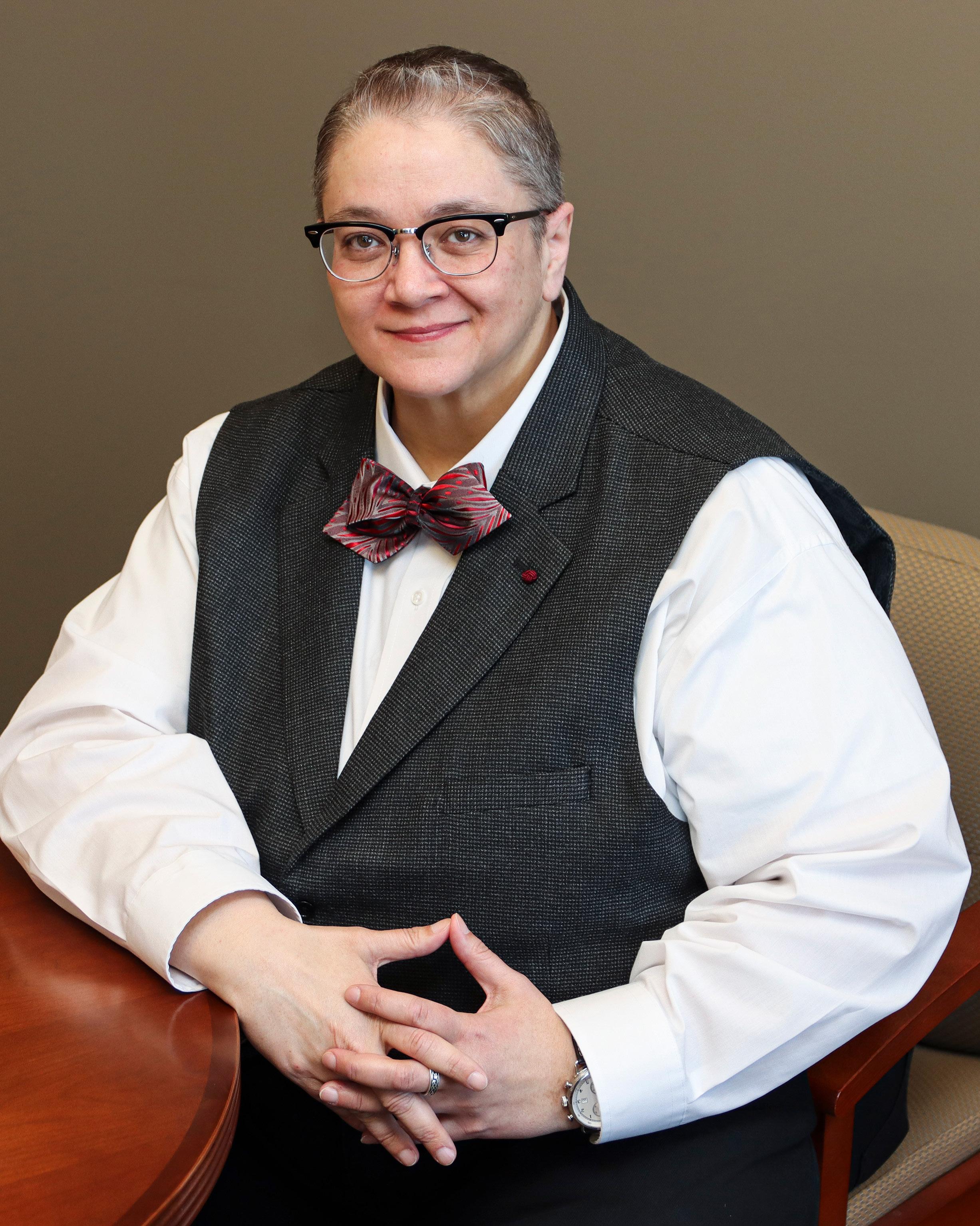
An ongoing initiative that Diaz considers especially vital to the company is creating a safe and compliant method of using third-party software in ACI’s own proprietary work. Much of this involves making frequent use of open-source code, which is free, rather than commercial software that would cost money. There are challenges to those savings, Diaz warns: “When a publicly traded multinational corporation uses a third party’s work in their software, you have to do what’s right.” To that end, Diaz’s team works diligently to maintain compliance with license restrictions for this open-source code.
Diaz is also part of the crossfunctional team for ACI’s transition to cloud-based services, which is now a major part of their business. “I am really, really proud that I was on the ground floor of helping this organization grow into its next phase of technology deployment,” she says.
“We’re in every inhabited continent on the earth, and it’s incredible,” she says. That growth tracks neatly with Diaz’s own progress through the company. For the first three years, she was an associate counsel (“basically a staff attorney,” she notes), handling one or two products at a time. But after
gaining a reputation for efficiency and responsiveness, she was promoted to counsel, then to senior counsel two years later, managing contract activity for nearly the entire western hemisphere and all their product lines. As ACI grew more acquisition-minded, she was promoted three separate times
Along the way, Diaz has learned a lot of lessons about the tech industry and ACI as a company. Chief among them is the need to be well-rounded as a lawyer from a business perspective. “Regardless of the law you want to practice, the smartest thing to do is add an element of business education,”
SCOTT KRUSEMARK
“Sometimes your client is best served when you advocate for the client, instead of fighting against an opponent.”
mi identidad: MI
she notes. “Two things will always be necessary: lawyers and business people. If you can do both, you are set.”

It’s also important, she says, to refine your understanding of the attorney/client relationship. “Sometimes your client is best served when you advocate for the client, instead of fighting against an opponent,” Diaz says. Determine your client’s goals and motivations, and why they need your services, and you’ll be a better representative for them.
Key to that understanding of your client is transparent communication, which Diaz touts as one of the most important lessons a corporate lawyer can learn. “One of the hardest things to learn as a young attorney is admitting that you don’t know something,” she says. “You have to know yourself well enough to admit that ‘I don’t know this thing, but I can find out the answer.’”
Over the course of her years at ACI Worldwide, Diaz has found herself growing and changing as an in-house lawyer, and she hopes to continue that growth in the future. After all, it’s how she not only stays relevant in a fast-changing industry, but also helps her company do the same. Part of her mission, she says, includes keeping employee morale high. “We’ve done a good job of nurturing our people and have hung onto them a lot longer than most, it seems,” she says. That means trust, communication, and expertise win the day at ACI.
145 Gesmer Updegrove congratulates a true trailblazer, LaDell Díaz, on her welldeserved recognition. We are proud to work with LaDell to protect ACI Worldwide in and out of the courtroom. 40 Broad St., Boston, MA 02109 • (617) 350-6800 • Gesmer.com
“If I refer to my ethnicity (a rarity for me in the work context), I use Latina.”
“The Winds Change”
BY BILLY YOST
IT’S ONE OF ROGER MORALES’S FINAL REMARKS during his interview, but it’s perhaps the most important: “I had a very singular mission for most of my career. I got up every day with the mind-set of determination to keep moving forward and not allowing setbacks to get the better of me. When you’re on Wall Street, this is absolutely something that happens. Rising in leadership and working with people who became very successful on their own, I learned an important lesson—that nobody wants to talk to a hard-charging person who forgets to say thank you.”
Now a partner at KKR in the firm’s real estate business, Morales says that thinking about how his parents struggled after fleeing Cuba, working whatever job they could find, always fuels his fire. And though his father did eventually build a thriving career at General Mills, Morales describes him as “a very intense person.” To counter that, Morales notes, “I’ve had to learn to breathe a little and just look around.”
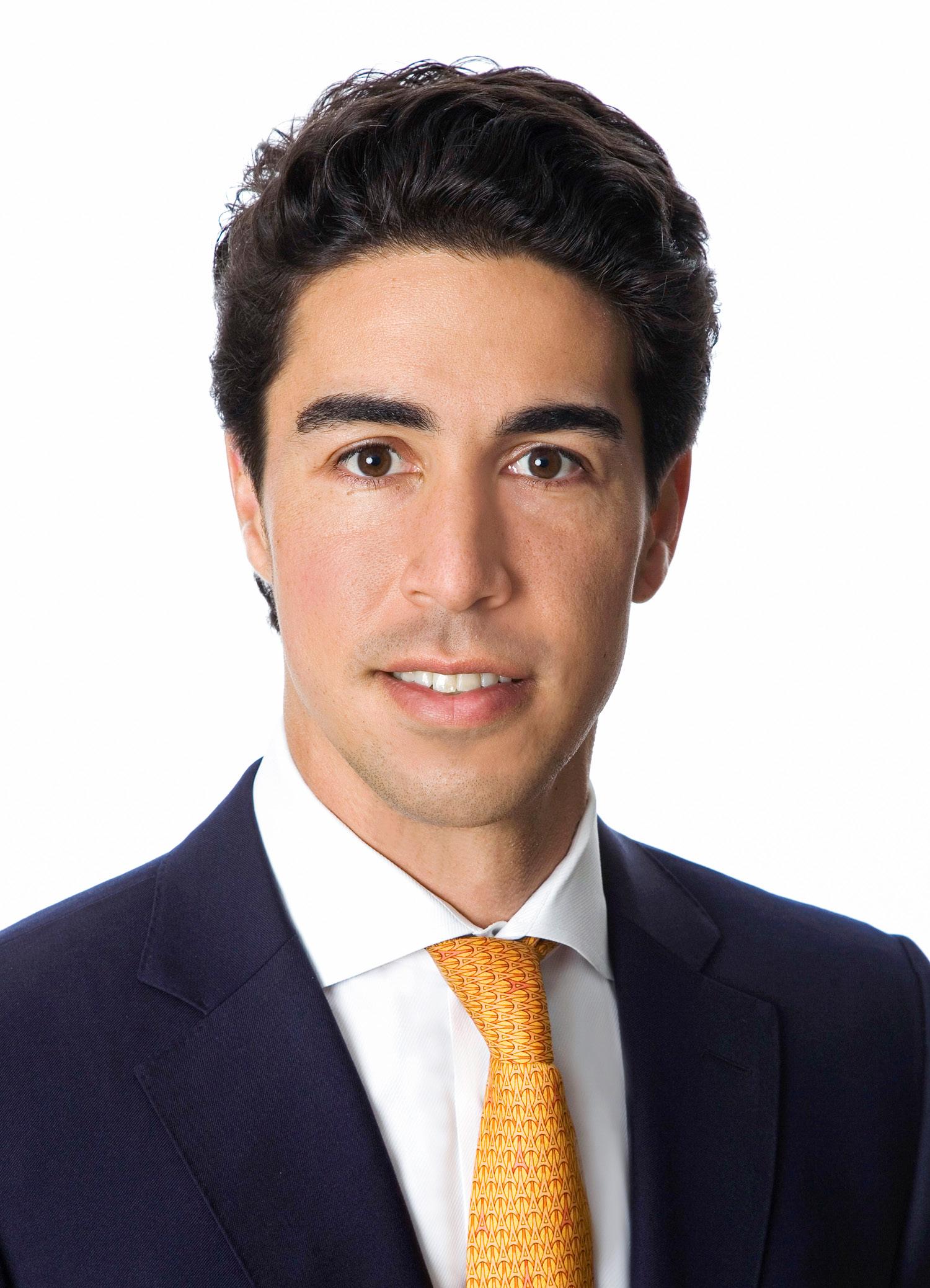
He should be happy with what he sees. Both a husband and father himself, Morales was selected as a founding team member of KKR’s real estate platform in 2011, and since then, he’s served as head of commercial real estate acquisitions for the Americas. He also sits on KKR’s real estate equity and credit investment committees as well as the equity portfolio management committee for the Americas.
EVOLVING THE PLAYBOOK
Morales’s evolution over the years provides a good model for those hopeful of following a similar trajectory—but he admits to being reticent when it comes to doling out
Roger Morales Partner, Real Estate KKR
146 Insights COURTESY OF KKR
Over the course of his career, KKR’s Roger Morales has evolved his mental approach as a means of better realizing his full potential as a leader
advice. “As a Hispanic person, I always ran the ‘work smart, work hard’ playbook, and I think that worked very well for me for a very long time,” he explains. “I got up from failures and just continued to work hard with the aid of health, family, and friends.”
But what happens when the effort pays off?
“I found that once you reach some measure of seniority, that same mentality can lead to you being perceived as someone who doesn’t want to be part of a broader entity,” Morales says. “You can’t continue running that same, hardcharging playbook that can be perceived as individual-centric. The winds change.”
It was the old maxim of “what got you here won’t keep you here,” which rang doubly true for Morales, who was willing to eat, sleep, and breathe real estate—not because it was a career but because it was his passion. (When asked about his hobbies, Morales answers first with “real estate investing.”)
“As you become more senior and your responsibilities change, your approach also requires retooling, rethinking, and innovating,” Morales says. “In my case, that required a little bit of softening. I needed to become more conscious of being a multidimensional leader and how my actions or perceived actions could impact an organization.”
RISK, REWARD, AND THAT MOMENT TO BREATHE
KKR, Morales says, has provided the optimal environment for that leadership evolution. “I got a once-in-a-lifetime opportunity to get into an organization like KKR and help build out a business that was initially incubated in 2011,” Morales says. “It’s now a very formidable, competitive entity in the real estate
private equity space. That business-building has made the job even more interesting than a traditional investment job.”
The business mentality at KKR is also one that meshes well with Morales’s style. “KKR has an incredible culture of entrepreneurship and being open to new opportunities,” Morales asserts. “I’ve worked at other investment organizations where the bias is to figure out what is wrong with an investment versus what’s right or can go really well. But our founders have so much career investing experience and have really seen it all. At KKR we leverage our platform and our contacts to take smart risks, not shun them.”
But Morales has found even more in KKR than a business model he can believe in—at long last, he has found a place where he can learn to breathe. “The quality of people we have here is what allows me to relax a little bit,” Morales notes. “There is a team mentality here, and a culture that was created from the ground up. I believe what’s being done here can be doubled and tripled and quadrupled in both size and relevance in the markets.”
Even though Morales is able to breathe, he’s still contemplating the massive expansion he feels is possible at KKR. He admits that while it’s tough for his mind to settle down, his wife is the one able to keep him grounded.
“I know how cliché it sounds, but I have an incredible wife. She understands the demands of this job, and we have such open and honest communication,” he says. It’s in those small moments that Morales’s ability to take a moment to appreciate all he’s earned shines, and it’s why he continues to grow into new and challenging roles—those winds of change notwithstanding.
OPPORTUNITY AHEAD
Roger Morales has made waves at KKR, but he credits nonprofit Sponsors for Educational Opportunity (SEO) with helping him find the water. SEO helped Morales get an interview for an internship at Salomon Brothers in 1999, and since then, he’s done his fair share to help the organization continue to find positions for young, motivated people from underserved communities.
“It’s an organization that gave back to me even after the internship, and as time has gone on, I’ve tried to be as involved as I can,” says Morales, who is a contributing donor to the SEO Scholars program. “I will participate to the extent that I’m able to, forever.”
147 Hispanic Executive
mi identidad: MI “HISPANIC/LATINO”
Pablo Cella strives to help young professionals in Latin America get a better view of their dreams
A Clear Line of Sight
BY BILLY YOST
PABLO CELLA RECENTLY REACHED OUT TO HIS alma mater, the Universidad Nacional del Sur in Bahía Blanca, Argentina, because he hopes to offer graduates a more informed perspective than his class had. “Growing up and attending college in a small town, we were not in a place where we had any international exposure,” Cella explains. “We were one of the first groups studying computer science there and had no idea where our studies would take us. We thought we’d wind up teachers or in research; going to a new place or leaving the country wasn’t something we could understand, because we couldn’t see the potential beyond our walls.”
Cella wants to lead a series of webinars for undergraduates at his alma mater so that he can implore them to dream big and connect them with people who can help them achieve success. “I want them to know I am here to connect with and mentor them,” he says. “This dream has happened for me and for people I know, so why not them?”
Cella has spent the last fifteen years rising through the ranks at telecommunications and software company Amdocs to become regional vice president and customer business executive. Even before that, the Argentinian’s journey was impressive: his résumé includes worldwide consulting work and executive account management positions for various organizations, like AT&T, Telstra in Australia, América Móvil group, and most recently Comcast. Recently, he was listed as one of the Top 100 Influential and Notable Hispanic Executives in the USA in 2020 by the Hispanic Information Technology Executive Council (HITEC).
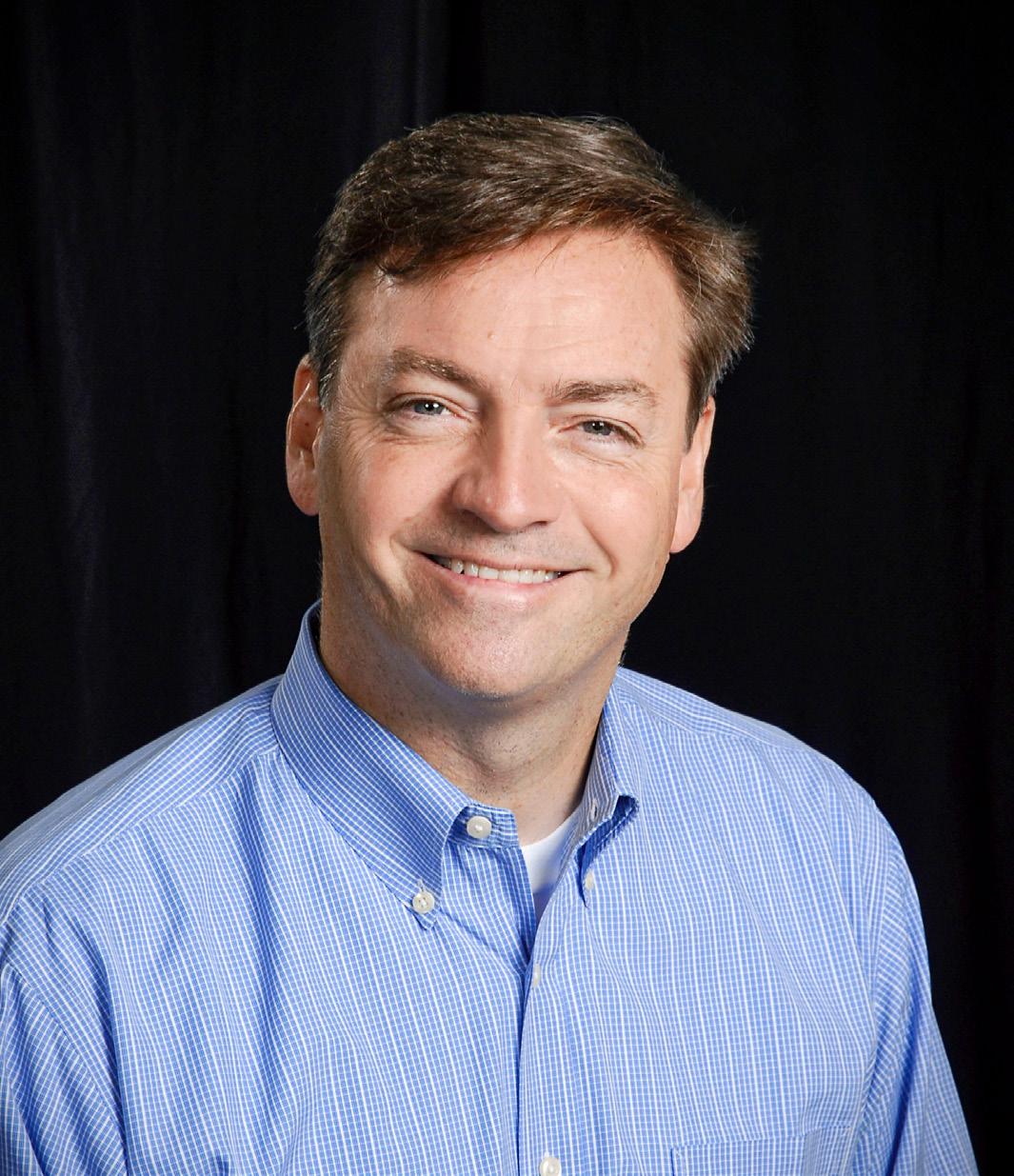
COMMITMENT TO INNOVATION
Pablo Cella Regional VP, Customer Business Executive Amdocs
Cella says that remaining at Amdocs for so long has been one of the easiest decisions of his career. The company that originally made its name from producing the yellow pages has consistently stayed ahead of the market through wise acquisitions and smart expansion with calculated risk. “We
148 Insights COURTESY OF AMDOCS
always seem to continue to expand ahead of the saturation of the market,” Cella says. “We pioneer in areas that are critical to the telecommunications and media industry. As we deal with this new age of managing pandemics and natural disasters, our role to provide seamless communications is of the utmost importance.”
That innovation continues to this day: Cella says the company’s embrace of the future of 5G puts it well on its way to carving out essential real estate in the space. “From monetization to user experience, we’re deeply invested in connecting people—improving every customer interaction harnessing 5G media and Cloud—in ways that we think will provide value and enjoyment to our customers,” Cella says. “Amdocs continues to buy the right assets at the right time, and it keeps me excited about where we’ll head next.”
PLAYING TO STRENGTHS
As Cella was promoted into leadership positions over the course of his career, he says, it’s been crucial for him to better understand his management style and identify areas where he needs to improve. “I think a lot of the time, you are who you are, and as long as you understand your strengths and your weaknesses, you can rely on a team to bolster you where you need it and rely on your strengths,” he says. But Cella isn’t stuck in his ways—just the opposite, in fact.
“I was often called an emotional and passionate leader who tried to motivate people to get the best out of them, but I learned over time that everyone isn’t motivated by the same things,” Cella explains. “I learned to be more consistent and operational over time. For five or six years, I knew a fraction of what I know today, and I’ll look back and think the same thing five years from now.”

As a leader, Cella is now intent on helping those who might not otherwise know they have a chance to live their dreams. “I’ve found that there is a large gap between young professionals in Latin America and those young professionals in the US, from exposure to internships to scholarships and job fairs. There are a million opportunities (and dreams) that can be applicable anywhere, but they are not always in sight,” Cella says. “As a result, we don’t have as much talent in Latin America thinking about working at the next big start-up company or getting a master’s degree.”
Cella credits the Hispanic Information Technology Executive Council with giving him a platform to reach more Latin American talent. And he’s focused on doing more to help companies abroad tap into the talent he knows is there.
mi identidad: MI
“I embrace and identify with being Latino—technically, I am a blend of Spanish, Italian, and French, with 8 percent native aboriginal descent. I am very proud to be South American with a Latino upbringing and heritage.”

turn technology into revenue Capture every revenue opportunity Start now and download this eBook https://bit.ly/3btkkE5
Ramon Ceron pivoted his career focus toward landing a position as treasurer. At Atkore International, he’s making the most of that role.
A Calculated Risk
BY CORA BERG
RAMON CERON ARRANGES HIS CALENDAR AROUND prioritization of financial risks. While the risk management focus varies, monitoring Atkore International’s financial health is a constant for the vice president and treasurer. Ceron explains that his job is, essentially, to ensure his company remains on strong financial footing at all times. “No surprises,” he says. “Foresee factors and situations that could derail the company’s plans or constrain strategic or operational initiatives. It is critical to both communicate and act on anything that might be a hindrance to the success of the company.”
Atkore, a manufacturer of electrical raceway products, is in the process of expansion and needs Ceron to make sure the road is clear. When pressed, he rattles off a long list of risks under his purview, including capital structure, financing, global cash and liquidity, property and casualty insurance, interest rate risk, foreign exchange risk, and management of pension assets and liabilities. They’re all things that could easily block or slow expansion if not monitored and managed effectively.
Ceron’s career path has been intentional, bringing him to a place where he’s prepared to assess risk and proactively recommend courses of action to ensure the short- and long-term financial stability of Atkore. It began with engineering degrees from the University of
Michigan–Ann Arbor and University of Wisconsin–Madison. After completing his master’s degree, he took a job with AT&T, and as the company began to split, he found himself more interested in business dynamics than the “manufacturing processes” that he worked on. After getting his MBA from the University of Chicago Booth School of Business, he decided that corporate treasury was the preferred path. From there, he followed the same advice that he often shares with others: “Have a plan. Be efficient with your time. Be patient but not complacent. And take risks.” As someone well versed in risk management, the risks he takes are calculated ones.
Though he no longer works as an engineer, Ceron still thinks like one. He recognized that treasury would allow him to engage in strategic and analytic work, which would be a better fit for him than other areas of finance. Ceron isn’t interested in selling anything, so banking and consulting didn’t make sense. And to go into private equity or asset management, as he says, “Historically, you needed to know people. With my Hispanic background, I was not familiar with the connection-laden world of finance.” In a treasurer role he is effectively the client: “I am most comfortable as the buyer. Analytically evaluating the financial and strategic merit of any service or product for the company is a core competency.”
150 Insights
One unusual challenge is a lack of available positions. “There is only one treasurer in a company,” Ceron points out. So he took opportunities to acquire experience in the facets of treasury because, as he puts it, “learning, coupled with broad experiences across the breadth of subsectors within treasury, is critical to positioning yourself for treasury leadership.” Finally, having spent a great deal of time as a “treasurer in waiting” at a previous company, he took a risk with a Midwest company in the midst of a turnaround and moved his family from Connecticut to Ohio. Eighteen months in, the company was acquired, and Ceron accepted a role at Atkore International in Chicago. While the job means a serious commute between Cincinnati and Chicago, he says, “Great opportunities in great companies are hard to find, and this has been a smooth and rewarding transition into a company with healthy growth.”
Atkore is a smaller company than he has worked at before, but smallness has its benefits. Ceron finds himself rolling up his sleeves and getting into all aspects of the work—something he embraces as a learning opportunity. “The key is to prioritize financial risks and focus on things that are most impactful,” he says. To achieve this, Ceron takes his leadership and managerial roles seriously. Managing a young team requires an emphasis on soft skills and teamwork, which he believes are critical to supporting and growing talent.
Recent years have brought about significant change at Atkore. In 2016, Atkore went public. Up to that point, the company went through a series of acquisitions
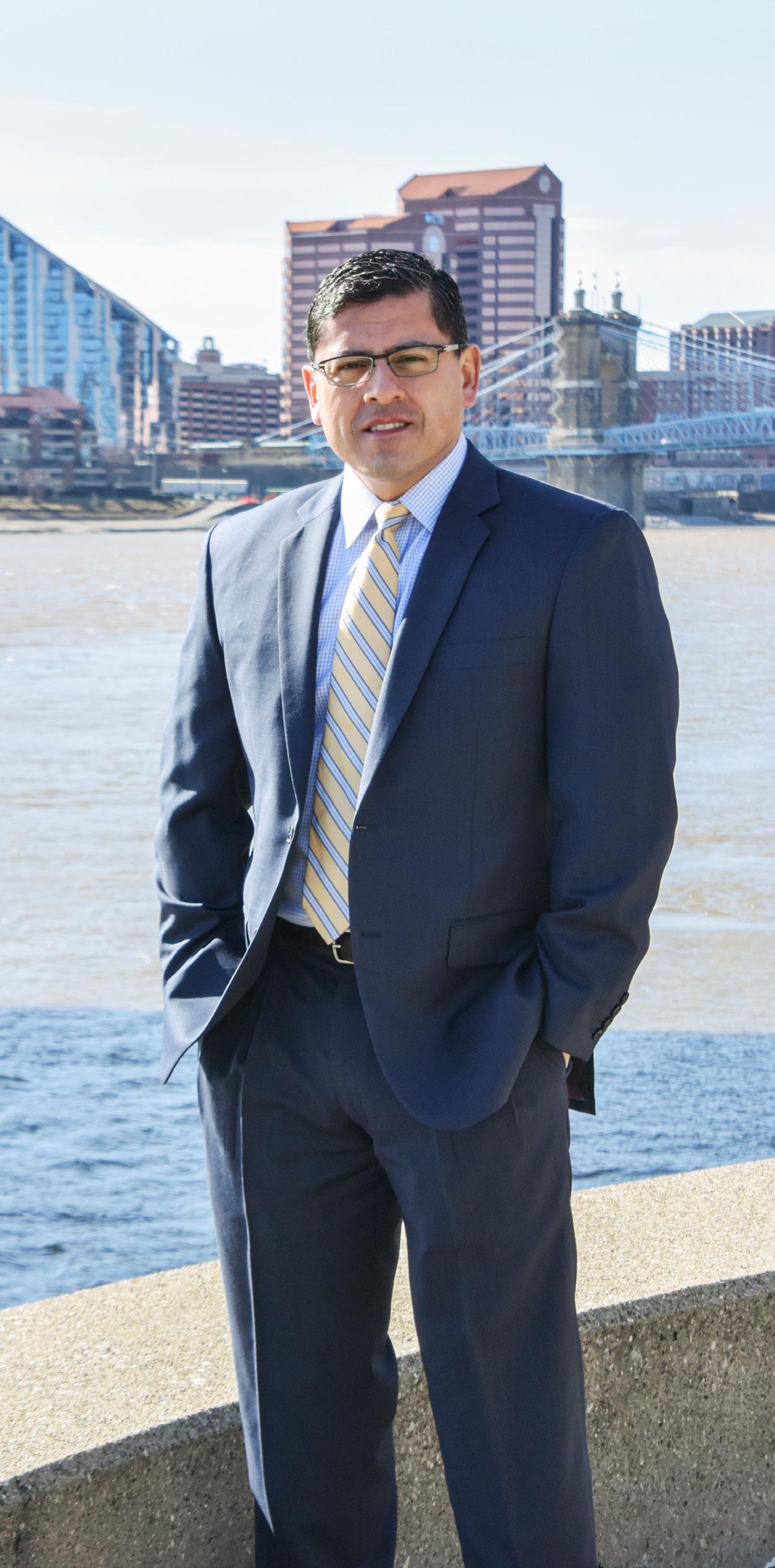
151 Hispanic Executive
Ramon Ceron VP and Treasurer Atkore International Group
“Be efficient with your time. Be patient but not complacent. And take risks.”
LEESA PRUETT CERON
mi identidad: MI
“With regard to the concept of Latino identity, I generally don’t use any labels, nor have had a need. That said, if the need arose, I would only use South American.”
Tomorrow’s Results Require Commitment Today
Aon applauds Ramon Ceron for his dedication, leadership and extraordinary contributions to Atkore International and impact on the community. Your recognition is well deserved and you are an inspiration to us; we are honored to call you a partner and friend.
aon.com
and divestitures, with a focus on building a lean organization. Following the public offering, it was quick to establish independence from private equity and set in place a number of leadership changes. The company also sought new talent.
“We are part of a new team that is focused on Atkore’s next phase of growth and success,” Ceron says. “Right now, everyone is single-minded on that goal.” The strategy seems to be paying off—Atkore’s stock price has doubled in the thirteen months since he arrived. The company currently manufactures and supplies steel and PVC conduit—everything needed to deploy, isolate, and protect a structure’s electrical circuitry from source to outlet—but Ceron says growth may come from a broader portfolio of electrical products. With strong free cash flow, the company has been able to bolt on smaller businesses as part of their M&A strategy. Atkore is on the move, fortifying its balance sheet and expanding in key strategic areas.
Ceron is determined to help Atkore grow at a prudent pace. He works diligently with key internal and external stakeholders. Much of his work revolves around banks, rating agencies, insurance brokers and carriers, investment advisors, actuaries, and attorneys. “My time is spent keeping balls in the air—many of them related to outside parties with whom we collaborate,” he says.
Ceron also finds the intimacy of a small company rewarding. He runs a fairly autonomous department, he explains, yet appreciates the collaboration and sharing across areas. “You get to be a leader and yet be fully connected to the rest of the organization,” he says. Just like his chosen profession, this means a lot of risk and, so far, a lot of reward. As Ceron looks back, he also looks forward and says, “It hasn’t been easy. Nothing worth pursuing ever is. I relish the challenges that are forthcoming.”
152 Insights
11566 13 ad for Hispanic Executive Magazine v1.indd 1 2/19/20 1:09 PM
Dream Big
and Feel at Home
In Panda Restaurant Group, Hector Coronel discovered a family-owned business that practices what it preaches
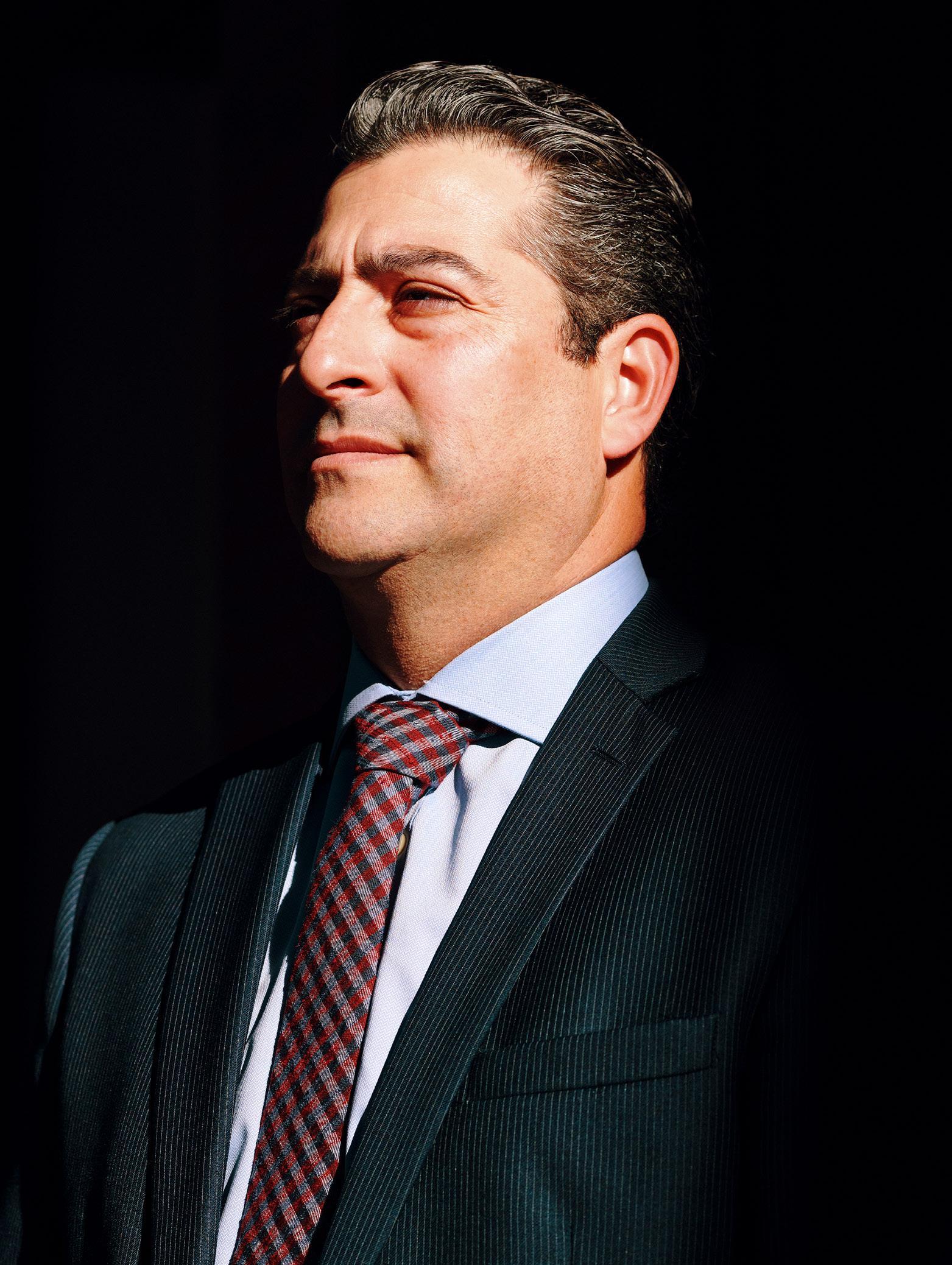 BY CORA BERG
PORTRAITS BY MATHEW SCOTT
BY CORA BERG
PORTRAITS BY MATHEW SCOTT
153 Hispanic Executive
ABUNDANCE MENTALITY. AS EXECUTIVE director of business development and asset management for Panda Restaurant Group, Hector Coronel prescribes to that mind-set saying, “This is not about scarcity. Panda is a growth business, looking for opportunities to grow the brand.”
Coronel remembers once worrying about a Chinese food restaurant opening next to a Panda store. Leadership, though, had a different response to the competition. Because Panda was looking to grow the American Chinese food market, more restaurants meant more consumer interest. Today, Coronel happily embraces the concept that, not only is there enough for everyone but it’s always better when there is more.
Coronel has the formidable job of managing Panda’s real estate, which is ruled by more than two thousand locations. That job includes overseeing new unit growth in nontraditional spaces like universities and airports, as well as the asset management for all other properties. Staying in tune with leases, negotiations, and long-term planning requires a close connection with every department in the company, as well as local operators. On the collaboration that drives his work, he says, “This is a peopledevelopment company. People come first.”
For his team, Coronel clears a path and facilitates work. “I lead by giving ownership,” he explains. “The goal is to not lose any stores—it’s to keep growing. And the larger goal is to make sure the team grows professionally and personally within Panda. I have to empower decision-making.”
“It’s different when you think of the project as your own,” he says. Together, he and his team seek successes for individual restaurants—and they let it get personal. “Turning off the lights and closing a store is
too easy,” Coronel says. Instead, he believes finding creative solutions that foster growth (and maintain employees) can and should be the real challenge.
Response to the first several weeks of the COVID-19 crisis exemplified Coronel’s commitment to Panda’s guideposts of hard work, humility, and diversity. As he explains, the initial triage team quickly understood that to be proactive, it needed as much knowledge as possible. Leaning on his collaborative skills, he says, “There is no playbook for this. But that is like asset management. You have to deputize people and then . . . go!” Along with scheduling daily cross-company staff meetings, Coronel paired teams with local stores to provide guidance and carry forth the people-first message.
“What a privilege it is to be making decisions at a place where diversity of opinion is encouraged in order to get to the best possible outcome,” Coronel says. That type of gratitude for Panda is what’s kept him with the company for sixteen years.
Born in Los Angeles’s Lincoln Heights, Coronel left at eleven years old after his parents decided to head back to Mexico and their native Jalpa, Zacatecas. Suddenly, Coronel found himself on a farm feeding pigs. Now, he reminisces about the experience, but back then he only wanted to return to the States. “Returning to their homeland,
154 Insights
“What a privilege it is to be making decisions at a place where diversity of opinion is encouraged in order to get to the best possible outcome.”
Hector Coronel Executive Director, Business Development & Asset Management
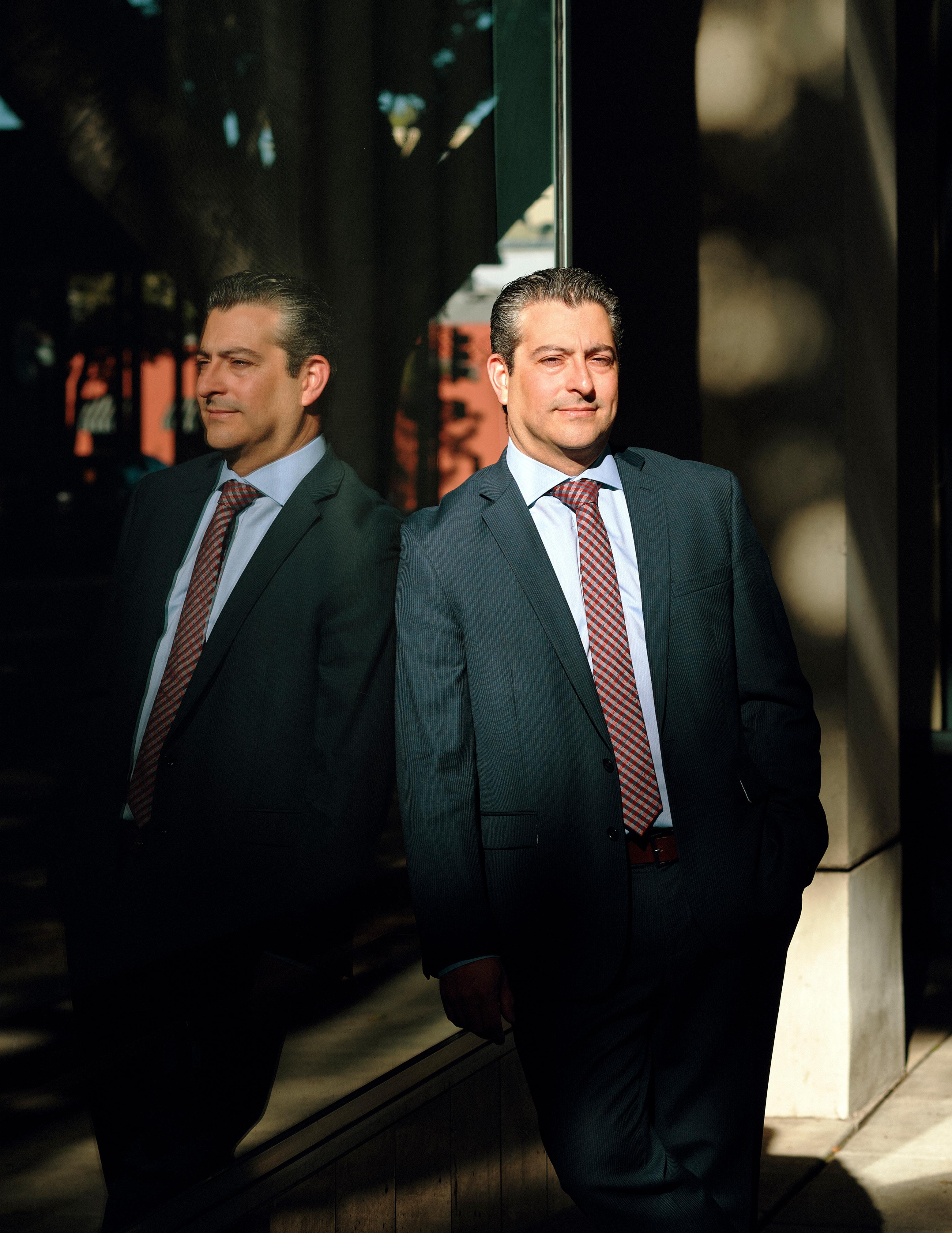 Panda Restaurant Group
Panda Restaurant Group
that was my parents’ American Dream,” he explains. “It was not my American Dream.” In 1991, while visiting family in Southern California, he enrolled in high school with plans of staying put. Eventually, his parents came north to support him.
After graduating from the University of California, Berkeley, and later earning a master’s degree in public policy at the University of Southern California, Coronel felt like he was well on his way to a community development government job. But it was right then that he met Andrew and Peggy Cherng, cofounders and co-CEOs of Panda Restaurant Group. Wowed by their values and ethos, the future executive director decided to take a turn with the Cherngs.

He still finds himself learning from the founders. On a recent project, as he pushed hard to finish, Coronel says that leadership pulled him aside. “Andrew wanted to make sure I was bringing people along,” Coronel explains. The reminder from the top was that training people supersedes getting projects done fast.
mi identidad: MI
“I identify as Mexican American. Having lived in Mexico, I have strong ties to the culture. I also have tremendous respect for the individual experiences and journey of the Salvadorean, Guatemalan, and Puerto Rican communities, among many others, to choose a term that combines us all into one identity.”
As a family-owned business that operates the majority of its stores, Panda’s values align with Coronel’s commitment to family. While they still have the home in Zacatecas, his parents live right next door to him in Los Angeles. Holding to the idea of abundance, he and his wife of seventeen years find consistent reconnection. “We are a part of each other’s lives,” Coronel says proudly. “And I know my children.”
Based on his own experiences, as well as those of his parents and Panda, Coronel believes, “Anything that comes my way, I’m going to take advantage of it.”
Hector Coronel has achieved his American Dream and now understands that dream as one shared with Panda’s fortyone thousand employees. To underline that point, he speaks of a colleague who started as a dishwasher without the ability to speak English. Now, Coronel explains, the same man manages thousands of employees and hundreds of stores. Even in the midst of everyday chaos—and a crisis like the COVID-19 pandemic—Coronel still gets to witness the manifestation of dreams.
Congratulations Hector Coronel for the well deserved recognition you are receiving. Your career path and leadership is truly inspirational. Craft Construction is proud of its long-standing relationship with you and Panda Restaurant Group. We look forward to continuing to provide you valuable, efficient, turnkey general contractor services throughout the nation.
Lew Chavez has dedicated the past three decades of his life to helping organizations improve supporting their clients—and he intends to keep moving forward
A Man with a Plan
BY BILLY YOST
LEW CHAVEZ HAS SPENT THIRTY-THREE YEARS
building. He’s created support organizations for well over a dozen companies, building out extensive customer success teams before that idea ever became relevant. “I’ve always been very customer support-centric,” Chavez explains. “I look at these things as a way to not only satisfy the customer but also to help grow the business by selling more as a result of exceeding customer expectations.” From customer success to outsourcing to automation, Chavez has consistently challenged himself to grow in new directions, finding innovative ways to save companies’ resources while maintaining quality service.
Chavez has a love for learning that keeps him up-todate on the latest methods and motivates him to share his knowledge as widely as possible. “I’ve always been energetic and inherently curious,” he says. “I’ve seen a lot of others my age ride off into the sunset to larger companies where they can just earn a good living and with less exposure. There is nothing wrong with that, but I’m not that guy. I want to be in a start-up or a company that acts like one. This requires a bit of risk.”
Chavez says he loves coming into an organization to quickly make real and effective change. “Because I have learned a lot in the business from a handful of great leaders, there is often a lot of low-hanging fruit for me to make big
and effective changes,” Chavez says. “There are cookie-cutter approaches that can often be applied in a very short amount of time, and then I can focus on the rest. I get to be a hero for however long those changes take to get implemented. The real success comes from the people you surround yourself with, though, and I’ve been very fortunate to have great people challenging me every day and helping me.”
As a rule, Chavez is intent on putting himself out of work. He comes, he builds, he leaves. “After a few years, I never really know if it makes sense for me to stay or not,” he says, laughing.
But there’s an exception to every rule: the support expert spent nearly a decade at Riverbed Technology, getting several promotions and eventually leading around one hundred people.
“The main reason I stayed as long as I did at Riverbed was the opportunities management threw my way,” he says. “I was hired to formalize their critical account organization. After a year and a half, I became director of Americas technical support.” Chavez was later promoted to VP of Americas support, where he brought in an advance support organization with high-tiered dedicated resources that supported federal and enterprise accounts.
In his final year at Riverbed, Chavez was asked to split the Americas TAC organization into two regions to get
157 Hispanic Executive
FAMILY HISTORY
Lew Chavez takes great pride in his family. His parents met in the picking fields where they both picked apricots in what would become Silicon Valley; they taught Chavez the value of a strong work ethic and eventually went on to successful careers of their own.
And Chavez’s ancestors are famous, in a way: they’re featured in historian Bob Alexander’s book, Lawmen, Outlaws, and S.O.B.s: Gunfighters of the Old Southwest . Chapter ten, titled “Clutching a Canteen Containing Blood: The Fighting Lopez Family,” details how Chavez’s extended Lopez family members in Las Cruces, New Mexico, were part of the US Cavalry and became US Marshals.
leadership closer to the customers. He then built a brand-new customer care organization and brought in their first tier one outsource group in Chennai, India. “The concept was to take away those less complex cases that our tier three organization was handling,” Chavez explains. “Thirty-five percent of their volume was removed so they could concentrate on giving better support to our customers at a higher level.” When the project was completed, he headed out for good.
Chavez has spent the last year at Nexa as the general manager for their high-tech business unit. They offer their clients US-based outsourced resources that provide tier zero support. Customer service representatives handle the low-end volume, which allows companies to take a lower cost approach to growing while allowing their badged employees to concentrate on the more complex issues.
Chavez is convinced that outsourcing can be beneficial to organizations of all sizes. “I’m very interested in helping to set up an organization with AI front-end processing as well as an outsourced tier zero organization that will eventually transfer to a badged member of the organization once that interaction needs to take place,” Chavez says. “It has the potential
to save so much money and allow employees to focus on more meaningful work. Instead of making constant renewal calls, bots can do so up until the point of payment.” But while he enjoys his time at Nexa, he’s looking down the road at building a start-up or enterprise company into a global delivery organization. “That is my true calling,” he says.
At present, Chavez is in contact with those looking for a leader who can develop an efficient team that delivers the best customer service. That could be with a fleet of delivery trucks or an investment firm. At Riverbed, he was an intricate part of the team that won JD Power and Associates’ An Outstanding Customer Service Experience award three years in a row. In other words, building an efficient team is a task familiar to him.
“I think there’s a missing link that I can help fill,” Chavez explains. “For every customer—I don’t care how big or small they are—a vendor should verify that the customer is onboarded correctly and able to recognize the value of our solution.” A lot of times what you find after a sale is made is that these expensive products wind up being doorstops because no one has taken the time to show them how to use the product successfully.”
158 Insights
“For every customer—I don’t care how big or small they are—a vendor should verify that the customer is onboarded correctly and able to recognize the value of our solution.”
Lew Chavez General Manager Nexa
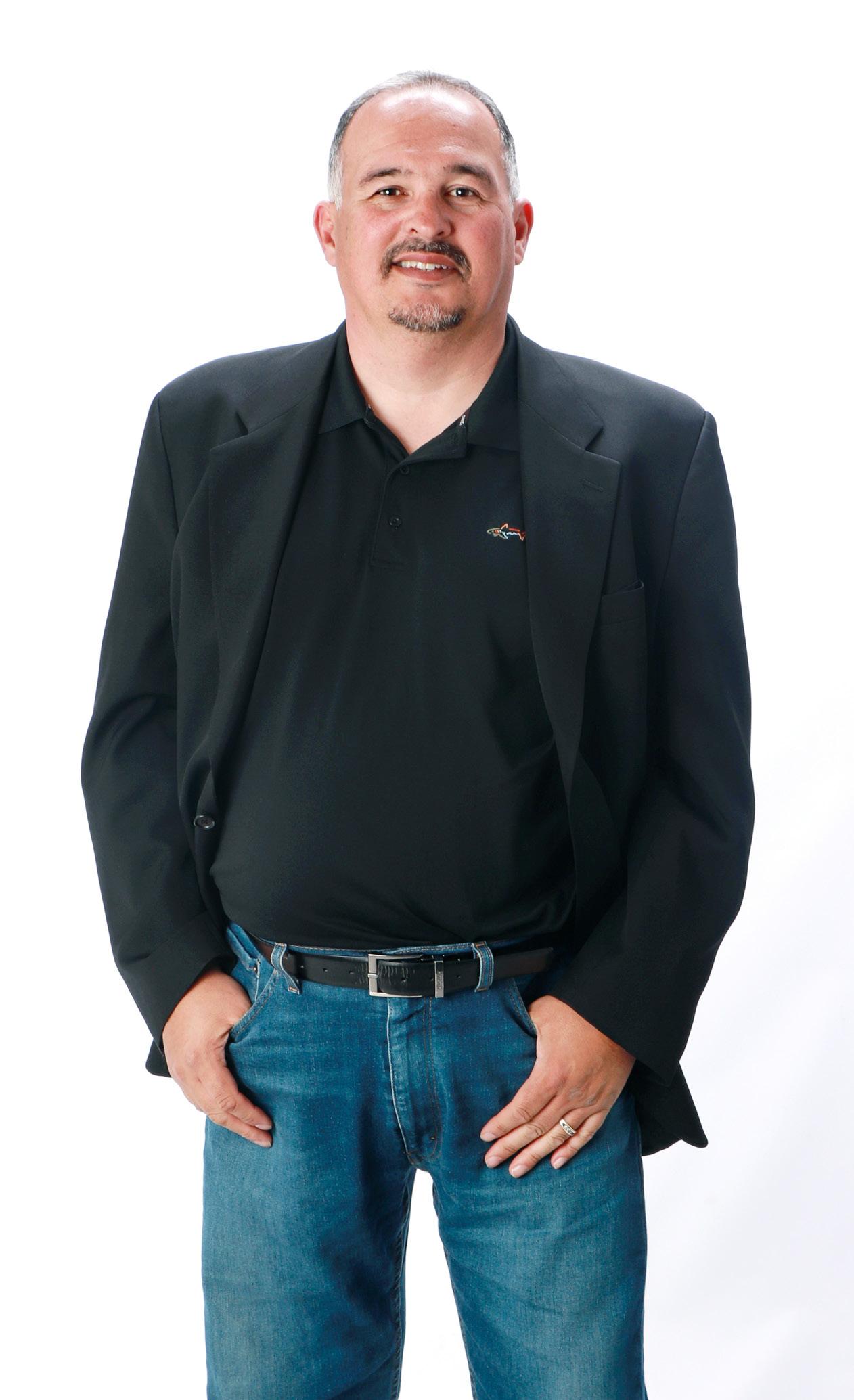
“My ancestors came from Spain and settled in ‘Old Mexico;’ Las Cruces, New Mexico; and Greeley, Colorado. When I do have to label myself, I guess I consider myself Hispanic, which I believe is defined as a person who is born in or descends from Spain.”
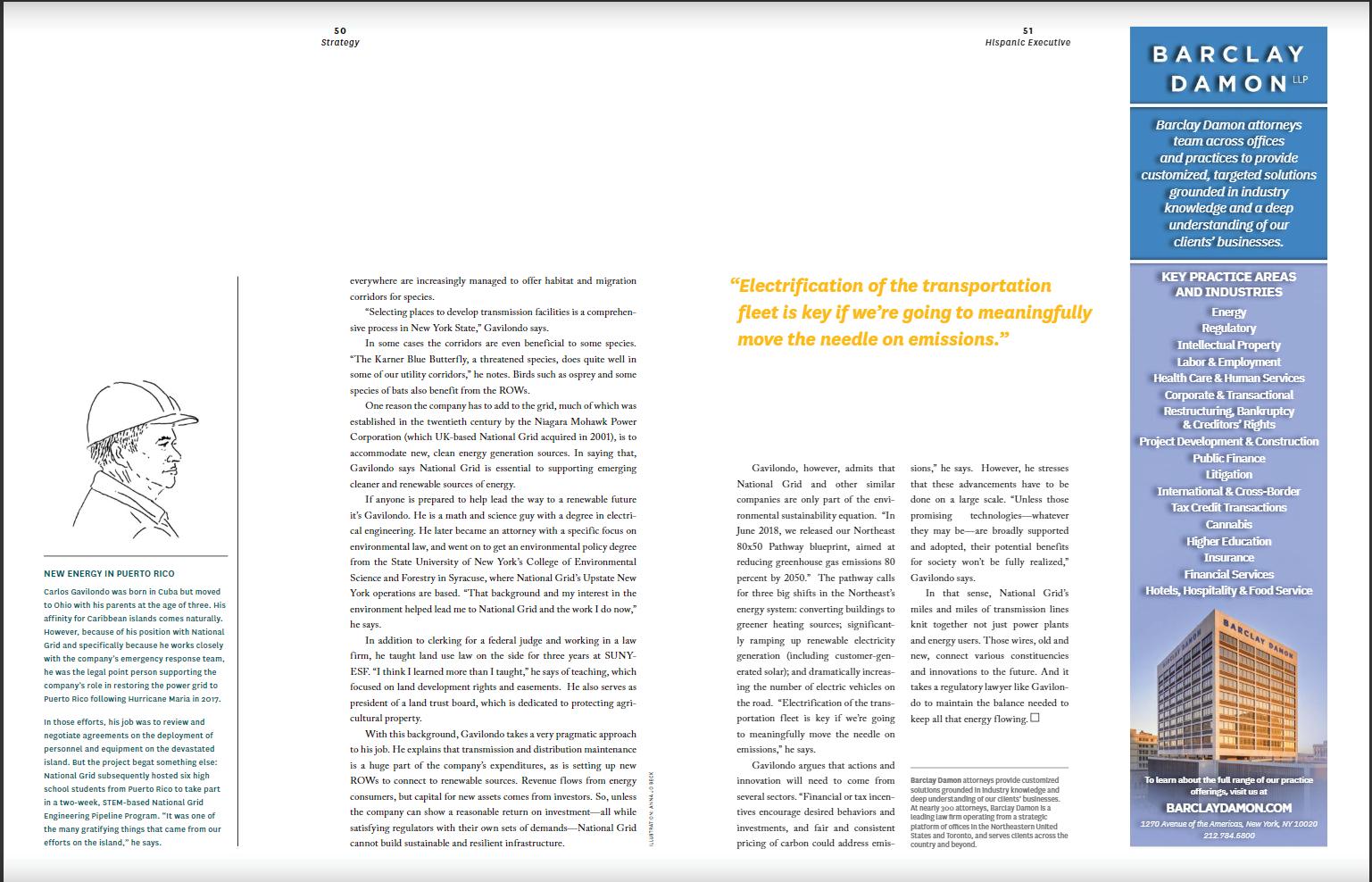
24/7 US-BASED CALL SUPPORT TICKETING + CASE MANAGEMENT
ORKFLOW + CALL MANAGEMENT
ORKFORCE SCALABILITY
WARE INTEGRATION
e help technology companies with multiple products and services
NEXASUPPORT.COM/HE 800.408.3408 CONTACT US LEVEL ZERO SUPPORT
here The Customer Experience Begins
MI
W
W
SOFT
W
streamline their customer support workflow.
W
mi identidad:
BRIAN WOODCHEK/THE PICTURE PEOPLE
How to Grow into a Growth Leader
BY BILLY YOST
WHEN ANDRES ANGELANI WAS GROWING up in Argentina, his family’s dining table was like a miniature boardroom. His father was an entrepreneur who started his own company, went bankrupt a handful of times, and was always brainstorming his next move during breakfast, lunch, and dinner. “The instability of Argentina at the time wasn’t a favorable business environment for him, but he always lifted himself back up,” Angelani says. “We were always talking business around the house. It really equipped me well for what I was about to do.”
Angelani is now CEO of the digital product engineering company Cognizant Softvision (a division of Cognizant Digital Business), though when he was growing up, he didn’t consider himself a people person. “I was always kind of a nerdy tech guy,” he says, laughing. “I played classical piano and preferred systems instead of people.” Over the years, he’s not only come to appreciate people, he’s also realized he’s good at working with them—and the wisdom he absorbed from his entrepreneurial father helped as well. “I’m a growth leader,” he says. “I always have been, not just in terms of how much a business can grow but also in terms of its people.”
Prior to being hired at Softvision in early 2017, Angelani spent nearly thirteen years developing his skills at IT and software company Globant. When Angelani joined the team there in 2004, the company had fewer than thirty employees; in 2019, it did nearly $700 million in revenue. He opened business lines in the UK over three and a half years, developing business for the rapidly expanding company. He then moved his family to the United States to develop key accounts, including Disney, that were essential to Globant’s successful public offering in 2014. After two years of operating as chief solutions officer, Angelani realized that if he wanted a CEO role, he’d need to move on. But the man who came to Globant was not the man who was leaving.
“When I was in the UK, I started realizing that I might be able to do the ‘people thing’ well,” Angelani explains. “Prior to that, I thought I was terrible with them. I’m very demanding and black and white. It created a lot of friction. We would deliver great results but it was a very rocky way of dealing with people.”
After moving to the US, Angelani was tasked with building a game development
160 Insights
CEO Andres Angelani has already turned around Cognizant Softvision— and now he’s looking to the future
mi identidad: MI “MULTICULTURAL AMERICAN”
Andres Angelani CEO
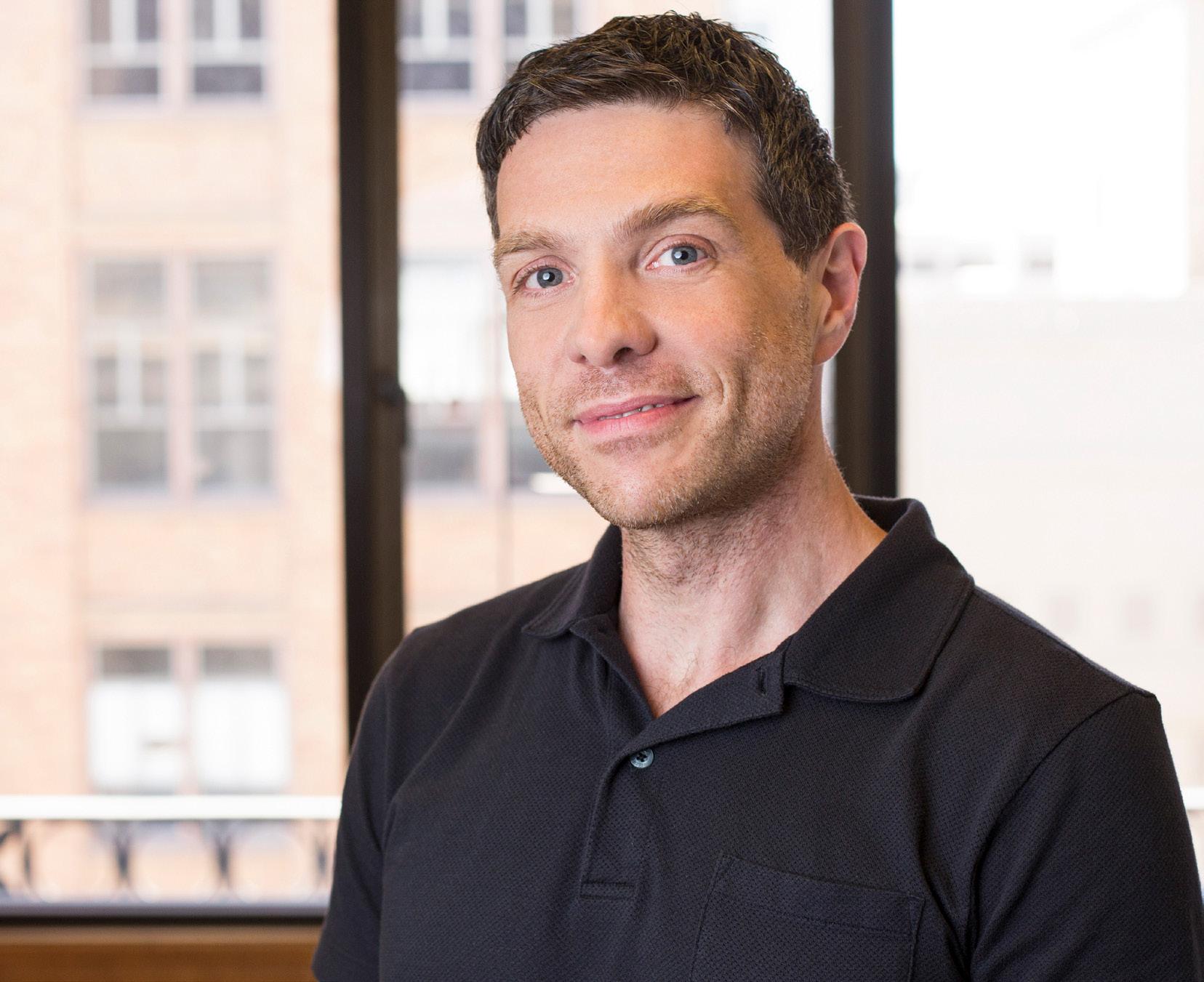
wing from scratch with partner Electronic Arts (which included work on some of the world’s largest sports video games, including the FIFA series, the NBA2K series, and the NHL series). Along the way, he says, he learned “an entire career” of team-building, interactive software development, and delegation. “That’s where I learned I’m a growth leader,” Angelani says. “But I’m not the boss who wants to hold your hand and tell you how great you are. I’m not the ‘nice’ guy. I’m sort of the ‘tough love’ type, and I feel great joy seeing my team grow into better professionals and leaders.”
Angelani’s style may not be for everybody, but in coming to Softvision, he was able to use his talents to help turn around a precarious situation. “When I arrived, there was a high level of debt and the company wasn’t in good shape,” he says. “I had to cut a lot of costs and talk to the banks to make investments.” The company completely redid its go-to-market strategy and in just two years, it was acquired
by Cognizant for three times what the private equity firm that owned the majority stake had invested in it.
It’s a resounding success story, but Angelani doesn’t simply want his Cognizant Softvision story to be written as a turnaround. “If I have to do what I need to do in order to get the company back in shape, I’ll do it, but I’m more interested in what the vision for the industry is going to be,” he says. “After things are turned around is when the real fun starts for me, because it requires vision.”
Angelani believes Cognizant Softvision is in a position to be the top digital pure play in the market. “We agreed to this acquisition because Cognizant loved how we run our business, cultivate communities, and deliver as cross-functional teams,” Angelani explains. “Now we have the opportunity to influence on a much more prominent stage, and my team has the ability to use what they’ve learned and make Cognizant lead in digital.”
AUTHOR IN RESIDENCE
When Andres Angelani isn’t leading transformation on behalf of global Fortune 500 companies, he’s writing about it. The two books he’s written— Transforming While Performing: A Practical Guide to Being Digital and The Never-Ending Digital Journey: Creating New Consumer Experiences through Technology—are filled with what Angelani says is simply the game plan he himself has followed for transformation and success.
“I was really lucky to work with different

COURTESY OF COGNIZANT SOFTVISION 161 Hispanic Executive
Cognizant Softvision (a division of Cognizant Digital Business)
Leveling the Playing Field
BY BILLY YOST
For Andy Velez, ensuring equal and fair treatment for all employees is a fundamental principle
162 Insights
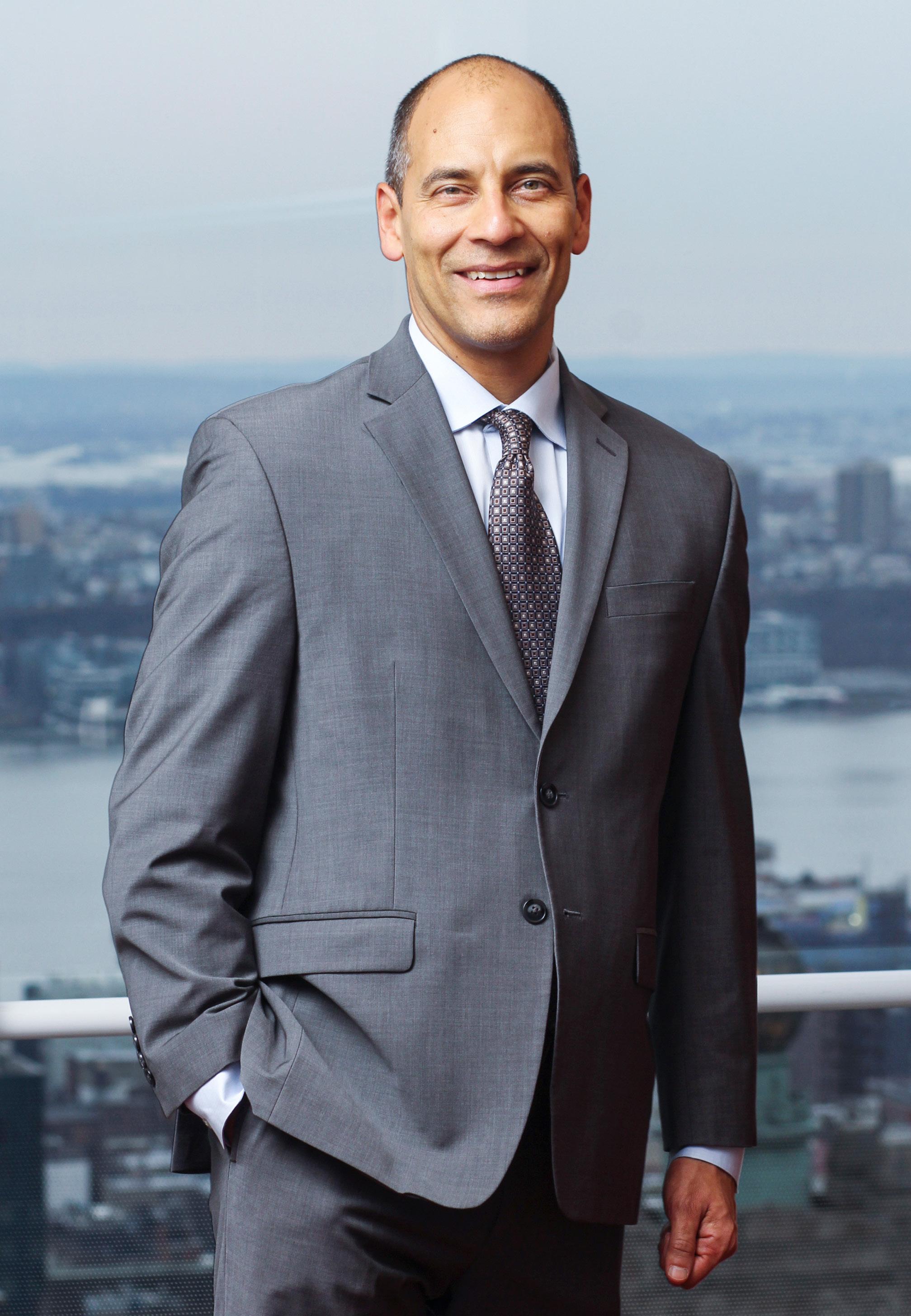
COURTESY OF BANK OF AMERICA
163 Hispanic Executive
Andy Velez SVP and Associate General Counsel Bank of America
Currently senior vice president and assistant general counsel for Bank of America, Velez is a litigation expert with a wide range of labor and employment experience—which he uses to help keep that playing field level. “It may seem like, coming in-house, that you’re taking the side of the company that’s paying you, but that’s not how this works,” he says. “The company is asking you to ensure that its policies, including equal and fair treatment for all employees, are being enforced.”
Earlier in his career, Velez had assumed that he was a born litigator, made for the courtroom and nothing else. But in his five years with Bank of America, he’s developed a broad and collaborative skill set that emphasizes efficient and honest communication between the company’s legal department and the rest of its business.
And, ultimately, it’s been a skill set that has not gone unnoticed by the partners that work with—and depend on— Velez for his expertise and know-how. “Andy embodies the relentless passion and energy of a prize fighter, the instincts and precision of a scientist, and the knowledge and wisdom of a philosopher,” explains Michael J. Fortunato, president at the firm of Rubin, Fortunato & Harbison PC. “On any given matter, he quickly masters the law and digests the facts while shaping the trajectory of a case with a keen appreciation for the business realities. His ability to multitask as a
road warrior and perform at a consistently high level dazzles even the most hardened opponents. It is truly a privilege to work alongside of him.”
THE VALUE OF BEING THERE
When Velez first came to Bank of America in 2015, his role was advising business partners of risk on employment and internal matters. After a year and a half he was asked to manage litigation, widening his purview significantly. “I said, ‘I know how to do this, but I need to do it my way,’” Velez remembers. “In terms of traveling on behalf of issues and adding value, I felt that I needed to be traveling more than the job had previously entailed. I place a great deal of trust in our outside counsel, but I wanted to be an added eye there.”
While the financial world may seem to be full of stringent processes and protocol, Velez says, his employer has offered him a degree of flexibility in his approach that has allowed him to be the most effective lawyer he can be. “I felt like I was able to openly ask about it and challenge the way it had been done before,” he says. “And it’s worked out.”
Velez has also made himself available for the company’s continuing diversity and inclusion initiatives, appearing on the bank’s behalf at the annual National Association of Minority and Women Owned Law Firms conference.
164 Insights
For Andy Velez, it’s pretty simple: “If you have a level playing field and everyone has a chance to exhibit their talents, if you work hard and demonstrate your talent and work ethic—that will win out.”
10S.LeopardRoad•Paoli,PA19301•T:610.408.2000•E:rf@rubinfortunato.com www.rubinfortunato.com ALawFirmofAction
Bressler, Amer y & Ross congratulates Andy Velez
Senior Vice President and Assistant General Counsel at Bank of America
on his well- deser ved recognition
by Hispanic Executive.
With one of the nation’s largest concentrations of attorneys dedicated to representing clients in the financial services industry, Bressler is the go-to litigation firm for the financial industry






For nearly 40 years, Bressler Amery & Ross has represented broker-dealers, investment advisers, and financial service firms in arbitration and litigation matters. Our employment law team has a long and successful track record in matters before FINRA and in courts across the country.
“We are a large client that needs to express our interest in diversity matters to all of our outside counsel,” Velez says. “We have to ensure that our outside counsel is reflective of the diverse employees that we have here.” He also routinely sits in on committees that assess prospective outside counsel and says that the opportunity to have a voice in furthering diversity on behalf of Bank of America’s outside counsel has been a rewarding new component of his position.
ASKING THE TOUGH QUESTIONS
Velez has spent the last decade focusing on employment law in financial industries, a world that’s heavy on regulations and compliance. Even though he isn’t a regulatory attorney, the nature of his job means that it’s in his best interest to know what’s going on. “That way I can advise the business on what’s fair and what is level,” he says. “I have credibility to explain the way the law works in that framework.”
The best advice he can offer young lawyers, Velez says, is to have the confidence and the courage to grow in the business. “To do this job well, you have to know your industry. You have to become an expert here so you can
effectively tell the businesspeople and your HR partners that you understand the responsibilities they are supervising. Be honest, be clear, and provide all of the necessary information they need to know so they can make the most informed decisions.”
Velez is effective as a partner partially because he doesn’t sugarcoat the realities of potential litigation, he says. “I try not to downplay downsides of a potential dispute, because the reality of the situation is that litigation is very expensive. You need to be efficient and honest in your advice.”
In his role, Velez says, it’s also essential to play devil’s advocate when it comes to potential litigation, reinforcing that each and every fact can often be interpreted any number of ways. “I’m never afraid to ask the tough question at the end of a conference call,” he says.
The value of asking tough questions, according to Velez, is that it helps cement relationships between business partners. “It lets your internal clients know that you’re looking out for their best interest,” he says. “And the greatest satisfaction I can get is when I hear from a supervisor that one of my clients trusts my advice.”
166 Insights
WI T H O F F ICE S L O C AT E D I N : NEW J E R S E Y NE W Y O R K F L OR I D A W A S H IN G T ON, D. C . A L A B A M A w w w.bressler.com
“I try not to downplay downsides of a potential dispute, because the reality of the situation is that litigation is very expensive. You need to be efficient and honest in your advice.”
mi identidad: MI “LATINO”
BAL Global International businesses present unique challenges— and opportunities—for corporate citizenship in multiple countries. The executives featured here thrive in navigating cultural shifts worldwide. 168 Pilar Cruz, Cargill 173 Alexander Montoya, Liberty Mutual Insurance 175 Lina Martinez, Atlas Copco 180 Oscar Arredondo, Chevron 182 Andres Villareal, MoneyGram
GLO
Growing a Culture of Inclusivity
BY A.J. ZAK PORTRAITS BY GILLIAN FRY
At Cargill, Pilar Cruz believes diversity is just as crucial as strategy when it comes to achieving success
168 Global
 Pilar Cruz President, Cargill Aqua Nutrition Business Cargill
Pilar Cruz President, Cargill Aqua Nutrition Business Cargill
WHEN PILAR CRUZ MOVED FROM HEAD OF CORPORATE strategy and development at Cargill to president of the company’s compound feed and nutrition business in 2017, it wasn’t long before she had a big challenge to deal with: African swine fever was decimating pork markets in China, Vietnam, and elsewhere, which in turn affected Cargill’s business with swine distributors, customers, and farmers in those countries. Just months into her new role, Cruz had to find opportunity in a difficult situation.
So she joined an effort on biosecurity to help customers mitigate the impact of the disease on their livestock. She worked with global teams to make the business more competitive and efficient, ultimately meeting Cargill’s safety and financial goals, she says.
Since 2017, Cruz has worked to grow and strengthen Cargill’s feed and nutrition business. This year, she embraced a new opportunity to lead Cargill’s aqua nutrition business. In the past, she also served as president for Cargill Meats Europe. Her personal path and background living all over the world have shaped how she approaches her role as a leader, with inclusion and diversity always top of mind.
Originally from Bogotá, Colombia, Cruz came to the US twenty years ago to earn her Master of Business Administration at the University of Michigan’s Ross School of Business. Since joining Cargill in 2002, her positions with
the company have taken her and her family around the world, with stints in cities in the US, Canada, Europe, and South and Central America, before landing at their current home in Minneapolis. Exposure to those different cultures became a core part of Cruz’s identity as a leader.
“My passion for inclusion and diversity and for exploring and being curious about different teams and different cultures is personal,” she says. “It is my own journey.”
Mentors and leaders Cruz has known along the way at Cargill have been another key element in her journey. As a young woman from Colombia originally working as an analyst, Cruz was encouraged by the company to take big risks and was sought out for advancement opportunities.
“When I look back, I realize that a lot of leaders gave me opportunities and more responsibility with every new job that I’ve had—and it’s time for me to give back,” she says.
The fact that other people sensed potential in her is part of what has made Cruz a strong believer in the collective strength of a team. She prioritizes surrounding herself with leaders and other employees who are agile, adaptable, and resilient. She also highly values cultural synergy, and she believes that building an inclusive and diverse workplace is especially crucial for a company that operates all over the world. (Cargill has more than 160,000 employees in 70 countries and regions.)
170 Global
“When I look back, I realize that a lot of leaders gave me opportunities and more responsibility with every new job that I’ve had—and it’s time for me to give back.”
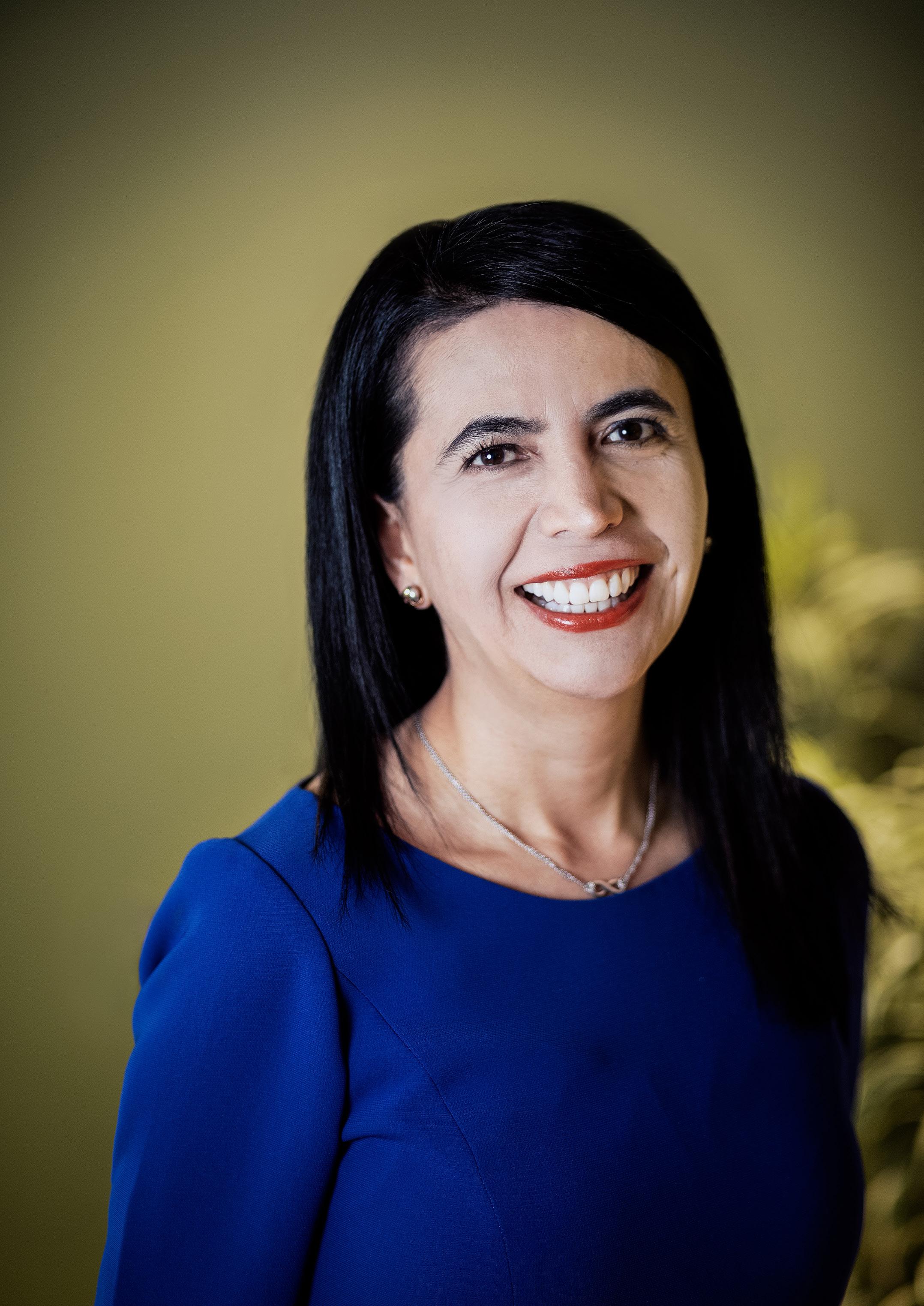
“We need to have a culture that embraces and welcomes inclusion and diversity . . . where employees can be themselves,” she says. “We absolutely have to be sensitive to differences in cultures, genders, nationalities, and styles, and that’s something I really believe is important to high-performing teams.”
Cruz is an executive sponsor for Cargill’s Hispanic Latino Business Resource Group, a network that works to promote recruitment and engagement of Hispanics and Latinos
within the company. Cargill also recently signed on to the Hispanic Promise, an initiative launched at the World Economic Forum in 2019 through which companies pledge to hire, retain, and celebrate Hispanic employees.
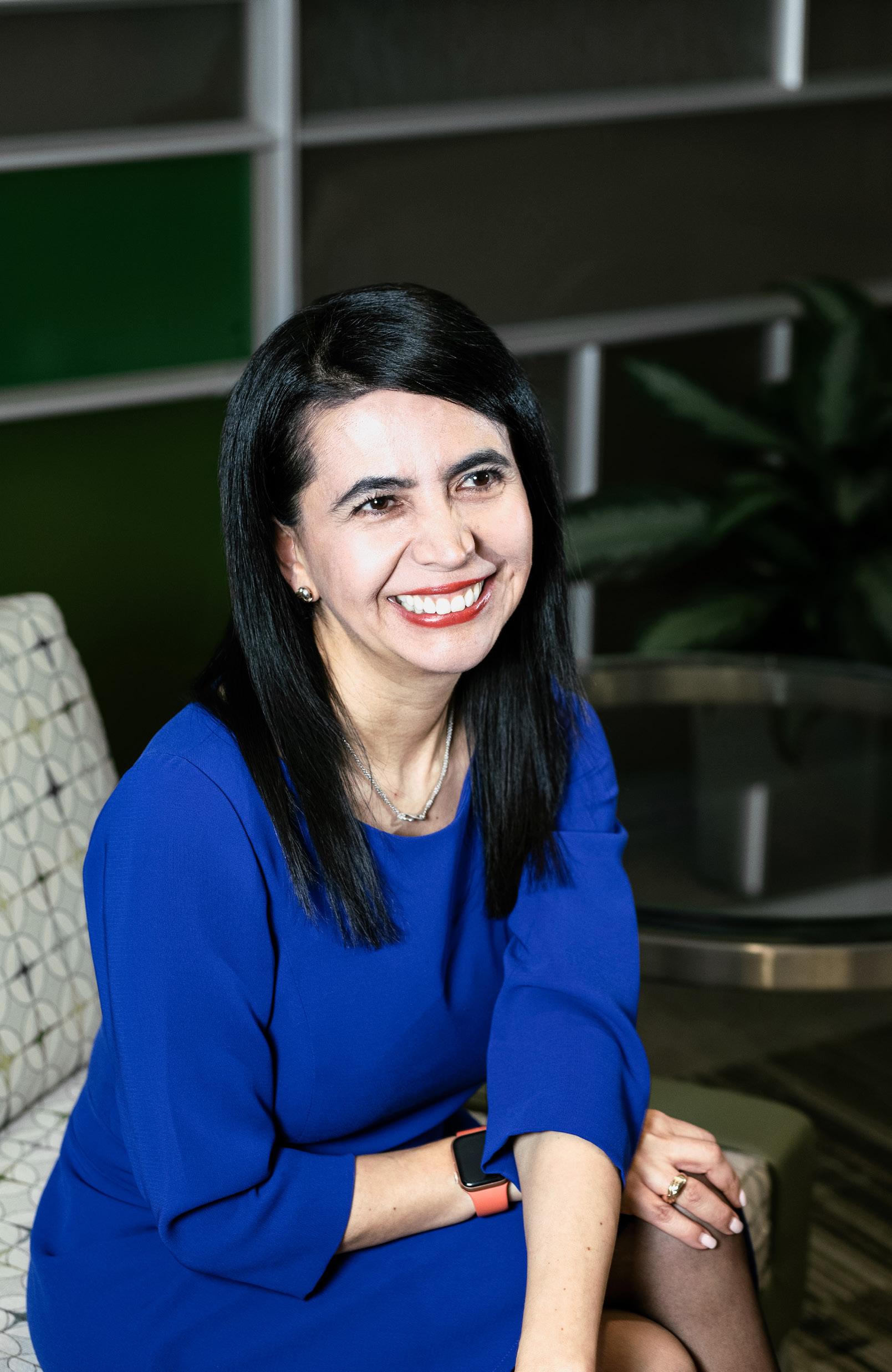
Cruz works on a personal level to practice what the company preaches. Through a new corporate sponsorship program, she is a mentor to an employee who is based outside of the US, supporting him on his career path and also learning from his insights. It’s a symbiotic relationship, she says. Cruz takes a boots-onthe-ground approach to cultivating relationships with Cargill employees and believes that executives can’t lead the global business from its Minnesota headquarters alone.
“It’s important to be present and to be visible, and not just to get on the phone with our leaders or our customers,” she says.
Cruz visited Cargill teams in Ecuador, Norway, Vietnam, Indonesia, Malaysia, and Thailand when the company’s aqua nutrition business came under her purview in 2019. That growing market presents an exciting opportunity at a time when consumers are seeking out healthier protein options, she says. Wherever her work takes her, Cruz prides herself on being an approachable leader—someone who is strategic about business, but who also puts team members first.
“I’m somebody that displays our values, every single day,” she says. Though she sets high expectations and prioritizes accountability, her philosophy on how to create value reaches much deeper. “Of course, processes, equipment, and the technology are relevant. But I care most about our people.”
mi
MI “
identidad:
LATINA”
At Liberty Mutual Insurance, Alexander Montoya fosters a culture of empowerment, motivation, and continuous improvement
Be Principled, Be Proud
BY BILLY YOST
ALEXANDER MONTOYA HAS LED TEAMS in various regions over the course of his twenty-five-year career, many of them in Latin America. Recently named president of Liberty Mutual Insurance’s specialty markets division for the US, Latin American, and Bermuda markets, he says that despite the differences in his roles over the years, he sees more similarities. “Every time I’ve taken on new roles and responsibilities, I always ask myself the same question: ‘How will this be different?’” Montoya says. “But people everywhere are looking for the same things. They want to be proud of where they work. They want to be proud of how their company contributes to society and to the communities that can improve because of their work. It’s always the same answer. We’re humans and we want the same things.”
BUILDING CULTURE INSIDE AND OUT
Montoya places a premium on an organization’s ability to build a culture of empowerment, motivation, and continuous improvement. At Liberty Mutual, his leadership is focused on those same principles. “We all want to feel that we are led by people who share
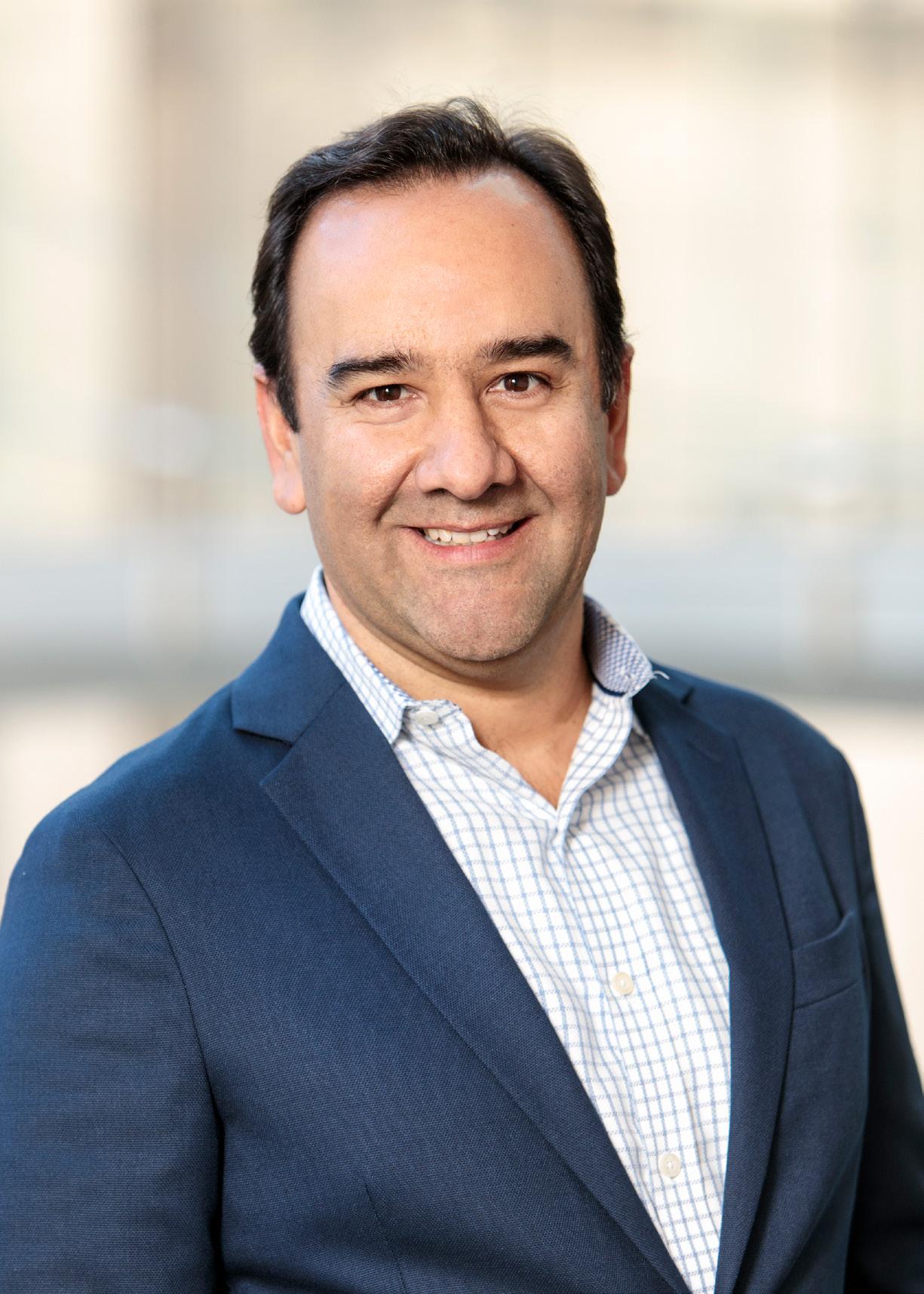
173 Hispanic Executive DAN BUSLER
Alexander Montoya President of Liberty Specialty Markets for US, Bermuda & Latin America Liberty Mutual Insurance
PRESIDENTS ASSEMBLE
Alexander Montoya is a proud member of the Young Presidents Organization (YPO), whose global membership base of twenty-eight thousand is made up of corporate presidents, chairpersons, and CEOs who attained their positions before the age of forty-five. “This is a place where you can meet with other leaders and discuss situations in your life, your family, your work, and your community,” he says. “These are people who spend a lot of time thinking about how they can more positively impact the places they live.”
Montoya says what he’s learned at the YPO has translated directly to his work at Liberty Mutual.
“We have a purpose here: embrace today and confidently pursue tomorrow,” Montoya explains. “I’m able to relate ideas like continuous learning and culture building to my team.”
the same vision and are willing to tirelessly pursue it,” Montoya says. “And when things go wrong, that person needs to stand up to defend the team.”
Recently, Montoya’s Latin American team completed a five-year growth plan in just four years, surpassing both expected growth and profitability in the process. “We had a very special moment here today because we had the opportunity to tell those employees that the corporation is recognizing their efforts and rewarding their hard work,” Montoya explains. “Every time we’re able to deliver on the promise that we’ve made to our employees that if they work hard, they’ll be rewarded, it makes all the difficult parts of my job worth it.”
Montoya hopes to continue building culture in ways that are directly applicable to business lines at Liberty. “Our goal is to reduce the amount of friction in our customers’ transactions,” the president says. “The fewer touch points, the better and easier our clients can get a quote or renew their policies—and the better their experiences will be. These efforts have been the same from the US to Latin America to Bermuda.”
ICE BREAKERS AND MVPS
A proud Colombian, Montoya says his heritage has provided him with a cultural skill set that has extended far beyond his home country’s borders. “Colombians are warm people, and I think that has been helpful because I can portray a bit of that warmth from my culture during any meeting I’m in,” he says. “If you learn to negotiate with the right tone so it’s not intrusive to someone who wasn’t raised in the
same way, I think it goes a long way toward breaking the ice and developing relationships.”
Montoya also says that Latin Americans are inherently equipped to operate off of a minimum viable product (MVP) model. “This isn’t because this model has been meticulously applied for decades; it’s because we just don’t have the same access to resources,” Montoya explains. “Improving your MVP and repeating is just the way it is done. You will see Latinx excelling in this area as it’s applied to more global business because it’s the way we’ve always done it—because we’ve had to.”
THE PURSUIT OF LIBERTY
Building anything, from process to culture, requires significant buy-in from all parties, and Montoya says that his time at Liberty has proven beyond a shadow of a doubt that he has the backing of a massive, worldwide organization in making things better for his employees and his customers. “To have someone like me in the position that I have today just demonstrates the open and inclusive environment here,” Montoya says. “I’m able to build with empowerment and don’t have to wade through bureaucracy in order to implement ideas like flex time, work from home, and continuous improvement.”
Montoya says that his ability to have an impact on long-term planning and ideation is particularly inspiring. “To be able to issue an opinion and shape the way that we think about initiatives—I feel like a very lucky person,” Montoya says. “Our organization is massive, and by influencing the direction of the company, we’re able to make a difference in the world.”
174 Global
mi identidad: MI “LATINO”
Lina Martinez Corporate Counsel Atlas Copco
 BY BILLY YOST
BY BILLY YOST
MAT ROBINSON/ENDURING IMAGES PHOTOGRAPHY 175 Hispanic Executive An International Affair
extensive global law experience
Lina Martinez brings
to Atlas Copco
That vision led her to where she is today: corporate counsel for Atlas Copco, a global company headquartered in Sweden that manufactures industrial equipment. It’s a good fit for Martinez, who wanted to be an in-house lawyer even before she knew such a thing existed: when the young Cuban American thought of being a lawyer, she always imagined herself working inside a company.
Despite feeling like she knew exactly where she belonged, it wasn’t all smooth sailing for Martinez. After graduating from law school at the height of the Great Recession, she was offered deferred employment at a large New York law firm until they had more work coming in. “They would hold my position, pay me a stipend, and I could either do pro bono work or travel,” Martinez explains.
She went to work for the nonprofit Kids in Need of Defense as an advocate for unaccompanied minors who had crossed the border into the US and needed representation in the New York immigration court system. “I was shown how the job worked, told to watch and learn, and given my first client,” Martinez remembers. It was
a difficult and often heartbreaking job, but the lawyer says she’s grateful for the important work she was able to do and the intense on-the-job training it provided.
Martinez would eventually go back to the firm, accruing international and transactional experience before taking an in-house position with Suburban Propane. It was her first in-house role, and she says she was lucky to get it. “I had only been out of law school for a few years, and I think my general counsel really took a chance in hiring me,” Martinez says. Fortunately, it worked out, and she spent nearly four years with the company.
While that first in-house role gave Martinez the chance to prove her ability to focus on a single client, she missed working with international clients. “I really wanted to go back into international work because it was something I had developed a passion for,” she says. “Atlas Copco is a multinational company with thousands of employees all over the world, and they seemed to always be looking for better ways to operate, especially environmentally, which is pretty extraordinary for an organization this size.”
176 Global
“I definitely knew I wanted to be a lawyer since I was very young,” Lina Martinez says. “I didn’t know the different areas of the law, and I didn’t know anyone who was a corporate lawyer, but I knew.”
Celebrating our friend and client Lina Martinez
Greenberg Traurig joins Hispanic Executive in recognizing Lina Martinez for her leadership, focus on excellence, and commitment to advancing diversity. It is a privilege to work with Lina as her vision and influence make all of us better attorneys.
We are proud to share in your dedication to providing everyone equal opportunities.
Congratulations, Lina.
#1 No. of AfricanAmerican & Latino Partners & Attorneys
The American Lawyer Diversity Scorecard, 2019
#5 No. of LGBT Partners


The National Law Journal LGBT Scorecard, 2019


#6 No. of Female Partners
The National Law Journal Women’s Scorecard, 2019
#6 No. of Minority Attorneys

The American Lawyer Diversity Scorecard, 2019







Albany, Amsterdam, Atlanta, Austin, Berlin , Boca Raton, Boston, Chicago, Dallas, Delaware, Denver, Fort Lauderdale, Houston, Las Vegas, London*, Los Angeles, Mexico City+, Miami, Milan», Minneapolis, Nashville, New Jersey, New York, Northern Virginia, Orange County, Orlando, Philadelphia, Phoenix, Sacramento, San Francisco, Seoul∞, Shanghai, Silicon Valley, Tallahassee, Tampa, Tel Aviv^, Tokyo¤, Warsaw , Washington, D.C, West Palm Beach, Westchester County

GTLAW.COM
The hiring of a lawyer is an important decision and should not be based solely upon advertisements. Before you decide, ask us to send you free written information about our qualifications and our experience. Prior results do not guarantee a similar outcome. Greenberg Traurig is a service mark and trade name of Greenberg Traurig, LLP and Greenberg Traurig, P.A. ©2020 Greenberg Traurig, LLP. Attorneys at Law. All rights reserved. Attorney Advertising. No aspect of this advertisement has been approved by the Supreme Court of New Jersey. °These numbers are subject to fluctuation. ¬Greenberg Traurig’s Berlin o ce is operated by Greenberg Traurig Germany, an a liate of Greenberg Traurig,
P.A. and Greenberg Traurig, LLP. *Operates as a separate UK registered legal entity. +Operates as Greenberg Traurig, S.C. >>Greenberg Traurig’s Milan o ce is operated by Greenberg Traurig Santa Maria, an a liate of Greenberg Traurig, P.A. and Greenberg Traurig, LLP. ∞Operates as Greenberg Traurig LLP Foreign Legal Consultant O ce. ^Operates as a branch of Greenberg Traurig, P.A., Florida, USA. ¤Greenberg Traurig
Tokyo Law O ces are operated by GT
Tokyo
Horitsu Jimusho, an a liate of Greenberg Traurig, P.A. and Greenberg Traurig, LLP. ~Greenberg Traurig’s Warsaw o ce is operated by Greenberg Traurig Grzesiak sp.k., an a liate of Greenberg Traurig, P.A. and Greenberg Traurig, LLP. 33783
GREENBERG TRAURIG, LLP | ATTORNEYS AT LAW | 2200 ATTORNEYS | 41 LOCATIONS WORLDWIDE ° GT_Law
Lee
Philip R. Sellinger | Co-Managing Shareholder,
New
David
| Co-Managing Shareholder, GT New Jersey 500 Campus Drive | Suite 400 | Florham Park, NJ 07932-0677 | 973.360.7900
Greenberg Traurig, LLP GT_Law GreenbergTraurigLLP
A. Albanese | Shareholder, GT New Jersey
GT
Jersey
Jay
Congratulations to our friend and client
WHERE THE HEART IS
When it comes to charitable causes, Lina Martinez keeps her heart close to home. As a mentor with the Hispanic Bar Association’s Pipeline Program, she helps high schoolers near her old neighborhood in Union City, New Jersey, who are interested in law careers.
“It’s exactly the kind of program I wish I would have had growing up, and I think it’s so important to pay back what I’ve learned along the way,” she says.
The lawyer is also a part of the Board of Tri-County Scholarship Fund, which provides funding for residents to attend better schools in the area based solely on need, not on grades or extracurricular activities. That makes it even more astounding that the program has a graduation rate of 100 percent. Martinez says she’s especially proud to aid an organization whose graduates are 70 percent Latino.
Prior to being hired at Atlas Copco, Martinez had built a reputation as a strong transactional attorney with extensive international experience, particularly in South America. But since joining the company in 2016, she’s widened her scope considerably, adding employment law; safety, health, and environmental matters; and third-party bankruptcy matters to the list of areas where she has experience.
“Literally every single day is something different,” Martinez says. “That includes my Latin American responsibilities along with cross-border work and a whole host of other responsibilities.”
Martinez’s partners get to see her adapt day in and day out at Atlas, as she’s always ready to take on new challenges. “We are lucky to have had an opportunity to support Lina on her transactions,” says Lee Albanese, a shareholder at Greenberg Traurig. “She is a brilliant attorney and a joy to work for. However, what is most impressive to me about Lina is her uniquely broad perspective of the purpose of the deal and the people involved.”
One of the best parts of the job, Martinez says, is Atlas Copco’s “take charge of your career” mentality, which encourages its employees to seek opportunities that aren’t necessarily in their job descriptions. “Even if it’s not a typical growth opportunity, the company is very supportive if you think it will help you develop,” she says. “This has really allowed me to build out my Latin American work
178 Global
on
achievements in the industry.
Galleria Tower II 5051 Westheimer Road Suite 1000 Houston, TX 77056 asarne@krcl.com 713.425.7405 Corporate Counsel, Atlas Copco
her
Lina Martinez
because I’m fluent [in the language], I understand the culture, and I think my clients really understand me.”
The company’s focus on professional development, combined with an adaptability that Martinez says is her professional strong suit, have helped the lawyer to take on any challenge thrown at her. “I have no scientific or technical background, but sometimes IP issues hit my desk,” Martinez says. “You have to learn to be comfortable with being uncomfortable and give sound advice and counsel, learning all that you can along the way.”
That adaptability also came in handy last year, a time of heavy acquisitions for Atlas Copco. Martinez got to do a deep dive into her area of expertise while still learning on the job. “I love being part of a deal team because we take the time to really learn about the target and their business,” Martinez says. “It was a very busy year, and it was exciting to deal in an area where I feel I’m especially strong.”
Martinez says she’s continuing to find ways to build out her capabilities and client support in South America and hopes to make an even bigger impact in the area. At least that’s the plan—and if there’s one thing the lawyer has proven since childhood, it’s that she knows how to follow through on the plans she makes.
mi identidad: MI
“I typically use the word Hispanic, or if asked specifically where I am from, I say Cuban American. I’ve always found it difficult to explain where I am from because I was born in the US and so I am not Cuban when I travel to other countries—but in the US, I am not simply considered American because my parents were born in Cuba. I had a professor in college who referred to it as living on the hyphen.”
True Grit.
In today’s legal marketplace, excellence merely gets you in the door. Dedication, grit, resourcefulness, passion—these are the qualities that separate the exceptional law firm from the rest of the pack.
Miles & Stockbridge is pleased to recognize Lina Martinez for her many achievements and dedication to her craft.
www.mslaw.com
 Miles & Stockbridge: “Lina Martinez is an able and accomplished attorney who achieves her client’s objectives with tact, energy, foresight, and skill. She is a pleasure to work with as a colleague, and consistently demonstrates excellent judgment in managing multiple matters economically, effectively, and prudently.” –Russell V. Randle, Principal
Miles & Stockbridge: “Lina Martinez is an able and accomplished attorney who achieves her client’s objectives with tact, energy, foresight, and skill. She is a pleasure to work with as a colleague, and consistently demonstrates excellent judgment in managing multiple matters economically, effectively, and prudently.” –Russell V. Randle, Principal
179 Hispanic Executive
Authorized by Nancy Greene, Chairman
Senior Counsel Oscar Arredondo takes the oil and gas company’s mission statement to heart
Chevron’s Way in the World
BY CLINT WORTHINGTON
CHEVRON’S CORPORATE PHILOSOPHY, known internally as “the Chevron Way,” is a comprehensive blueprint for the oil and gas giant’s overall direction, from driving high-performance results to facilitating diversity and inclusion for its driven, dedicated staff. But for Oscar Arredondo, the Chevron Way is more than a mission statement. “We want to be an energy company that’s admired,” he says. “That’s a tall task for this world.”
As Chevron’s senior counsel, Arredondo is struck by how the company’s statement of values affects not just its vision, but its internal culture as well. “To me, it’s not about oil and gas; it’s about delivering energy to the world,” he says. “That is what has enabled us to have the standards of living we have in Western society, which the developing world covets as well.”
It’s a mind-set Arredondo has had through decades of work at Chevron. Starting as a holdover from Texaco during its merger with Chevron in 2003, he saw an opportunity to get in on the ground floor with the company and stayed on while many of his colleagues took severance packages.

Getting there in the first place was a result of both perseverance and flexibility—skills that he stresses are vital to any profession, especially in the legal space. Arredondo’s early successes required him to “knock on quite a few doors” and argue that his master of laws degree made him just as valid a job candidate as someone with a juris doctorate. “Once you break that barrier and prove yourself as a competent lawyer, you earn a reputation,” he says.
Over the years, he’s leveraged that reputation to earn himself more exciting opportunities. Another key to success, he says, is getting out of your comfort zone—like when he was asked to handle his first upstream position in Venezuela in 2003. “It’s about having that faith in yourself and that intellectual flexibility to take new challenges,” Arredondo says. “It’s not my comfort lane. And it’s certainly not my country, you know. But I think I can contribute. And that’s what’s shaped where my career has gone.”
In his nearly twenty years as senior counsel at Chevron, Arredondo has had the chance to counsel the company in international relations and
180 Global TROY FIELDS
“To me, it’s not about oil and gas; it’s about delivering energy to the world.”
Oscar Arredondo
Senior Counsel
Chevron
to consult with expatriate engineers, business development experts, and geologists from all over the world. “Because of Chevron’s needs and the skill set I bring to the table, I have been afforded plenty of opportunities throughout my career,” he says.
He’s managed upstream operations everywhere from Venezuela to Brazil to Kazakhstan, juggling marketing, transportation, litigation management, and a host of other duties. Most recently, he returned to Houston to work as the acting general counsel for Chevron’s biggest and most recently acquired refineries: Pascagoula, the largest US refinery in the company’s portfolio, and Pasadena, newly acquired in May 2019.
It’s a relatively new responsibility: prior to that, he was acting general counsel for Chevron’s Pascagoula and Salt Lake City refineries and provided support to one of their additives facilities outside of New Orleans. Supervising the work of two new, significant properties in Chevron’s umbrella is a unique challenge Arredondo relishes, though.
Among his major tasks in 2020 are turnarounds for both refineries— extended shutdown schedules to clean, repair, and maintain the complex equipment employed at both facilities. That involves coordinating all the contracts for maintenance, inspections, and product sales in order to complete the turnaround as quickly and cost-effectively as possible. “It’s a major logistical feat,” Arredondo points out.
Another huge challenge has been establishing Chevron’s presence in the Pasadena refinery after its acquisition. Organizational cultures and processes have to be translated to the Chevron world, especially for personnel who’ve
mi identidad: MI

“When I am asked, I answer this question in a manner that is not satisfying to me. However, the answer that I like to use to describe myself is Human. I believe that by placing and accepting labels (whatever those are) we predispose ourselves (as a society) to see differences. In this sense, labels (even if only marginally) prevent us from seeing our many, many similarities.”
stayed on from the refinery’s previous owner, Petrobras. “You don’t flip the switch and what’s green becomes blue, you know?” Arredondo says.
“It’s a process of sharing best practices, communicating clear expectations, and establishing your business plan and priorities.”

But along with establishing authority there’s a need for humility and understanding, Arredondo explains. “You have to understand that the existing refinery and the individuals who run it have some knowledge that you don’t.” The goal, then, is acquiring that knowledge as quickly as possible and putting the team’s skills to effective use.
As for what’s next, Arredondo is still looking for more ways to serve the Chevron Way as best he can. “I’m looking next for opportunities that utilize my inherent and acquired skills to support the Chevron business and gain experience in different parts of the Chevron world—geographically or within the business segment.”

The Brunini Law Firm congratulates OSCAR ARREDONDO on his accomplishments and wishes him and Chevron continued success. MISSISSIPPI’S GO-TO FIRM Brunini.com
MoneyGram’s Andres Villareal helps support the company’s customers by leading the money-transfer industry in compliance efforts
Consumer Protection as Purpose
BY BILLY YOST
ANDRES VILLAREAL SPENT HIS FIRST EIGHTEEN years in El Paso, Texas, a city that sits just across the border from Juárez, Mexico, and contains the largest bilingual, binational workforce in the Western Hemisphere. “I saw life on the border firsthand,” Villareal remembers. “I saw the lifestyles of migrants and people who were trying to find opportunities in the US, traveling here in order to support their families back home.” The experience, Villareal says, is woven into his DNA. In some ways, it’s also provided direction for his career. As the chief compliance officer at MoneyGram since 2015, Villareal has helped the company find ways to empower customers transferring money to and from their home countries—and to thwart those looking to cash in on fraudulent lending schemes.
After graduating from the University of Texas School of Law in 1990, Villareal gained experience not only at private firms but also at Search Financial Services, which provided auto and personal loans to low-income individuals. “It really opened my eyes to the hardships of people at lower income levels struggling to make opportunities for themselves,” Villareal says. He also spent more than a decade with Citibank, honing his compliance skills. “I realized how compliance and controls could protect consumers from being taken advantage of, and I really developed a passion for that side of the business,” he says. “I really thought it was an area where I could do good for people.”
MoneyGram has provided that opportunity on a large scale. Navigating the varying laws and regulations of jurisdictions in not just the US but also two hundred other countries and territories is a huge amount of work. According to Villareal, though, his team of more than four hundred employees stays on the same page while operating across the globe. “The only way you can be successful in an organization like this that has so much going on is to have a strong team and a united philosophy of what you’re trying to accomplish,” he says. “My team comes from large, diverse backgrounds and are truly experts in the industry. It provides that necessary breadth of experience that is vital in our business.”
Villareal is especially proud of MoneyGram’s trailblazing role in consumer protections—an example that he hopes others will follow. “We’re trying to lead the money transfer industry in our compliance efforts,” he says. “The money transfer process has historically been an anonymous process with no checks or balances as to who was sending or receiving the money and where it was coming from. We took what I believe to be the historic step of requiring government identification from every sender and every receiver that uses our services.”
Echoing the sentiments of MoneyGram CEO W. Alexander Holmes, Villareal says, “You can’t even check into a hotel without an ID; why should you be able to move money around the world without doing the
182 Global
same thing?” The effort has allowed MoneyGram to better serve its customer base, crack down on illicit activity, and force would-be fraudsters to employ their skills somewhere else, according to Villareal. “Hopefully, we have been able to build a reputation of trust with our customers, and I hope that regulators, legislators, and other companies will realize this is a step the whole industry should be taking.”
Besides MoneyGram’s willingness to protect its customers, the company’s efforts to give back to the communities it serves make it a place Villareal is proud to work for. The MoneyGram Foundation plays host and sponsor to a variety of causes that serve the customers the company interacts with on a daily basis. The foundation is an annual sponsor of the Dallas-area Rainbow Days Back-to-School Celebration, which provides school supplies to homeless and underprivileged school-aged children at the beginning of the school year. MoneyGram is also a sponsor of the Dallas Public Library Smart Summer Reading Program, which purchases five thousand books for children.
The MoneyGram Foundation has invested in educational infrastructure all over the
world. Villareal attended a school ribbon-cutting ceremony in Senegal, meeting children, teachers, and school elders who would all be positively affected by the foundation’s efforts. “You not only see the impact you have on the community, but just how fortunate you are to be able to help uplift these children in these often remote and impoverished areas,” Villareal says. “I think we have a big responsibility to help give back and help any way that we can.”

mi identidad: MI “HISPANIC”
Andres Villareal Chief Compliance Officer MoneyGram
“I realized how compliance and controls could protect consumers from being taken advantage of, and I really developed a passion for that side of the business.”
COURTESY OF MONEYGRAM
Industry Index Consulting 83 Margarita Pineda-Ucero Corporate Board Director, Advisor in Business Transformation, and Founder Women Dignity Alliance 126 Daisy Auger-Dominguez Founder and CEO Auger-Dominguez Ventures Education 22 Dolores Gonzalez Chief Program Officer IDEA Public Schools 122 Angel Gomez and Dr. Robert Rodriguez Cofounders and Co-owners Latino Leadership Intensive Energy 38 Ruth Giansante SVP of Finance Services World Fuel Services 180 Oscar Arredondo Senior Counsel Chevron Finance 32 Janeth Medina Larios VP of Corporate Social Responsibility Bank of the West 46 Omar Galan SVP and Associate General Counsel United Community Bank 48 Jose Medina President RT ProExec 80 Andres Idarraga Cofounder and CEO Creci 86 Peter Zaldivar PM, Principal, and Cofounder Kabouter Management LLC 137 Mario Rivera Executive Director of Enterprise Application Support Depository Trust & Clearing Corporation 143 La Dell Diaz SVP of Legal ACI Worldwide 146 Roger Morales Partner, Real Estate KKR 162 Andy Velez SVP and Associate General Counsel Bank of America 173 Alexander Montoya President of Liberty Specialty Markets for US, Bermuda & Latin America Liberty Mutual Insurance 182 Andres Villareal Chief Compliance Officer MoneyGram Food & Beverage 153 Hector Coronel Executive Director, Business Development & Asset Management Panda Restaurant Group Healthcare 34 Pete Delgado President and CEO Salinas Valley Memorial Healthcare System Logistics 168 Pilar Cruz President, Cargill Aqua Nutrition Business Cargill Manufacturing 43 Alberto Perales General Counsel Elementia 150 Ramon Ceron VP and Treasurer Atkore International Group 175 Lina Martinez Corporate Counsel Atlas Copco 184 Index
A guide to the diverse professions featured in this issue Marketing 77 Alex Corral Founder and CEO Joe Agency Media & Entertainment 58 Mariela Ure Chief Marketing Officer— Marketing & Sales Universal Studios Hollywood 62 Larissa Zagustin SVP and General Counsel Viacom 66 Rudy Rodríguez Jr. EVP, Chief Legal & Human Resources Officer, and Corporate Secretary CEC Entertainment 90 John Leguizamo Actor, Comedian, and Writer; Cofounder and Partner, NGL Collective 98 Steven Canals Cocreator and Executive Producer, Pose FX 101 Gloria Calderón Kellett CEO, GloNation; Co-Showrunner and Executive Producer, One Day at a Time 104 Ramon Escobar VP of Talent Recruitment & Development CNN Worldwide 112 Tanya Saracho Creator and Showrunner, Vida Starz 115 Paola Ramos Author, Vice News Correspondent, Latinx Advocate 118 Sylvia Banderas Coffinet Publisher and Chief Brand & Revenue Officer HOLA! USA 132 Lorna Hagen Chief People Officer iHeartMedia Nonprofit 16 Dr. Albert Reyes President and CEO Buckner International 29 Giamara Rosado SVP and Executive Deputy Counsel Acacia Network Real Estate 26 Antonio Argibay Founder and Managing Principal Meridian Design Associates, Architects, PC 70 Arturo Sneider CEO Primestor Development Tech 55 Ignacio Martinez VP of Security, Risk & Compliance Smartsheet 64 Hector Izzo General Counsel and Chief Compliance Officer Suez 109 Teresa Hamid Fellow, VP, and CTO Cognitive Process Platforms IBM 140 Carlos Medina SVP, Head of Strategic Partnerships & Business Development One Technologies 148 Pablo Cella Regional VP, Customer Business Executive Amdocs 157 Lew Chavez General Manager Nexa 160 Andres Angelani CEO Cognizant Softvision 185 Hispanic Executive
The Last Word
Responses from a few Top Líderes featured in this issue

How doidentify? you
“I identify as Dominican-Puerto Rican, Latinx, and Latina, interchangeably depending on the audience and context. Growing up in the Dominican Republic, my identity was deeply rooted in my national heritage. I was very much Dominican and Puerto Rican. When I moved to the US at the age of sixteen, I instantly became Hispanic. It was as if overnight I earned membership into a seemingly homogenous group of people that were largely perceived as immigrants of low socioeconomic status and limited educational achievement. Having experienced the full and complex breadth of our identity, these early experiences fueled my interest in learning more about the Latin American diaspora and rooting my work in equity and justice.”
“Latino! I love saying that word. I say it loudly and with my own spicy, Spanish inflection: la-TI-no! I think of all the ways to describe my community and heritage, it’s the one that most reminds me of the sounds, smells, and flavors of our cultures.
“Colombian, Chicano, Mexican are specific, but they separate us as a community. Latinx and Hispanic sound clinical, census survey-ish, or like words invented in a lab. And Hispanic actually has the word panic in it! Who wants that?
“Latino reminds me of the rhythms of our cultures and the alegría (happiness) of our people. To me, it’s the one word that unifies us across our nationalities, regions, and language.
“The great Latino actor and writer John Leguizamo (p.90) grew up on the streets of Jackson Heights, Queens, a true mixed salad of Latino and multiple cultures. I had the pleasure of meeting John when we were both young. He would wheel his boom box and the records he used to perform his magical rap lyrics about being Latino through the streets under the 7 subway line. He would walk in to my mom’s restaurant La Pequeña Colombia to feed his ‘mambo mouth’ with carne asada, maduros, arroz y frijoles.
“For me, John is a role model Latino trailblazing a path for so many of us to follow. Proud of his culture, but not too proud to challenge it to be better and to demand more of our people as we create a more meaningful home for us and our children.
“I’ve seen all of John’s one-man plays. All of them have been powerful commentaries on the complex identity of our Latino culture and people trying to find their way in their own new world.
“His last play, Latin History for Morons, I went to see three times! Each time, I learned something new about how ignorant we all have become about our past, the unnamed heroes of our bloodline, and the absolute blindness ‘western’ society has of the great Latino contribution to the world.
“John forces us, in a hilarious way, to dig deep and demand that we ask and discover the greatness of our hidden and forgotten Latino past, so it can help us define the greatness of our Latino future.”
186 The Last Word
—DAISY AUGER-DOMINGUEZ, AUGER-DOMINGUEZ VENTURES, P126
—RAMON ESCOBAR, CNN, P104
My family is from Mexico, so I identify with my Mexican heritage first. But if I think about how I speak to a broader community, and the discussions we have around diversity, I consider myself Latina. And at the same time Hispanic. And I’m very proud of that—our culture is very rich and has a great sense of community.”
—TERESA HAMID, IBM, P109
At Liberty Mutual, we foster an atmosphere of respect, where our collective differences and similarities constantly inspire and empower us.
LMI.co/Diversity

We are an equal opportunity employer.
Our pursuit of excellence begins with a passion for diversity and inclusion.
 The Identidad Issue featuring the Top 10 Líderes of 2020 with Steven Canals, Gloria Calderón Kellett, Ramon Escobar, Paola Ramos, Tanya Saracho, and more
Actor, comedian, and writer John Leguizamo celebrates the multiplicity of the Latino experience and its historical impact on America P90
The Identidad Issue featuring the Top 10 Líderes of 2020 with Steven Canals, Gloria Calderón Kellett, Ramon Escobar, Paola Ramos, Tanya Saracho, and more
Actor, comedian, and writer John Leguizamo celebrates the multiplicity of the Latino experience and its historical impact on America P90

















 Publisher of Hispanic Executive
Publisher of Hispanic Executive








 Dr. Albert Reyes
President and CEO
Dr. Albert Reyes
President and CEO









 HighGround Advisors congratulates Dr. Reyes for this well-deserved recognition. Since 1930, we have been honored to serve Buckner Foundation and other clients dedicated to transforming lives. HighGround Advisors protects, strengthens and grows the assets of nonprofits, faith-based organizations, and charitable individuals with comprehensive investment management and gift planning services.
HighGround Advisors congratulates Dr. Reyes for this well-deserved recognition. Since 1930, we have been honored to serve Buckner Foundation and other clients dedicated to transforming lives. HighGround Advisors protects, strengthens and grows the assets of nonprofits, faith-based organizations, and charitable individuals with comprehensive investment management and gift planning services.








 Giamara Rosado SVP and Executive Deputy Counsel Acacia Network
Giamara Rosado SVP and Executive Deputy Counsel Acacia Network















































































































































 Andres Idarraga
Andres Idarraga










 BY BILLY YOST
BY BILLY YOST


 BY SARA DEETER
RAMON ESCOBAR VP of Talent Recruitment & Development, CNN Worldwide
BY SARA DEETER
RAMON ESCOBAR VP of Talent Recruitment & Development, CNN Worldwide




 JEREMY FREEMAN/CNN (HOLT), JOHN NOWAK (CABRERA), UNIVISIÓN (ACEVEDO), MARY ELLEN MATTHEWS/NBC (HOLT), CBS NEWS (O’DONNELL)
JEREMY FREEMAN/CNN (HOLT), JOHN NOWAK (CABRERA), UNIVISIÓN (ACEVEDO), MARY ELLEN MATTHEWS/NBC (HOLT), CBS NEWS (O’DONNELL)
 BY SARA DEETER
BY SARA DEETER




 BY BILLY YOST
BY BILLY YOST



























































 BY CORA BERG
PORTRAITS BY MATHEW SCOTT
BY CORA BERG
PORTRAITS BY MATHEW SCOTT
 Panda Restaurant Group
Panda Restaurant Group












 Pilar Cruz President, Cargill Aqua Nutrition Business Cargill
Pilar Cruz President, Cargill Aqua Nutrition Business Cargill



 BY BILLY YOST
BY BILLY YOST













 Miles & Stockbridge: “Lina Martinez is an able and accomplished attorney who achieves her client’s objectives with tact, energy, foresight, and skill. She is a pleasure to work with as a colleague, and consistently demonstrates excellent judgment in managing multiple matters economically, effectively, and prudently.” –Russell V. Randle, Principal
Miles & Stockbridge: “Lina Martinez is an able and accomplished attorney who achieves her client’s objectives with tact, energy, foresight, and skill. She is a pleasure to work with as a colleague, and consistently demonstrates excellent judgment in managing multiple matters economically, effectively, and prudently.” –Russell V. Randle, Principal






